We Are Unstoppable



Our cloud-based data integration and analytics solutions can take on all your data, giving you the deeper understanding you need to drive more value for your business. No wonder 8 of the Top 10 Fortune 500 companies use us.
Ready to be absurdly successful? Learn how at qlik.com/promise
Our 2022 Leading
represent more than collective

Latinas in Activism
Dr. Samarys Seguinot-Medina (Umyuugalek) and Dior Vargas know exactly what it takes to realize transformative change
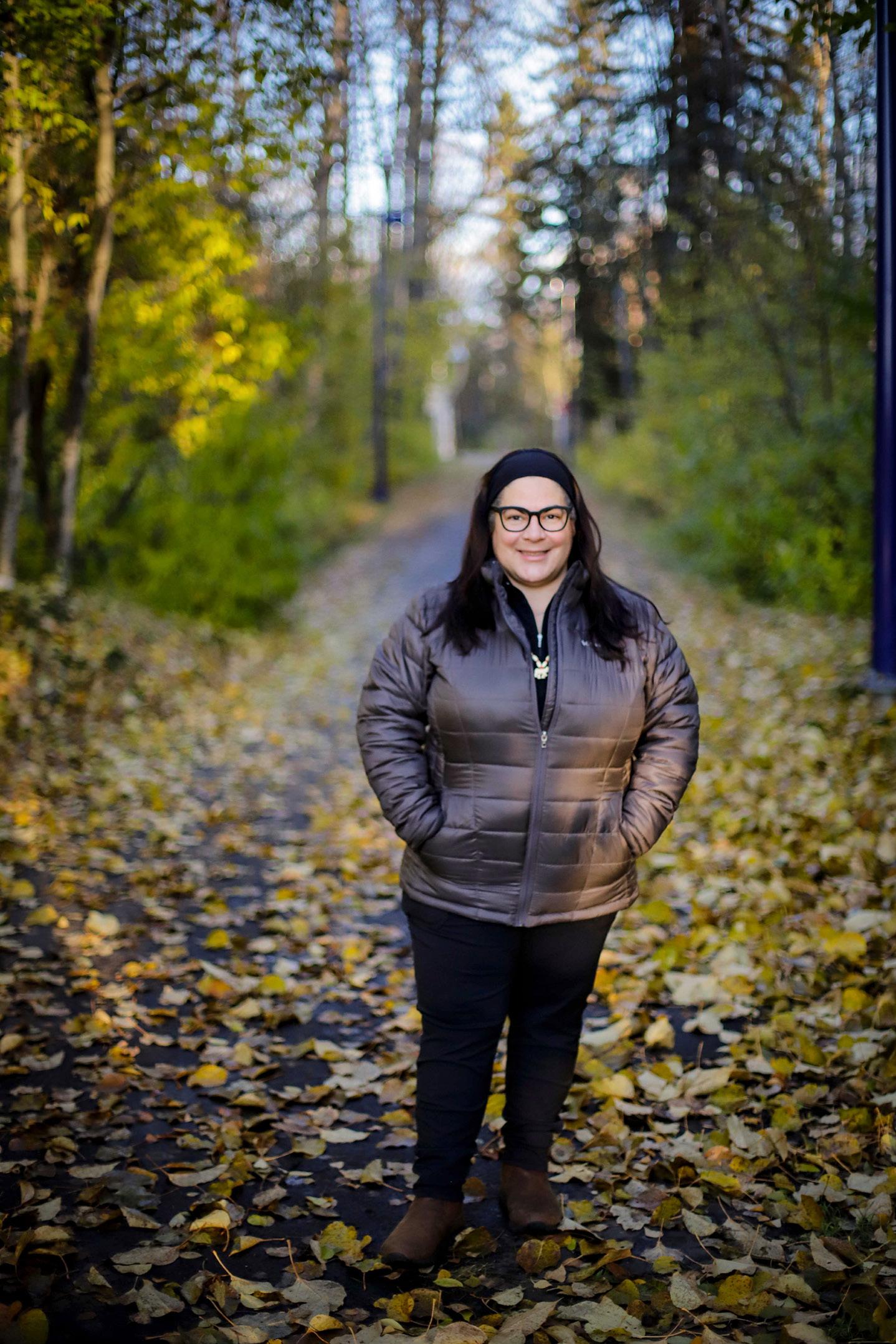
CHRO Debra Martinez uses decades of HR experience to align Alera Group and strengthen the company’s diverse and dedicated workforce
Frontier Communications’ Associate General Counsel Paul R. Garcia reflects on a legal career that defies tradition—and looks to the future
Sergio De Castro is using his passion for problem-solving and knowledge of business sustainability to help Aera Energy produce California’s oil in a socially responsible way
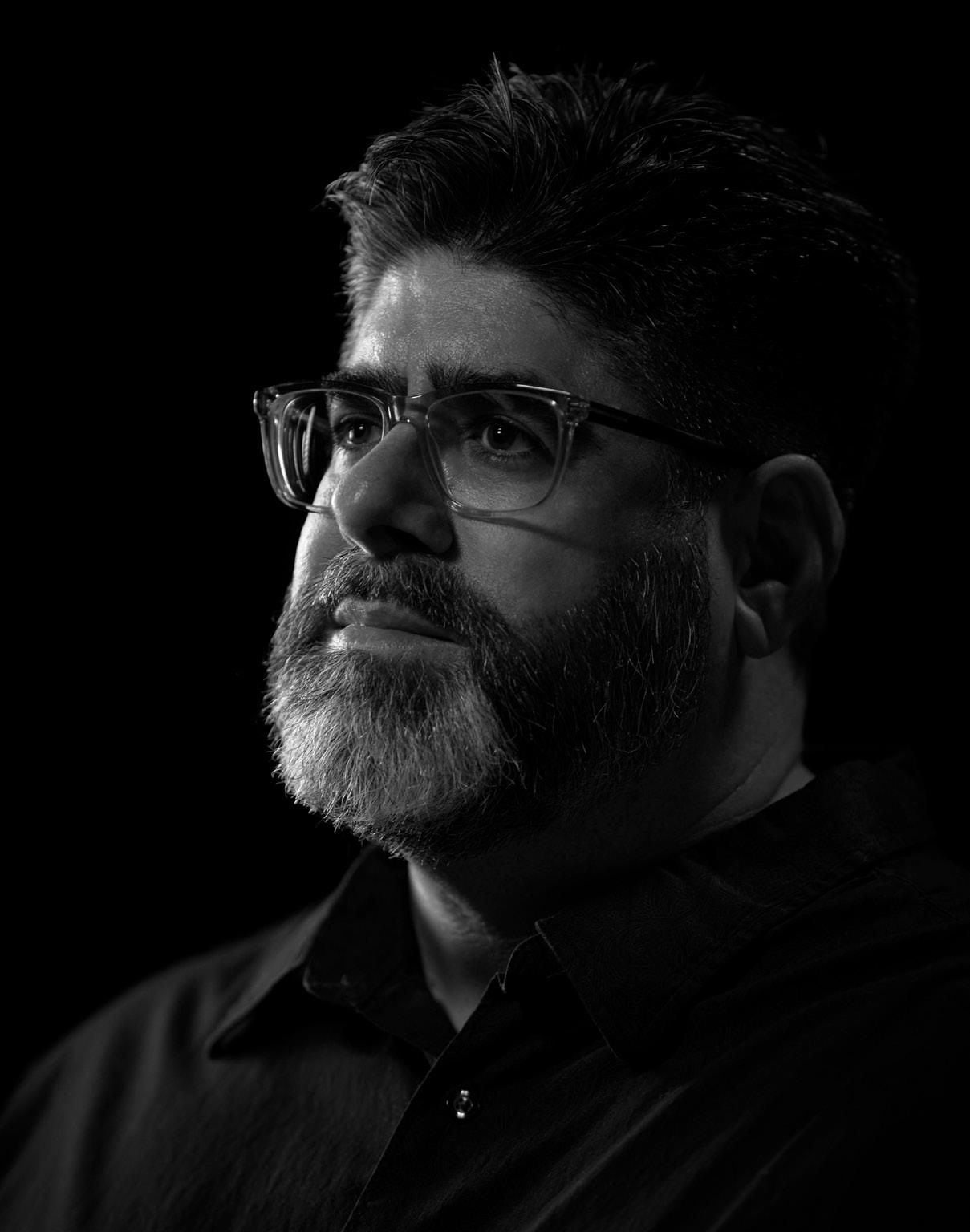
Over the course of her career, Maria Rivera has climbed from a dishwasher role to the C-suite. Now, she's helping Krispy Kreme aim just as high.
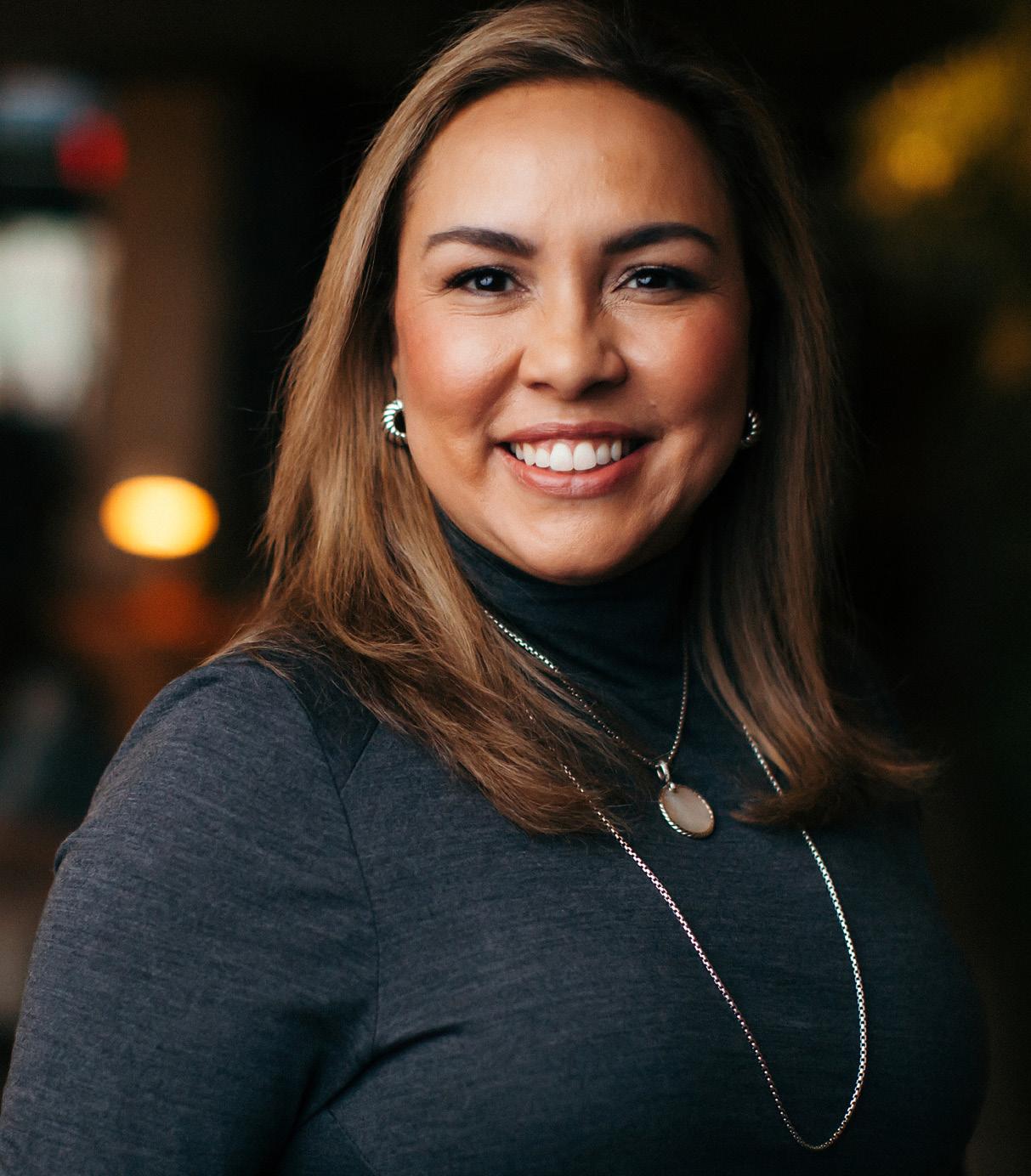
Elena Garnica views her role at Netflix the same way she sees her love for travel. From her perspective, there's always something new to discover.
At Panorama Mortgage Group, CEO Jason Madiedo fosters close client relationships and tailors the mortgage process to better serve the needs of underserved populations
At PTC, Mariana Prado Cogan applies both her Mexican background and knowledge of Japanese culture to the digital transformation space
WHEN I SAT DOWN TO WRITE THIS letter, the team at Hispanic Executive had just launched the first season of its podcast, The New Majority. Our goal is to provide yet another way to highlight the leaders of the new American majority. One that is increasingly multicultural and increasingly Latino.
Pedro A. Guerrero CEO of Guerrero Media Publisher of Hispanic Executive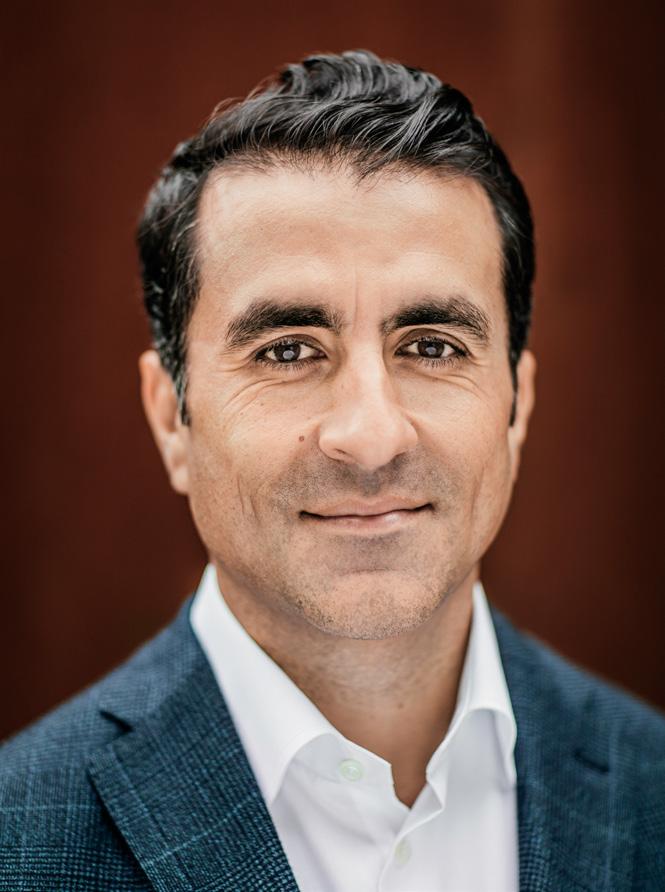
I knew that hosting the show (a long-held dream) would be a profound experience. The leaders we interviewed are all keenly aware of the importance of inclusivity, of bringing people in or ushering them along. They innately understand the importance of changing the narrative for themselves, and through their actions, they have not only authored a new story for themselves but changed the perception that the rest of the world had of them.
What I didn’t expect was for this experience to be so revelatory on a personal level. Hosting and producing the podcast forced me to flex a muscle that is admittedly weak: listening.
These aren’t normal conversations. I wasn’t able to trail off on a tangent or riff on
a new idea. I had a show to create, after all. I had to listen to and capture the thoughts brought to the table by our guests and try to weave them all together. Then, hopefully, I would have been part of an interview worth listening to. It was all made easier by the fact that the guests on our show are so captivating. Their life narratives are so rich in experiences that what was captured in the episodes is just the tip of the iceberg in terms of their shared experiences.
That depth of experience, and that sense of energy and influence, is unquestionably present in this Leading Latinas issue.
Like the Latinas interviewed for The New Majority, our Leading Latinas have made it their mission to challenge the status quo. Our cover star Christy Haubegger (p.110) has spent her entire career challenging the media industry by fighting to ensure that diverse leaders are seen on the screen, in the pages of magazines, and in the workplace. Gilda Perez-Alvarado (p.148) is demanding that we reconsider the modern workplace so that it works for
everyone, not just a select few. And all of our Leading Latinas, in their own ways, are challenging the perception of what leadership looks like in corporate America.
Our Leading Latinas are not alone in this regard. Our Latina activists, Dior Vargas (p.102) and Dr. Samarys Seguinot-Medina (Umyuugalek) (p.98), are challenging the status quo in every facet of their lives. And they are uncompromising in their expectations for change. Whether they’re fighting the impacts of climate change or speaking out about mental health, they assert themselves authentically at every opportunity, in every conversation, and at every table of influence they have access to.
Reading these stories was inspirational, and motivational. What these leaders have to say about their industries, communities, and experiences as Latinas should be emblazoned on walls, in pamphlets, and everywhere else that the world can see and appreciate it.
But what they don’t say is equally powerful. And as I listened—truly listened— to their stories, I realized something critical.
On the surface, there are clear distinctions between the efforts of activists like Dior and Dr. Seguinot-Medina and those of business leaders like our Leading Latinas. But when you look just a little deeper, you’ll see the connections: like the most impactful entrepreneurs, Dior and Dr. Seguinot-Medina have an eye for opportunity. They saw a gap, and they stepped in to provide services and support. Today, they are making a difference because they have aligned their personal passions and expertise with a critical, underserved need in their communities.
There is a restlessness in leaders like Dior and Dr. Seguinot-Medina. It is spurred by a deep-rooted desire to drive change and could—if one chose—be viewed as an indication of activism, a word and practice which, for a long time, was considered and expected to be separate from business. But these leaders remind us that the separation between business and activism is outmoded. Because if there’s anything that the past two years has taught us, it is that companies and leaders cannot stay out of these conversations.
The majority of Americans today are what we, in previous years, would have called activist consumers. The transformation our society has gone through has left employees and consumers alike yearning to align their values with the products they’re purchasing and the services they’re using. And both groups want to know what steps corporations are taking to effect the changes our society so desperately needs.

Companies everywhere must continue leading with those values in mind and
actively listening to both their consumers and internal stakeholders. They must look to leaders like the Latinas featured in this issue—both the activists and the business executives who have embraced the causes consumers hold dear—because they are the ones authoring the future of business. And they must understand that challenges to the status quo are both necessary and good. Because the reality is, there’s no going back to the way things were, and Latinas in leadership positions are here to stay.

“What these leaders have to say about their industries, communities, and experiences as Latinas should be emblazoned on walls, in pamphlets, and everywhere else that the world can see and appreciate it.”
Masthead
Edra Soto is an interdisciplinary artist and codirector of the outdoor project space the Franklin. Her work has been presented at the Smart Museum, the Museum of Contemporary Photography, the Chicago Cultural Center, Albright-Knox Northland, and more.
VP, Creative Production
Kevin Warwick
Editorial Manager
Frannie Sprouls
Managing Editor
Sara Deeter
Editors
Melaina K. de la Cruz
KC Esper
Julia Thiel
CEO & Publisher
Pedro A. Guerrero
Chief of Staff
Jaclyn Gaughan
President, Group Publisher
Kyle Evangelista
VP, Hispanic Division
Head of Audience & Engagement
Vianni Lubus
Hispanic Executive® is a registered trademark of Guerrero, LLC

©2022 Guerrero, LLC. guerreromedia.com
1500 W. Carroll Ave., Suite 200 Chicago, IL 60607
Facebook: @hispanicexecutive

LinkedIn: @hispanic-executive
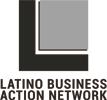
Twitter: @HispanicExecMag
Instagram: @hispanicexecmag
YouTube: bit.ly/youtubehemag
Reprints
Reprinting of articles is prohibited without permission of Guerrero, LLC. Printed in China. For reprint information, contact Reprints & Circulation Director Stacy Kraft at stacy@guerreromedia.com.
Hana Yoo
Staff Writer
Zach Baliva
Billy Yost
Contributors
Pamela Bloom
Zach Brown
Lucy Cavanagh
Peter Fabris
Will Grant
Frederick Jerant
Noah Johnson
Taylor Karg
Natalie Kochanov
Donald Liebenson
Keith Loria
Eileen Lynch
Maggie Lynch
Roman Navarrette
Christopher James Palafox
Andrew Tamarkin
Sara Verdi
Zayvelle Williamson
Designer
Elena Bragg
Senior Photo Editor
Sheila B. Sarmiento
Photo Editor & Staff Photographer
Cass Davis
Social Media Manager
Ashley Rupprecht
VP, Finance
David Martinez
VP, Sales
Ben Julia
Senior Director, Client Operations
Cheyenne Eiswald
Senior Client Services Manager
Rebekah Pappas
Client Services Manager
Brooke Rigert
Director, Client Services–Corporate Partnerships
Taylor Frank
Director, Talent Acquisition & Engagement
Haylee Himel
Director, Talent Acquisition
Heather Steger
Senior Director, Corporate Partnerships & DEI Solutions


Krista Horbenko
Events Director
Jill Ortiz
Digital Events & Marketing Coordinator
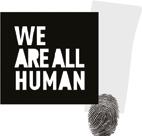
Ashley Parish
Communications Manager
Cristina Merrill
Director, Sales
Kelly Stapleton
Director, Sales Training & Development
Alexa Johnson
Director, Sales Onboarding
Justin Davidson
Content & Advertising Managers
Allyssa Bujdoso
Roman Magallanes
Alejandro Vences
Industry Partners
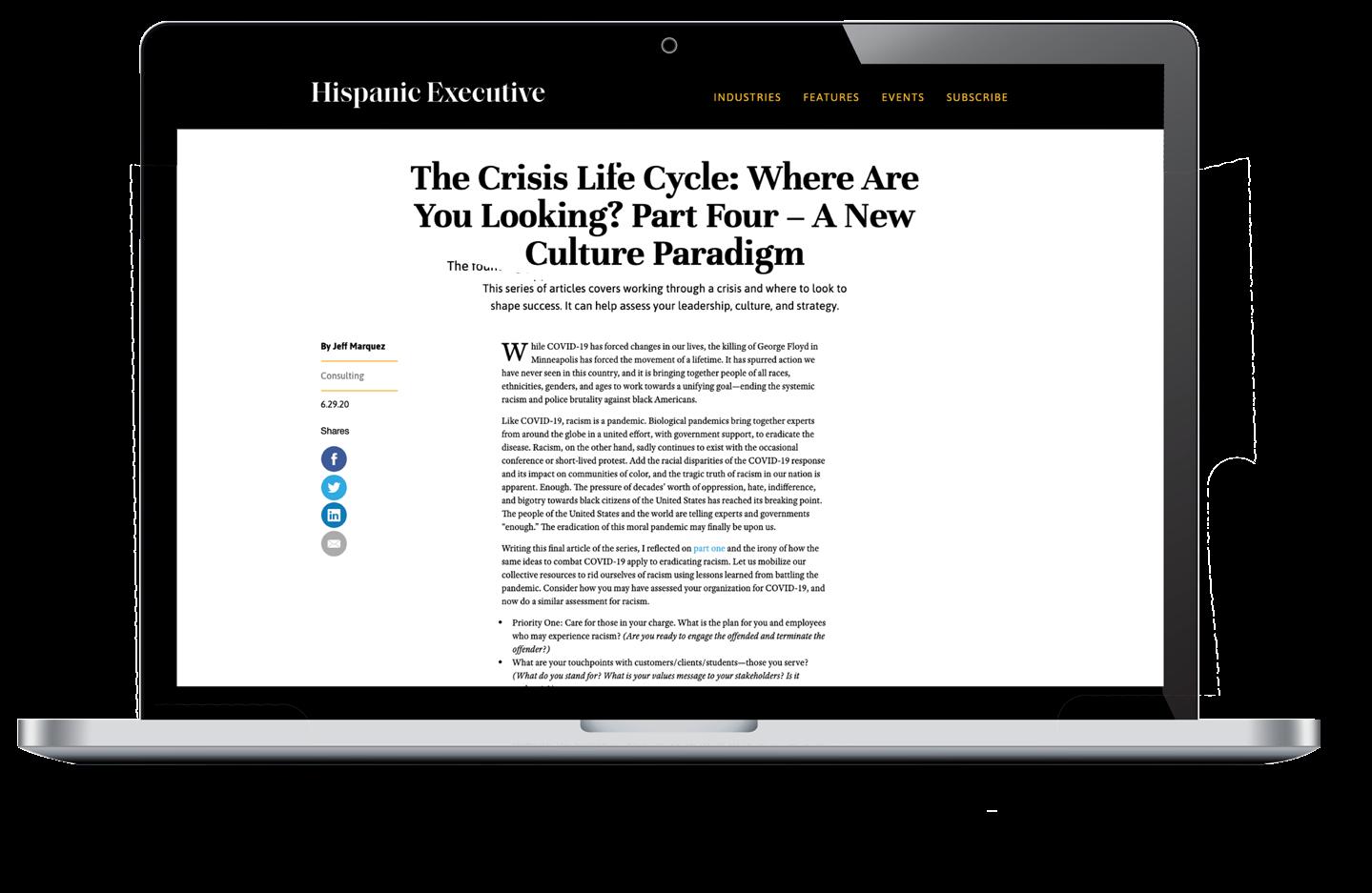
—Jeff Marquez, Publisher’s Circle Contributor,
Part Four”
“We may be overwhelmed by the convergence of multiple crises, or unsure of exactly what to do, and that’s OK. What it means, though, is that you have to ask a lot of hard questions and not pretend to have the answers.”
—Javier Saade, Publisher’s Circle Contributor, “The Time Is Now. The Year Is 2020.”
Diana Dávila began her career at her family’s upscale restaurant, Hacienda Jalapeños. Today, as executive chef and owner of Mi Tocaya Antojería, she maintains a focus on family. Photographer Sheila B. Sarmiento shadowed the Chicago native to get a sense of how she balances it all.
8:45A.M.


9:00A.M.
Dávila spends an hour at the gym before getting down to the business of the day for her restaurant.

Dávila goes grocery shopping several days a week, sometimes for the restaurant’s kitchen and sometimes for the dinners she makes for employees at Mi Tocaya Antojería. She often shops at a store called Rico Fresh because it carries authentic ingredients imported from Mexico.
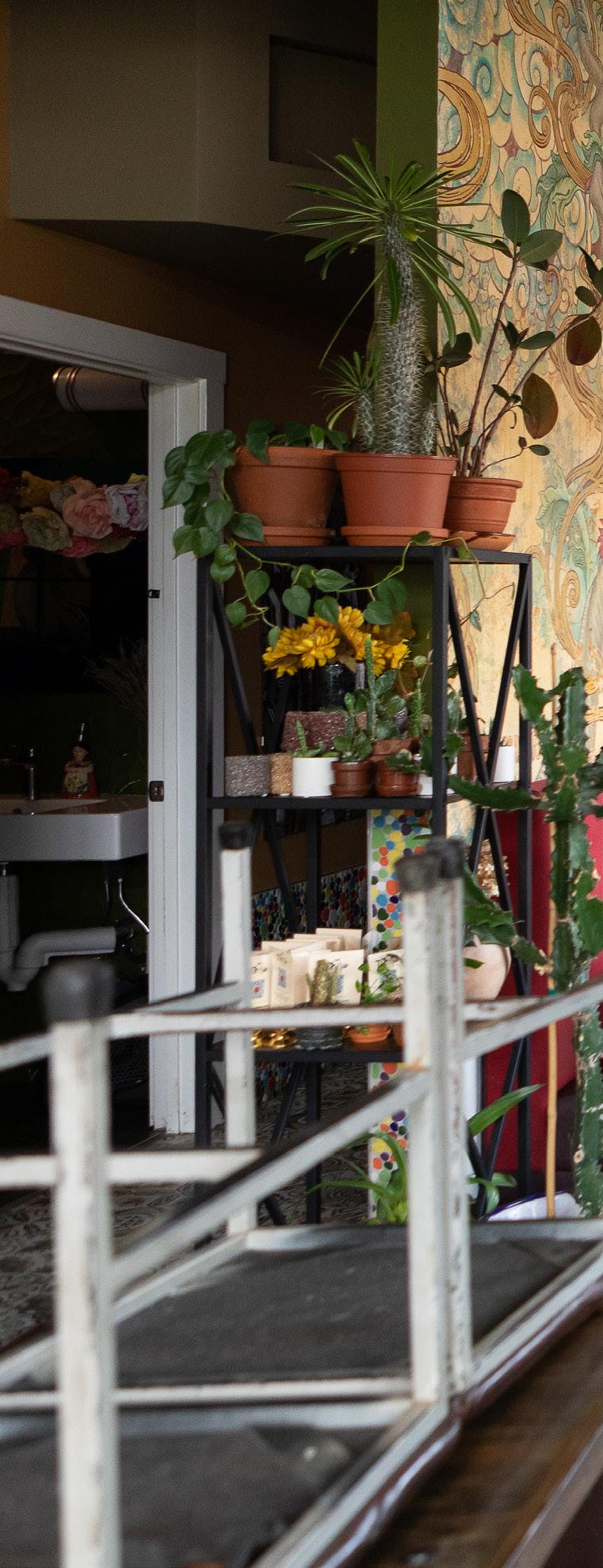


12:15P.M.
Not all tomatoes are picture perfect, and Dávila actually makes a point of purchasing the imperfect, bruised fruits that are overlooked by others.
1:00P.M.
As her team begins prepping steaks, vegetables, and other ingredients for that night’s dinner, Dávila makes time to speak to her restaurant manager and take care of other key administrative tasks.
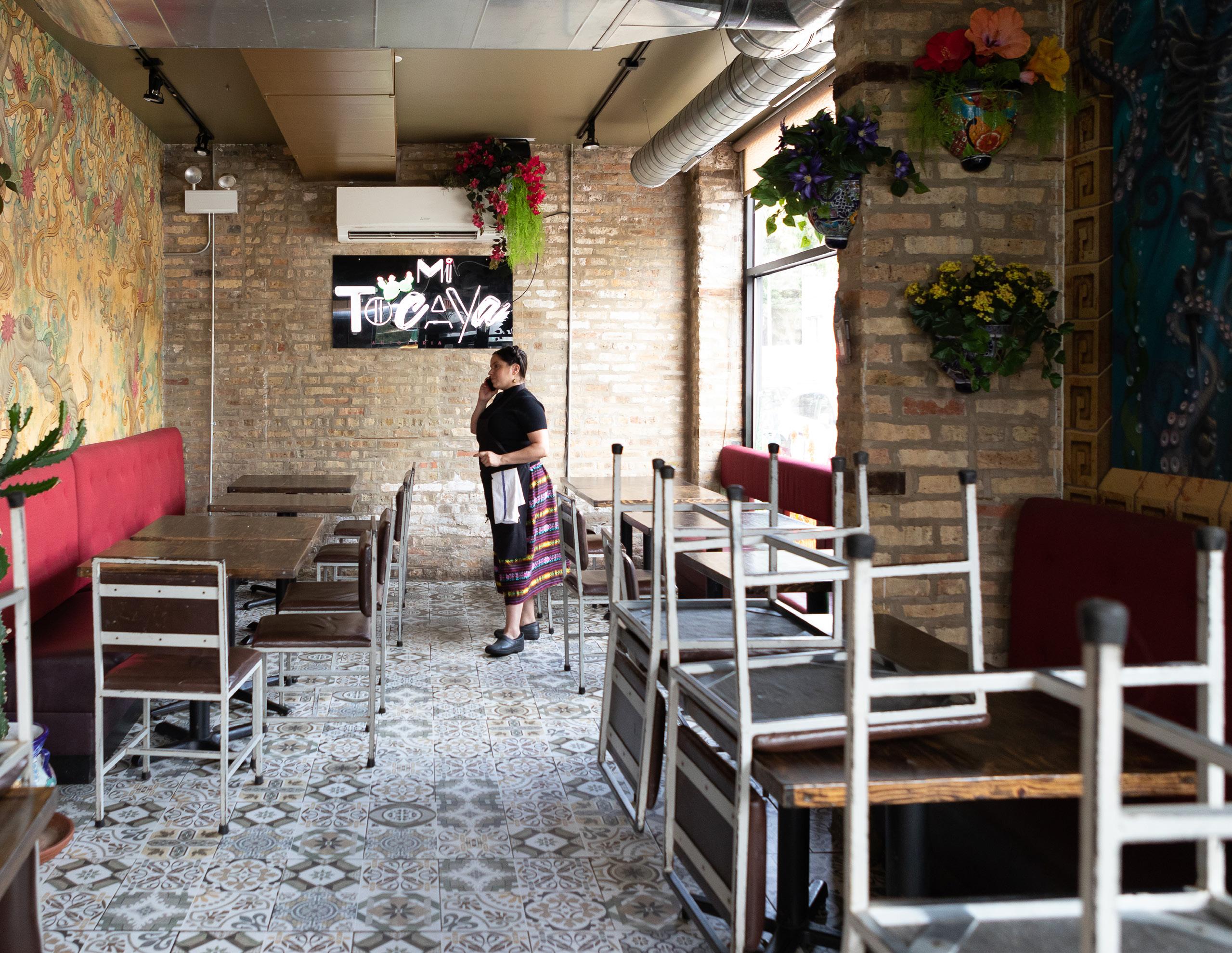
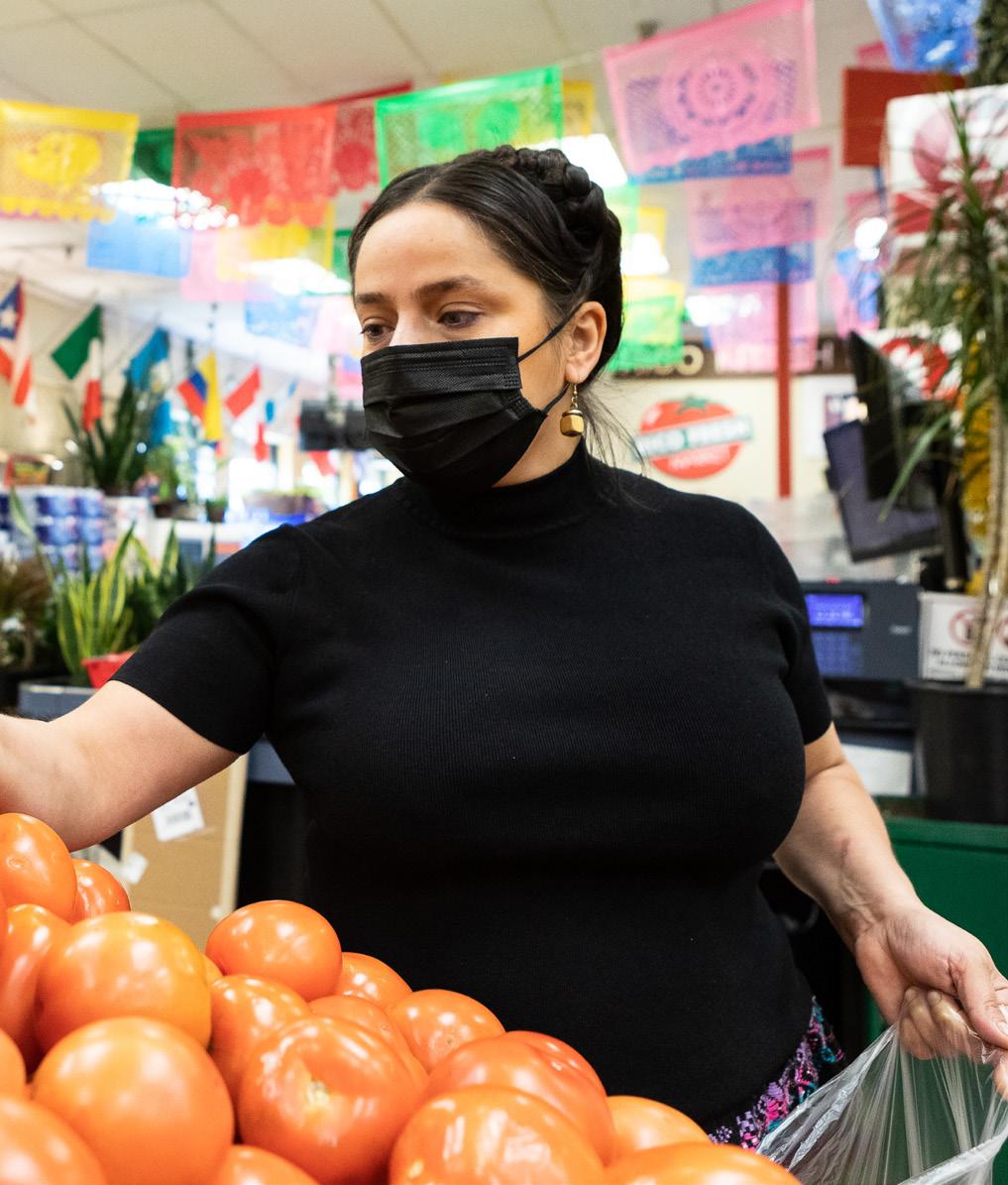
2:00P.M.
At Mi Tocaya Antojería, “family dinner” is for both the restaurant’s employees and Dávila’s two young children. The executive chef starts prepping food in the early afternoon so that everyone can eat before the restaurant begins dinner service.
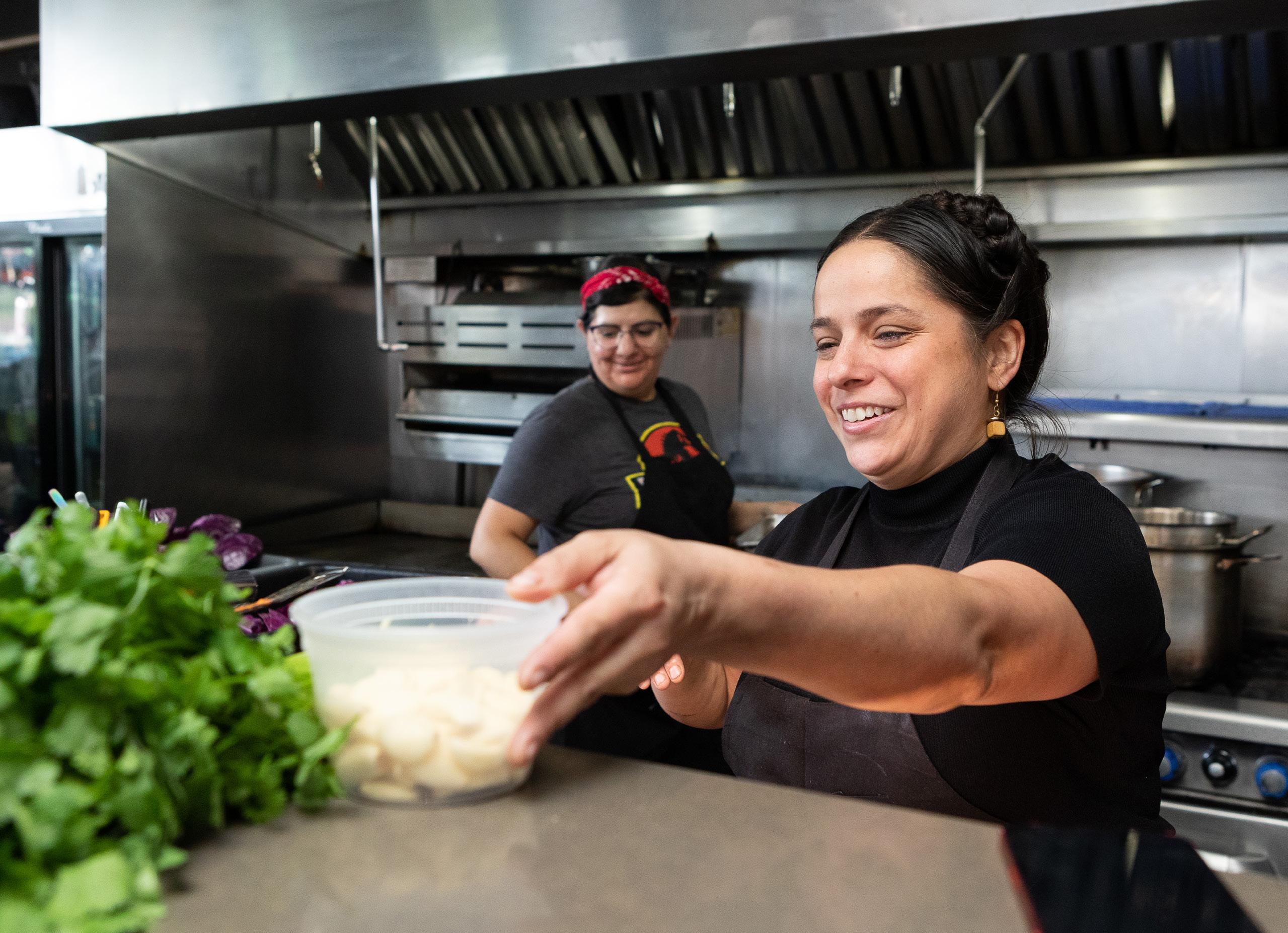
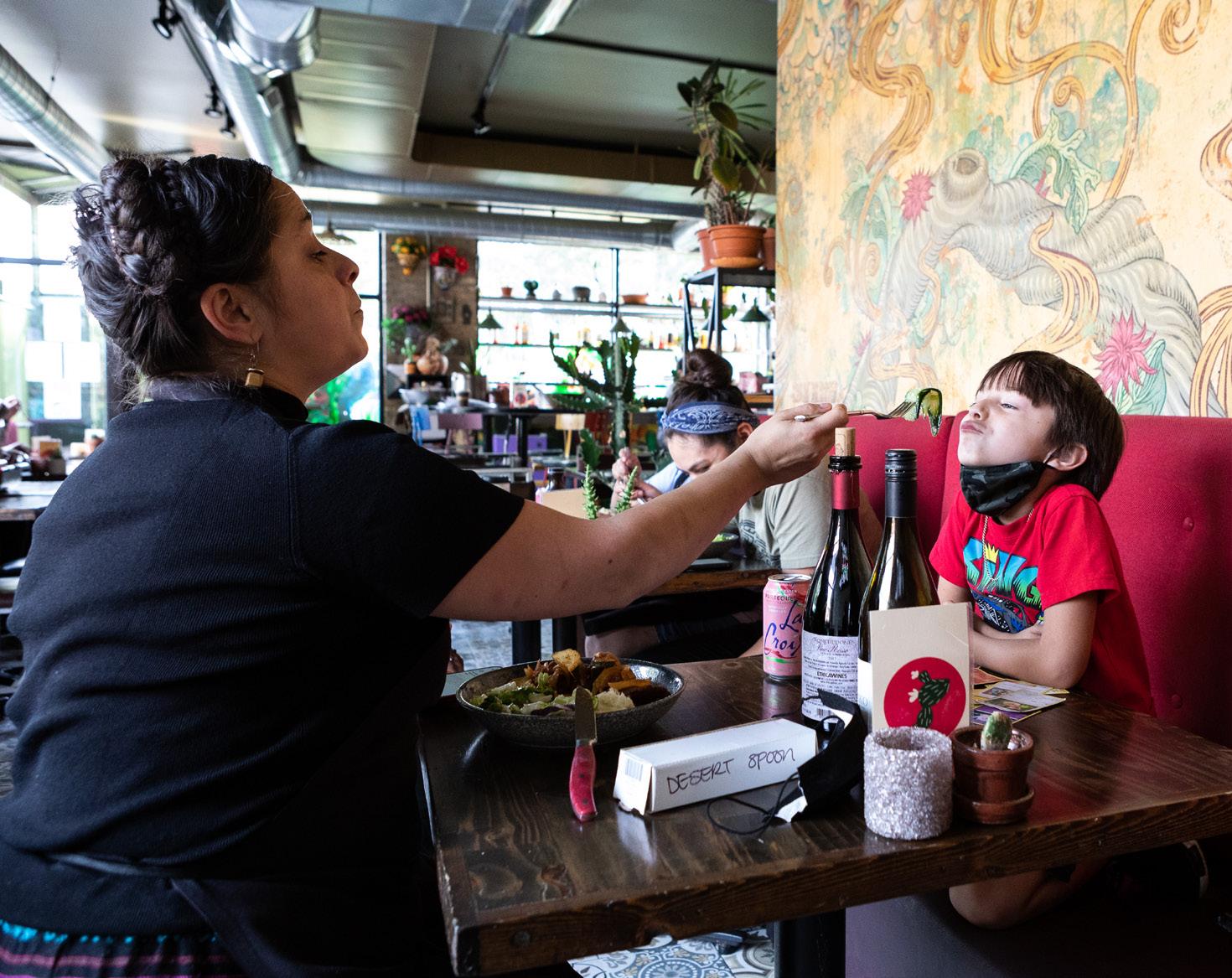
3:30P.M.
Dávila and her son Oliver enjoy chicken Milanese cutlets, mashed potatoes, and other dishes for family dinner.
4:00P.M.
During the pre-shift portion of the day, Dávila and her waitstaff review the menu for the evening and discuss the origins and flavor profiles of the wines they’ll be serving.

4:25P.M.
Before the restaurant opens, Dávila and her team come together for an all-hands-in cheer.

SHAUN LEONARDO’S MULTIDISCIPLINARY work is inexorably tied up with experience— his experiences as an activist and educator, the experiences of the communities in which he lives and works in New York City, and the experiences of participants in his workshops and performance art works.
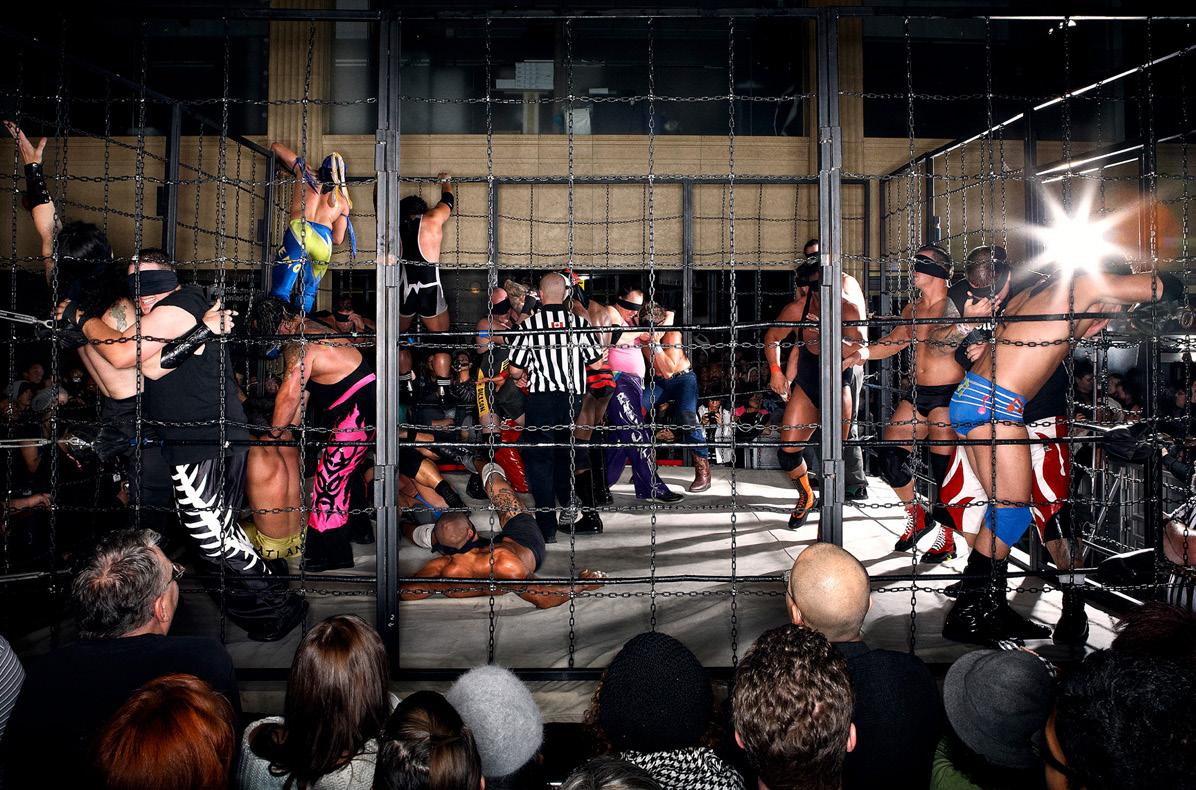
But for Leonardo, the act of experiencing a space, memory, or feeling is simultaneously an opportunity to reflect, meditate, and explore. I sat down with him to discuss these intersections as well as the ideas and principles that underlie his work.
Can tell us a little bit about your upbringing and your connection to the arts? How did you decide you wanted to become an artist?
I am of Dominican and Guatemalan heritage. My mother’s from Santo Domingo; my father’s from La Ciudad de Guatemala. My parents, who are both now retired, worked in their respective fields for thirty to forty years. They really worked up the ladder in their careers: my mom having started as a secretary and culminating as the head of publishing in one of the departments at Simon and Schuster, [and] my father starting as a janitor and working his way up to supervise the entire laboratory at what was then called North Shore Hospital.
I attribute my work ethic to them. However, it was in the mentality of striving for the best that I was also taught that success meant economic stability and mobility. And so art wasn’t really within my vision as a child:
I never quite know what inspired me, other than the moments where I did see and take in art. I don’t know what drove me to identify as an artist because it wasn’t within my familial background—not that I know of anyway— and my only exposure to art, growing up in Queens, were the moments here and there where we visited the Queens Museum and the Metropolitan Museum.
Most important, I think, was whenever I saw a master, codified “master,” at the Metropolitan Museum. Somehow, I [don’t] recall ever being dissuaded [by the fact] that those “masters”
were all dead white men. I found myself seeing these “great artworks” and believing I could achieve that.
I do equate that stubbornness and conviction with the same work ethic that my parents filled me with, but to this day, I don’t understand how I never felt that the historical art canon could not be achieved simply because of my ethnicity or color. That was never a blockage for me, psychologically.
I'm glad, because I think it probably was intimidating for a lot of young minds. Yes. I offer that narrative with the recognition that, over my life and professional career, I have witnessed young people be easily
derailed when they don't see themselves in the representation of who is creating.
Especially as I grew into my path as an educator, I found it equally important to share the work of my colleagues and those artists of color that inspired me with both young folks that I identified with (meaning those that looked like me) and white kids. For a white student, particularly a young white student, seeing the mode of expression of an artist of color can shift as much of their worldview as it does for a student of color.
I completely agree. And are you currently teaching, besides your professional practice?
I don’t, and I haven’t for a long while, created a distinction between the two. I am now the codirector of Recess, a nonprofit art organization that is centered on socially engaged practice and even more centered on practices that engage topics of social justice. This is the same organization within which I cofounded the Assembly Diversion Program, which works in conjunction with the criminal court here in Brooklyn.
That practice takes the form of a workshop, as does much of my performance. So it is difficult for me to distinguish what others
might call a more “polished performance” from a pedagogical practice because for me, they’re one and the same. The workshop, the platform of teaching and learning, is in and of itself the performance. It doesn't lead to another output or product.


Can you talk about some of your latest projects?
There are two consecutive projects that both uniquely provided a very new invitation to my holistic practice. One, which is at MASS MoCA [the Massachusetts Museum of Contemporary Art], will be [in place] for two years. And another is about to premiere as a large public artwork commission at Four Freedoms Park on Roosevelt Island.
What is central to both of those opportunities is that the institutions were asking me to develop a physical project installation informed by my performance work. At MASS MoCA, the invitation was to see a hallway that would otherwise be overlooked as a passage that invites a stillness, a contemplativeness of memory and also of one's own subtle movements. That project is entitled “You Walk”: as guests pass through this hallway, they encounter different text prompts that invite them to slow down. In the poetics of the text, I’m
asking an individual to not only create their own associations with their lived experience but also imagine that same movement embodied by a very different person.
That is echoed by visual elements in the space: the windows on one side are obscured by mirrors, so you continuously see your own image as you pass through and take in these prompts. Opposite each of the actual windows is a fake window that duplicates exactly what you might see to your left but with one element slightly askew. So you’re presented with two realities of the same location, one which notes where you actually are and then a limited window that gives you the possibility of seeing that same present tense in a different context.
Four Freedoms Park Conservancy is a memorial to Franklin Delano Roosevelt and specifically to his speech concerning the four freedoms: freedom from want, freedom from fear, freedom of speech, and freedom of portion.
Over a year and a half ago, the park and I were contemplating a large-scale performance work, which was abruptly shut down by COVID. The conversation evolved into the possibility of two monumental “murals,” which are not paint but vinyl: they are
emblazoned on the two facades of the park and are viewable from across the river in both Queens and Manhattan.
Those images will be static hand gestures, all generated by a performance-based workshop process with community members that self-identified as vulnerable when contemplating, or in the face of, those four freedoms. Through this workshop process, we looked at what a contemporary reinterpretation of those freedoms could be through the lives of those community members. And the result was a series of narratives where these participants spoke about how they believed freedom was afforded, or not, but also about the ways in which we embody those narratives.
What I homed in on is what the community members did with their hands when expressing those stories. Those static murals can be activated on one’s phone into these beautiful animations that slowly morph those gestures into one another. And as you’re witnessing that movement, you hear one of the participants speak about a freedom. And all of that material was extracted from the workshop process, a process that would in the past otherwise go entirely invisible.
I think the larger challenge surrounding not only the pandemic but also the converging
crises of racial justice, reproductive rights, and everything else is the immediacy with which we are being called upon to act. This is infiltrated and influenced by social media and the sort of commotion and chaos of the news cycle: we feel compelled to act, act, act—to respond, respond,
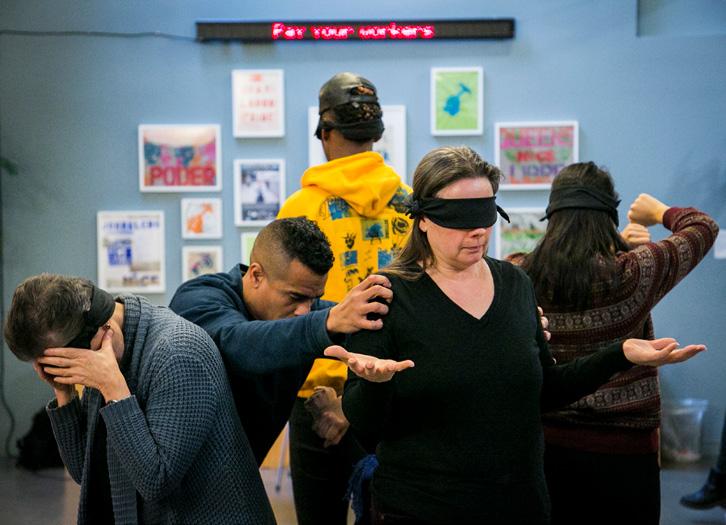
Puerto Rican–born Edra Soto is an interdisciplinary artist and codirector of the outdoor project space the Franklin.
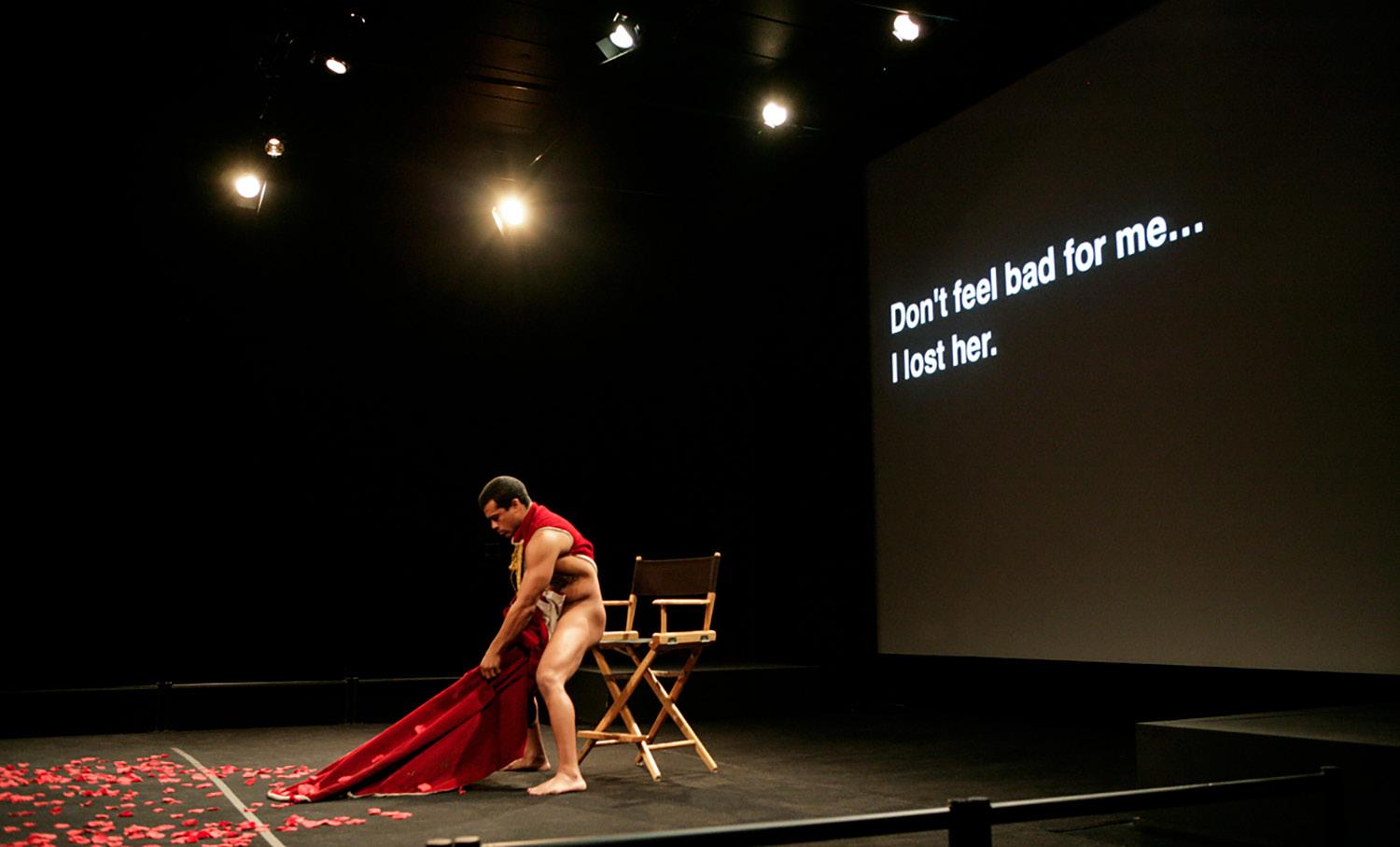
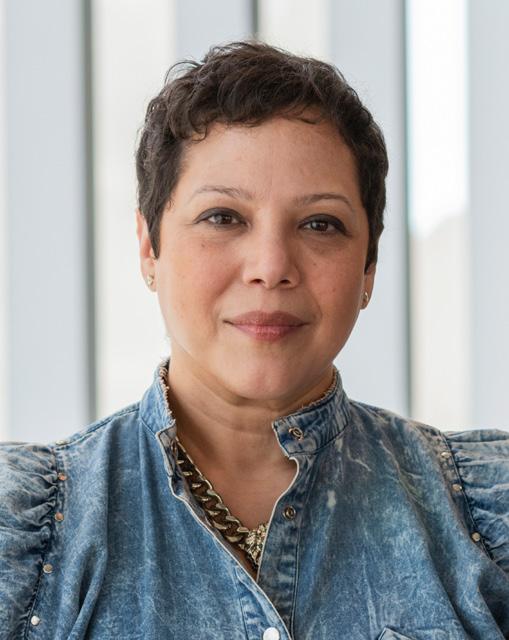
Recent venues presenting Soto’s work include Crystal Bridges Museum of American Art’s satellite, the Momentary (Arkansas); Albright-Knox Northland (New York); Chicago Cultural Center (Illinois); Smart Museum (Illinois); and the Museum of Contemporary Photography (Illinois).

Recently, Soto completed the public art commission titled Screenhouse, which is currently at Millennium Park in Chicago. Soto has attended residency programs at the Skowhegan School of Painting and Sculpture, Beta-
respond—and artists don’t operate best in that rhythm. Artists need to take in, to process, to decipher, to separate from the noise and create things that are beautiful and impactful to the spirit. Artists have to offer a different type of slowness to work against the speed of today.
Local, the Robert Rauschenberg Foundation Residency, the Headlands Center for the Arts, Project Row Houses, and Art Omi, among others. Soto was awarded the Efroymson Contemporary Arts Fellowship, the Illinois Arts Council Agency Fellowship, the inaugural Foundwork Artist Prize, and the Joan Mitchell Foundation Painters & Sculptors Grant, among others. Between 2019 and 2020, Soto exhibited and traveled to Brazil, Puerto Rico, and Cuba as part of the MacArthur Foundation’s International Connections Fund.
Soto holds an MFA from the School of the Art Institute of Chicago and a bachelor’s degree from Escuela de Artes Plásticas y Diseño de Puerto Rico.
When one’s work makes an impact in the community, it transcends employment and becomes a calling. These executives have answered their call.
20. Rosa J. Nuñez, Foley Hoag LLP 27. Tad Gomez, Loyola University Medical Center 30. Debra Martinez, Alera Group 36. Natalia Cortez Burdette, Teach for America 40. Orson Aguilar, Oportun Inc. 43. Blanca Gonzalez, lululemon athletica 46. Lexi Hernandez, Raytheon Missiles & Defense 50. Antonio Castañon, Citi 56. Xavier A. Gutierrez, Arizona Coyotes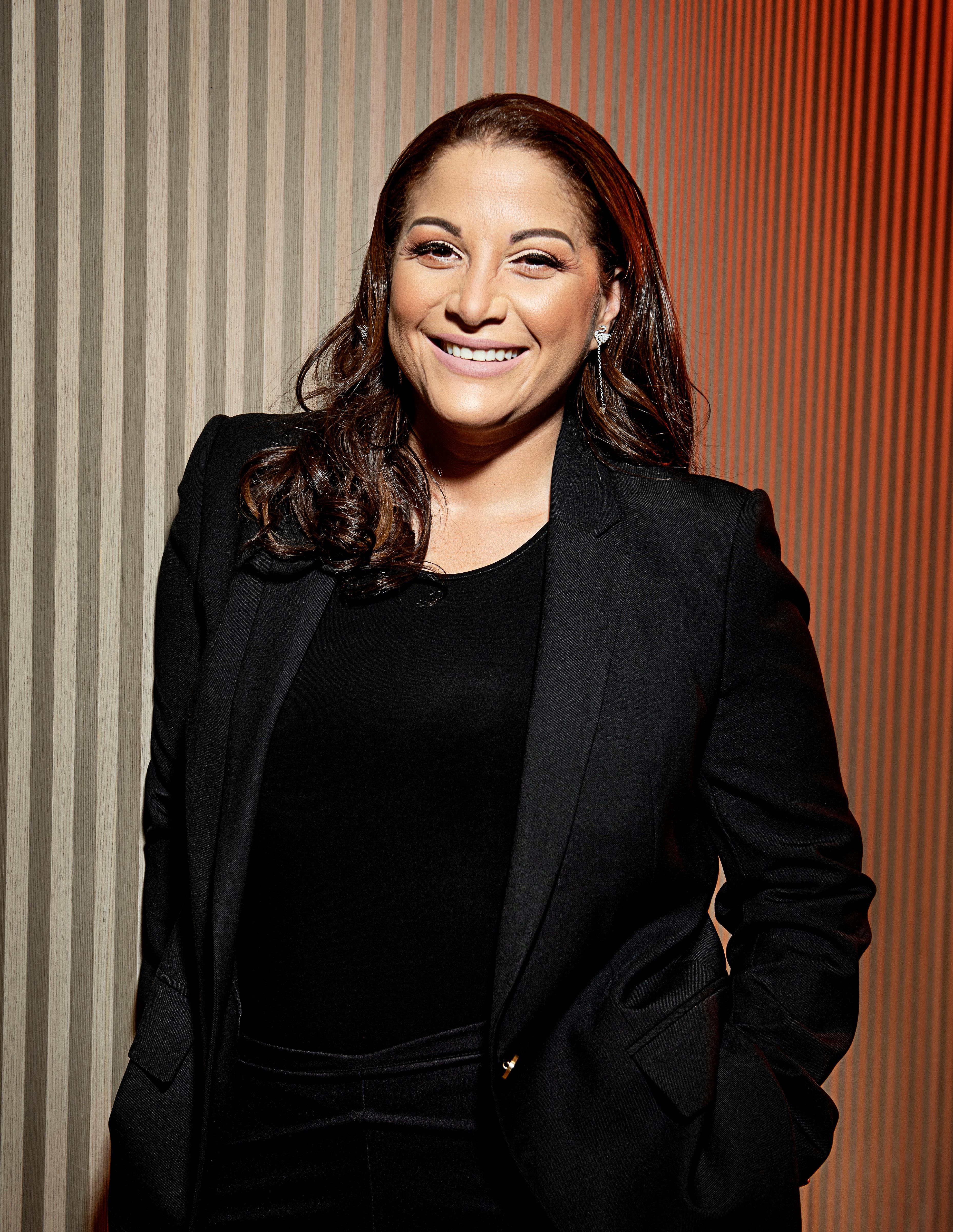
Rosa J. Nuñez is able to build high-impact diversity, equity, and inclusion programs because she deeply understands the value of true belonging
Nuñez, who currently serves as director of diversity, equity, and inclusion at law firm Foley Hoag LLP, says that her experience immigrating to the United States from the Dominican Republic as a teenager entering her senior year of high school molded her into someone who intimately understands how imperative it is for everyone to feel like they truly belong.
After building strategic DEI programs from scratch at multiple organizations, Nuñez entered the legal industry in 2019 when she came on board at Foley Hoag. That industry, she notes, has fallen short in the past and still has a long way to go in its efforts to embrace DEI. But Nuñez is helping Foley Hoag lead the pack and ensure that DEI is more than an HR initiative. In fact, they’re making it a business focus.
To understand what Nuñez brings to her role, it’s imperative to examine where she came from. Nuñez’s mother immigrated to the US in an effort to provide a better life for her family, and Nuñez joined her in upstate New York when she turned eighteen.
“I was a senior at a predominately white high school where few people looked like me and where I had absolutely no point of reference,” Nuñez remembers. “I was not only an immigrant but a teenager, struggling to find my place and identity in a culture that I knew nothing about while trying to pursue my dreams. I always knew I wanted to be someone in life, but at that moment, the odds were stacked against me.”
Nuñez was determined to make the most of the opportunities around her, but she faced challenges nonetheless. From not speaking or understanding English well to trying to fit in with others in her class, more often than not, Nunez felt isolated, different, and excluded. “It was a horrible experience. There’s no other way to say it,” Nuñez says. “But because I didn’t allow my then circumstances to impact the dreams and goals I had set out for myself, I was able to finish the year on the honor roll. I won the PTA scholarship and earned a great scholarship to attend Marymount College of Fordham University—all in one year! ”
Nuñez’s personal journey has made her acutely aware of the struggles of those who feel somehow “other-ized” in a dominant culture,
Rosa J. Nuñez has found her calling: building out high-performing, high-impact diversity, equity, and inclusion (DEI) programs.
 Rosa J. Nuñez Director of Diversity, Equity & Inclusion Foley Hoag LLP
Rosa J. Nuñez Director of Diversity, Equity & Inclusion Foley Hoag LLP
Rosa J. Nuñez has built many D&I programs and initiatives from scratch, and she uses that expertise as a member of the INROADS National Board of Directors. INROADs, she explains, is a nonprofit organization founded in 1970 to address the lack of people of color in corporate America.
“INROADS was one of the first organizations to start doing this work with intentionality,” she says. “Being a member of the INROADS National Board of Directors has given me so much insight into what’s working, what isn’t working, and how organizations can effectively continue to help and support equity efforts.”
and the sheer number of challenges she overcame just to put herself on something resembling an equal playing field has motivated her to help tear down such obstacles for others.
Nuñez has been in the DEI space long enough to have watched the scope of the role change and evolve. While DEI corporate programs originally focused mostly on meeting quotas around gender and race, she explains, many organizations have now embraced DEI as a business priority and implemented a more holistic approach by broadening the definition of what diversity means. They are expanding their focus to include sexual orientation, gender identity, disabilities, and socioeconomic background.
“However, this evolution hasn’t gotten us far enough,” Nuñez notes. “We’re working to undo systemic issues that have been present for hundreds of years. But it has definitely helped the work shift from being an HR afterthought program into more of a business strategy, with organizations large and small appointing DEI professionals to guide and
lead the change. It’s not just the Fortune 500 focusing on these issues anymore.”
While Nuñez never imagined she’d be working in the legal industry, she says she fell in love with the firm’s commitment to DEI when she interviewed at Foley Hoag, and she knew she couldn’t pass up the chance to do what she does best. “This has been a chance to build a path where there was formerly nothing and to help lead the journey,” she says. “I’ve been entrusted with a blank canvas, and that’s what truly energizes me.”
Collecting DEI data, building awareness, and beginning to build out a strategy all require a significant amount of heavy lifting, and Nuñez says it’s imperative for those embarking on this journey to understand that if there is no buy-in from the organization, the work is ultimately pointless.
“The real challenge in building these programs is to find a way where the work feels owned by everyone,” she explains. “Embedding diversity, equity, and inclusion into the DNA of an organization takes a village as well as a lot of time, effort, and intentionality.”
“I was not only an immigrant but a teenager, struggling to find my place and identity in a culture that I knew nothing about.”
This work isn’t for the faint of heart, Nuñez says. She herself admits that being the focal point of change can be a taxing and tiring task. “But what continues to motivate me is that I’ve been given the space in a room to advocate for folks who aren’t here,” she says, “and that I’ve been given the opportunity to revise and recommend policies and practices for the benefit of those who have been most impacted historically.”
Many of the people whom Nuñez helps today remind her of her younger self. Her efforts include providing access to job interviews to students from underrepresented backgrounds who likely would have been overlooked by more traditional recruiting methods. “This can change someone’s entire trajectory,” says the director. “By doing this, we are creating the potential for generational change.”
In 2021, Nuñez and Foley Hoag’s DEI efforts resulted in its most diverse summer associate class in history as a direct result of the firm’s commitment to widening its recruitment efforts, which it did so as to attract the best and most diverse talent in the industry. According to Nuñez, the firm has also increased the number of spots for its Charles Beard Diversity Fellowship Program to support more students from underrepresented backgrounds. Thanks to these and other initiatives, Nuñez has built a strong DEI team since coming on board in 2019.
“I have very talented people working with me to help drive this change,” she remarks. “We’re relentless in our pursuit of making Foley Hoag the most diverse, equitable, and inclusive workplace in the industry.”
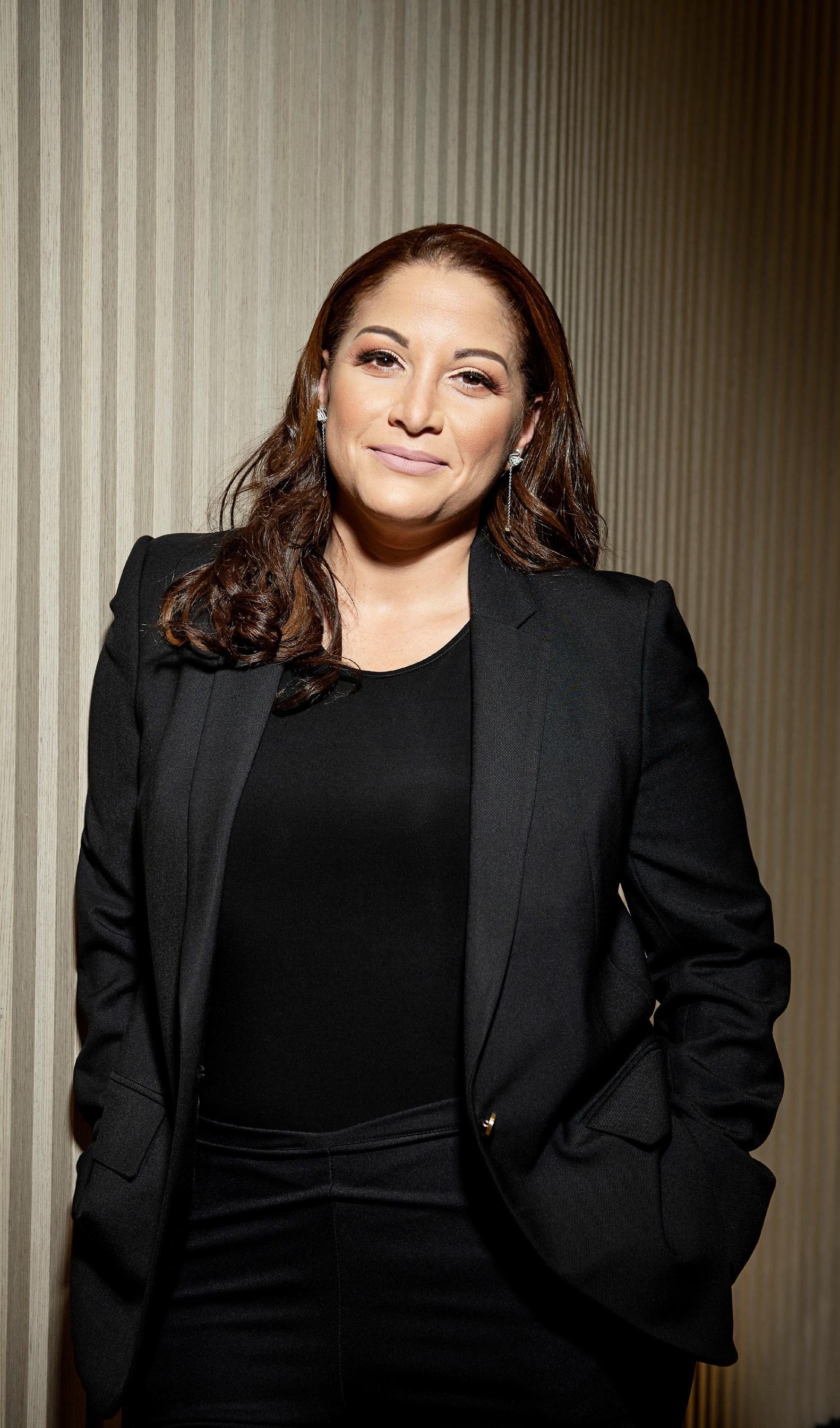
Foley Hoag congratulates Rosa Nuñez, Director of Diversity, Equity & Inclusion, on her accomplishments and recognition by Hispanic Executive. www.foleyhoag.com
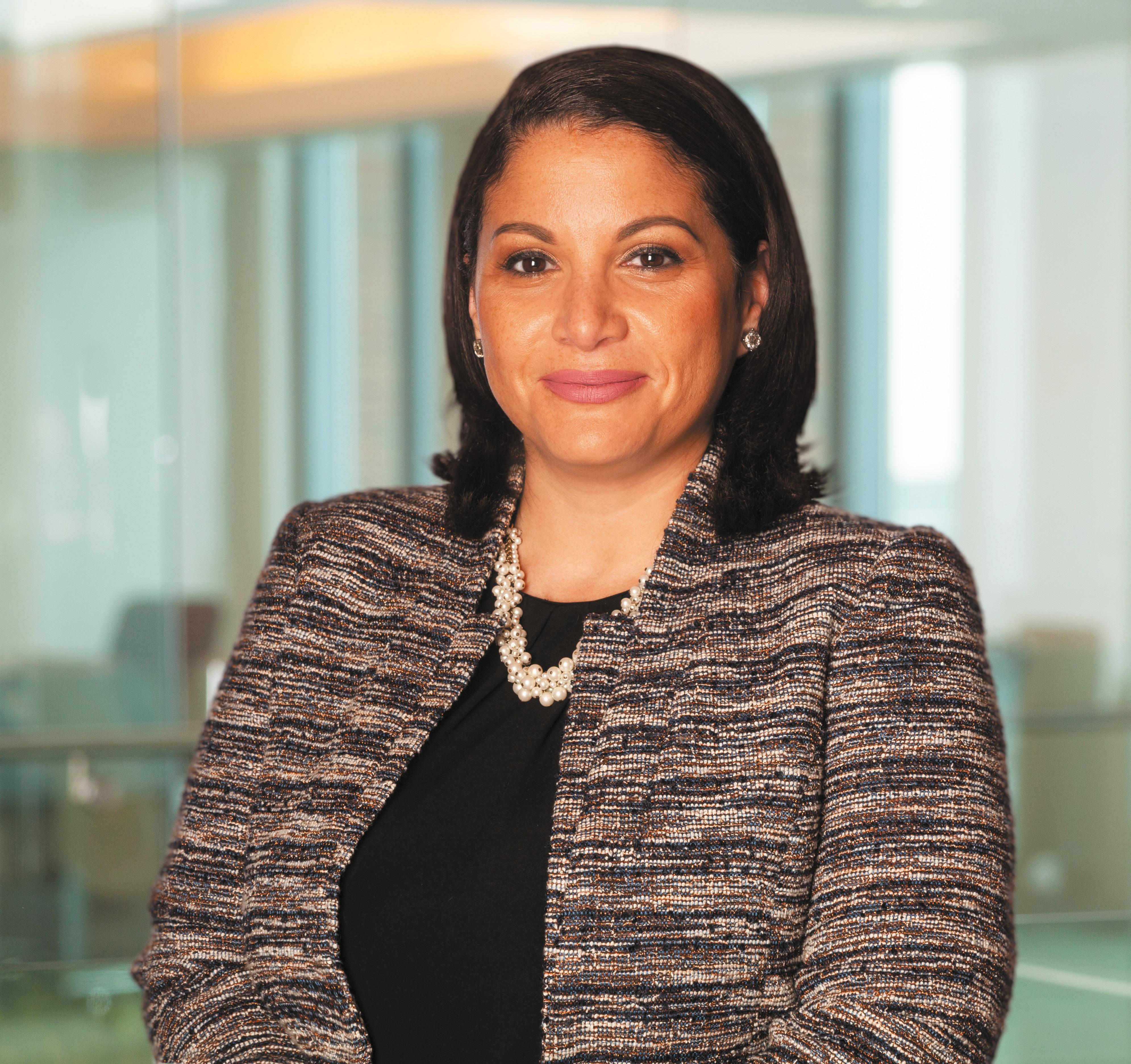
EXPERIENCE AND TIME ARE FAR TOO often the only true ways of knowing whether a choice was the right one. For Loyola University Medical Center President Tad Gomez, losing out on a promotion to VP earlier in his career seemed—at the time—like a sign that striving for new experiences beyond his pharmacy background might be the wrong move.
Little did Gomez know that this loss would help him gain the essential leadership experience that would eventually land him a coveted role as president and confirm his leadership of one of the country’s premier medical centers.
Now, Gomez and the leadership team at Loyola University Medical Center are using everything they know to evaluate the hospital’s performance and chart a new direction forward—one that’s centered on doing what Loyola does best: treating the body and the spirit.

THE ROLE OF A GOOD MENTOR
Gomez’s journey into leadership may have never happened had it not been for one of his mentors. “I always thought I would be in the pharmacy space,” Gomez explains. “I didn’t ever see myself operating outside of it. But the CEO from one of my previous positions asked me a question that always stuck with me. He told me that I’d done great things in pharmacy and asked what made me think that I couldn’t do great things in other areas.”
That mentor encouraged Gomez to apply for a leadership position that Gomez wasn’t sure he was ready to undertake. Gomez made it to the short list but ultimately lost out. But when a leadership shake-up later hit the C-suite, the position Gomez had vied for was suddenly eliminated. He had been saved by the loss.
BY BILLY YOSTThe new leadership team gave Gomez the opportunity to start overseeing new departments, including respiratory care, occupational therapy, physical therapy, and, eventually, the health system chaplains. “That was a particularly great experience because I knew if I wanted to someday lead a health system, I would need to have experience on both the clinical and nonclinical side,” Gomez explains. “And it was nice to know I had a whole department praying for me.”
Another C-suite turnover occurred, and the position Gomez had applied for suddenly came back into the picture. The experience he had gained by not getting the job previously helped him win it this time around. “Some of it was right place, right time; some of it was hard work,” Gomez says. “But I also had to make that leap of faith, and I’m glad I did.”
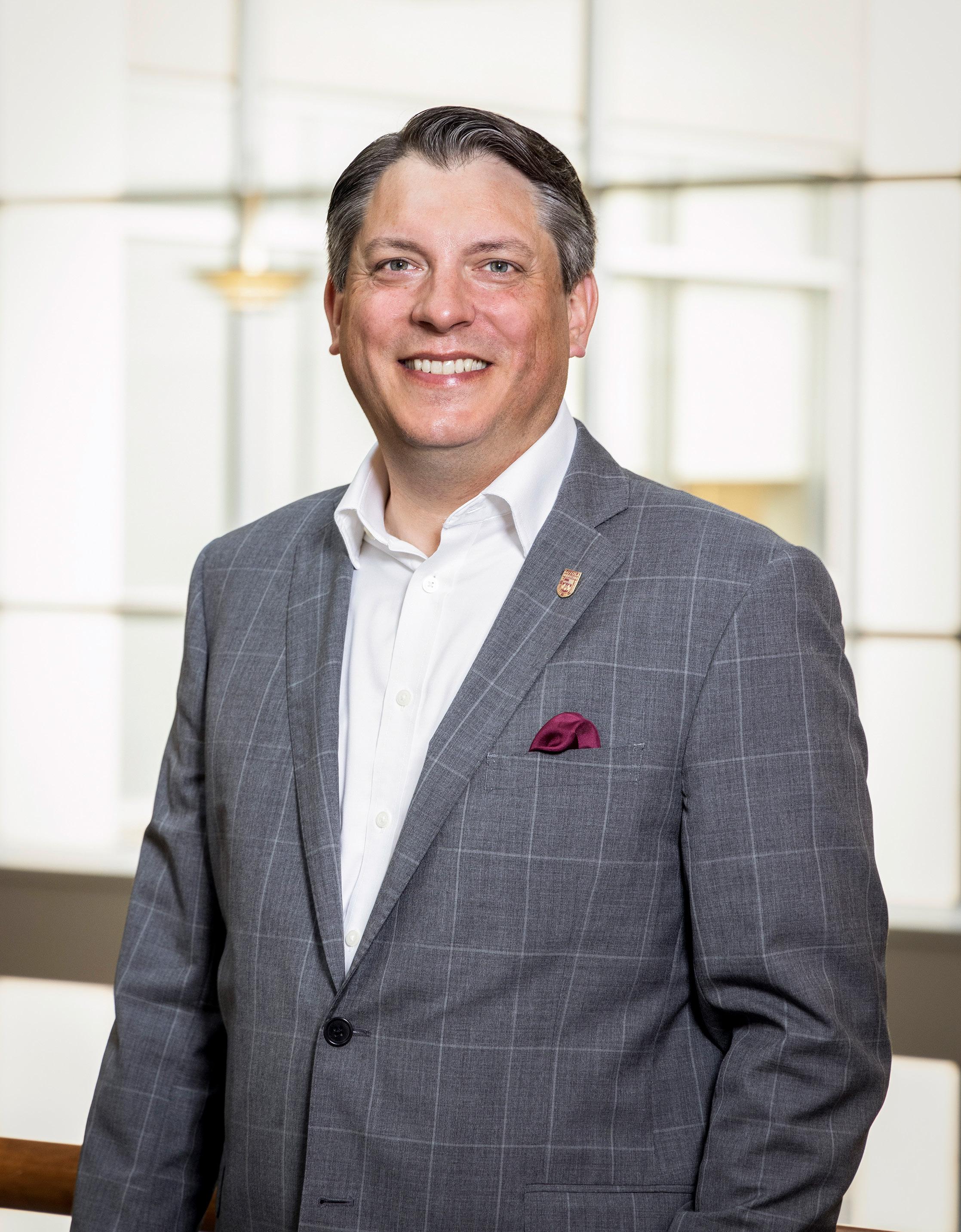
That leap of faith helped bring Gomez full circle: a self-described “cradle Catholic,” Gomez got his start in Catholic healthcare and considers his move to Loyola University Medical Center, one of the most well-known Catholic hospitals in the country, a sort of homecoming.
Loyola Medicine, Gomez explains, encompasses both Loyola University Chicago Stritch School of Medicine and Loyola University Medical Center, which share a campus in Maywood, Illinois. In 2011, the medical center was sold by the university to Trinity Health, a large, national Catholic health system, and now operates as a separate legal entity. When Gomez joined the team, he was determined to help rebuild a close relationship between the medical center and the university based on their shared historical roots.
Of course, there was also work that needed to be done to improve the performance of the medical center. “There are a lot of great people here with amazing institutional knowledge,” Gomez explains. “But I think everyone recognized that we needed to get back to the basics of doing the things that put us in the upper tier of health systems in the nation.”
That back-to-basics effort includes two key elements. The first is a renewed focus on safety and quality metrics. “In
today’s healthcare environment, everything is about value-based care,” Gomez says. “The first part is just about getting back to what we’re known for, and that is doing more, aspiring to be more, and continually being better.”
The second component of the plan focuses on what Gomez has long known about the health system but wants emphasized. “We know that people come to Loyola because they expect great care, but they choose us because we’re going to do more,” he says. “We’re going to treat a physical or mental illness, but we also care about their spiritual health.”
That is not to say that the hospital only treats people with Catholic beliefs. But that religious foundation makes the hospital a welcoming institution where more than two dozen different spiritual leaders are available to treat patients of any faith.
“That welcoming atmosphere is why my whole family is treated here,” Gomez says. “It’s easy to say that it’s because I’m the president here, but it has nothing to do with that. We, like most families, have a choice. We don’t live close to Loyola, but we come here because we know people here care about more than just treating your body. Their care goes beyond that, and it is a phenomenal differentiator for me. It’s why I believe so strongly in this place.”

“It was nice to know I had a whole department praying for me.”
Debra Martinez uses decades of HR experience to align Alera Group and strengthen the company’s diverse and dedicated workforce
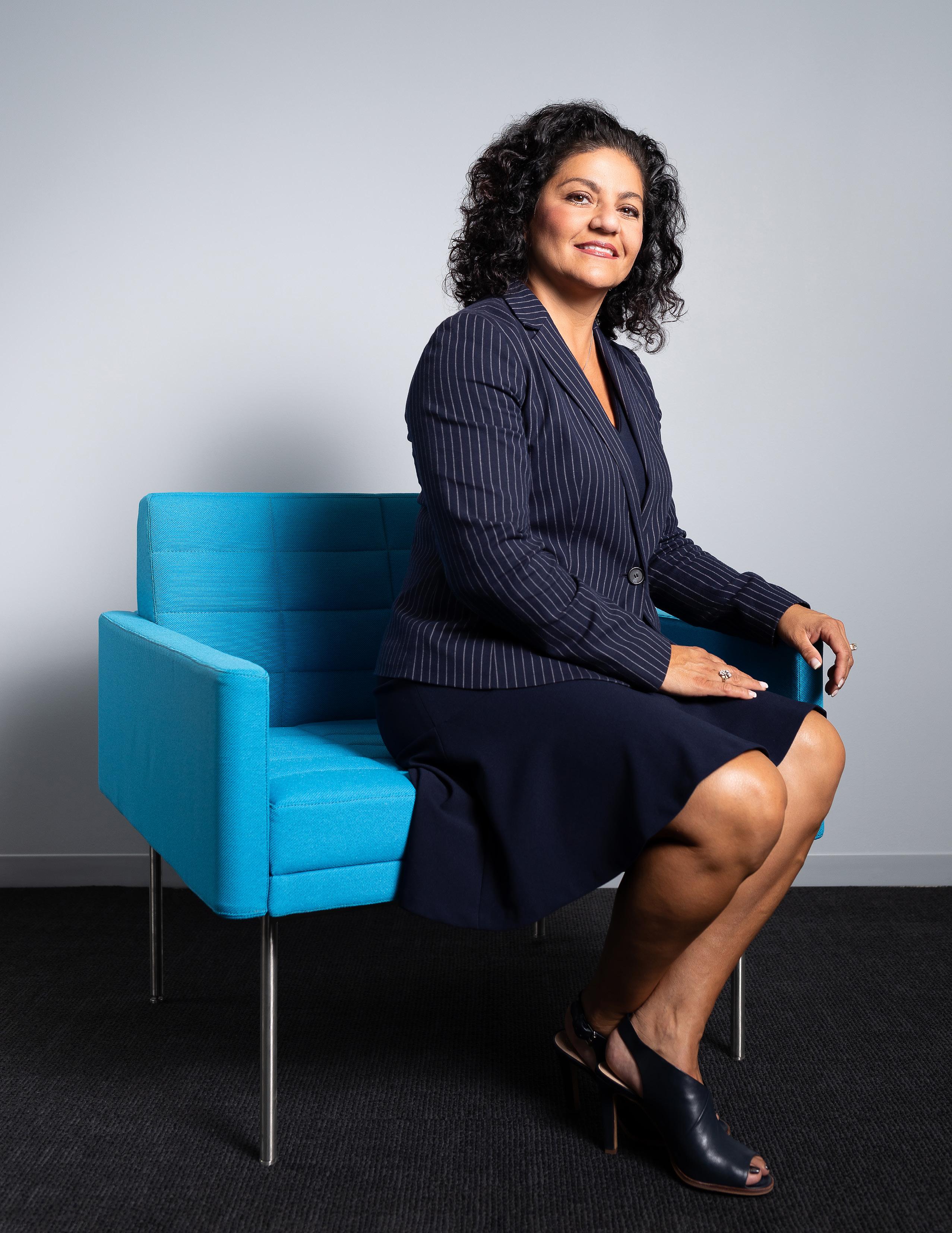
She graduated with a degree in criminal justice from Chicago State University. But while meeting with federal agencies during school career fairs, she was told that to succeed in that field she would most likely need to travel the world. It would probably mean saying goodbye to Chicago. That was something that weighed on her.
Family has always meant a great deal to Martinez. Her paternal grandparents were immigrants from Mexico, while her maternal grandparents were from Indiana and Texas. Her parents had her when they were young adults, and Martinez was the first of her generation to get a formal education and an advanced degree.
“Because my parents were very young, I had the benefit of being very close to both sets of grandparents. I am grateful for the love and support I received.” she explains. “And because of the dynamics of my childhood, leaving
Chicago and leaving my family just wasn’t in the cards for me at the time. Fast-forward ten years, and my perspectives changed with many great career opportunities.”
Career options like being a police officer or a probation officer also didn’t appeal to Martinez. She had completed an internship with the Illinois Department of Corrections in its legal department but didn’t find law school appealing.
“But I did see that I could be in some sort of leadership role in state government,” she notes. So she went for a master’s degree in public administration from Roosevelt University.
While there, Martinez met the personnel director for the Chicago Department of Water Reclamation, who shared with her an opportunity as a GED tutor for a manufacturing company that was looking to help people deemed “unemployable” develop work

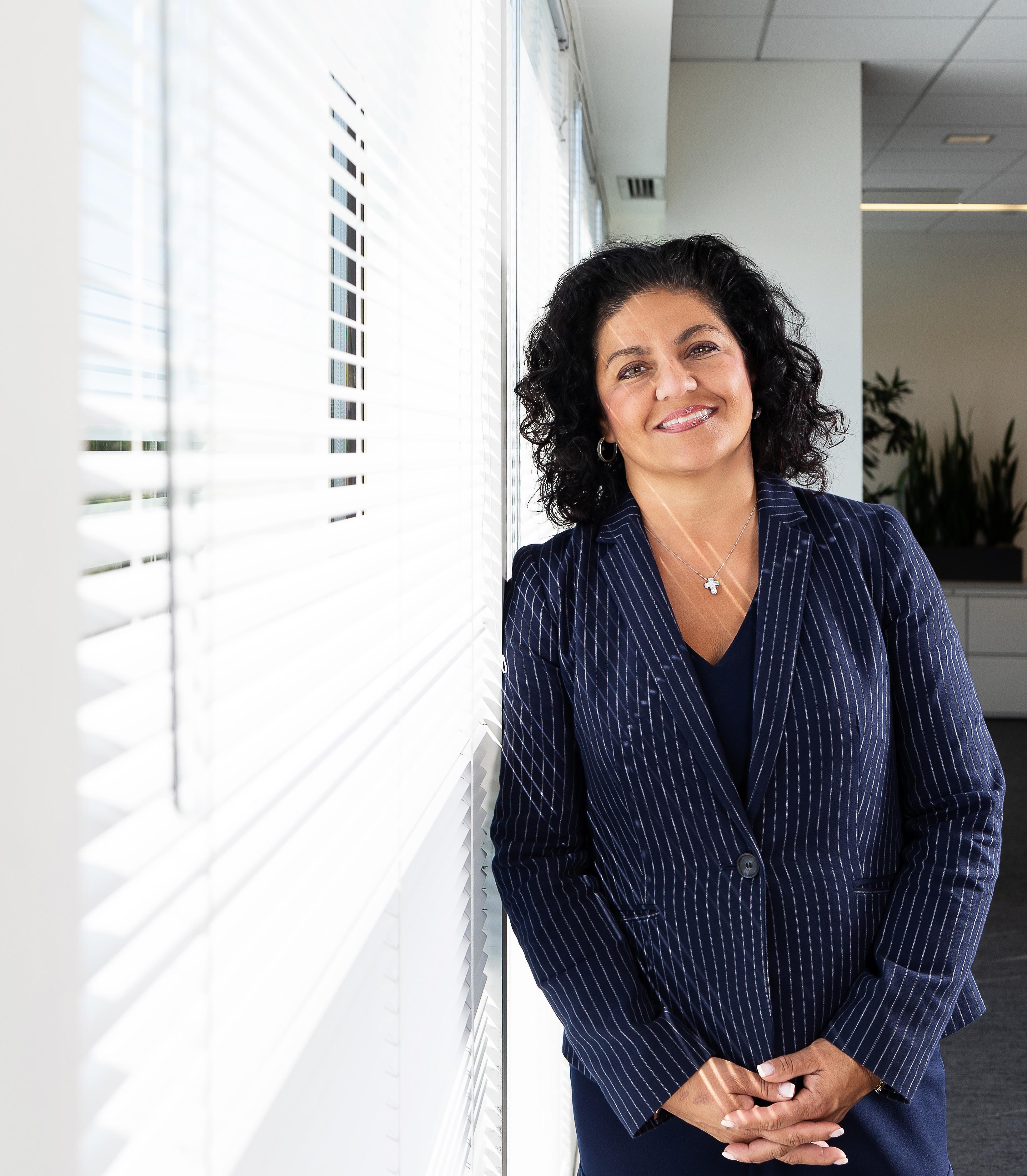
readiness skills. After completing the program, newly trained workers would be hired by the company to make windows, screens, and child guards for high-rise buildings in the Chicago Housing Authority (CHA).
The owner of that company saw Martinez’s strong work ethic and offered her a role in the HR department. Martinez was in her second year of graduate school and revised her coursework, taking classes in the field of HR.
“I started to learn the basics of HR, like recruiting, onboarding, and turnover, in a very practical, real-time way,” she explains. “But I didn’t know what it meant academically because I hadn’t been formally trained. I had the unique opportunity to learn HR backward.”
Now, with twenty-eight years of HR experience in both domestic and global environments, having held positions at GCA Services Group, Allied Waste, and Exterran, Martinez has become an expert in knowing how to work with and for organizations who value their employees from all over the world as well as those individuals’ unique skills and talents. Today, Martinez uses her expertise to align HR processes and programs with ongoing business goals and successfully lead largescale transformation resulting in employee experiences with moments that matter.
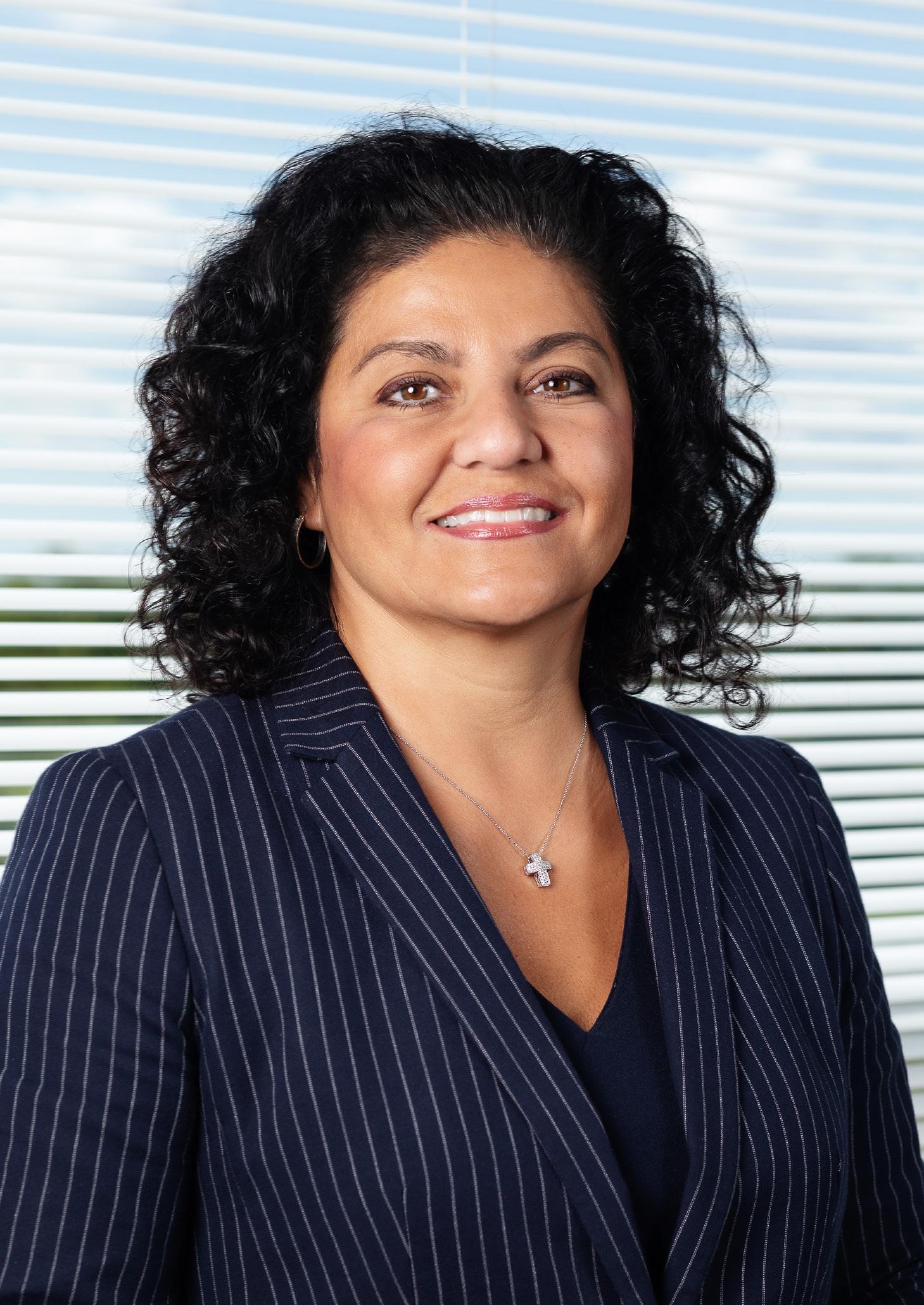
In October 2020, more than seven months into the pandemic, Martinez accepted a leadership role with Alera Group, an
independent, national insurance and financial services firm. She was hired as chief human resources officer, responsible for all things people related at a company with a fast-paced, growing workplace.
“My responsibility is to be the conscience of our leaders and to set the strategy for the company in terms of the employee experience,
from the value proposition, organizational effectiveness, talent development and retention, inclusion and diversity (I&D), and talent acquisition to core HR programming within the full employee life cycle,” Martinez shares. “Also, keeping the strategy alive and making it a rewarding experience for my team.”
As a senior leader at Alera, part of her role is also to drive inclusion and diversity (I&D) efforts and implement institutional change.
“One of the biggest attractions to Alera was the ability to continue to bring value to the organization, especially in the I&D space,” Martinez explains. “We understand that creating an inclusive environment maximizes the opportunity to leverage the full dynamic of differences. At Alera, we use the principles of the Collaborative Way to guide our interactions. We listen generously, honor commitments, and foster inclusion and alignment, which are fundamental to how we work.”
So far, that mindset has made a big difference in making people feel engaged at work. The inclusion and diversity council at Alera has now grown to almost sixty people.
“In my first year, I’ve focused on the biggest business problems that we are trying to solve,” Martinez says. “We are growing organically and by acquisition, and every company that joins Alera is at a different place in the journey. We are creating tools, systems, and processes with learning opportunities
to ensure there’s always something we are moving towards together.”
In addition to strengthening Alera’s workforce during the pandemic, Martinez focused on wellness as she looked to bring employees back into the offices. “Being intentional about wellness not only helps address stressors, it also supports positive working environments where our teams can thrive,” Martinez says. “We have taken a proactive approach in promoting wellness. We care about and value our employees and their well-being.”
The company has been taking a conservative approach to bringing people back together, staying up-to-date on CDC guidelines as well as the needs of their colleagues, families, and clients.
“We demonstrated that working virtually, we are highly productive,” Martinez says. “We have very few people in our offices now, and for those who prefer to work in the office, we have reconfigured the space with COVID prevention protocols and safety measures.”
Though it was an uncertain time, the decision to come to Alera when she did was one that Martinez feels was a great step for her career. “The organization is built around a lot of really smart people who care, and that culture is very clear,” she says. “There is such a positive energy, and people are looking to make a difference and add value. It was an opportunity to be part of something that was bigger than me.”
Debra Martinez also brings positive change in the world through her volunteer efforts. She sits on the board of trustees for the Arbor School, which, with a student base that includes children with a wide range of developmental delays, is the most comprehensive special needs educational program in Houston. The Arbor School strives to educate, empower, and build hope for children with significant special needs and their families.
“The Arbor School provides students with an actual program to help them build their skills to their fullest potential,” Martinez explains. “We have just built a new facility, which provides us the opportunity to expand our services and increase our enrollment. We specialize in a 100 percent individualized curriculum, which enables our students to learn and realize their greatest potential.”
Having been on the board since 2012, Martinez is proud to have been able to make a difference for so many, and she sees a direct link to what she does in her inclusion and diversity work at Alera Group.
“The students are really an unrepresented group,” she explains. “When people stop to think about diversity and inclusion, they often think gender and ethnic backgrounds, but this is an opportunity to create future awareness that I&D does include special needs with various abilities.”
“We understand that creating an inclusive environment maximizes the opportunity to leverage the full dynamic of differences.”
NATALIA CORTEZ BURDETTE DIDN’T have the easiest childhood growing up in Brooklyn’s Crown Heights neighborhood. But she credits those experiences with laying the foundation for her grit and her eventual journey to becoming senior managing director and senior associate general counsel of Teach for America, a nonprofit organization that champions educational equality.
“I grew up with my single mom in Brooklyn,” Cortez says. “Even though I was in one of the nation’s poorest school districts, Mom somehow always made sure I had the best resources. School became my thing—the librarian took me under his wing, and I was often known as the teacher’s pet.”
But even though she earned a slew of academic accolades during those years, college provided an unwelcome realization.
“I had tested into an advanced calculus class at Northwestern University and really had trouble keeping up with everyone else,”
she recalls. “I found the same situation in other advanced courses my first year—my education up to that point wasn’t really as solid as I’d thought.”
But Cortez invested in a coffee machine, worked even harder, and eventually excelled, She even surpassed her peers. She also went on to complete internships with advertising giant Young & Rubicam and finance giant Goldman Sachs. The experience sparked her interest in business, and she later received a job offer from global consulting firm Accenture. But Accenture deferred many offers, including Cortez’s, following the events of 9/11.
A friend who knew of Cortez’s passion for education suggested she look into opportunities at Teach for America (TFA), and she was hired as an admissions fellow for TFA in the same year. “I saw that I could have a career that would leverage my strengths and be focused on an important mission,” she says.
In private practice, Natalia Cortez Burdette always felt she wanted to give back more. At Teach for America, she’s filled that need.
Eighteen months later, Cortez decided to advance her education and explore an early interest in law. She enrolled in law school, obtaining her JD from the University of Michigan while serving as a summer associate for both Weil Gotshal & Manges and Debevoise & Plimpton. She joined the latter firm full-time as a corporate associate in mergers and acquisitions in 2006.
“I was fortunate,” she reflects. “It’s the best law firm in New York. I got interesting, high-profile work—unusual for a first- or second-year associate—and established valuable connections.” Cortez was on a partnership track, but then she realized she wanted to make a greater impact. “At Debevoise I’d carved out a pro bono practice for education clients, but I wanted to make a bigger impact for children like me,” she explains.
Fortunately, that epiphany coincided with an opening at TEA in 2010. While her day-to-day duties focus on operational policies
Natalia Cortez Burdette Senior Managing Director and Senior Associate General Counsel Teach for America
and compliance, employment law, trademark and copyright protections, contracts, and other operational and corporate matters, Cortez also advises internal groups on partnering with schools, financing and funding, program support, and much more.
“Everything I do is mission driven,” Cortez says. “I partner with people to understand their goals—and then do everything I can to enable their success.”
Although Teach for America addresses educational inequities, it is not merely a pipeline for putting more teachers into classrooms,” Cortez emphasizes. “Teaching is a core component, but TFA is actually a leadership development organization. We strive to get the best and brightest into classrooms so they can experience these disparities firsthand and better understand what really needs to be done to reach our ambitious goal.” Afterward, she says, those leaders can continue to serve, whether it be staying in the classroom or as high-profile advocates for educational reforms throughout the US.
Cortez herself has had a substantial impact on the organization. She’s led the development of a contract management system to get a handle on over fifty regional sites’ contracting. She also supported a major initiative to reexamine TFA’s standing antiharassment policy. “We want to evaluate its overall efficacy, concentrate on finding ways to improve it, and then develop the best ways to implement those changes,” she says.
And while she’s always been involved in TFA’s summer institute training programs, the past two years have provided her opportunities to make even more of a difference. “Formerly, we ran our preservice component on the path to alternative certification in person,” she explains. “In 2020, we went completely virtual, and that required a deep dive into everyone’s rights and obligations, setting up new systems for everything from
partnerships to risk management, handling incidents in real time, and relying on data analysis to pivot and adapt simultaneously.”
Cortez also helped the organization adapt to the COVID-19 pandemic. “We tried to prepare for all contingencies. Systemwide, we felt good—but every individual situation requires attention,” Cortez says. “Our corps members faced different landscapes throughout the country. How do we empower them to make the best decisions for their safety and well-being? What new policies and procedures do we need to support this? Not to mention public perceptions and community reactions.”
The events of 2020 had a further impact on the TFA: the organization instituted a formal antiracism policy. “We’ve always aspired to be antiracist,” Cortez notes, “but it takes a lot more than just wanting it.”
As part of that effort, TFA engaged the Racial Equity Institute (REI) for an organization-wide equity audit and training. “I consider myself very aware and knowledgeable about historic events, but during the training, I realized how much more I needed to learn,” Cortez says. “It’s putting us on the path to a common understanding and language, and that will help us move together faster.”
All of these programs, and innovations will help Teach for America reach one ambitious goal—to double the number of children who reach key educational milestones by 2030. “We’ve developed many cross-functional groups to address that goal,” Cortez says. “Currently, a lot of my work is centered on supporting to systems focused on improving teacher and student outcomes. We’ll need to be innovative and to enlist the support of communities and their leaders. With change and innovation may come great risk, but my role is to listen, learn, and adapt while ensuring we are mitigating risks to the extent possible and practical.”
“I saw that I could have a career that would leverage my strengths and be focused on an important mission.”
We congratulate Debevoise alumna Natalia Cortez Burdette for the due recognition on being featured in Hispanic Executive.
New York
Washington, D.C.
San Francisco
London
Paris
Frankfurt
Luxembourg
Moscow
Hong Kong
Shanghai
www.debevoise.com

IF AN ORGANIZATION WANTS TO BUILD a connection to its community, if it is truly invested in working for the betterment of people both inside and outside its walls, it will hire someone like Orson Aguilar. The senior director of public affairs at Oportun has spent his entire career working to help others achieve their dreams, regardless of where they come from or what obstacles may be in their way.
Aguilar is a veteran public policy and consumer advocate, having spent twenty years at the Greenlining Institute, a nonprofit that advocates for economic opportunity for— and empowerment of—people of color. He worked his way up from a program manager position to president of the organization in just over ten years.
Oportun is Aguilar’s first position in the private sector, but the organization’s mission-driven work and determination to
accelerate the economic advancement of its customers and the communities it serves align perfectly with Aguilar’s upbringing, his skills, and his own mission of community empowerment.
Aguilar’s parents emigrated from Guatemala and raised their three children in a two-bedroom apartment in the Boyle Heights neighborhood of Los Angeles. “We grew up in a dynamic environment,” the senior director says. “Our apartment complex had over a thousand units, and since nobody had a yard, we were always interacting with each other. Whether we were eating tacos in someone’s apartment or just walking around the neighborhood, it seemed like everyone knew your name.”
It was only later that Aguilar would realize that his upbringing came hand in hand with experiences that are far from universal.
His parents, like many of the parents in the complex, worked long and often nontraditional hours, which meant Aguilar sometimes had to navigate tumultuous situations.
“I thought everyone had to deal with shootings, with friends dying, and with helicopters flying overhead every night,” he explains. “I lived in a community where we all rented apartments and nobody had college degrees.”
As a young man, Aguilar developed asthma (a condition he has to manage to this day), which he attributes to the environmental factors in the area. Train yards, freeways, incinerators, factories, and lead paint were all prominent in Boyle Heights; as a result, environmental justice is an issue that remains close to Aguilar’s heart to this day.
But Aguilar’s passions extended to other aspects of his community, and as a young
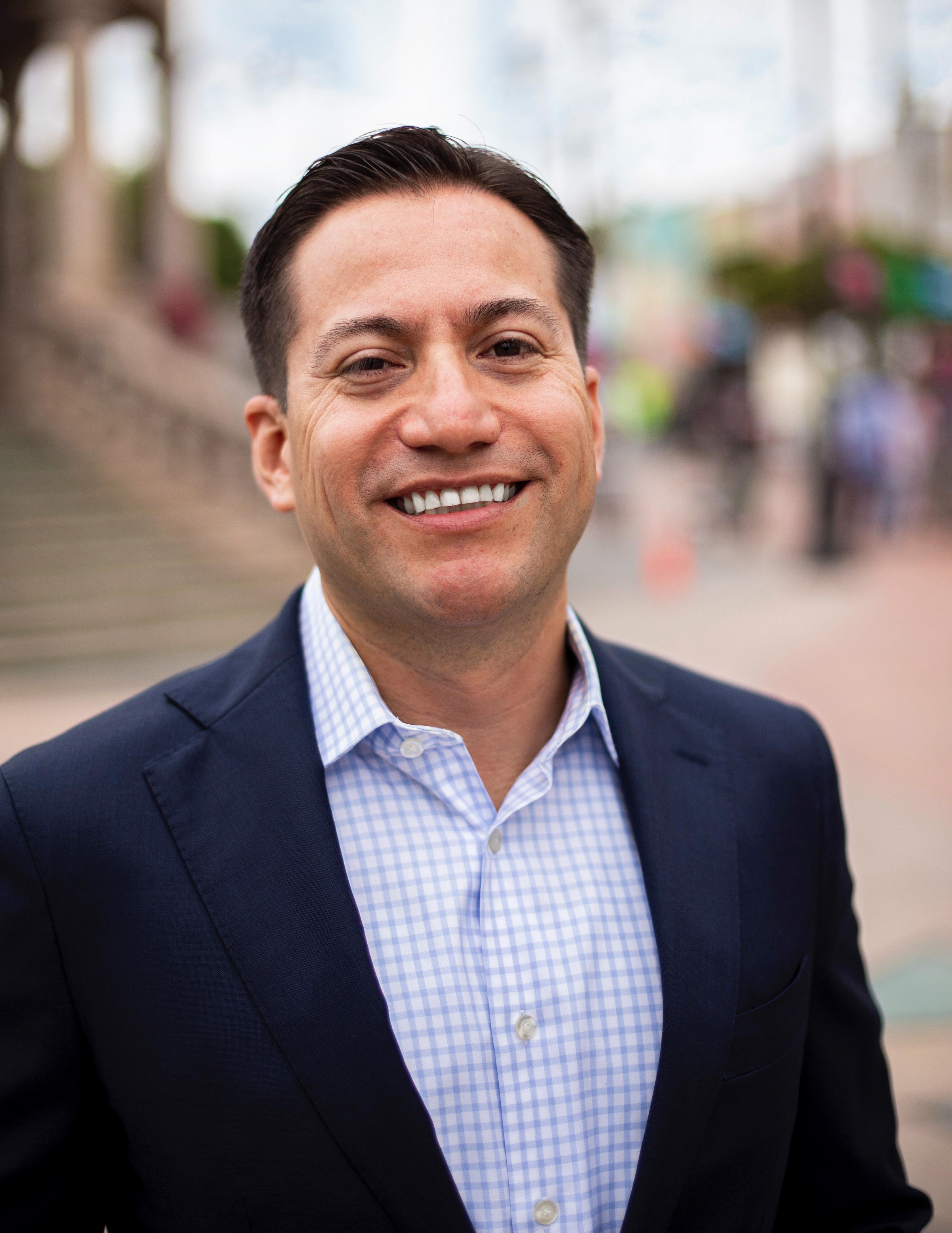
man attending the University of California at Santa Cruz, he helped create an after-school club for kids. He and his friends got permission to use a community center for tutoring and other enrichment activities. “I realized that I wasn’t exposed to professionals in the world, other than teachers and police officers,” Aguilar explains. “Our goal was to help kids who had come from similar circumstances to encourage them to continue their education.”
Twenty-five years later, Aguilar is helping similar communities access credit and financial services. Such services have often eluded Oportun’s customers, Aguilar says, solely because they haven’t been able to establish credit scores. “This role has been a natural segue for me,” he says. “I have always been a strong advocate for inclusive and affordable credit that leads to stronger economic outcomes for families like mine.”
Prior to Aguilar’s arrival at Oportun, the company had submitted a bank charter to expand their ability to serve communities across the United States. While that charter is still a work in progress, Aguilar says it’s been incumbent on him to keep an eye on the direction of federal policy, maintain relationships with vital stakeholders, and find alignment with other consumer advocates.
One of those valuable partnerships has come through: Oportun’s relationship with the National Community Reinvestment Coalition. The two organizations issued a joint statement advocating for inclusive access and fair lending in a financial world that is finding itself more and more automated by artificial intelligence.
“We both want to make sure that we’re always responsible for our credit decisions,” Aguilar says. “We want to make sure that in this new financial world, we’re providing fair access to capital, especially for Black, Latinx, and other underserved communities.”
Given his extensive experience working on behalf of communities in need, there’s no doubt as to why Aguilar has found himself on the boards of community-oriented organizations such as GRID Alternatives and Green Latinos.
“Throughout my career I have found myself collaborating with community leaders, bank executives, and top government officials on economic opportunity programs,” Aguilar reflects. “For me, being collaborative is the most important thing you can do to succeed in a career.”
Looking back on his career, Aguilar is adamant that he would not be where he is today were it not for specific programs aimed at helping economically disadvantaged and underserved communities pursue their education. From his college acceptance to his public affairs MPA from the University of Texas at Austin to the Congressional Hispanic Caucus Institute fellowship that gave him the opportunity to pursue his passion of community empowerment, Aguilar’s experiences make him the perfect example of how increasing access and opening up opportunities can create leaders who are invested in improving the outcomes of future generations.
“I thought everyone had to deal with shootings, with friends dying, and with helicopters flying overhead every night.”
Years ago, Blanca Gonzalez was told she would never make it to college. Today, she’s an SVP at lululemon and proves to both herself and her team members that anything is possible.
BY DONALD LIEBENSONTHERE IS A CERTAIN TYPE OF NO THAT can be particularly toxic. It is the no that discourages. Blanca Gonzalez was in high school when her counselor told her that she would never go to college because her family did not have the resources. Gonzalez was devastated, but her older sister assured her that they would go to college and prove to the world they could be successful.
Today, Gonzalez is senior vice president of global merchandising for sporting apparel company lululemon. Unsurprisingly, she is especially invested in team building and mentorship. Her guiding principles: “Don’t let the noes bring you down. Don’t let people define you. You define yourself and what you want to achieve.”
Gonzalez was born in Mexico, the youngest of five. Her parents came to the United
States when Gonzalez was three years old. “They came for better opportunities,” she says. “My father worked in factories; my mother was a seamstress. We had very little, but by working hard, we were able to accomplish a lot. A very important moment in my life was when my parents bought their own little home. They live in it to this day. I saw their hard work and dedication and passion. I believed that anything was possible, and that has carried through my entire life.”
Gonzalez and her sister were the first in their family to attend college in the US. Her sister is now a teacher, while Gonzalez has followed her lifelong passion for fashion. “I used to make clothes for my Barbie,” she says with a laugh. “It’s in my DNA; my great-grandmother in Mexico was a designer, and my mom is very creative.”
Gonzalez attended a fashion school in Westwood, California, a college town adjacent to UCLA. One of her professors there served as her first mentor. “I remember being in the classroom when she said, ‘I just want you to know you have so much potential and you are going to go far,’” she recalls. “When you’re young, you sometimes don’t believe a lot of those things, but she really believed in me.”
They remain close to this day.
Gonzalez came to lululemon in February 2021 after two decades at Nike, where she

played an integral role in expanding the company’s reach into the Latino community as well as pioneering influencer and energy marketing.
As she puts it, her current role is focused on finding new opportunities for lululemon to grow and on creating product and merch innovation. “I learned a lot at Nike,” she says. “I wanted to take all my learning and support lululemon as we continue to grow globally by developing those strategies. I’m on a growth trajectory too.”
Gonzalez considers it an important part of her role to pay it forward by way of mentoring her team members. “It’s important to have people in your life who show by example it is possible to achieve your dream,” she reflects, “people who believe in you.”
As a leader, she strives to always consider what her team needs from her. “As you get to bigger roles, you have to realize you are so critical. Taking responsibility as an enterprise leader means setting the right tone,” she explains. “I take the responsibility
of making sure I am there for the team very, very seriously.”
Another core value Gonzalez hopes to instill in her team is achieving a healthy work/life balance. “I’m a mom of three,” she says. “I have twin girls, eleven, and I have a son, nine, with special needs. I always tell my teammates that our work is intense but to make sure you spend time with your families—and also to make sure you make time for yourself. It’s critical for your own success as well as your team’s.”
For Gonzalez, taking time for herself means getting up early on Sunday mornings to read and enjoy a cup of coffee before her husband and children waken and what she laughingly calls “my happy circus” begins. “One thing I truly enjoy are morning walks with my children,” she adds. “We share and talk about each other’s days.”
For the past four and a half years, Gonzalez has also served on the board for the Special Olympics of Southern California. “When I retire from corporate America,” she says, “I want to be president of the board.”
The SVP was very attracted to the inclusivity of the lululemon brand and to its cross-generational appeal. Her daughters, she says, have served as something of a focus group for their mother. “I’m always asking for their insights [about fashion], and I always take them to heart.”
Gonzalez’s passion for inclusivity also drives her to advocate for diversity in leadership, both at lululemon and in the corporate world at large. “I consider it a huge responsibility to represent not only women but also my community,” she says. “I was impressed that lululemon values these things and has created support systems to enable diversity. Being able to share my journey can serve as an example that if you put your heart and soul into your passion, you can achieve it.”

“Don’t let people define you. You define yourself and what you want to achieve.”
Lexi
Hernandez draws on her full self to lead Raytheon Missiles & Defense’s talent development and DEI departmentWHEN REVIEWING HER RÉSUMÉ OR LinkedIn page, it’s easy to conclude that Lexi Hernandez is highly accomplished. She’s the director of talent development, diversity, equity, and inclusion (DEI) at Raytheon Missiles & Defense (RMD). She’s also a doctor of philosophy in industrial/organizational (I/O) psychology and serves on the board of the Tucson Hispanic Chamber of Commerce.
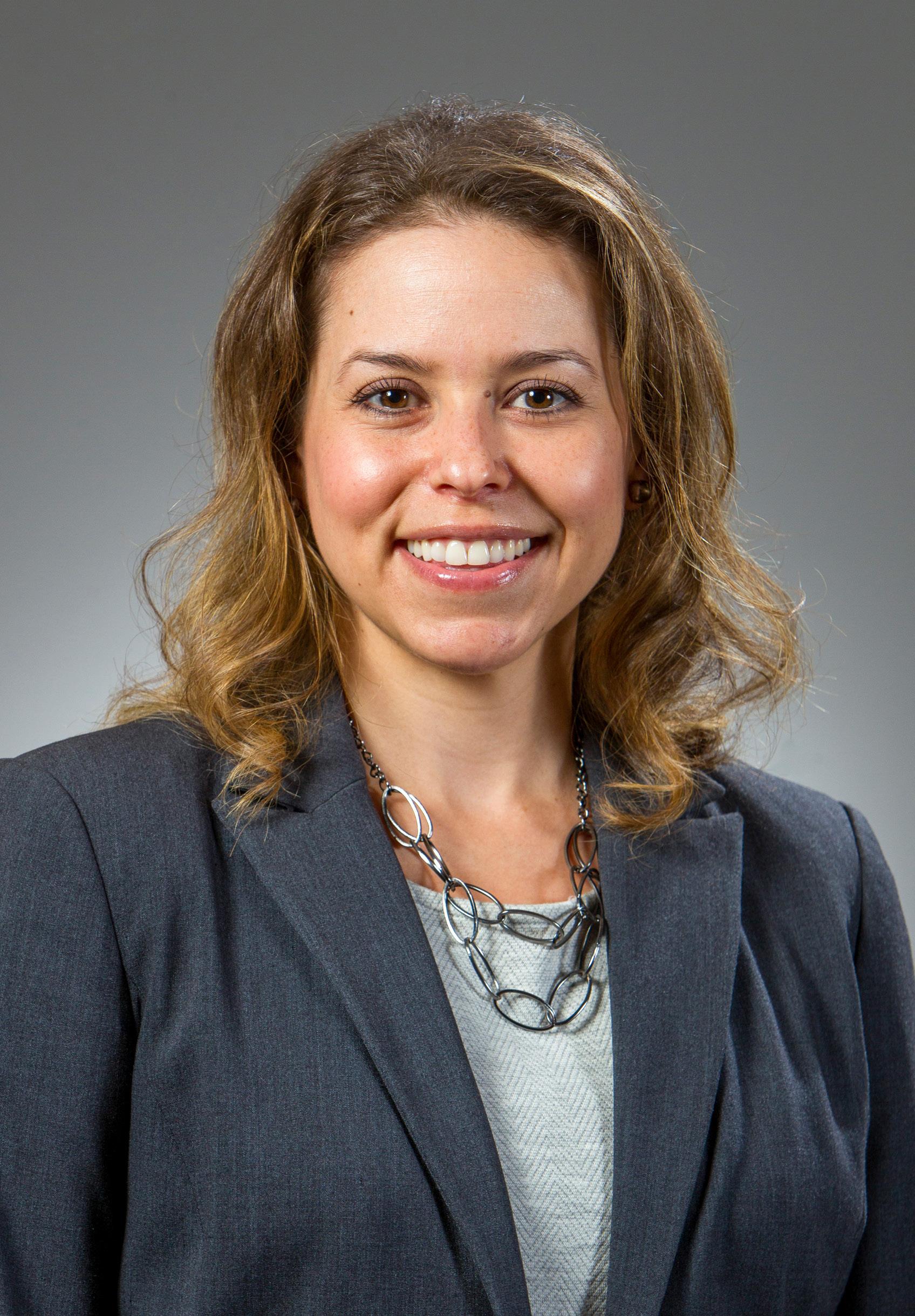
While her accomplishments are certainly impressive, she is of course much more than the titles on her résumé. Hernandez is authentic, progressive, and perhaps most important, driven to create lasting change at Raytheon and beyond.
According to Hernandez, her calling to advance DEI was ignited by her parents and the conversations they would have on the topic when she was young. “We would talk about human equality and civil rights and how to use our voice to help others,” Hernandez recalls. “I believe it had a lot to do with my mother’s life experiences.”
Her parents met in England, where her father was stationed as part of the US Army Air Forces and her mother was a member of the British Women’s Land Army. “They moved to a small town in New Mexico that was composed of Hispanic and Native cultures, where my mother was born and raised,” Hernandez says. “As an educator, she sought out opportunities to immerse herself with different groups, including teaching special education in school districts of varying socioeconomic status.
“Through this exposure,” she adds, “she learned the value of cultural differences and also became keenly aware of the barriers faced by marginalized populations. She bestowed the importance of education, acceptance,
and advocating to end discrimination on my sister and me.”
Like many in the Latinx community, Hernandez faced hurdles of her own related to her heritage. “Being a Hispanic American in the US is a dual identity that’s always competing,” she says. “It’s hard to find where you fit in. My father is of Spanish and Mexican descent, but I was never Hispanic enough because we didn’t grow up speaking Spanish or following certain traditions. I also wasn’t
white enough. It was a struggle to develop my sense of self.”
But as Hernandez grew both personally and professionally, she realized that her mixed heritage is a privilege and enables her to navigate different environments.
Hernandez studied psychology at the University of Arizona, where she also met her husband. After graduation, she contemplated what to do with the degree. One day, while at work chatting with a customer, she was introduced to the topic of I/O psychology. As Hernandez puts it, the rest was history.
Upon graduation, Hernandez moved to San Diego and began her I/O psych PhD program at Alliant International University.
“What interests me about I/O psych is the possibilities,” she explains. “It’s about understanding the human dynamics of an organization and equipping people with the necessary resources so they can achieve results. Meeting the needs of the workforce so that they can meet the needs of the business can be complex and rewarding.”
Hernandez’s first foray into the field was an internship at TalentSmart. She worked there for three years and quickly moved through the ranks to director of learning programs and client services.
After TalentSmart, Hernandez completed a short stint as a consultant for PetSmart before landing a position at Raytheon Missile Systems in November 2008. As she did at TalentSmart, Hernandez was able to build a strong brand and utilize her I/O psych knowledge to take on roles of increasing responsibility. She started as a learning strategist in the engineering organization and then transitioned into various leadership roles within the human resources department.
But in 2016, as Hernandez was finalizing her dissertation and preparing to have her second child, she realized she was ready for a career shift. This led her to joining the
organizational effectiveness team, where she says she was able to flex her educational background to drive performance excellence in the business.
Regardless of her title, Hernandez always stayed connected to Raytheon’s DEI initiatives, whether through helping create new training programs, partnering with employee resource groups to deploy resources, or asking questions in relation to her research. As a result, in 2018, Hernandez accepted a position as director of diversity and inclusion.
Two years later, following a merger between Raytheon and United Technologies, the business unit Hernandez was a part of became RMD, and her role evolved to what it is today. Her responsibilities include overseeing three main talent buckets: talent management, learning and development,

and DEI. And although each bucket is of equal priority, Hernandez says that she’s determined to embed DEI into all facets of the employee life cycle. This means identifying opportunities to mitigate bias in talent processes while integrating solutions to promote an inclusive culture.
As a leader, Hernandez strives to be authentic. “It’s my job to set the strategy and vision and then empower and trust my team to do what they do best,” she says. “Above all else, I can only be my authentic self. I expect the same from them, and that’s what enables our success.”
Another key focus area for Hernandez is raising awareness of—and shifting—cultureand gender-related expectations around leadership effectiveness. For instance, she works on acknowledging and dismantling societal beliefs that male behaviors are more congruent with leadership positions than female behaviors. She’s also striving to expand equitable opportunities for all historically marginalized and underrepresented populations.

“We ask individuals to bring their authentic and best selves to work, but then we try to fit them into a certain mold of leadership based on outdated societal expectations. I want to change that to be more broad and inclusive and honor different styles. I want to challenge the status quo.”
At Raytheon Missiles & Defense, you’ll help pioneer advanced, end-toend solutions that protect citizens, soldiers and critical infrastructure. We’re hiring for a wide range of engineering roles. Join our team to deliver, experience and create more.
jobs.rtx.com
“We ask individuals to bring their authentic and best selves to work, but then we try to fit them into a certain mold of leadership based on outdated societal expectations. I want to change that.”©2021 Raytheon Company, a Raytheon Technologies company
THERE’S NOT MUCH ANTONIO (TONY) Castañon remembers about fleeing Cuba. He was just five years old, after all. It was sudden. His family took nothing with them. They joined other relatives in Spain before living in Costa Rica for a year.
BY ZACH BALIVA PORTRAITS BY CASS DAVISAt age ten, Castañon and his younger brother boarded a plane alone headed for Miami to live with a distant relative after obtaining student visas to study in the US. He didn’t speak English. His parents came eighteen months later. The family moved to Las Vegas, and although his parents found work, there were days they went without food so their children could eat.
The young Castañon became the family’s translator and negotiated everything from lease terms to the purchase of a family car. Castañon had to grow up fast. Or, as he likes to say, he “walked in big shoes even as a little kid.”
Antonio Castañon refused to let life’s early challenges derail his dreams. He’s navigated many obstacles to build a long and impressive career at Citi, and now he’s helping others do the same.
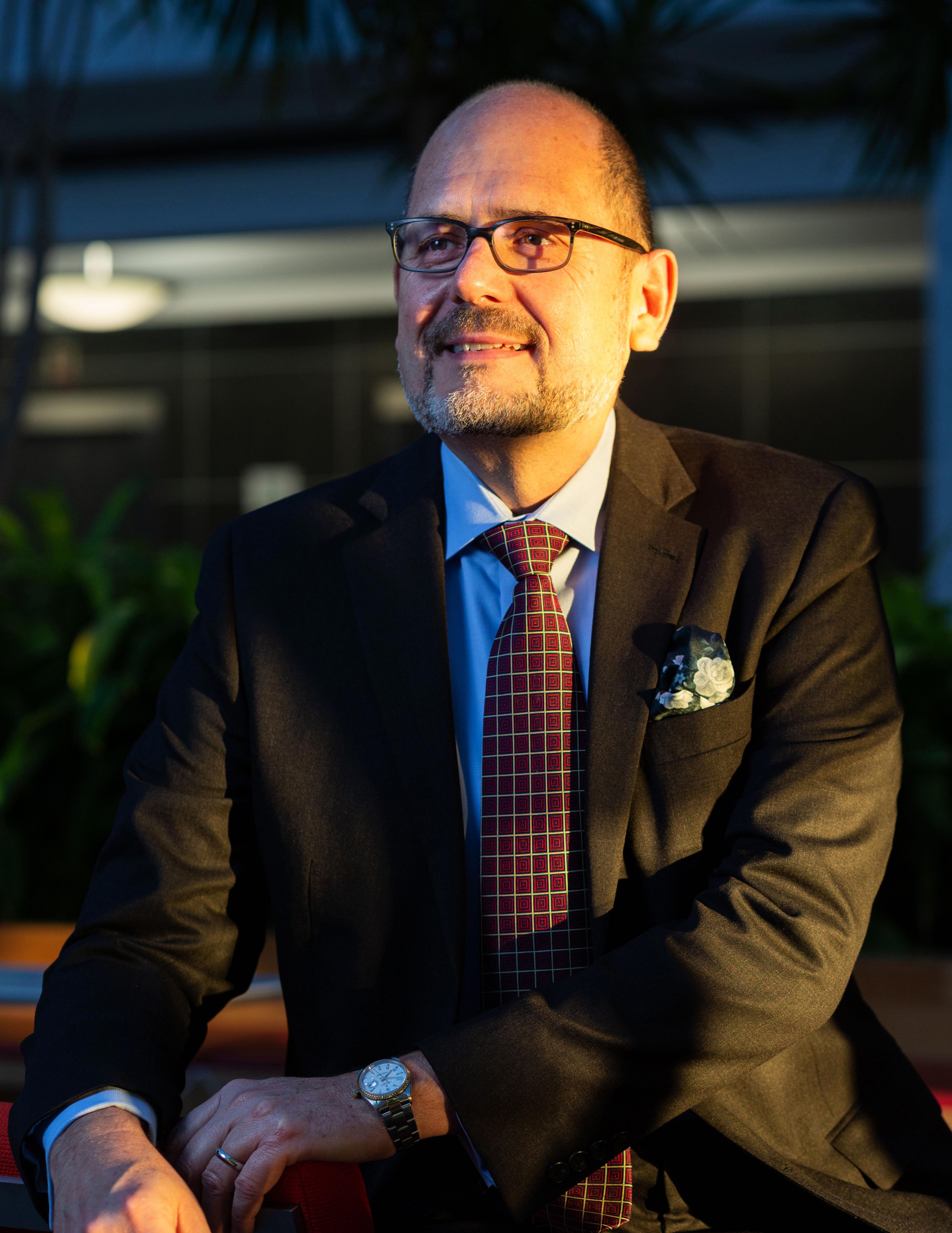
These formative experiences impacted nearly everything about Castañon and continue to influence the way he leads at Citi, where he’s emerged as an expert, respected mentor, and sought-after community leader. “My story defined how I think about the world around me, but it also shapes how I think about business and why I value helping others overcome their struggles,” he says. “Not everything you embark on will be a success, but difficulties and mistakes help us learn and grow.”
Castañon grew up at Citi: with the exception of a six-year hiatus he took to grow his skills in other industries, he’s been with the investment bank and financial services corporation for thirty-three years. It all started back in 1981, after Castañon’s high school graduation. He wanted to go to college but couldn’t afford tuition. When he heard Citi had a tuition reimbursement program, he applied and was hired as a part-time customer service agent in the organization’s new Las Vegas operations center.
At first, Castañon assumed he would stay with Citi for a semester, or maybe for a year, until he moved on to something else. That changed when leaders noticed his talent. First, a manager asked Castañon to take on a special project. Then others funneled bigger jobs his way. Soon, Castañon had developed a reputation as a trusted employee, capable problem-solver, and rising star.

Promotions came rather quickly, which in some ways surprised Castañon. From his perspective, he was simply doing his job. But he had good training, great leaders, and intangible soft skills like charisma. “Overcoming trauma produces strength and resilience,” he reflects. “I knew how to connect one-on-one with people because I had been relied on to smooth things over and interpret in my own house.” He was able to solve complex problems with multiple stakeholders, step into leadership roles, and bring solutions forward.
As Castañon rose through the ranks, he led several memorable projects and initiatives. In the mid-1990s, his team helped bring photos and signatures to the front of credit cards for the first time. After helping develop the technology to enable this innovative security feature, Castañon saw it exported across the globe and used to issue photo cards in many places, including Mexico.
“Citi invests in the communities where we do business, and a huge part of that is focusing on financial literacy in areas we serve, including those that are more diverse.”

That led to Castañon’s first major leadership role. He spent five years running operations for Citi’s Mexico business unit—which, at the time, was relatively small, with six branches and four hundred thousand customers—before leaving Citi to broaden his skills by working in two other fastpaced industries, telecommunications and healthcare.

Six years later, Castañon had logged some important wins and developed some key leadership skills. He was ready to run a business. Returning to Citi would give him the opportunity to manage the Sears credit card portfolio and later fill a similar role for a specialty partners portfolio of twenty-four large brands.
Today, as a managing director and head of collections for Citi’s Consumer Bank Operations in North America, he is based at Citi’s Kansas City site, where he leads a team of six thousand employees who are responsible for collection and asset recovery across the continent.
As he’s done at every stop in his journey, Castañon has brought his own experiences to the role. “I tell my team that this is a people business and relationships matter. You have to listen to people and engage them to solve problems, whether you’re working with a colleague or a customer,” he says.
Castañon is living proof that leading a large collections operation can be an empathetic endeavor. Making
“My story defined how I think about the world around me, but it also shapes how I think about business and why I value helping others overcome their struggles.”
sure Citi cares for customers when they enter the collections journey is his top priority. While he wants to keep people’s accounts out of collections, his job involves recovering assets that total $140 billion in outstanding loans. A best-in-class program filled with the right technology, tools, people, and strategies can accomplish the task without sacrificing integrity or compassion.
A racial gap in financial literacy and other factors makes these issues especially relevant in the Latino community. Castañon’s team offers bilingual services, and collectors are trained to connect customers with resources that can help them get their financial lives back on track. “Citi invests in the communities where we do business,” he says, “and a huge part of that is focusing on financial literacy in the areas we serve, including more diverse communities.”
Within the organization, Castañon serves as a formal and informal mentor and also sits on a Hispanic/Latino Leadership Network and Affinity steering committee designed to promote and develop minority talent. Additionally, he serves on Citi’s Global Diversity and Inclusion council, in which role he is focused on attracting and onboarding diverse talent to Citi. Castañon’s passion for serving others has also motivated him to find community organizations to support. He is a former board chairman of Big Brothers Big Sisters of Kansas City and now helps fundraise for the iconic organization’s scholarship program.
Despite all he’s accomplished, Castañon says he still wants to do more. When he retires from Citi, the kid from Cuba will certainly leave behind big shoes to fill.

XAVIER A. GUTIERREZ HAS ALWAYS embraced the opportunity to make a difference. A seasoned executive with experience across business, finance, and real estate, he’s always spoken his mind about the importance of impact—specifically about advancing the equity and prosperity of the Latino community.
And now he faces arguably his biggest challenge yet. Two years ago, Gutierrez was named the president and CEO of the Arizona Coyotes, which made him the first Latino to lead a team in the history of the National Hockey League and one of the few to have ever done so in a major American sport. Rather than ignore his unique vantage point, Gutierrez plans to double down in his new role and capitalize on the enormous economic power of the Latino community.
The Arizona Coyotes have launched a robust marketing campaign across all media and advertising channels, but for Gutierrez, the work is about more than selling jerseys and driving profits. He’s spent his entire career applying his unique skill set to create opportunities for Latinos and other diverse communities. And now, he sees the chance to
do just that. “Sports has a unique voice, platform, and power unlike anything else, and I have the responsibility to use this position to make a difference in peoples’ lives,” he says.
To understand Gutierrez’s strategy, you have to understand his story. He was born in Guadalajara, Mexico, but was raised in San Jose, California, just as the city was blossoming into the capital of Silicon Valley. Although his father was a mechanic and his mother stayed home to raise a family, they found a way to send Gutierrez to a prestigious all boys college preparatory school, where he became friends with the sons of venture capitalists and powerful CEOs. “My academic experience showed me I could succeed in challenging environments and that I had a duty to achieve and give back with the opportunities that were given to me,” Gutierrez says.
From there, Gutierrez went to Harvard, where he met Fidel Vargas, who—at just twenty-three—became mayor of Baldwin Park, California. The two became friends, and Gutierrez spent one summer as Vargas’s intern. His main projects included convincing In-NOut Burger to move their headquarters to the
When Xavier A. Gutierrez joined the Arizona Coyotes in 2020, he became the first Latino president and CEO in NHL history. He’s spearheading the Club’s effort to increase opportunities for Latino fans and business owners alike.
BALIVA
“Sports teams are economic engines in our communities, and Latinos have immense buying power. Every company in the US needs Latinos, and we are the bridge to prosperity and unlocking economic growth.”
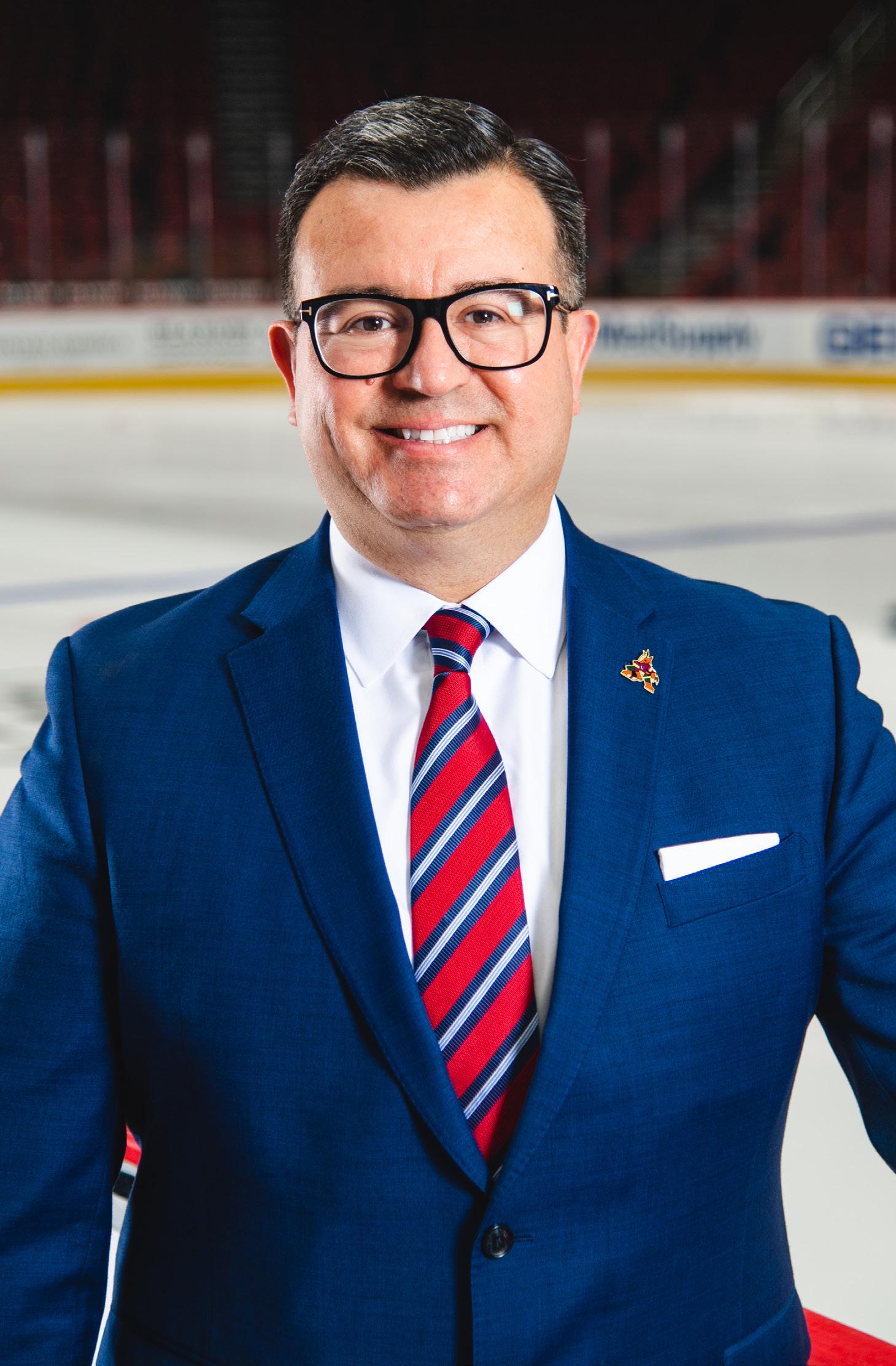
region and researching the disparities and lack of representation for Latinos in the city.
The internship was foundational, but when Gutierrez asked Vargas to help him land a job in politics, the mayor refused. Instead, he got Gutierrez a high-profile job on Wall Street. Gutierrez, who hadn’t studied finance and knew nothing about the job, resisted. Vargas, however, was certain.
“He said we needed people in the Latino community who understood how to unlock
capital and lead conversations about empowerment, equity, and community investment,” Gutierrez recalls. He agreed to take the job, and suddenly, his life had a new mission. Gutierrez started a long and distinguished career in finance, through which he has raised and managed billions of dollars in institutional capital, led hundreds of investments, and started companies—all while focusing on economic development and opportunities for diverse communities.
Before coming to the Arizona Coyotes, Gutierrez held positions with Latham & Watkins and Lehman Brothers. He also served as a financial analyst for the NFL. As principal and managing director at Phoenix Realty Group, he created unique investment funds backed by public pensions and raised over $1 billion to create some of the nation’s first affordable workforce housing projects in communities of color.
Later, Gutierrez helped friend and entrepreneur Alex Meruelo manage a portfolio of more than forty large companies in banking, hospitality and gaming, media, real estate, and retail. Meruelo owns casinos, TV stations, and the largest Latino-owned bank in California. In 2019, Meruelo made history as the first Latino owner in the NHL when he bought the Arizona Coyotes.
Now, Gutierrez is on a mission to replicate what the NBA did to bring a more diverse audience to its sport. The Coyotes are hosting hockey clinics in Latino neighborhoods, changing its menu to include more Latino favorites, and partnering with women and diverse-owned businesses. He believes the relationship between Latinos and the NHL yields opportunities for everyone involved.
“Sports teams are economic engines in our communities, and Latinos have immense buying power,” he says. “Every company in the US needs Latinos, and we are the bridge to prosperity and unlocking economic growth.”
When Gutierrez thinks back on his career, he’s reminded of hockey legend Wayne Gretzky, who famously said he succeeded by learning to “skate to where the puck is going, not where it has been.” Gutierrez has tried to make an impact by noticing emerging needs and pivoting his strategy in response. He encourages aspiring Latino leaders to take the same approach.
“Identify solutions, look for the people who will open unexpected doors for you, and be agile,” he says. “And always find a way to use your influence to positively Impact others.”


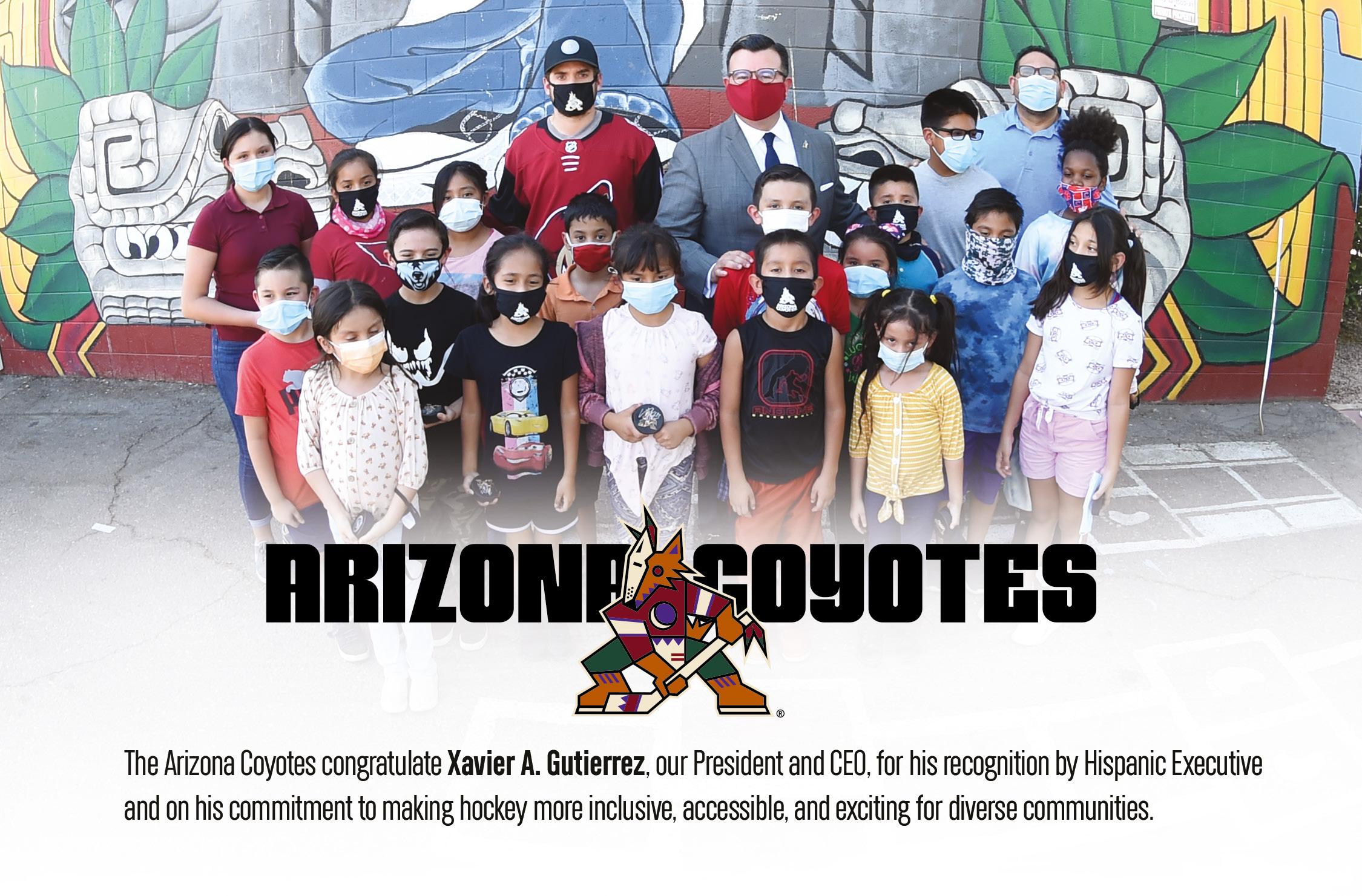
What is your secret to success?
The impressive executives featured here share the business tactics and leadership approaches that have helped them engage employees and drive results.
60. Paul R. Garcia, Frontier Communications 67. Joey Gonzalez, Barry’s 70. Flor Colon, Xerox 76. Sergio De Castro, Aera Energy 80. Tatiane Sanchez, GroupM North America 84. Oliver Perez, Edwards Lifesciences 87. Anna Alvarado, FirstCash 90. Danny Rivera, Driven Brands 94. Omar Vargas, 3MFrontier Communications’ Paul R. Garcia reflects on a legal career that defies tradition
BY BILLY YOST
Indeed, one pictures him equally comfortable on land as at sea.
Garcia, who currently serves as senior vice president and associate general counsel of intellectual property (IP) and litigation at Frontier Communications, has a résumé that weaves in and out of litigation firms, criminal prosecution for the United States Attorney’s office, global IP litigation in-house at GE, and a host of other roles that, the lawyer admits, might beg the question: what’s the plan here?
But it’s all the seeming contradictions that make Garcia such a fascinating interview. The seasoned courtroom litigator speaks with a voice so kind and gentle, it seems like it should be narrating a children’s book. His warm demeanor gives no indication of a lawyer who describes himself as “hyperaggressive,” who has argued on both sides of the courtroom as well as in many pro bono cases.
“I have heard that people had a hard time believing the person they met was the same person they saw in the courtroom,” Garcia
says, laughing. “I don’t like conflict, but I’m very good at working on behalf of others.”
Garcia’s ability to traverse the many different sides of the legal world is perhaps attributable to his parents, who themselves traveled the world before meeting in the United States. His mother arrived from Asunción, Paraguay, in 1959; his father’s family settled in “Nuevo Mexico” (New Mexico) in the early 1600s. After meeting in college, both of his parents became teachers in Omaha, Nebraska, where Garcia was raised and encouraged from a young age to advance his education.
“My mother spoke with a strong accent, but she was so involved in the community,” Garcia remembers. “Watching this short woman from South America who was so passionate meant a lot to me.” He still keeps her citizenship papers on his desk—papers she worked hard to earn so she could vote for Robert F. Kennedy before he was assassinated in 1968.
Given the ease with which Paul R. Garcia seems to navigate the legal terrain, one would never imagine that he has felt like a fish out of water for much of his law career.
 Paul R. Garcia
Paul R. Garcia
That community spirit undoubtedly played into Garcia’s move from firm life to the US Attorney’s Office for the Northern District of Illinois, where he worked from 1996 to 2001. But there, again, was a contradiction. “I had mixed feelings working as a prosecutor because so much of what we were seeing was Black and brown people being prosecuted,” Garcia remembers. “At the same time, I felt it was important for me to be in that spot. I thought I could bring fairness and equity to the role and was encouraged to find a lot of people with the same mindset in the office.”
Even before he joined the US Attorney’s Office, Garcia also sought out pro bono work wherever he thought he could have the most significant impact. That impact was two-fold because he would almost always bring along a first- or second-year associate who showed promise.
For one lucky associate, that meant arguing a case in front of the Seventh Circuit Court of Appeals. Garcia and his team were able to get ten years removed from a prisoner’s sentence because the prisoner’s lawyer was dismissed for unjust reasons. The victory was more shocking because two of the three judges on the panel were some of the most conservative on the court.
“Everybody deserves a lawyer, and we were able to make an important contribution to that area of law,” Garcia says. “We also helped someone get ten years of their life back.” The first-year associate would wind up joining the Department of Justice.
Garcia has been practicing in-house since 2016 and with telecommunications giant Frontier since 2018. “Once I took the in-house plunge, I found that I really loved it,” Garcia says. “I really like engaging with the business and helping to head things off at the pass before they become a legal problem.”
If you’re doing in-house work right, Garcia says, it’s certainly different from outside practice—but not in any diminished capacity. Instead of arguing in court, in-house attorneys are given the opportunity

“We have a new CEO, a new board of directors, and this place is just roaring with a new energy and a new vision.”
We join Hispanic Executive in congratulating Paul Garcia for his many accomplishments at Frontier Communications. It has been an honor to partner with Paul and the rest of Frontier’s talented legal team.
McGuireWoods is proud to congratulate
SVP AND ASSOCIATE GENERAL COUNSEL AT FRONTIER COMMUNICATIONS for his well-deserved recognition by Hispanic Executive.
We are honored to serve Frontier as trusted counsel.

to be involved in strategy across a wide array of issues.
Garcia entered Frontier when it was at a crisis point—the company was soon to enter bankruptcy—but according to Garcia, Executive Vice President and Chief Legal and Regulatory Officer Mark Nielsen provided him the necessary runway to take those challenges head-on. “Mark has been so supportive, and he fits so well into the mold of great people who have given me opportunities along the way,” Garcia says. “He’s been one of the best things about coming to Frontier.”
Garcia has also built fruitful relationships with outside partners during his time at Frontier. “As outside real estate counsel for Frontier, I enjoy working alongside Paul on numerous transactions,” says Joan Wolff, counsel for McGuireWoods. “He combines fierce advocacy with a practical nature, always focused on successfully crossing the finish line.”
Today, the lawyer is nothing but excited about the company’s future. “We have a new CEO, a new board of directors, and this place is just roaring with a new energy and a new vision,” Garcia says.
Looking back on the many twists and turns in his journey, Garcia is grateful for the many growth opportunities he’s had—and eager to find even greater opportunities in the future. Given the achievements that are already under his belt, it’s difficult to imagine him not wanting to run a legal department from the top spot. He won’t bite on the question, but the former fish out of water is certainly capable of tackling any challenges that come his way.

“I don’t like conflict, but I’m very good at working on behalf of others.”
applauds Paul R. Garcia for his recognition in Hispanic Executive!
We are honored to work with Frontier
JOINING A GYM OR NEW FITNESS CLASS IS OFTEN intimidating. But back in 2003, when Joey Gonzalez signed up for his first class with the popular fitness studio Barry’s (then known as Barry’s Bootcamp), all his fears dissolved as soon as he stepped into the iconic red room. “I had been nervous about joining because everyone talked about how difficult the class was, but I fell in love immediately,” Gonzalez remembers. “I felt accepted by the community, and this experience really kick-started my fitness journey.”
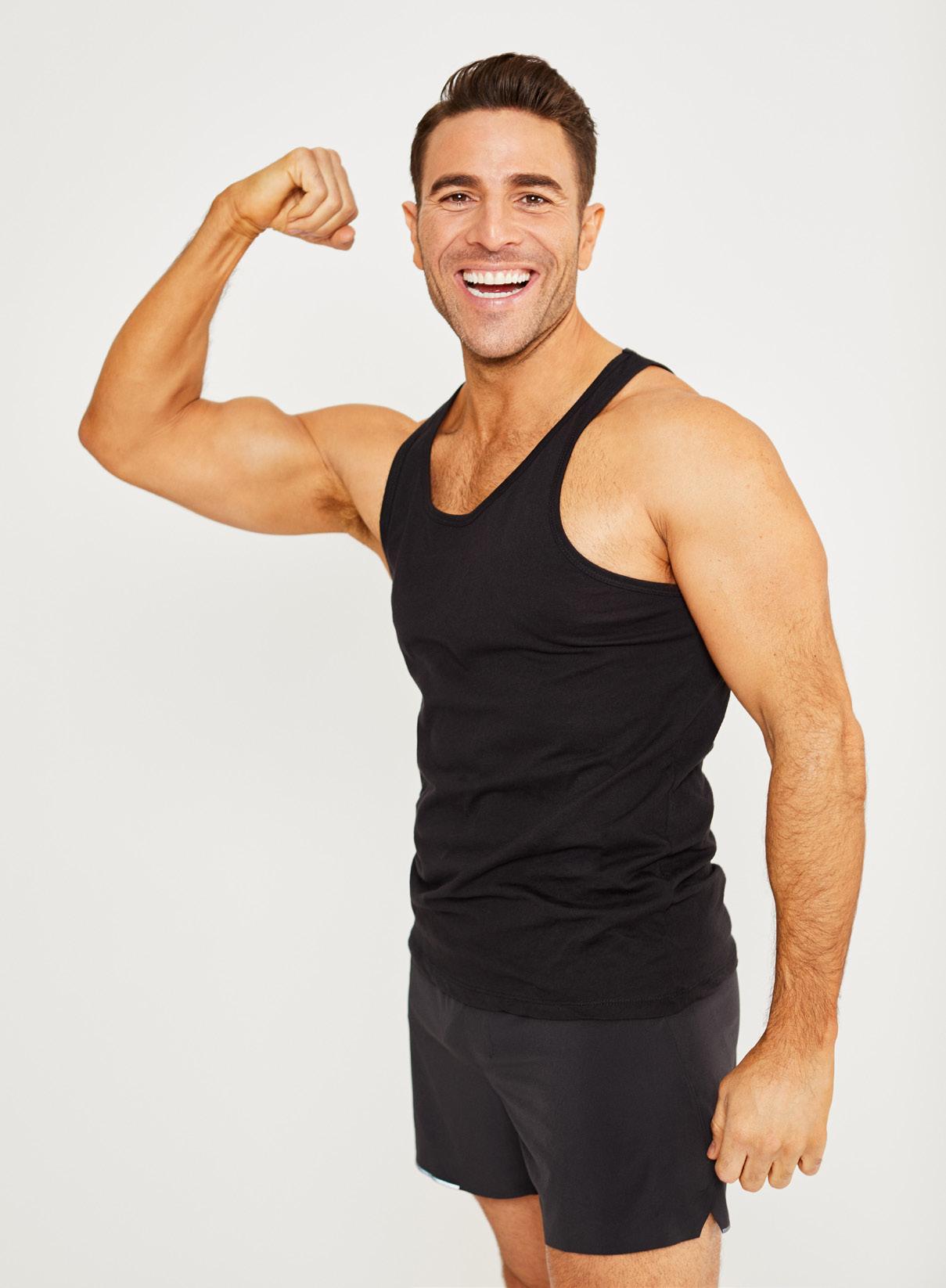
Gonzalez dove headfirst into both the classes and educating himself on physical health and wellness. He immersed himself so fully that it wasn’t long before founder Barry Jay asked him to join the team as an instructor. Over the course of the next few years, Gonzalez worked his way through the ranks from instructor to a senior management role, where he encouraged leadership to expand the brand.
“I spent some time trying to convince Barry and the other investors that taking me on as a partner and allowing me to open some new studios was a good idea,” Gonzalez says with a laugh. In 2009, he was finally able to begin opening new locations, from San Diego to New York. In the process, he learned not only how to build the business side of operations but how to foster “the communities that make Barry’s so special and different to other fitness programs,” he explains. As the company rapidly expanded, Gonzalez’s career grew as well; in 2015, following the company’s private equity transition,
Joey
in 2003 as a member. Today, as the CEO, he is devoted to helping the company evolve and innovate.
investors asked if he would take on the role of CEO of Barry’s.
While his job has changed over the years, Gonzalez’s passion for the brand has not. “There has always been an energy and attitude at Barry’s that I feel incredibly connected to,” he says. “With time and patience, you can do anything you put your mind to. Initially, that manifested in my fitness goals, but it has since manifested in my own life. That is what has sustained my relationship with the brand as well as driven my expansion of Barry’s— because I believed in it and myself.”
Since joining Barry’s, Gonzalez has seen many iterations of the business and has pushed to improve it with each new transformation. “When I started at Barry’s, it was absolutely a ‘no-frills’ experience. There was one toilet room in the actual studio, which always had a line of ten to fifteen people waiting to change or use it, and there was essentially no lobby,” Gonzalez remembers with a laugh.
At Barry’s Chelsea in New York City, Gonzalez reinvented the footprint of Barry’s studios. “We took on more square footage, added locker rooms and showers, and [added] the Fuel Bar, which I saw as a great opportunity to drive the community aspect of Barry’s,” he explains. In 2018, Gonzalez oversaw a rebranding of Barry’s, which dropped “Bootcamp” from the name to provide a more inclusive environment for attendees, and added several different class modalities for a more diversified fitness experience.
Gonzalez believes this type of evolution illustrates one of the core values at Barry’s: innovation. “Barry has been an innovator from the start, since he essentially founded the first boutique fitness concept. Barry’s was born out of innovation, and that innovation is what has continued to help us reinvent ourselves,” Gonzalez says.
In 2020, that core value was put to the test during the pandemic, as fitness companies had to get creative with how to provide support for their clients through

“I spent some time trying to convince Barry and the other investors that taking me on as a partner and allowing me to open some new studios was a good idea.”
nontraditional mediums. Gonzalez and his teams were quick to respond. “We initially went on Instagram Live to host an at-home training session, and when we saw how many people joined, we knew we had to develop a digital experience for our clients,” he explains. Shortly after that initial session, Barry’s launched Barry’s at Home, a virtual fitness offering that served as the foundation for Barry’s X, which launched in August 2021. “We really tried to capture the same feeling of being in the red room, where clients can still receive live feedback from instructors while they work out at home,” Gonzalez says.
Beyond driving the current and future business evolutions that Barry’s will undergo,

Gonzalez hopes to continue fostering an area that sets Barry’s apart: its inclusive community. “Growing up as a gay, Hispanic kid in a homogenous part of the country, I learned at an early age what it’s like to be left out and to not have a community at my fingertips,” he says. “And that has certainly fueled my ambition for making sure that others will never feel that way, both in my personal life and in this company. We took an employee survey to ensure that our objectives were lining up with actual outcomes of the business, and the one thing that came up for everybody was that they not only felt accepted at Barry’s but also celebrated. That truly has been one of the most gratifying parts of my journey.”
To help further his goals at Barry’s, Joey Gonzalez has entered the Harvard Business School’s owner/ president management (OPM) program, which he says has been incredibly beneficial to him. “This program has helped equip me with foundational knowledge around finance, accounting, and strategy, and I feel like it’s been more powerful than just an MBA, because knowledge is nothing without application,” Gonzalez says. “I came out of my first year with so many ideas and have been able to see my business through a completely different lens.”

By pushing herself to accept new opportunities throughout her twenty-plus years at Xerox, Flor Colon has developed as an attorney, as a businessperson, and as an individual. Today, she is more confident than ever.
Behind the scenes, however, Colon admits that her career growth came less than naturally to her.
“I did not always feel like I was equipped for it,” Colon says. “I didn’t necessarily believe in my abilities as much as other people did. But I am thrilled that I’ve said yes to each opportunity because I’ve grown significantly from every single one of them.”
Colon’s ability to overcome her own doubts and meet new challenges has propelled her to the role of associate general counsel and chief ethics officer at Xerox. Along the way, she has honed her leadership style on a global stage and facilitated the spinoff of the company’s business services organization as Conduent Inc. Not to mention, she has gained the self-confidence to not only continue pushing her own limits but encourage others to do the same.
Colon attended college and law school in New York City, where she had grown up the oldest of three children. Her Cuban immigrant parents instilled in her and her siblings the value of education—and the importance of remembering their roots. Those lessons pushed Colon to give back to her community in Rochester, New York, after joining the litigation practice in a law firm in the area. Since moving to Rochester over thirty
years ago, she has served on numerous nonprofit boards and raised money for local educational institutions.
Although she enjoyed her work at the firm, Colon longed for a more enduring relationship with the companies that she advised. “The idea of coming to work for a company where everything that I do is in connection with the same business team trying to achieve the same corporate goals was really attractive to me,” she says. “About ten years after I started working at the firm, an opportunity came up at Xerox. I feel very lucky because I’ve been able to have a career at Xerox that has changed over time and given me opportunities that I would have never had if I stayed at a law firm.”
Colon got her start at Xerox negotiating customer contracts as part of the corporate legal department. By 2004, she was leading legal teams in the company’s developing markets organization, focusing on Latin America. The geographical scope of her role expanded further in 2010, when she added legal support for eastern Europe, the Middle East, Africa, and India.
“I had to get used to the fact that my team didn’t sit down the hall from me,” Colon explains. “But we were still a team, so I had to think about and develop ways to
From the outside, it may seem that Flor Colon found success at information technology company Xerox by seizing hold of opportunities without pause.

We congratulate Flor Coloń, Associate General Counsel and Chief Ethics O cer at Xerox Corporation, on her accomplishments and recognition by
Hispanic ExecutiveFlor Colon harnessed her belief in the transformative power of both education and community service by helping to establish the only all-girls charter school in Rochester, New York. When she shook the hands of the school’s first graduating class in 2018 as chair of the board of trustees, she was proud to recognize her younger self in the school’s successful students— many of them collegebound and all of them community leaders in the making.
make everyone feel like we were all part of that team. A lot of it came down to creating opportunities to be together, even though we could only do that by phone.”
As a leader, Colon strives to get to know her team members as individuals and to remain open with them about herself in return. Beyond building authentic connections, she ensures that each team member understands the importance of their contributions within the framework of broader Xerox objectives and that they have the necessary resources and support to thrive and grow.
Colon has applied her leadership skills outside the legal department as well. She moved over to Xerox’s business side in 2015 to manage a team expanding the company’s use of strategic partnerships and alliances.
In 2016, another opportunity presented itself. “Xerox had announced that it was going to spin off its multibillion-dollar business services organization and the organization’s global subsidiaries and affiliates into a publicly traded standalone company. That spring, the CFO asked me if I would join the program management office to take over and lead a slice of the separation project,” Colon recalls.
Colon’s role in the project consisted of keeping each sub-team on track to hit the end-of-year separation date. She oversaw the evaluation and division of legal, accounting, tax, audit, procurement, and other key functions throughout 2016. She then switched gears in 2017 to spearhead the timely termination of transition services between Xerox and the newly established Conduent enterprise.
www.kullmanlaw.com
Colon has since returned to the legal department and assumed her current role, which sees her wearing multiple hats. She juggles an ever-changing to-do list that encompasses topics ranging from ethics issues to active litigation matters to legal operations to human resources counseling.
ONE AREA OF PR A C TICE , ONE FOCUS.
We are proud to partner with Flor in the pursuit of innovation and excellence.
cuts through the nonsense and gets right to the heart of a case,” he says. “She’s a super lawyer in every sense of the word.”


Balancing her many responsibilities is a daunting undertaking, but one that Colon is ready to tackle. After years of discovering just how much she is capable of achieving at Xerox, she now wants to guide mentees and colleagues toward the same realization. “I try to help them see that you don’t need to have experience in a particular role in order to do it. What you need is a set of skills that you can apply to that role,” she says. “It limits your ability to mature and develop if you restrict what you’re willing to consider to what you’ve already done.”
So take Colon’s advice—and say yes.

The Kullman Firm: “Flor is always thinking dynamically and is shrewd at designing and implementing innovative solutions to complex challenges and problems. Her creative leadership and dedication are unparalleled, and she is truly an asset to Xerox.” –Sam Zurik, Shareholder
 Tariq Mundiya, chair of the Litigation Department at the New York law firm of Willkie Farr & Gallagher, works with Colon on Xerox’s most complex corporate matters. “Flor
Tariq Mundiya, chair of the Litigation Department at the New York law firm of Willkie Farr & Gallagher, works with Colon on Xerox’s most complex corporate matters. “Flor
“I didn’t necessarily believe in my abilities as much as other people did. But I am thrilled that I’ve said yes to each opportunity because I’ve grown significantly from every single one of them.”
Veteran finance leader Sergio De Castro has a passion for creating a vision, ensuring business sustainability, and problem-solving at each step in the process. He’s using that to help Aera Energy produce California’s oil in a socially responsible way.
BY ZACH BALIVA AERA ENERGY HAS LOFTY AMBITIONS.The California company, which produces about 25 percent of the state’s oil, is committed to safety and clean energy: it aims to continue producing affordable energy while reducing its carbon footprint. Sergio De Castro, Aera’s senior vice president for strategy and chief financial officer, has logged more than two decades in the oil and gas industry.
For De Castro, climate change, power outages, and electricity shortages are simply problems to solve—and he’s been problemsolving his whole life. He was born in Colombia and immigrated to the United States with his wife.
De Castro believes in determination and willingness to learn. He has been especially inspired by observing his father, an industrial engineer, rebrand himself as a tax advisor and start a successful practice late in his career.
“My father taught me that it’s important to work hard and solve problems, while my mother-in-law taught me the importance of serving people, enjoying what you do, and making a difference along the way,” he says.
Like his father, De Castro studied industrial engineering, accounting, and holds an MBA. Upon graduation, he started work as a production engineer in a manufacturing plant for prefabricated metal structures. But his fledgling career took an unexpected turn when he learned that a large consulting firm wanted people with English skills to learn accounting. De Castro, who’s both naturally curious and committed to continuous learning, applied and was ultimately accepted into an intensive two-year training program that put his career on a new path.
In 2000, De Castro joined Mobil Oil Corporation as a financial operations manager,
and he’s spent the last two decades handling complex global matters, leading business development, and guiding corporate strategy for some of the industry’s biggest names.
While with Mobil, De Castro helped implement a global treasury center to better manage the corporation’s cash flow across the world on a real-time basis, using digital management systems that link to bank accounts across multiple countries. The move enabled De Castro and his colleagues to move funds and avoid trapping idle cash. When Exxon and Mobil merged, De Castro replicated his model—first across the Americas and then to other global regions to create three treasury centers.
De Castro’s next assignment took him to Angola, where he managed an oil production sharing agreement. He then went to London to serve as financial director for South Hook
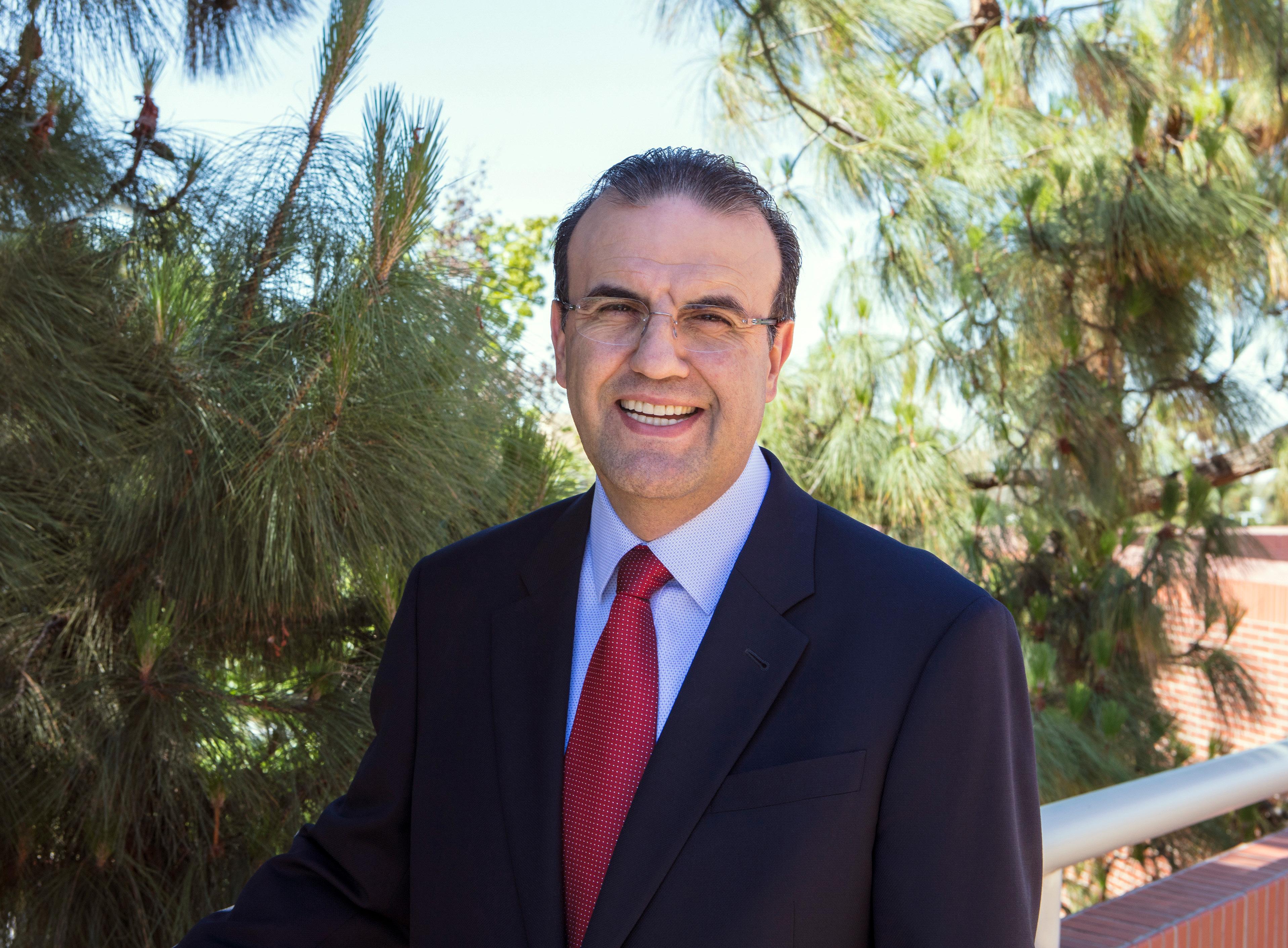
“My father taught me that it’s important to work hard and solve problems, while my mother-in-law taught me the importance of serving people, enjoying what you do, and making a difference along the way.”



Sergio De Castro’s global experience enables him to see the needs of the communities all over the world where he has lived and worked. This motivated him to volunteer with several nonprofit organizations dedicated to making a difference in the locations where he has worked.
He has donated time to serve with different organizations in support of education, health, and the development of Hispanics, and has also served as board member for several nonprofit organizations around the world.

His mother-in-law, De Castro explains, also started a charity to provide basic baby care kits to new mothers in need, and he has supported his wife and daughter in continuing her legacy. De Castro is family man: his wife and daughter have not only accompanied him all over the world but supported him in driving a successful career. Without them, he says, he would not be where he is.

LNG Terminal Company, a joint venture between Qatar Petroleum, ExxonMobil and Total to bring liquified natural gas from Qatar to the United Kingdom.
These assignments helped De Castro develop both his expertise and his guiding philosophy. “I saw that we were creating impact and adding value in ways that were relevant to organizations and communities,” he says. “That’s what I still try to do in each and every business decision I make today.”
Humanity needs power, and De Castro has stayed in oil and gas because he believes companies can provide that power in a responsible way. That belief led him to join Aera Energy in 2017. The company is dedicated to providing the energy California needs through more sustainable methods and helping with the energy transition while maintaining the quality of life that all Californians enjoy.
Moving to Aera provided De Castro with one more problem to solve. California will need energy from hydrocarbons, but it also needs carbon capture to achieve its greenhouse gas emissions goals. De Castro is tapping into his industrial engineering background, his industry experience, and his financial training to help Aera thrive in both areas while preserving jobs and opportunities for people in California’s Central Valley. He’s also mentoring his younger colleagues and sponsoring Aera’s Latino employee resource group, which helps train and develop the 13 percent of company employees that participate.
Each day, Californians consume approximately 1.8 million barrels of oil, while the state produces just 400,000 barrels. That means the state imports much more oil than it produces. In fact, California sends more money abroad for oil than any other state, and foreign oil doesn’t have to comply with the state’s strict regulatory standards. That’s De Castro’s latest problem to solve. He’s doing all he can to help take California to a clean-energy future.
“Sergio brings a wealth of diverse expertise, experience, and perspectives to his leadership. Combined with his curiosity and his ability to spot and develop talent, this makes him a great leader when what’s needed is insight, innovation, and change that matters.” –Saj-nicole Joni, CEO, Cambridge International Group Ltd.
Sergio De Castro on this well-deserved honor
Boston Consulting Group partners with leaders in business and society to tackle their most important challenges and capture their greatest opportunities. BCG was the pioneer in business strategy when it was founded in 1963. Today, we work closely with clients to embrace a transformational approach aimed at benefiting all stakeholders—empowering organizations to grow, build sustainable competitive advantage, and drive positive societal impact.

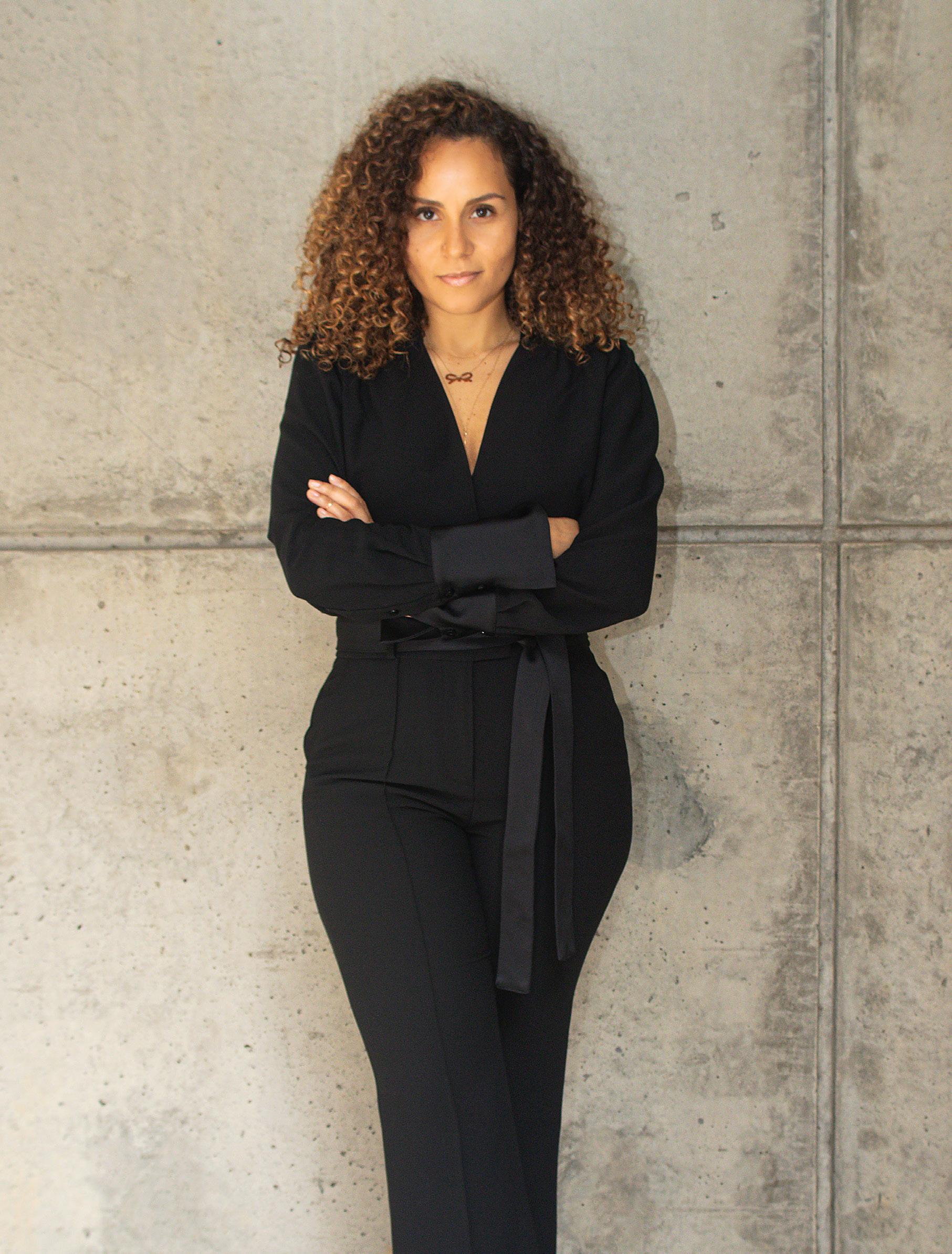
TATIANE SANCHEZ WAS BORN IN BRAZIL BUT RAISED in the United States with parents who surrounded her with their native music, food, and culture. When they moved back to Salvador, Bahia, the ten-year-old fit right in. She remembers pick-up games of soccer on the street, lazy afternoons at the beach, and long evenings spent doing homework with her father. Her father worked as a cook and carpenter, and since he knew education was his daughter’s key to unlocking opportunity, he pushed her to excel. Sanchez says the hours they spent doing math sheets and science projects together are among her favorite memories—but her life and future were thrust into uncertainty when a tragic accident suddenly took him away.
Strong, confident women have played a major role in Tatiane Sanchez’s life— starting with her mother, to whom she credits for making her the person she is today. Even though she left many contacts behind in Brazil, a “sisterhood” of childhood friends, coworkers, and others serve as her adopted family and help her navigate the twists and turns of her life and career. In 2020, Sanchez joined with three other women to start Lift & Rise, GroupM’s employee resource group that empowers and connects women in the workplace. Lift & Rise enjoys support from executive sponsors who help Sanchez and her leadership team create mentoring opportunities, host seminars and workshops, and provide resources to women at all levels of the organization.
Although Sanchez is an only child, her parents had a total of twenty siblings, and she credits a strong network of aunts, cousins, and friends with helping the family recover from their devastating loss. Within two years, they had moved back to the United States and Sanchez started crafting a plan.
“My parents worked hard so I could have educational opportunities. I wanted to live up to that,” she says. The young student was determined to honor her father’s memory and help her mother, who was working hard to provide for the family in his absence. Sanchez started working retail jobs at age fifteen, graduated high school early, and enrolled at John Jay College’s Pre-Law Institute.
It didn’t take Sanchez long to realize she was on the wrong track. She hit pause, took some time off, and started working again to save money for college. She took jobs catering and bartending before finally deciding to pursue a finance degree at New York’s Baruch College.
That’s where Sanchez’s long nights poring over math homework with her dad paid off. She enjoyed each class, performed well, and became a first-generation college graduate. She started her professional career at BDO and spent three years performing external audits in retail, banking, government, manufacturing, and other industries.
While Sanchez was growing her skills, she was still discovering where she fit within the industry. “I struggled working in corporate finance as a young Latina because I didn’t see other people like me in leadership,” she says, adding that she used to straighten her naturally curly hair and suppress her Portuguese accent to fit in amongst her colleagues, leaders, and partners.
As Sanchez grew in her career and personally, she came to realize that it was not only OK but her responsibility to bring her
whole self to work—natural curls and all. She knew she needed to excel not only for herself but for other young women of color.
After learning the external side of the business, Sanchez went internal by accepting a role at a famed international media, communications, PR, and advertising company known as WPP. As she performed risk assessments and executed audits across various agencies, she built strong relationships with one specific division of WPP—GroupM. She joined the organization in 2015.
With more than $50 billion in annual media spend and five agencies (Mindshare, Mediacom, Wavemaker, Essence, and M/Six) GroupM is the world’s largest media investment company. Tech savvy and data-driven teams work at those agencies to create content for global brands like Ford, Uber, Dyson, Airbnb, Google, and others.
Although GroupM hired Sanchez to coordinate audits and advise business on controls, in North America, she had the rare opportunity to write her own job description and rebuild the role from scratch. Knowing the inner workings of WPP helped, and Sanchez set out to improve upon existing risk and controls activities.
GroupM is the media arm of WPP, a listed company in London and New York. Listed companies are subject to strict external requirements that govern their actions. Sanchez wanted to change the way her colleagues view those critical measures. “Controls and regulations can be seen as obstacles or annoyances. I wanted to bring a new level of awareness so people understand why these things matter and how we can add value by using them as a strength,” she explains.
Others in similar positions often dictate rules from on high; Sanchez wanted to work with business leaders across the organization
in a more collaborative way to increase compliance and drive results. That forced her to draw upon important skills she learned earlier in her career. But not the technical skills she learned in Fundamentals of Finance and Accounting. She drew upon the communication and people skills she learned as a bartender.

“People come first, and how you interact with people is really important to building trust and forming the types of relationships that will lead to mutual success,” she says.
With those relationships in place, Sanchez worked to build her team and further enhance processes and strengthen internal controls in the region. Now, she works with each business unit to help its leaders uncover new ways to enhance manual tasks or replace them with automated steps to make the business more efficient.
Sanchez and her team, along with the support of leadership have GroupM poised for continued success. Experts say a prolonged advertising boom is just around the corner in one of the few industries that was accelerated by the COVID-19 pandemic. While nothing is certain, the company is ready to serve clients looking to take advantage of the new landscape—and Sanchez is ready to support that growth along the way.
“Controls and regulations can be seen as obstacles or annoyances. I wanted to bring a new level of awareness so people understand why these things matter and how we can add value by using them as a strength.”
FOR OLIVER PEREZ, THERE’S NO MAGIC solution to improving the way products are manufactured. Instead, you have to be what he calls a “technology evangelist.”
That means it’s not only vital to stay up to speed with technological advancements but also to believe in the impact they can have, he says. As the director of engineering at Edwards LifeSciences, a global leader in patient-focused medical innovations for structural heart disease as well as critical care and surgical monitoring, Perez develops and implements strategies to introduce process technology and automation across different manufacturing networks.
“If you don’t believe in what technology can do to create efficiencies, you are not in the right position,” he says.
That mentality has been a staple of Perez’s decades-long career. His lifelong curiosity has been as asset as he’s sought to create things no one else has by finding
ways to pair the right technology to the right problems. The impact of that work goes far beyond making manufacturing processes more efficient: it’s also evident in the lives of the people who utilize the products he’s helped create.
“When a patient uses our artificial valve, that person not only lives longer, but they live with a quality of life similar to that of any other person,” he says, referring to one of the products his company produces. “Whenever I see a grandparent enjoying their grandkids and using [our product], I feel proud.”
Perez first got the opportunity to impact lives in this way when he came home to Chihuahua, Mexico after receiving his doctorate in automation in France. He had a choice: to pursue an academic career path as a researcher or to go into the private sector.
Ultimately, he decided that a job offer at Venusa Medical Devices, which would give him a chance to travel and learn about
new technologies, was too attractive to pass up. As a senior product engineer, he helped transfer a product used for long-term relief of benign prostatic hyperplasia symptoms, which are common in older men with prostate issues. The product allowed the prostate tissue to shrink, alleviating those symptoms. He developed the product’s processes and served as a technical leader in its execution.
“It’s like your baby,” Perez says of the role he played in the product’s transfer and development. “You know everything about it: you know how to make it; you know how it works; you’re able to change the way it delivers what it needs to deliver. It’s a passion when it comes to that level of closeness.”
That passion also reassured him that he chose the right industry. “It literally is saving lives day after day, and gave me a reason to wake up in the morning with renewed energy and really love what I do,” he says.
After leaving Venusa, he went on to serve in various leadership roles, and found himself tasked with finding ways to reduce product development times and costs by leveraging new technologies. One of these roles was as manufacturing technology director at Becton Dickson, where his team introduced exoskeleton technology to relieve workers of lifting heavy weights. He also worked to deploy automation solutions, manufacturing execution systems (MES), and artificial intelligence (AI) to help with inspecting products for quality.
Perez continues that work at Edwards LifeSciences, where he has introduced AI for quality inspections. He also creates technology road maps for the company, matching its short- and long-term goals with emerging technologies that can be applied at different levels of the product life cycle. To keep up with current developments, he reads constantly and turns to authors like Kai Fu Lee, Peter Diamandis, Martin Ford, Jeremy Rifkin, and Bryon Reese to see what new technologies are on the horizon.
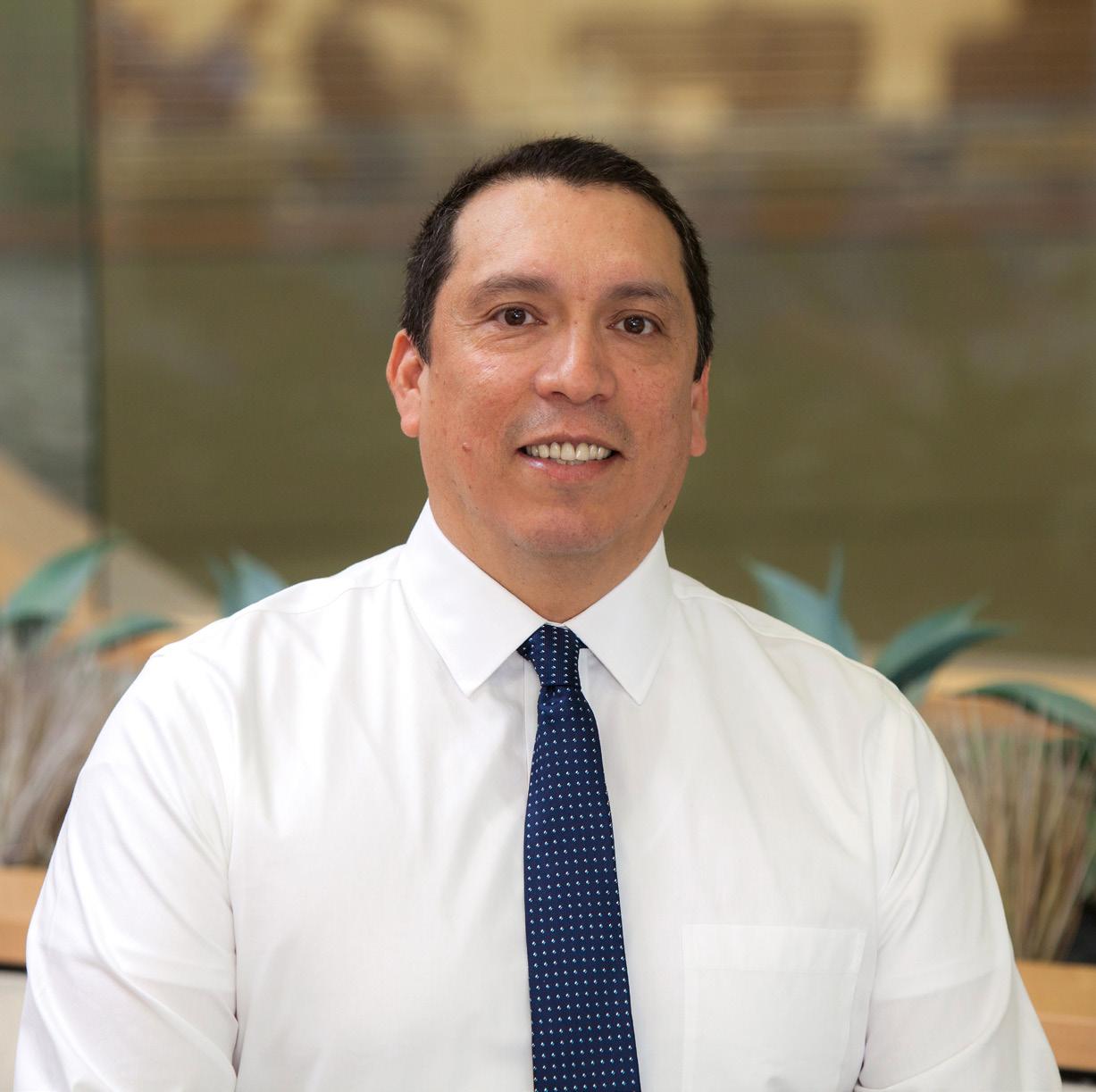
“Learning about new technologies is a constant evolution and a constant challenge. What was true yesterday may not be true tomorrow.”85 Hispanic Executive
“Learning about new technologies is a constant evolution and a constant challenge,” Perez says. “What was true yesterday may not be true tomorrow.”

When he’s not working on implementing cutting-edge technology at his company, he does pro bono work with an organization based in Mexico called Chihuahua Futura. He does presentations on various technologies, teaching members how and where to use them, as well as helping leaders create strategies for smart factories and work environments with higher productivity. He’s also written two books about smart manufacturing aimed at filling the void of Spanish-language books about those concepts.
“It came out of my responsibility as Hispanic and Mexican to take these concepts and principles to a different audience that needed it,” he says.
One of the crucial lessons Perez has learned about leading technical professionals is the importance of “amplifying human talent.”
“Engineering, in general, is populated by very smart people,” he says. “Understanding engineering disciplines and principles is a good starting point for a creative and productive dialog, but if you want to create a compelling vision that amplifies and attracts talent, you need to go far beyond and introduce new and innovative ideas that they want to learn and apply.”
He’s found success in leadership because he understands what motivates technical professionals. It’s the same thing that motivates him: a challenge. “Put in front of us something that doesn’t exist,” Perez says. “We jump right into it.”
For more than forty years, JR Automation has been a leading provider of custom automated equipment for global customers in a variety of end-markets, including healthcare, consumer goods, automotive, and more. Our talented teams leverage the latest technologies, innovative thinking, and decades of experience to provide our customers with world-class automation equipment and seamless solutions.
By applying diverse perspectives to complex challenges, MiQ Partners reduces cycle and lead times and delivers projects on time, on budget through intelligent automation systems. Our expertise covers advanced robotics and automation, assembly, inspection, testing, and more for medical device, diagnostics, CPG, and aerospace companies. For more information, visit miqpartners.com

ANNA ALVARADO IS NO STRANGER TO hard work. In fact, it’s her internal drive and determination for a better life that have motivated her to carve out a successful career path. Today, as general counsel at FirstCash, an international operator of pawn stores, Alvarado is renowned for her work ethic—and her penchant for getting things done.
Alvarado’s story begins as a child in the Woodville Farm Labor Camp, just outside Porterville, California, in the San Joaquin Valley.
During the various harvest seasons and breaks in between, her family would migrate from the Woodville Labor Camp where they lived and worked to Jalisco, Mexico. Alvarado had a lot of responsibilities at the camp, including taking care of her younger siblings, translating English for her family, and delivering the monthly cash rent payments.
In addition to ingraining responsibility in her, living and working at the labor camp taught Alvarado the importance of education. It even influenced her decision to become an attorney.
“While [I was] living at the camp, the United Farm Workers were boycotting grapes,” Alvarado explains. “We had a meet-
ing in the town hall, and civil rights activist Cesar Chavez and his team came to educate the farmers on what their rights were and why it was important to boycott. One of his team members was a lawyer, and I could just sense a connection to what he was saying. He was smart, well educated, and there to help us. This moment resonated with me—the idea that when you’re educated, you have the opportunity to really help people.”
After high school, Alvarado went on to obtain both a bachelor’s degree in international studies and a master’s in business administration with a finance concentration from Bentley University. She worked in accounting and finance for some years before moving to Fort Worth and “jumping headfirst into working at a law firm and [attending] law school” at Southern Methodist University.
While in school, Alvarado worked fulltime as a trial and litigation law clerk. She also had two children during that time. “It was extremely challenging, but I was determined to power through it,” she says. “At the same time, it was very rewarding.”
Alvarado was a private practice attorney for five years, and as she sees it, it was a transformative experience. “I loved being
in private practice,” she says. “From being the first Hispanic attorney at Hill Gilstrap PC to being first chair and going against seasoned trial lawyers in court and arbitrations and representing labor unions at Tanner & Associates PC, I was really able to hone my legal and technical skills, build my confidence, and prove that I could punch above my weight class.”
In 2011, Alvarado was recruited by FirstCash, thus marking the beginning of her journey as in-house counsel.
Hard work and responsibility were ingrained in Anna Alvarado as a child. Now, she uses those qualities to bring value to FirstCash’s C-suite and legal department.
“Growing up, I hated not having available resources. I knew that if I worked hard, I would be able to have a better life— so that’s what I did.”
In addition to her responsibilities as a named executive officer at FirstCash, Anna Alvarado mentors high school students and serves on the board at ACH Child and Family Services, where she’s involved in both the finance committee and the strategic planning committee.
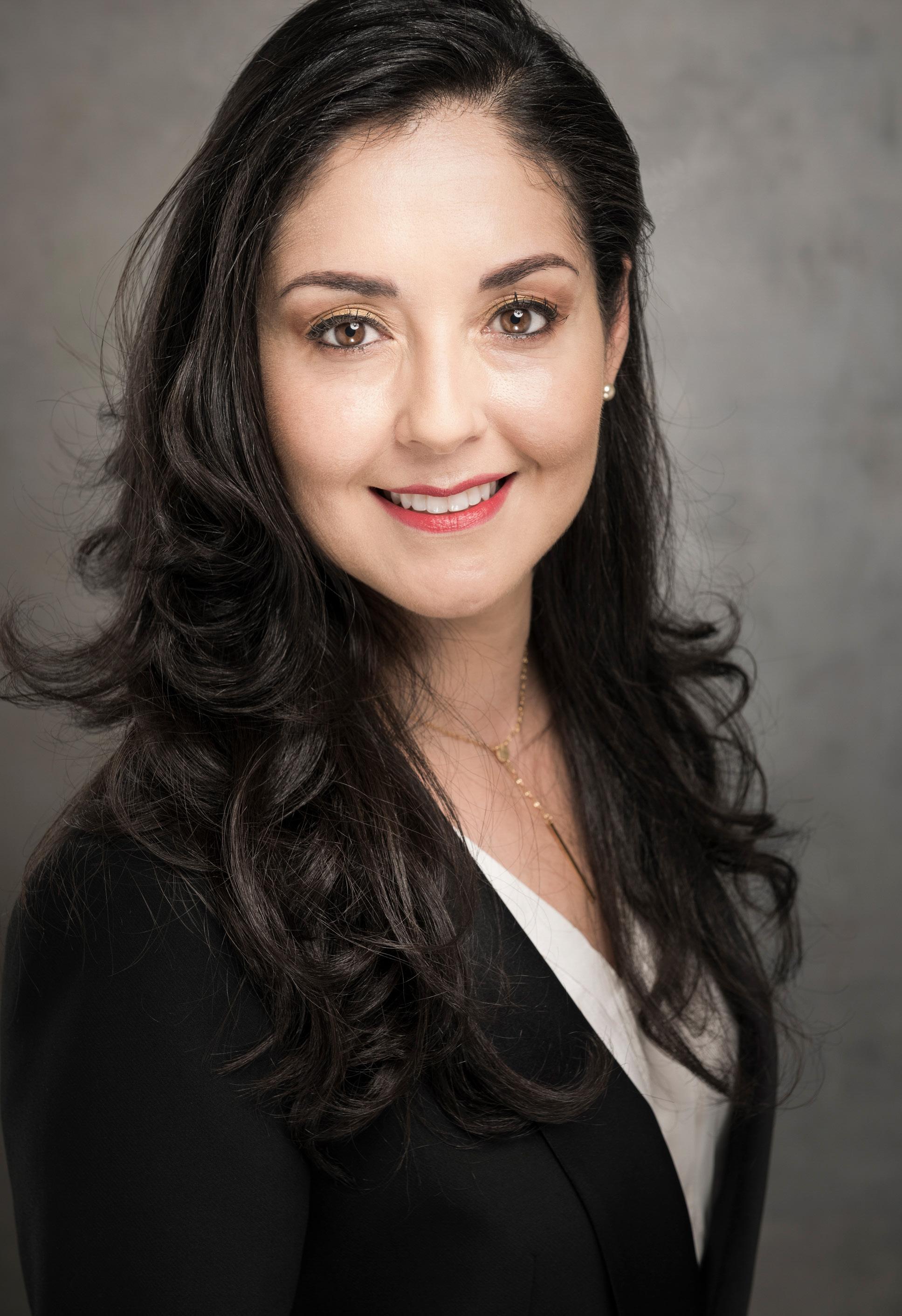
“ACH is a fantastic organization that helps children in the foster system and women who are in precarious situations—it works to protect children and preserves families by offering foster care and adoption, crisis Intervention, and other family and residential services,” Alvarado explains.
“The organization is very important to me because there was a brief stint when I was at the labor camp where I was in foster care. That really stuck with me, and I want to do what I can to help others.”
General Counsel FirstCashNow, Alvarado wears a lot of hats. “Outside of being in charge of all legal matters, I’m also in charge of customer service, lobbying efforts, compliance, government relations— and, up until most recently, leases and lease negotiations,” she explains. Her team consists of approximately fifty-five people: a majority of them are located in Mexico, while six are located in the US. Together, she says, they’re always busy working on big initiatives and helping facilitate processes for their business partners.
While collectively, Alvarado’s team is now pretty robust, it wasn’t always that way. Over the years, she’s built the legal department from the ground up. “When I joined the company, I knew that it would be my job to build an effective, resolute, entrepreneurial, and resourceful team that can efficiently solve problems,” she says. “So I slowly started to build that. I approached everything from a numbers perspective, finding ways to save the company money and creative ways to bring in new revenue.
“Once I proved myself and the value I was bringing,” she continues, “not only did I earn a seat at the executive table helping to cook the company strategy but forming and scaling the department was able to happen.”

On top of building—and maintaining—the legal department, Alvarado has added value to FirstCash in a variety of ways. For example, she formulated the strategy, executed, and led approximately forty-five separate acquisitions and transactions of differing sizes and helped grow Mexico’s store count by six hundred locations in approximately twenty months.
What’s more, when the COVID-19 pandemic hit and a significant number of businesses were forced to close, Alvarado and her team worked diligently to get FirstCash—and its US and Mexico store locations—classified as essential businesses. Before that, Alvarado was and integral player in the transformative merger with the company’s largest publicly traded competitor in September 2016.
“I enjoy challenges, and over the years, I’ve been able to prove to my C-suite colleagues that I can not only handle whatever challenges are thrown my way but also be a trusted touch point for getting things done effectively,” Alvarado remarks.
In truth, Alvarado attributes much of her professional success to her upbringing. “Growing up, I hated not having available resources,” she says. “I knew that if I worked hard, I would be able to have a better life—so that’s what I did. I have this internal drive and integrity to improve things not only for myself but for those around me too.”
Motivated by his grandparents, Danny Rivera has taken risks and persevered through any challenge he’s faced. That attitude serves him well as group president of Driven Brands.

While Rivera didn’t have to tackle the extreme risks faced by his grandparents, he has certainly bucked norms. After earning an engineering degree, he enrolled in law school instead of pursuing an MBA. Although he never practiced law, the skills he developed during law school served him well as he transitioned from IT leadership to business leadership for Driven Brands, the largest automotive services company in North America, where he is currently executive vice president and group president of the maintenance segment.
Rivera is the top executive and is responsible for all aspects of Take 5 Oil Change, one of Driven’s fastest-growing brands, which is known for its “ten-minute stay-in-your-car oil change.” The Take 5 business has grown from about thirty locations when acquired by Driven Brands in 2016 to over six hundred locations today and continues to rapidly grow.
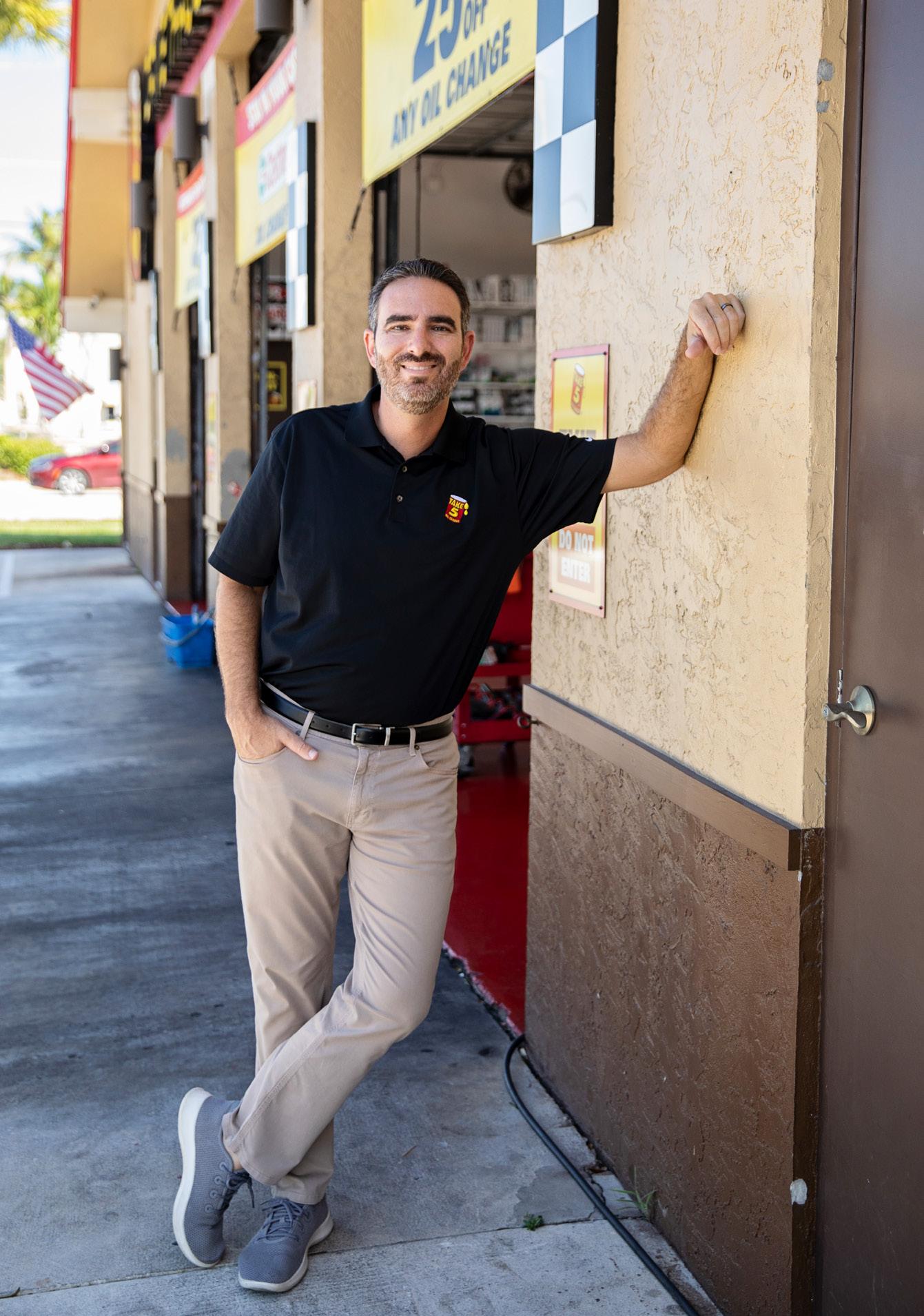
“Dream big, work hard, and learn from your failures,” is a motto that Rivera has come to believe through the years. One of his most formative experiences occurred when he began his career in General Electric’s leadership development program. The invitation to join GE’s prestigious program, which came soon after he obtained his bachelor’s degree in computer engineering from Florida International University, was quite an accomplishment.
The two-year program, aimed at developing business leaders for Fortune 500
Danny Rivera’s grandparents left behind everything they had in Cuba to pursue a better life in the US. Motivated by their sacrifice, he has taken his own risks and learned from his failures to become a top leader in his field.
companies, was divided into four six-month “rotations.” After each rotation, program participants were evaluated and ranked. After the first rotation, Rivera was shocked to find out he was at the bottom of the rankings.
“I was working really hard and felt that I had succeeded at the work I was assigned,” he recalls. The feedback that he was underperforming compared to everyone in the program was tough to take, but Rivera was determined to learn from this failure. He requested a meeting with the CIO to discuss the matter. The executive was frank. The poor assessment was not a reflection on his technical skills: Rivera’s main shortcoming was not putting in much effort to improve team performance. A leader must engage with others and help them succeed, not just focus on one’s own tasks, the CIO told him.
Rivera has kept that lesson front of mind as his career has progressed. In his current role, he engages with Take 5 Oil Change’s franchisees in nuanced relationships that are unlike the traditional manager/subordinate arrangement. It requires the ability to persuade instead of ordering or making decrees.
That’s certainly not to say that Rivera doesn’t take action. He knows how important it is to the success of the brand for his management team to make operational changes that improve service and efficiency throughout all six hundred Take 5 locations. Whenever he notices hesitance or resistance to those changes, Rivera works to understand the franchisee’s particular circumstances. Franchisees, he explains, are entrepreneurs who often invest their life savings into their dreams. “They sign the front of a check—most people have never done that,” Rivera remarks. “That level of commitment is to be respected and admired; my team and I owe them the same level of commitment.
“As a leader, your job is all about vision, people, and priorities,” Rivera continues. “Vision is about helping others see a future world that is better than the current one. It’s
about hearts and minds. If you have their hearts and their minds, the hard work to get there is justified.”
A vision worth achieving, says the EVP, requires people that are hard-working, smart, and all in. “Once you have the vision and the people, it’s about pointing those great people at the three to five things that truly matter, that truly move the needle.”
This is a lesson Rivera says he’s learned the hard way. “Earlier in my career, I would focus on over a dozen initiatives all aimed at improving the business,” he says. “Through mentoring and time, I’ve come to realize that one of the most important jobs of a leader is to determine which are the priorities that truly matter and to put your and your team’s energy there.”
Rivera’s leadership skills have impressed his colleagues outside the company. “Danny has an effective leadership style that allows him to manage all aspects of the Take 5 business very successfully,” says Glenn Marks, business development and strategy manager for BP Lubricants.
“He has earned the respect of his employees, franchisees, and vendors.”
Relationship building is also important to both Rivera and Driven Brands, and the latter works to strengthen community-wide connections through its charitable programs. The company’s efforts have been effective in strengthening ties between corporate management, employees, and franchisees,
Rivera says. “You want something that you can relate with franchisees that transcends business,” he explains.
Each company within Driven Brands portfolio has its own charitable cause. Take 5 focuses on raising money for children’s hospitals: each one of its locations solicits donations from customers while they wait in their cars for their ten-minute oil change.
“Our employees make it fun,” Rivera says. “There’s a lot of enthusiasm, and when a customer makes a donation, we ring a bell and the entire shop just explodes with positivity.” Take 5 employees also make TikTok videos and internal videos to promote the gift giving. “Last year, we raised over one million dollars for children’s hospitals. This year we’re going to beat that number.”
Driven Brands’ charitable efforts are always a great icebreaker topic when Rivera reaches out to franchisees. But whenever the conversation turns to more serious matters, he relies on the foundation provided by his legal training. “It’s helped me with being able to defend a position, better articulate my point, and to think on my feet,” he says of his JD.
At this point in his career, Rivera is happy with the rewards that have resulted from some of the risks he’s taken. Any setback he’s faced, he’s not only overcome but learned from. Now, he’s aiming to use the lessons he and his team learned during the company’s most recent setback—the COVID-19 pandemic— to grow Take 5 to new heights.
“[My legal training has] helped me with being able to defend a position, better articulate my point, and to think on my feet.”
In government affairs, relationships are king. Seasoned expert Omar Vargas helps 3M seize opportunities, limit risks, and make a real impact on communities around the world.
EVERY MONDAY MORNING, OMAR VARGAS GOES AROUND THE world in sixty minutes. It’s all remote, of course, and Vargas travels the globe as he chairs 3M’s government affairs roundtable. The fastpaced, no-holds-barred meeting starts promptly at 8:00 a.m. EST. It has no real agenda. Managers from Singapore, Beijing, Brussels, Mexico, Canada, and the United States share updates, talk strategy, and debate execution. The weekly meeting is one of many tactics Vargas is using to drive collaboration and make government affairs an asset at the billion-dollar consumer goods company.
A CRITICAL FUNCTION
Vargas was born in New Jersey to parents who emigrated from Ecuador and Puerto Rico. He set out to become an international trade lawyer and began his career in litigation. But when he took a job at the Department of Justice, Vargas discovered a knack for public policy that eventually led him to a job directing global policy and government affairs for PepsiCo. During more than five years with the company, Vargas learned how to “build relationships and turn ideas into policies that make a difference.”
In 2012, recruiters convinced Vargas to move to Praxair and help rebuild the chemical company’s government affairs function. While Vargas was responsible for developing Praxair’s relationship with
legislators, regulators, and policymakers, he also found an opportunity to help the company demonstrate its ability to add public value. Praxair’s CEO joined the Brazil-US Business Council (BUSBC), a bilateral organization designed to build public-private partnerships between the two countries.

“We helped facilitate meaningful dialogue, and our team played a key role in developing policy recommendations that advanced the important economic relationship between the two counties,” Vargas says. “The BUSBC advocates on matters related to defense and security, energy and environment, innovation, tax and investment, and trade.”
In 2017, Vargas accepted an invitation to join 3M and help the company strengthen its government affairs function. Praxair had twenty-five thousand employees and $11 billion in revenue compared to 3M’s one hundred thousand employees and $32 billion in revenue. Vargas saw the opportunity to scale what he had already accomplished.
He’s spent the last few years doing just that as global head of government affairs. Vargas breaks government affairs into four components. The first two components are based on the function’s visibility—building relationships that matter, and using them to develop insights and political intel. Third is the provision of strategic advice, which paves the way for the fourth component, engaging governments to advance opportunities and mitigate risks. “A government affairs function should support the bottom and topline goals of a company,” Vargas explains. “Outside of that, nothing else matters.”
But it’s not just about dollars and cents. Good government affairs functions, Vargas says, also enrich communities. When the COVID-19 pandemic hit, 3M’s government affairs team went into overdrive to help governments, health agencies, and distributors get personal protective equipment and other supplies where they were needed most.
As 3M ramped up its production of respirators and other products, Vargas helped governments reduce trade barriers to get critical supplies. He fielded many late night phone calls to coach governors and foreign leaders through supply chain issues and help regulators understand nuanced differences in products and supplies.
Vargas has created and implemented a hub-and-spoke model that helps make global affairs effective at a large multinational company like 3M. The global government affairs center of excellence sits at the hub to





theGROUP is a leading Washington, D.C. based, bipartisan government relations firm with more than 30 years of experience in providing strategic advice and lobbying services to Fortune 500 companies, trade associations, and foreign governments. Drawing on its experience, expertise, and relationships at the highest levels of business and government, theGROUP strives to transform complex challenges into positive outcomes for its clients.
at theGROUPdc.com.
engage communities at home and abroad. Area teams from all parts of the world connect to the center as spokes. “This model helps us keep in communication and drive for alignment as we share information from the center out and outside in,” Vargas says, adding that the model provides 3M with both a global strategy and local execution.
Empowering and inspiring a large global team isn’t easy, but Vargas has one simple strategy. “I treat them like humans,” he says. This means giving people meaningful work, the resources they need, and a chance to grow. It also means doing the small things. Pre-programmed iPhone reminders prompt Vargas to send out birthday or anniversary greetings to everyone on his team.
Vargas calls himself a “mission-driven” leader, and he’s keenly aware of his status as the only Hispanic executive leading a global Fortune 100 government affairs department. “When I look at my peers, I see there is still room for more diversity in the space,” he says, adding that he often reaches out to Latino and other diverse students about public policy careers. Internally, he’s helping lead 3M’s Latino Resource Network.
In today’s volatile political climate, Vargas finds himself talking more and more about building consensus. “Companies should not be partisan,” he stresses. “You have to work across the aisle and within parties to see lasting policy development, and that means setting aside corporate politics to achieve common goals.”
Companies will see the best results when they remain authentic, Vargas says, and the same is true for leaders in the space. Vargas recently invited some colleagues to his home for dinner. At the end of the evening, one coworker remarked how “normal” Vargas and his wife seemed. Others may have been taken aback. For Vargas, it was a high compliment. “What you see is what you get with me,” he says. “Relationships matter in government affairs. Authenticity is everything.”
Becker & Poliakoff is proud to partner with Omar Vargas and 3M, an organization that also believes it is important to have diverse representation and advocacy at the highest levels.“A government affairs function should support the bottom and topline goals of a company. Outside of that, nothing else matters.”
Becker is proud to partner with Omar Vargas and 3M
We appreciate that this organization aligns with our belief that it is important to have diverse representation and advocacy at the highest levels.
ThechangestheseLatinasarecampaigningforliebeyondthescopeofanyonebusiness initiativeorprogram.Dr.SamarysSeguinot-Medina(Umyuugalek)ofAlaskaCommunityAction on Toxics (P98)andDiorVargasofDiorVargasLLC(P102)havededicatedtheirwholeselves,andtheirwholecareers,totransformingtheworldandcommunitiesaroundthem.
Dr. Samarys Seguinot-Medina helps isolated Indigenous tribes find a future through her work with Alaska Community Action on Toxics
BY BILLY YOST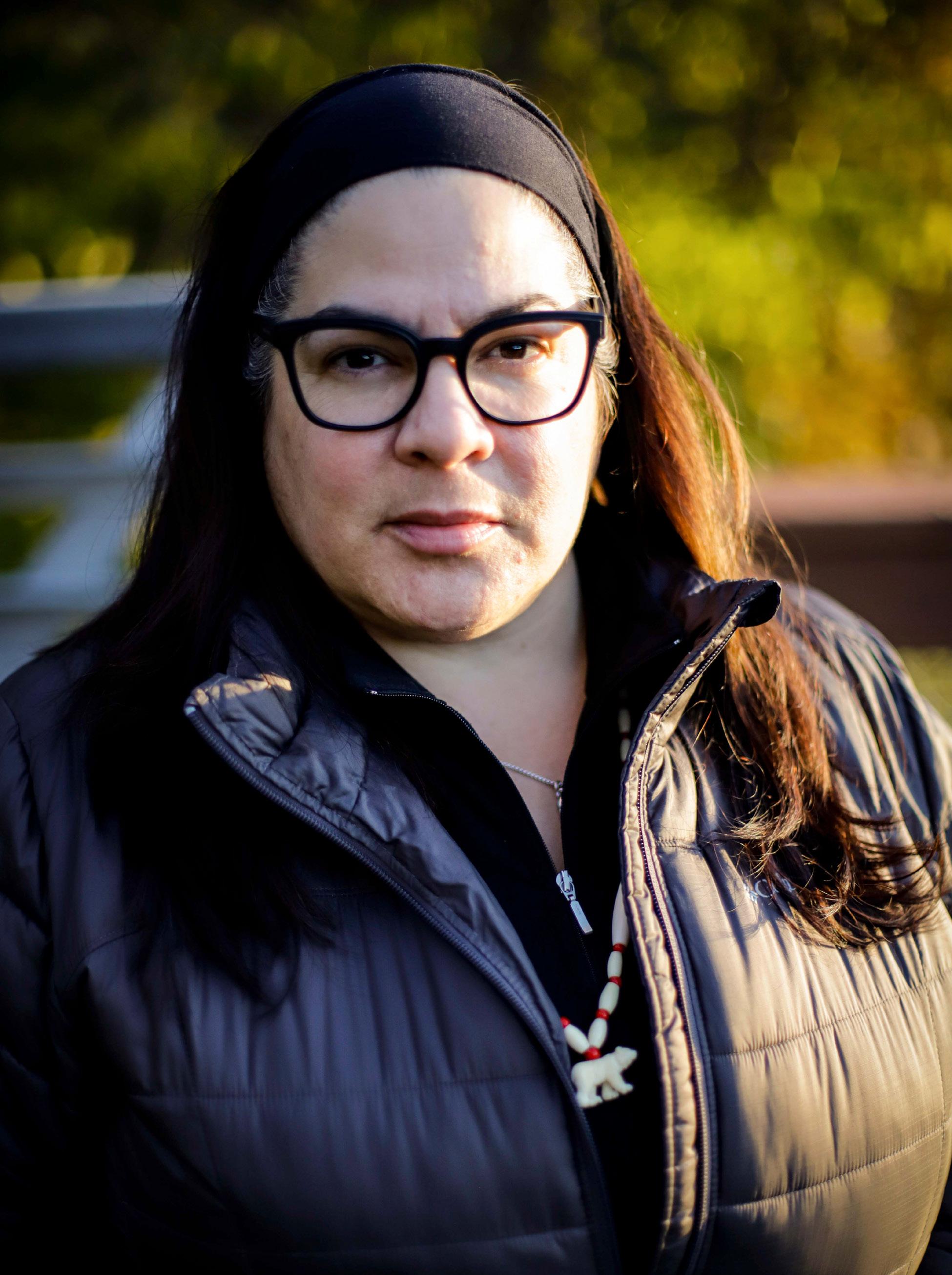
WHEN DR. SAMARYS SEGUINOT-MEDINA speaks of the Yupik tribes who occupy the villages of Savoonga and Gambell—located on Saint Lawrence Island (or Sivuqaq, as it’s formally known to the Yupik)—she actually avoids a word which has so often been attributed to those who, despite constant attacks on their sovereignty, their livelihood, and their lives, have managed to survive.
“I want to avoid the word ‘resilient’ because so many Indigenous people rightfully believe that they haven’t done anything wrong,” explains Seguinot-Medina, who was recently blessed with a Sivuqaq Yupik name, ‘Umyuugalek.’ “They didn’t create these problems. But they are so strong, so vibrant, and so profound. They give me the inspiration to continue our work together.”
For over ten years, the Puerto Rican native has lived in Alaska and worked as environmental health director for the Alaska Community Action on Toxics (ACAT), an organization that, for more than twenty years, has partnered with the people of Sivuqaq in their continuing battles against
pollution from distant sources, global warming, and other man-made problems.
But what brought the San Sebastian, Puerto Rico-born Seguinot-Medina nearly five thousand miles to a tiny island that most people don’t even know exists and is closer to Russia than the Alaskan mainland? Alaska had always been calling to her, she says.
“As soon as I learned about the Northern Lights when I was a child, I knew I had to see them,” Seguinot-Medina remembers. “When my doctorate program at the University of Puerto Rico required me to do an environmental health internship, I knew this was the perfect opportunity.”
Seguinot-Medina’s environmental activism goes deep. She grew up in the premises of a sugar cane mill in San Sebastian: her father’s family had worked for several generations in that industry, and Seguinot-Medina recognized the connection between humans and the land at a very early age. In college, she helped found the only chapter of the Sierra Club in Latin America. She then spent seven years building the organization from the ground up as a volunteer.
“Around that time, I started shifting my focus to environmental health instead of environmental conservation,” Seguinot-Medina explains. “I found myself wondering: do we need more science, or do we need more people understanding the connection between the destruction of habitat and nature and helping us figure out how to survive?”
Since coming on board at ACAT, Seguinot-Medina has found multiple communities that have faced the worst of all worlds. It’s difficult to imagine that a place so remote and beautiful could have faced so much environmental destruction, but after the installation and then deregulation of multiple military bases near the Northeast Cape between 1952 and 1972, many residents began experiencing profound health problems.
Cancer and other disease rates skyrocketed, likely due to exposure to PCBs, or polychlorinated biphenyls, and other man-made chemicals that are considered persistent organic pollutants. Despite a multimillion-dollar cleanup program, the Sivuqaq Yupik people are still experiencing the heartbreaking aftereffects of the military’s pollution of their land, water, and traditional foods.
Then there is climate change. As Seguinot-Medina explains, the Sivuqaq Yupik people traditionally hunt walruses during the summer, and the product of those hunts are their main source of sustenance for the better part of the year. Due to rising temperatures of ocean water, however, there were eight hundred fewer walruses in 2013 than a normal hunting season offers.
“[ACAT is] an environmental justice and health organization, and we were having to collect thousands of dollars to purchase salmon, cod, rice, and potatoes so the tribes could survive the winter,” Seguinot-Medina says. “This goes beyond science.”
“Where there is will, there is hope.”
Pamela
As a proud member of the LGTBQ+ community, Dr. Samarys SeguinotMedina was delighted to find a thriving community even far up north in Alaska.
“Every year, I’m more proud of Anchorage because I see the queer community growing,” she says. “I’ve always felt welcomed here to be who I am. There’s a lot of work to do, but I’m so proud that ACAT is home to multiple people from my community and that we can intersect our mission with the social justice ideals we all share.”
While there are many other issues that Seguinot-Medina and ACAT partner with the Sivuqaq Yupik people to address, Indigenous sovereignty overarches all those efforts—it is their aim and hope to support those communities’ active participation in decisions related to their health, lands, and well-being and to help return decisionmaking and land discussions to those communities, who have been stewards of their traditional lands for millennia.
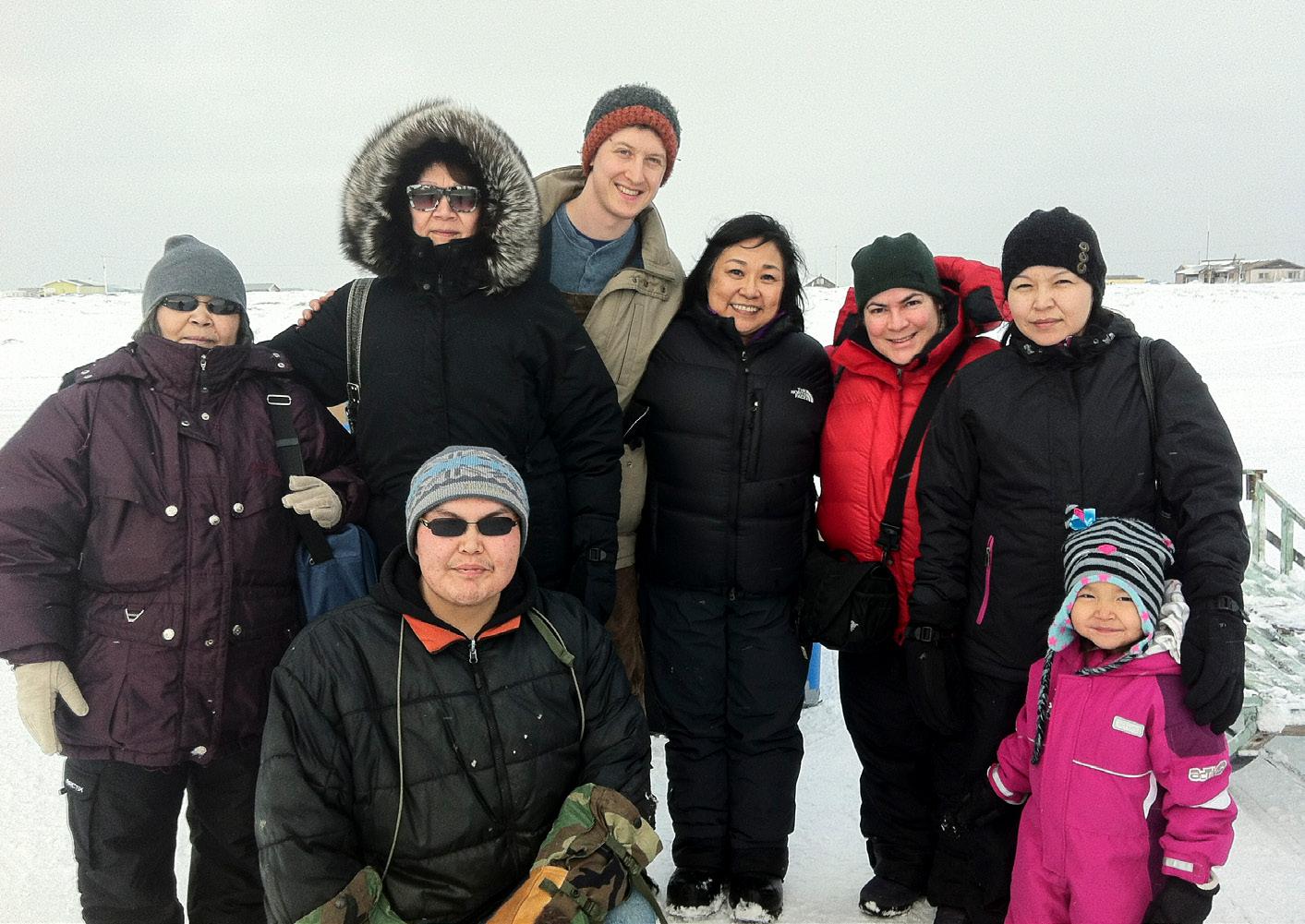

“These people have been so damaged and beat up by the system,” SeguinotMedina says. “We help empower them to remember that any time the government makes plans for cleanups or any other efforts, they should be doing governmentto-government consultation.”
ACAT, the director says, helps get the tribes in front of international delegations like the United Nations to make their voices heard and address their very legitimate claims to their lands. During the 2001
Stockholm Convention of the UN, the vulnerability of Arctic regions was formally recognized: the preamble to that convention states that “the Arctic ecosystems and Indigenous communities are particularly at risk because of the biomagnification of persistent organic pollutants and that contamination of their traditional foods is a public health issue.”
Still, Seguinot-Medina says it’s hard for outsiders to understand why she hasn’t lost hope, especially in an area of the world where the effects of climate change are happening three times faster than most other parts of the world. But that is one of the reasons she’s so passionate about working with youth in Alaska and educating them about the change they can help make.
“My mom instilled in me that there are always possibilities,” Seguinot-Medina says. “I try to give young people the hope that all is not lost, that there is something they can do. Where there is will, there is hope.”
DIOR VARGAS HAS MADE IT HER MISSION to destigmatize mental health and improve accessibility to wellness resources for all who need them. She founded her company, Dior Vargas LLC, to increase awareness of the challenges of living with a mental illness— and to change the perception of people facing those challenges.
“Growing up, I didn’t really see any representations of people with a mental illness, or if I did, the representations were very negative—asylums, violence, people to keep away from,” Vargas says. “I think it might have been easier for me if I had seen someone who was accomplishing things and living with a mental illness.”
Through Dior Vargas LLC, Vargas seeks to be that person for others. She travels across the United States to speak at institutions of higher education as well as for-profit companies about her own experiences navigating and advocating for mental health. She also discusses how others can advocate for themselves, wellness accessibility, diversity within mental health, and related topics. Her activism and the advice that she offers businesses are contributing to a broader cultural shift, one that creates space for people of diverse backgrounds and encourages them to join the conversation.
As a child, Vargas didn’t hear much discussion of mental health, at home or elsewhere. The lack of openness around the topic left her with a skewed perspective toward mental illness, including her own. “I felt ashamed, for so many reasons,” she admits. “I felt like it was a sign of weakness or something that only privileged people had the time to experience.”
While studying at Smith College, Vargas interned at Meridians, a feminist interdisciplinary journal affiliated with the school. The internship piqued her interest in the publishing industry, and she went on to obtain an MS in publishing from Pace University in 2011. After interning at the Feminist Press, she began temping at book publisher Random House and was eventually hired full time.
Her specialization in e-books at Random House opened the door for Vargas to move to bookseller Barnes & Noble to work on digital magazines for the company’s NOOK device. However, with the NOOK losing significant

ground in the marketplace, Vargas soon found herself out of a job.
“I was unemployed for about a year,” she says. “I had to move back in with my parents and figure out Medicaid. The whole process was really overwhelming, but the experience gave me insight into how inaccessible health, and specifically mental health, can be.”
By that point, Vargas had started to get more involved in activism. She began receiving speaking invitations following the 2014 launch of her acclaimed “People of Color and Mental Illness Photo Project,” a series of photographs of people of color who live with a mental illness, which Vargas later released
in book form. A year later, the Obama White House recognized her as a Champion of Change for Disability Advocacy Across Generations—an award that she considers a career highlight.
Since then, Vargas has continued to expand her reach. Even so, the process of translating her passion for mental health into a business venture didn’t come naturally to her. “I’m still trying to identify with the idea that I’m an entrepreneur and a business owner. I never thought that my work was something that I would get paid for,” she says. “I always viewed my business as a side hustle, but I would love to make it my sole profession.”
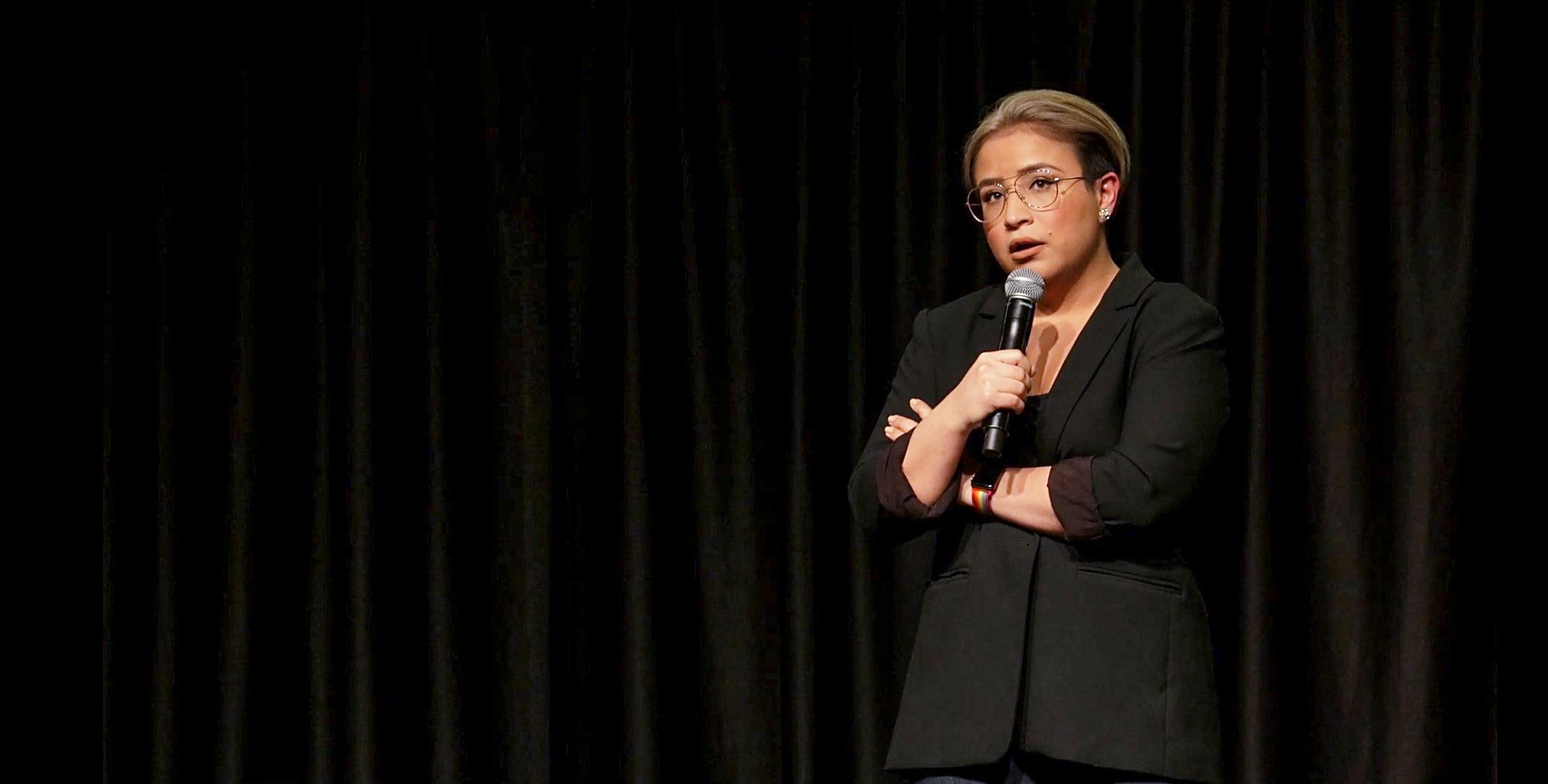
At speaking engagements, Dior Vargas often points out to her audience that mental illness qualifies as a disability under the Americans with Disabilities Act. She shares this information to raise awareness of available resources and accommodations and to strengthen ties between the mental health and disability communities. The latter goal also motivated her to call greater attention to mental health concerns as a board member for the volunteer organization National Coalition of Latinxs with Disabilities.
In the meantime, Vargas has continued to develop her professional expertise through roles at mental health nonprofits and the New York City Department of Health and Mental Hygiene. She also completed her master of public health degree at New York University between 2017 and 2019 to strengthen her knowledge of mental health from a policy standpoint.
Furthermore, Vargas has capitalized on the growing interest in mental health and wellness in the corporate sector. Whereas many of her early speaking engagements took place at colleges and universities, she now regularly appears at both education institutions and at corporations: the latter engagements, she explains, are opportunities to underline the importance of normalizing mental health conversations in the workplace.
“People need to see that it’s okay to talk about mental health day to day,” she says. “If
employees see the CEO or another person in leadership be open about mental health, it shows them how genuine and authentic the company is about making sure that people feel okay talking about it.”
Beyond bringing discussions of mental health into everyday interactions, Vargas points to mental health day policies as one way for businesses to actualize their support of employees. Above all else, she notes that it is critical to approach wellness with compassion, which means caring about the person over the bottom line.
That personal element remains at the center of Vargas’s work. When she connects with people and listens to their experiences, it reminds her why she does what she does. “I’m just trying to help people,” she says. “That’s why I started Dior Vargas LLC in the first place, to destigmatize mental health and to let people know that they aren’t alone.”
“Growing up, I didn’t really see any representations of people with a mental illness. . . . I think it might have been easier for me if I had seen someone who was accomplishing things and living with a mental illness.”



GROWING UP IN PUERTO RICO, I was surrounded by beauty as an integral part of our culture.
My mom, grandmother, aunts, cousins, and friends were always talking about beauty brands, products, and trends. To them, and to so many other Latinas, beauty is more than a routine—it’s a ritual. Learning how to care for our skin and apply makeup is how the women in our lives teach us to be women.
My mom in particular taught me so much about beauty. It wasn’t because she wanted me to look made up: rather, she wanted me to feel like my best and most empowered self. Because of her, I have felt a deep love for beauty products and their ability to transform a woman’s confidence ever since.
Unfortunately, this deep emotional connection to our Hispanic community— and the deeper meaning of beauty in our culture—has not been as evident as it could be in beauty brands today. But I am on a mission to change that.
I joined Clinique and the Estée Lauder Companies in June 2020, as the COVID-19 pandemic was raging across the planet. I was no stranger to difficult professional situations, but as we all know, this was completely different. Professional and personal anxiety were sky-high for everyone, and my team (among them, many working parents) suddenly had a new boss coming into their Zoom rooms.
It’s my nature to find the good in any situation, to lead teams while focusing on the power of empathy, authenticity, and optimism. These are critical leadership ingredients in a modern organization: we must take time to truly listen to how people are feeling, time to understand our differences, and time to build trust.
I am so honored to be highlighted in Hispanic Executive alongside these powerful trailblazing Latinas, who are not only championing the Hispanic community but also helping to change the face of the world at large. We all share a collective vision to help our communities by driving transformation within our organizational cultures—thereby driving external transformation as well. By transforming how the consumer views and engages with our brands, we can show the world that Latinas are not a monolith, that we are all different and unique. And hearing other women’s stories is how we build connections and inspire others to do the same.
Maria Bartolome Winans and Carla Piñeyro Sublett are Latina leaders in tech, an industry that needs powerful female, Hispanic voices. They are both focused on making a broader impact around the world: I deeply value that Maria prioritizes inclusion and building a people-first culture, and I share Carla’s feeling of responsibility to pay it forward and give back.
As SVP of merchandising for Ulta Beauty, Maria Salcedo sees firsthand how important inclusion and diversity are to the beauty industry. Every day, as thousands of customers walk through their stores, Ulta has the opportunity to change the way that Latinas see themselves portrayed by beauty brands. I am very
And my team has consistently demonstrated the efficacy of that approach—as a result of their empathy, agility, resilience, and optimism, we have not only carried our beloved brand through the storm but come out stronger than before.
But empathy is also going to help us transform the beauty industry so that it is reflective of the changing consumer we are trying to serve. Understanding the cultural nuances of our consumers is how brands of the future will win. If there was one answer, one way

proud that someone with Maria’s rich personal and professional experience informs the decisions made by Ulta every day.
I am also inspired by Christy Haubegger’s mission. She is a pioneer in publishing, having founded Latina magazine and thus brought aspirational editorial content to our Hispanic community. Now, at WarnerMedia, she is a champion for diverse consumer content and is also an internal advocate for Latina talent. And her efforts to encourage civil advocacy through Poderistas is a testament to the fact that true change is on the horizon.
Last, but not least, as a mother, I identify with Ana Flores’s desire for a bilingual household. I admire the way she has cultivated authentic community building in the digital space, using social media as a force for good. Young women who are part of #WeAllGrowLatina have a network of support that is invaluable, but also a leader who is truly herself as a powerful Latina woman.
Congratulations to these and all of the women being honored as 2022 Leading Latinas. I am deeply inspired by and in awe of the work you are doing, and am proud to see you as vocal advocates in your companies and communities. Learning about your stories makes me even more optimistic for our next generation of Hispanic leaders.
of connecting with everyone, we would have seen brands capitalizing on that long ago.
To truly succeed, we must take the time to unpack the deep sociological and cultural forces that are affecting our consumers and ourselves. We must ensure that there is representation—including Latina representation— at our decision-making tables so that they can speak for the consumers we’re striving to create relevant connections with. And we must ensure that our consumers see that representation on a global scale. I have always championed Latina
talent to represent our brands—in fact, we recently signed Melissa Barrera as Clinique’s first Latina global ambassador. I knew that young women would see themselves in her face—but even more, that they’d hear her story of resilience, dedication, and hard work and immediately build a deeper, more meaningful connection to her and our brand.
This is a slow process, and one that requires sensitivity, care, and deep listening. But I wholeheartedly believe it is the only way forward.


WarnerMedia’s Christy Haubegger has worked in publishing, talent management, the nonprofit space, and the entertainment industry.

One thing ties all her roles together: her passion for uplifting and empowering people of color.
BY BILLY YOST PORTRAITS BY AMANDA LOPEZAWEEK BEFORE CHRISTY Haubegger spoke with Hispanic Executive, reporters conducted interviews with her and other leaders at WarnerMedia. When a Latina reporter was introduced to Haubegger, who currently serves as executive vice president of communications and chief inclusion officer, the journalist wasted little time in telling the EVP that she was meeting her hero. Haubegger, the reporter said, was the reason she had gotten into journalism in the first place.
“She said she had to hug me,” Haubegger remembers, clearly still moved by the experience. “She was probably twelve at the time Latina came out, and it just kind of shocked me. It made me very grateful for the fact that while I’ve never seen myself as some kind of hero, Latinas are slowly gaining the presence to be that person for someone they’ve never met. We have that presence, and I can’t wait until we start to vote like it.”
In one short statement, Haubegger—who founded Latina magazine at just twentyseven years old and went on to highlight Latinas during her tenure as a film producer, bring wider representation to a global audience while working at the Creative Artists Agency, and empower Latinas by cofounding the nonprofit Poderistas—is able to speak to her entire career trajectory. Her journey, she says, encompasses “many jobs, but one mission:” to empower both Latinas and members of the broader Latino community to love who they are, to celebrate their role in the great demographic shift of the United States, and to flex their undeniable political muscle.
Christy Haubegger EVP of Communications and Chief Inclusion Officer WarnerMediaThe Essence of a Latina
Haubegger grew up in Houston. While she was adopted by a non-Hispanic family, she felt surrounded by her Mexican American heritage thanks to the large percentage of Latinos living in the city. “My parents wanted me to feel good about who I was and to take pride in it,” the EVP says. “They sent me to a bilingual preschool, but in many ways, I still felt like an insider-outsider, and I think that is true of all Latinos in the US.”
Like most young teenagers, Haubegger loved movies and magazines. But she never saw herself reflected in the media she was so eagerly consuming. “I remember reading through my friend’s mom’s copies of Essence,” Haubegger recalls. “I always wished I had something like this for me, but never imagined I would be the one to create it.”
Essence, a lifestyle and beauty magazine catering to African American women, was cofounded by Edward Lewis and was first published in 1970. Even as Haubegger grew up and went to college, she couldn’t forget the impact the magazine had had on her.
The idea for Latina was born while Haubegger was at Stanford Law School: the more business courses she took, the more a law career became her “Plan B.” Since there
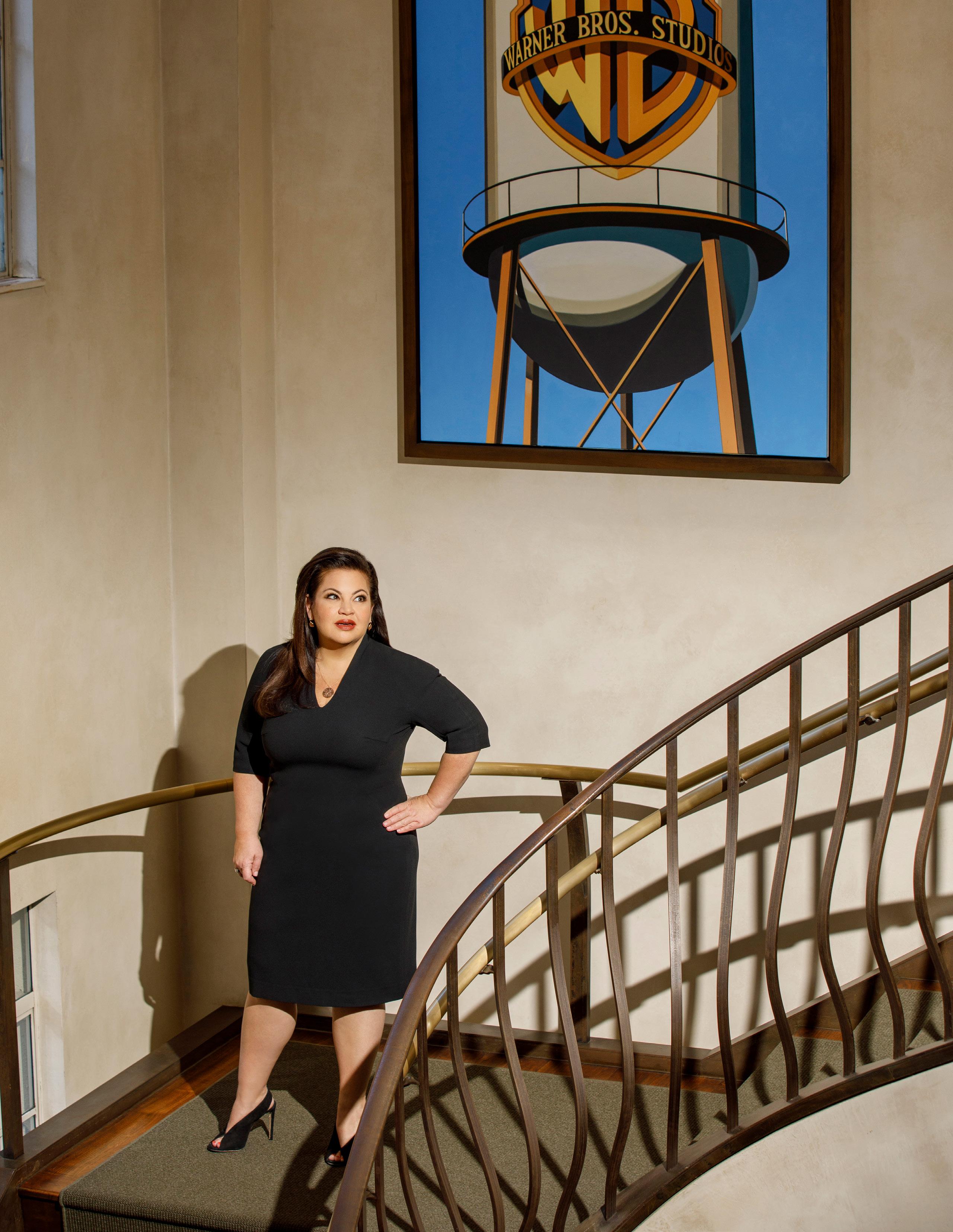

“America can be a place where your future and your possibilities are entirely dictated by the zip code you grew up in and who your parents are. Right now, it is. I see it as my life’s work to change that."
wasn’t an Essence for Latinas, she decided, she would create one.
Lewis would play an instrumental role in helping bring Haubegger’s magazine, Latina, to life. “I owe everything to Ed,” she says. “I had met some angel investors, but then I met this real-life angel who had taken the path I was on thirty years prior. He was willing to invest in the vision. It was a multiyear journey, but with his help, we were able to get Latina off the ground.”
Apart from support from individuals like Harris, Haubegger found that the process of founding Latina was rife with casual— if not outright hostile—discrimination. “I had conversations ranging from newsstand distributors wondering how much ‘shrinkage’ they should count on because of the likelihood of our readership stealing the magazine, to advertisers wondering if our readers could afford their products,” Haubegger remembers. “They were selling five-dollar nail polish.”
Such conversations made the EVP all the more conscious of the fact that Latinas needed to be able to see themselves as powerful, influential, and filled with potential. What’s more, she says, America needed to see it.
Latina made its debut in 1996 and ran as a print publication for twenty-two years.
Despite the success of Latina, Haubegger didn’t see herself working exclusively in publishing—or in any one industry, for that matter. In 2003, she transitioned into the film
industry, producing films like Chasing Papi and Spanglish. But in Hollywood, the wait time on a new project is often weeks or months, and that drawn-out production process proved too tedious for a woman who admits she has trouble sitting through an entire television episode without multitasking on other projects.
Haubegger was initially contacted by the Creative Artists Agency (CAA) to work as a consultant and help the premier talent agency tackle the burgeoning Latin American market. That consulting role soon turned into a fulltime position, and Haubegger spent a little more than fourteen years building out a business segment at CAA and transforming the organization into the most inclusive and diverse talent agency in the entertainment industry.
During Haubegger’s tenure, the agency launched CAA Amplify, an annual event for high-level multicultural artists and leaders. She also helped create the Amplify database, the first searchable database for television writers of color. CAA’s diverse roster grew 1,400 percent and remains the largest representative of female directors and African American directors in the film industry.
“We realized that the key was to think about changing the idea of who is telling the stories,” Haubegger remembers. “The audience was changing, but the decision-makers were not. It was an incredible experience.”
Since coming on board at WarnerMedia, the EVP has been tasked with rebuilding and
remaking the ninety-eight-year-old company with equity and inclusion as its foundation as WarnerMedia reorganizes for the global, streaming future. It’s no small mandate, but it’s one that both Haubegger and the organization are fully committed to.
“I report directly to our CEO, Jason Kilar,” she says. “I sit at the CEO’s table and am able to be part of strategic decisions, and it’s clear that it’s not simply an HR issue here—the business case is fully understood.”
Haubegger and Kilar first became acquainted as board members of Management Leadership for Tomorrow, a nonprofit organization dedicated to transforming leadership pipelines and acting as an empowering voice and advocate for people of color.
“I knew Jason was committed to diversity and inclusion based on our work together, and so I never felt the need to make the case why it was important coming in,” Haubegger says.
WarnerMedia’s commitment to diversity and inclusion is felt in more than just its internal corporate environment, the EVP says. In 2021, it was announced that production on Blue Beetle would begin in 2022. Based on a DC Comics superhero character whose alterego is Mexican American, Blue Beetle will be one of the first stand-alone Latino superhero movies (the other contender for “first,” Leslie Grace’s Batgirl, is also a WarnerMedia project).
Starring Cobra Kai ’s Xolo Maridueña, Blue Beetle will be written by Gareth Dunnet-Alcocer and directed by Angel Manuel Soto, who praised Dunnet-Alcocer’s
ability to authentically capture the Latino family dynamic at DC FanDome 2021.
Personally, Haubegger says, she would love to use films to spotlight civil rights leaders. But “Latinos are more interested in seeing superhero movies than documentaries right now,” she explains. “It’s my job to meet our audience where they are.”
Working on one of the first stand-alone Latino superhero movies is a landmark event, but the EVP says it’s only part of the story—a story that is slowly changing. “If you integrate a ‘fire department’ [into a company], it doesn’t really change how fires get fought,” she notes. “But if you integrate D&I into a business, it changes the stories that get told.”
The issue of Latino representation is not new. Haubegger has been aware of it since the 1990 census spotlighted the rapidly increasing Latino population in the United States, prompting a Time cover story and motivating multiple publications to dub the ’90s the “Decade of the Latino.”
“I always joke that it apparently got rescheduled,” Haubegger says, laughing. But while the Latino community has seen exponential growth over the years, the EVP says that community has not fully embraced the undeniable power that should come with such growth. Now, she says, Latinos are in danger of becoming a permanent underclass.
“We’re at a crossroads,” Haubegger warns. “America can be a place where your future and your possibilities are entirely dictated by the zip code you grew up in and who your parents are. Right now, it is. I see it as my life’s work to change that.”
Haubegger, along with nine other Latina leaders—including Eva Longoria, America Ferrera, and activist and entrepreneur
Stephanie Valencia—created Poderistas, a nonprofit and digital community that aims to uplift, inform, and inspire Latinas across the country. During the 2018 midterms, Haubegger and her fellow cofounders got together to try and answer one pressing question: if Latinas are such an important part of the electorate, why aren’t they voting more?
“After extensive research, one thing we found was that so many of these women don’t think they knew enough or that their vote was important,” Haubegger says. “If we don’t
believe in ourselves, no one is going to think we’re a force to be reckoned with.”
Here, Haubegger speaks of the word aguantar (“to endure”). Latinas have a well-deserved reputation for being able to emerge from whatever difficult circumstances they encounter, she says, but enduring shouldn’t be the goal.
“We need to be understood as a force of nature,” she says. “If you’re afraid of what will happen if you disrespect Latinas, you don’t put our children in cages.”
“Selena Gomez fans may not be all that civically engaged, but they want to hear from people they trust. It’s a way to try and overcome a lot of the disinformation that is out there trying to undermine our potential power,” Haubegger explains. “We want you to find your power and own your power. That’s the reason for our organization’s name, and we have created a community that we will remain communicating with and empowering Latinas to rise in their personal and professional lives.”
Of course, it’s not just Latina voters that Haubegger wants to empower. The larger Latino community accounts for just over 18 percent of the overall US population, but Latinos own a quarter of box office revenue according to Deadline. “Can we set up voting machines at movie theaters?” the EVP asks, laughing.
Haubegger may be joking, but the earnestness behind her remark comes shining through, and underlines her commitment to finding new and ever more innovative ways to uplift and empower diverse voices. Time has not—and will not—dampen her passion. As the Latino population continues to increase, Haubegger will be there, continuing to help her community realize its true potential—on the corporate ladder, on the screen, and in the voting booth.
“We realized that the key was to think about changing the idea of who is telling the stories. The audience was changing, but the decision-makers were not."
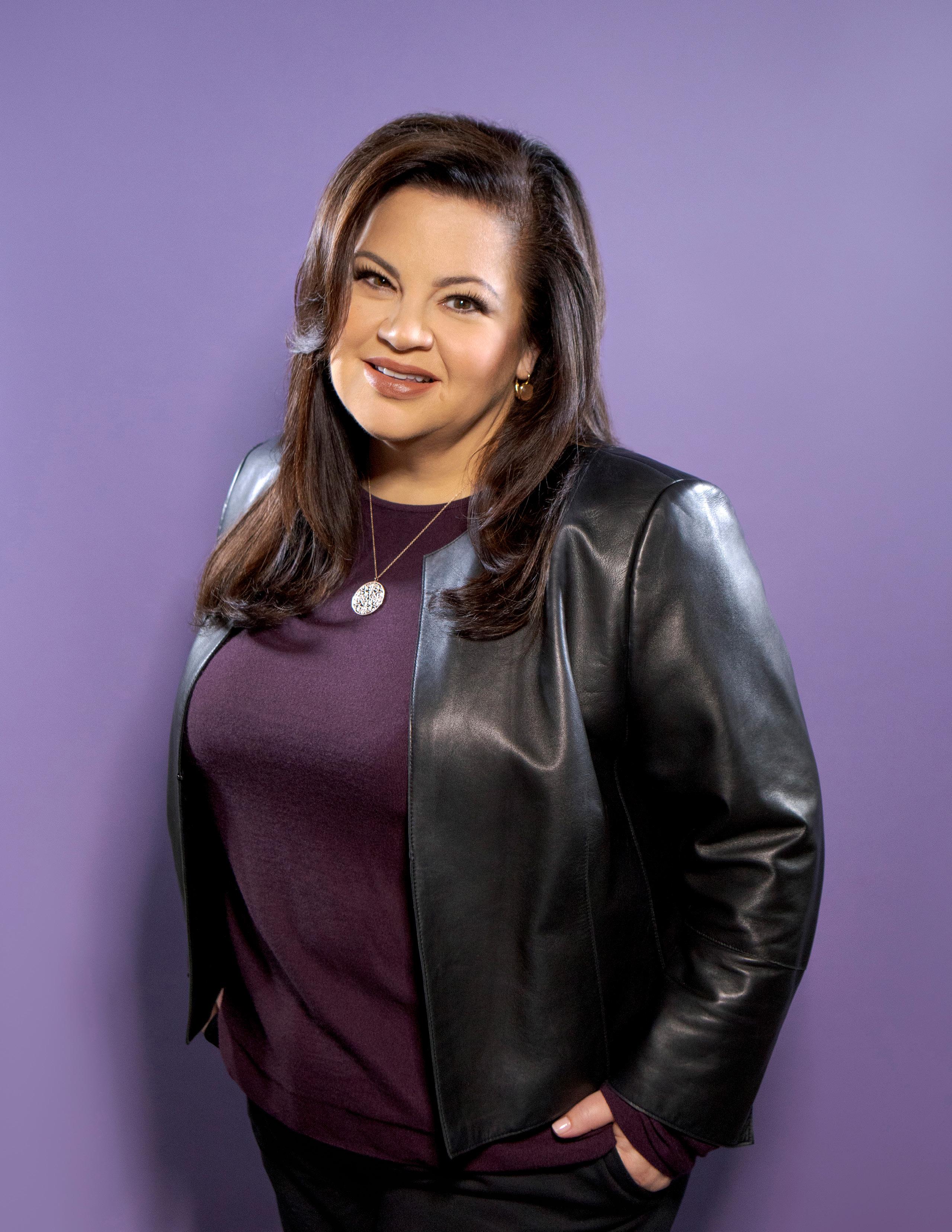
 Ana Flores
Founder and CEO
#WeAllGrow Latina Network
Ana Flores, trailblazing founder and CEO of the #WeAllGrow Latina Network, discusses her journey from mom blogger to business leader
Ana Flores
Founder and CEO
#WeAllGrow Latina Network
Ana Flores, trailblazing founder and CEO of the #WeAllGrow Latina Network, discusses her journey from mom blogger to business leader



a mother in 2007, Ana Flores made the conscious decision to cultivate a bilingual household—a space where her daughter could learn both English and Spanish, just as she herself had done.
“My whole childhood, I was traveling between El Salvador and Houston,” explains Flores, who had one parent in each location. “I learned both languages and became completely bicultural by nature of the way I grew up, so I knew the advantages of that and wanted my daughter to have the same experience.”
Flores wasn’t sure where to begin, but that didn’t stop her. Instead, she went on to quite literally write the book on the subject.
Beyond coauthoring Bilingual Is Better: Two Latina Moms on How the Bilingual Parenting Revolution Is Changing the Face of Americ a, Flores launched a successful blog, SpanglishBaby, to create content by and for Latinas. That spirit remains at the heart of her work today as CEO of the #WeAllGrow Latina Network, a platform she founded in 2010 to build an empowered Latina community. Over a decade later, she continues to do exactly that.
Flores’s introduction to content creation came through her work in television production. She held a series of roles at networks such as Univision, MTV Latin America, and what is now NBC Universo—roles that took her from Miami to Mexico to Los Angeles. But Flores’s arrival in LA signaled another change in her journey. “Within a year and a half of landing in LA, I got pregnant,” she says. “I went on leave and didn’t go back because I knew that I wanted to be a full-time mom.”
But shortly thereafter, the 2008 recession put Flores’s then-husband out of work. Longing for community in that dark hour, Flores discovered the world of mom blogging. Before long, she and a friend came together to start SpanglishBaby in response to an unmet need for content about bilingual parenting.
“The blog gave us the opportunity to put something forward without any money,” Flores recalls. “We utilized all of the resources we had as producers—we knew how to bring people on board, create content, and talk to audiences—to build a community of other Latina mom bloggers.”
In addition to maintaining SpanglishBaby, Flores went to conferences to learn how to monetize the blog through brand collaborations. The conferences also taught her the value of networking—and motivated her to establish a blogging community specifically for Latinas.
“In 2010, still in the middle of the recession and still with no money in the bank, I launched Latina Bloggers Connect,” she says. “Within a month, I had landed my first campaign with Sprint, and then with McDonald’s, Clorox, Neutrogena. It all grew and escalated from there because we were the first ones on the scene of what we now know as influencer marketing.”
Flores used her new site to help Latina bloggers secure brand deals. “At the center of what we were doing was this community of women taking control of their own lives, their own destinies, and their own finances. They were finding and creating a lifestyle that worked for them, doing something they loved,” she explains. “I ended my first blog post, on November 11, 2010, by saying, ‘When one grows, we all grow.’ That became our motto, and six years later, we rebranded into the #WeAllGrow Latina Network.”
In 2015, after a few years of focusing primarily on influencer marketing, Flores organized the first #WeAllGrow Summit. In the ensuing years, the summit became a bigger and bigger success, selling out each year and eventually welcoming women outside of content creation. Twice, Forbes named #WeAllGrow Summit to its list of 19 Conferences Every Creative Should Attend. Flores, too, received widespread recognition, including as one of People en Español ’s Las 25 Mujeres más Poderosas.
“When you’re blazing a trail, you don’t necessarily know where it’s going to take you, but that’s the beauty of it."
Still, in 2017 and again in 2020, the possibility of bankruptcy loomed. “My resiliency muscle is very strong,” Flores says of those hurdles. “I sometimes fear that the hustle and the ‘girl boss’ mentality have been over-glamorized, so I try to be very real about the financial and personal risks. Everyone is capable of scaling and growing a business, but it’s not for everyone.

“What has really allowed #WeAllGrow to survive and thrive over the past eleven years,” she continues, “is the fact that we always have our finger on the pulse of where the commu-
nity is going next, what those needs are, and how they can be met.”
Indeed, Flores has been on the front lines as blogs have given way to Instagram and as traditional influencers have developed into activist-minded creators leveraging their platforms for change. “The mission of elevating our voices and stories via the power of community just continues to get stronger,” she says. “When you’re blazing a trail, you don’t necessarily know where it’s going to take you, but that’s the beauty of it. We have been able to pivot and grow as the community and the
digital space have evolved, and now, we want to become a global platform for Latinas.”
As she concentrates on taking #WeAllGrow and its network to the next level, Flores reflects back on how it all began. “I still remember receiving that first check from Sprint,” she says. “The thing that made me the happiest was, after receiving that check, sitting down and writing checks to the six bloggers we were working with across the country.”
From her first brand check to whatever the future may hold, Flores has always had—and will always have—her community’s back.
 BY SARA VERDI
BY SARA VERDI

SVP of Merchandising Maria Salcedo helps Ulta Beauty compete in a fast-paced industry by prioritizing the customer above all else
Maria Salcedo SVP of Merchandising Ulta Beauty
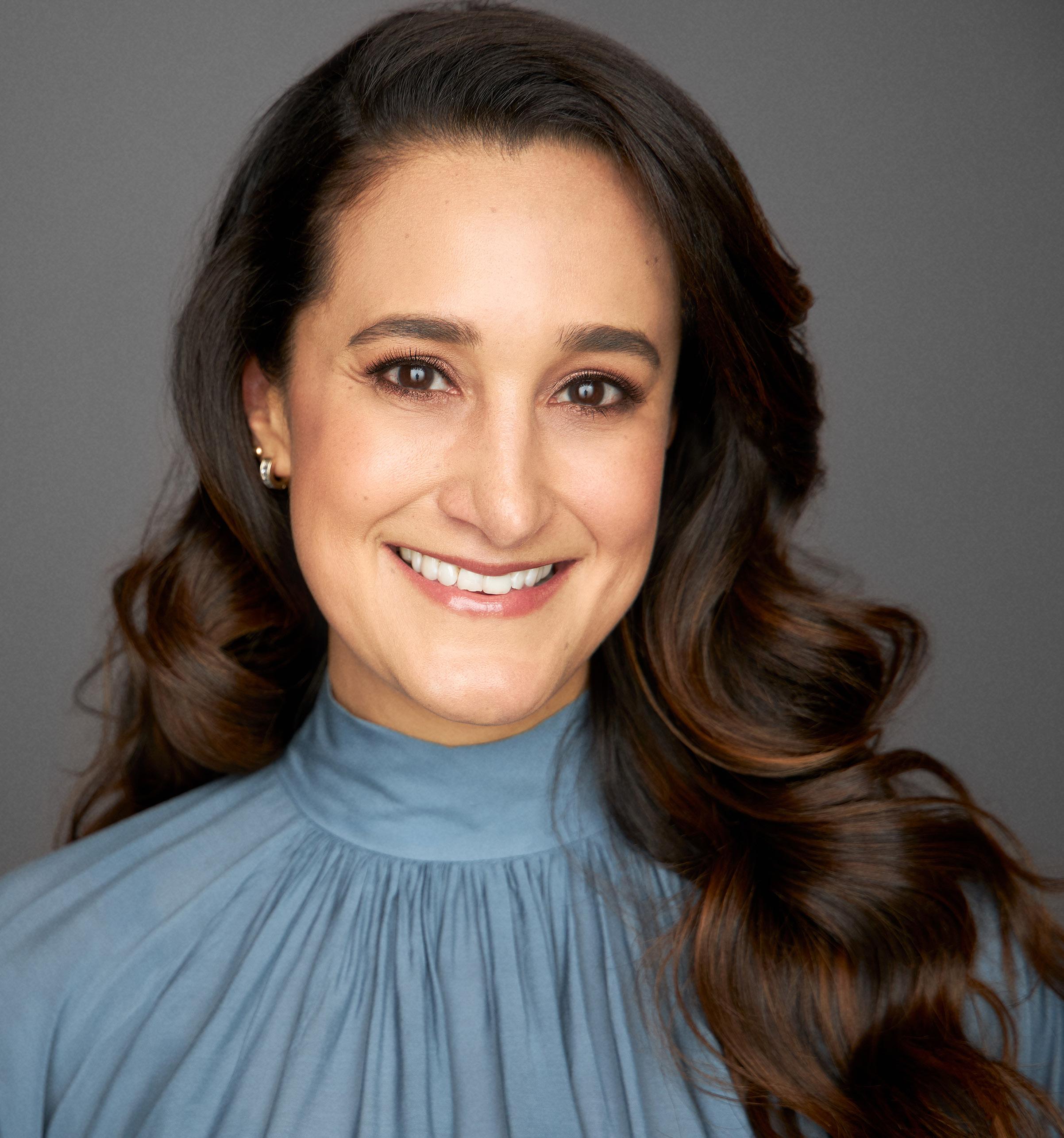
TO TRULY CONNECT WITH customers, you have to be a customer. You have to desire the same things out of the retail experience as they do, whether it’s the simple satisfaction of finding your favorite brand on the shelf or the eager anticipation that comes with discovering a new product, if you want to recreate it for your own clientele. Maria Salcedo, senior vice president of merchandising at Ulta Beauty, not only understands that concept but has maintained her zeal for connecting with customers as a key driver of her career goals.
While the road to her position at Ulta Beauty has been, as she describes it, a bit of a “zigzag,” Salcedo believes that every experience has uniquely shaped her to be the leader that she is today.
In 2001, she graduated from the Universidad de Los Andes with a degree in industrial engineering. “That degree, at least in Colombia, is one that has the largest aperture in terms of professional opportunity,” Salcedo explains. “My intent was to find a job in consulting at that time, but when I graduated, Colombia was going through a deep financial crisis; those types of jobs essentially disappeared, which put a halt on my initial plans.” This, one of the first curves in Salcedo’s proverbial zigzag journey, did not deter her.
“I was able to get a great job, albeit not in my intended sector—in financial services. It ultimately ended up being an incredibly valuable experience,” she reflects. “I was fortunate enough to work with many CEOs and senior teams from the top companies and banks in South America, which helped me gain a lot of operational insight.”

“Whether it’s through being part of a nonprofit to support [the Hispanic community] or offering to mentor future leaders, it’s so important to pull and bring people along with me to show them that this is all possible for them too."
Maria Salcedo believes that the greatest gift her family offered her was access to a solid education. “Growing up in Colombia, I was very aware of how education was one of the single most evident differentiators of access to opportunities,” she says. “Education unlocks the world for you.”
While at PepsiCo, Salcedo learned about Step Up, an organization focused on providing students from underserved communities with equal opportunities. “I started out as a mentor, and it has been the perfect match of what I have always believed is important: to help achieve equitable education and to support the Hispanic community.”
Following these triumphs, and within her professional development conversations, her managers and the leadership team asked Salcedo what she wanted to achieve in her professional career and how Ulta Beauty could support that aspiration.
“I expressed that I would like to have an operational role with some P&L responsibility,” she recalls. “The two areas that interested me most were store operations and merchandising—they were both so unique, and I really wanted that new layer of experience.”
This experience also strengthened Salcedo’s long-standing desire to connect with clients, “This led me to understand that I really love business, but that I still wanted to be on the other side of creating P&L,” she says. “I wanted to be making the decisions that would impact customers.” Motivated by this realization, Salcedo moved from Colombia to the United States to pursue an MBA at the Wharton School of the University of Pennsylvania.
After completing her studies, Salcedo returned to her initial aim of pursuing consulting and joined McKinsey & Company. “I probably felt like the least prepared person in the room every single day during my time at McKinsey,” she admits, “but that is where I learned and grew the most.”
Soon, however, Salcedo once again felt a desire to be more closely connected to customers. “That’s when I found myself with PepsiCo, and when my career path felt like

it was becoming more intentional,” Salcedo says. “I finally felt like I was where I wanted to be in terms of the retail industry.” While at PepsiCo, Salcedo worked across several different teams, and, in so doing, gained the transferable skills and knowledge that have enabled her to succeed at Ulta.
Even more than the opportunity to get closer to the customer, Ulta Beauty affords Salcedo the chance to serve consumers that she connects with on a more intimate level. “Beauty has always been a personal passion of mine, and at Ulta I am able to work with something that I genuinely relate to as a consumer myself,” she explains. “It has been an experience that, while it is my job, has been deeply fulfilling on a personal level too.”
Since joining Ulta Beauty, Salcedo has had the opportunity to build out a corporate strategy team and see that team support Ulta through the company’s first two acquisitions.
Salcedo subsequently transitioned into her current role in merchandising, where she leads all of the buying teams for the makeup and nail categories. “We are responsible for the decisions around which brands to carry and which products to bring in, always connecting these things to the guest and searching for how we can deliver excitement and inclusivity in the assortment of products we have to offer,” the SVP says.
Despite all the successes in her career, Salcedo is quick to remind herself that having a job that she truly loves and is fulfilled by is, in and of itself, is a privilege. As a Latina woman in senior leadership, Salcedo feels that it is important to use this privilege as an example and platform to not only represent the Latino community but prioritize opportunities to mentor the next generation of Latino leaders.
“As a Latinx woman, I feel compelled to be visible and to be active in the Hispanic corporate community,” she says. “Whether it’s through being part of a nonprofit to support these groups or offering to mentor future leaders, it’s so important to pull and bring people along with me to show them that this is all possible for them too.”
 BY ROMAN NAVARRETTE
BY ROMAN NAVARRETTE
Noelle Flores channels life lessons learned from her grandmother to excel in the music and entertainment industry while uplifting other Latinas

This simple quote from Eleanor Roosevelt on a card from her grandmother was all Noelle Flores needed to get through a tough time in her life. She credits her grandmother for being her biggest supporter and being the one who was the proudest of her accomplishments.
“Every time I got a promotion or a new job, I would run to her and show her my new business cards and feel how proud she was,” says Flores, who has spent nearly two decades working in the music and entertainment industry.
Like many Latinas, she credits her grandmother for instilling in her a sense of composure and radiance that has allowed her to show up and shine for any occasion. “She was always so confident and glamourous,” Flores recalls. “She set an example for me as I grew up. She was my conspirator whenever I did something wrong and provided me a place to hide out, until she encouraged me to face the music and come clean to my parents about whatever mischief I had been in at that moment.”
From a young age, Flores has used her inherited confidence to help advance her career trajectory. This year, the
eight-year iHeartMedia vet stepped into a new role for the media giant, which was practically tailored for her skill set and personality: senior vice president of industry marketing and partnerships.
In an industry where relationships are everything— with everyone from CEOs to celebrities—Flores’s ability to seamlessly connect with people has given her an edge over her colleagues. Over the years, when it comes to maneuvering on a red carpet, doing business in a celebrity green room, and clicking with musicians and actors to get the job done, Flores remains at the top of her game.
“Growing up, I was always comfortable in a room and interacting with new people and friends of the family. This has helped me in my everyday work experiences. I’ve always been comfortable in meetings and work environments,” Flores says.
It’s evident that Flores is not only confident and comfortable, she also knows she deserves to be in a room, even if the industry has typically lacked Latino representation. When it comes to speaking about how her identity as a Latina has shaped her place in the industry, Flores says she never gave it too much thought in her earlier years. She just showed up and made sure she worked hard to get the job done.
“[Latinas] bring to the table our knowledge of the community and cultural nuances mixed in with general market expertise and years of wins reaching all audiences, not just Hispanic."
“Early in my career I saw few people who looked like me at the table in meetings,” she recalls. “But I never let that stop me. I just did the work and kept my eye on the goals of the company.”
Now Flores looks back at that young woman who started her career as an NBC intern and realizes that she always had that drive that her culture helped shape. Her willingness to learn and meet new people would catapult her to several positions with various people and companies. Prior to working at iHeart, she worked for the Black Eyed Peas’ will.i.am and for a couple of different properties at NBCUniversal, including the E! Network.
In the past decade, goals in media and entertainment companies have shifted and organizations have leaned into understanding and targeting the Latino community, especially Latinas who serve as the decision-makers in households and are climbing the ranks of America’s top companies.
Latinas in leadership positions are now looked at as assets that can help a business understand the nuances and behavior patterns of the entire Latinx demographic. They are the tastemakers across all disciplines.
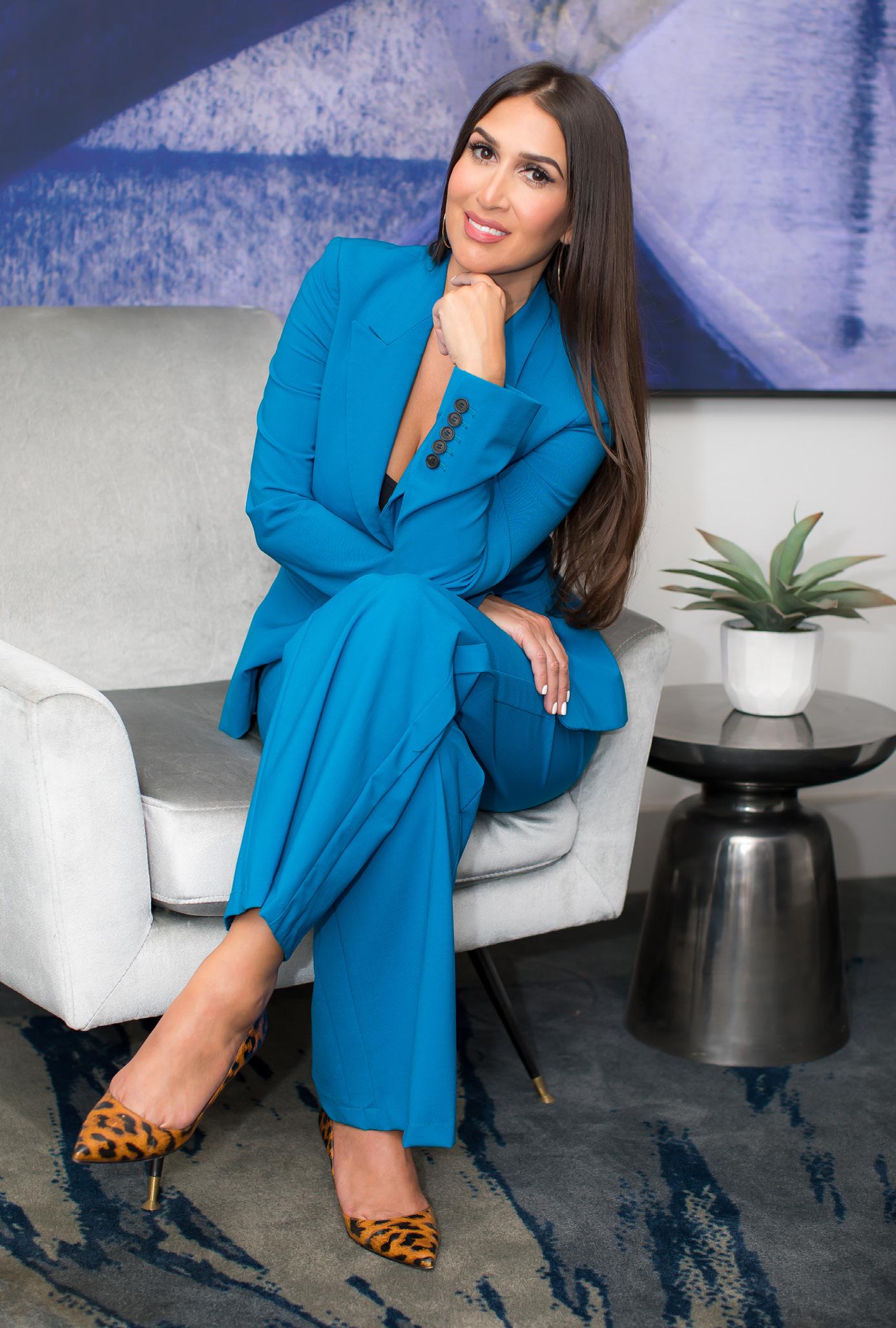
“It feels like the industry caught up to us,” Flores says. “I’m still the same person, still the same hard worker, but now it feels like we are respected more and asked about what we think and how we would execute something. We bring to the table our knowledge of the community and cultural nuances mixed in with general market expertise and years of wins reaching all audiences, not just Hispanic.”
While this step is in the right direction, for Flores, it’s not enough. As a leader, she wants to make a difference for other women of color. She wants to make sure that she is opening doors of opportunity and uplifting others so that she is not one of two or three, but of dozens in a company.
“I love the camaraderie and sisterhood, but I want to be one of many, not one of a few,” she says.
Flores’s sisterhood with other Latinas extends past iHeart and into all sectors of the media and entertainment
industries. She counts WORDAFUL Founder Liz Hernandez as one of her closest confidantes, and it was Hernandez who encouraged Flores to pen a “love letter” to read at her grandmother’s funeral to pay tribute to her legacy.
Flores read the letter of gratitude for the woman she considered her best friend at her eulogy. She mentioned the card with the Eleanor Roosevelt quote on the front that she received from her during that tough time. Inside, its contents were simple yet powerful, an everlasting piece of wisdom she carries with her every day for every occasion, professionally and personally, to help her move mountains.
“Baby, you’ve got this. I believe in you.” —Nana
Aimmune Therapeutics’ Fabiana Lacerca-Allen is a force of nature, and her team helps explain why
BY BILLY YOSTDID SHE TELL YOU IF SHE’D be willing to be kidnapped with you?”
This is a question posed by Aimmune Therapeutics Senior Director of Compliance Laura Hamm about her boss, Senior Vice President of Compliance Fabiana Lacerca-Allen, and it requires some explaining.
Lacerca-Allen’s early years were well documented by Hispanic Executive in 2013: as a child, she experienced repeated kidnapping attempts made by Argentinian guerillas because her father, Carlos Lacerca (an inspirational and loving father who passed away since HE last spoke with the SVP), was working to unseat the dictatorship that controlled the country from 1976 to 1983. In strange parallelism, Lacerca-Allen also recounts the

story of a group of business executives from a rival pharma company who were kidnapped while in Colombia and kept together for eighteen months.
These chilling touchpoints have provided Lacerca-Allen an unorthodox methodology for figuring out exactly who she wants surrounding her in her role and in her life. “I remember thinking that there was no way I would have wanted to be kidnapped along with this boss, because surviving is an attitude and navigating a crisis is a skill and . . . he didn’t have it,” Lacerca-Allen says of the pharma execs’ kidnapping. “That’s why I have the best compliance team in town. We can navigate any crisis together: I’d be parachuted, or kidnapped, anywhere with them. The right leadership makes a difference in everything you do.
“I admire emotional intelligence in people,” she continues, “the ability to assess a situation fast and accurately, the right instinct and intuition, and the courage to do what is right. In my personal life and in my professional world, I surround myself with people that exhibit those characteristics.”

If you haven’t figured it out yet, Lacerca-Allen is an entity all unto herself. She speaks directly, but with charm. Most of her compliance team has been with her from previous jobs. They’ve followed her because they believe in her and the opportunities for self-empowerment she provides.
Compliance Specialist Lucia M. Carrero-Rivera has been with LacercaAllen for many years: “I’m still learning from her and the amazing way she is able to navigate through difficult times,” Carrero-Rivera says. “She is the most analytical and strategic person I know who brings out the best in you even when you do not know it. Fabiana will
give you passage to excel to the highest levels and has your back every step of the way. Her leadership is strategic and compassionate.”
Lacerca-Allen says she’s deeply proud of how Aimmune has handled the COVID-19 pandemic. She says that Aimmune was able to demonstrate its care for its employees, its patients, and the communities it serves in a responsive yet proactive manner.
Lacerca-Allen is particularly proud of Aimmune’s development of Palforzia, the first-ever FDA-approved peanut allergy treatment for children aged four through
Fabiana Lacerca-Allen SVP of Compliance Aimmune Therapeutics
seventeen. “Peanut allergies affect so many parts of a child’s life, from where they sit at lunch to whether or not they can attend a movie with the rest of their friends,” Lacerca-Allen remarks. “We can do something to help them, and it makes me passionate about being able to make a difference.”
Lacerca-Allen, no stranger to extreme circumstances, has thrived during the pandemic. “I feel like my upbringing prepared me to address any crisis, including the current global pandemic, and to rise to the occasion. Strong leaders display emotional intelligence
and an understanding of the issues in a rapidly changing environment and can make a difference. We need to start accepting that life is never going to be the same, and the faster one adapts to that fact, the happier they’re going to be at the end of the day.”
The compliance pro made the best out of suddenly having an extra three hours from her commute to San Francisco available: she grew a garden for the first time in her life, and she’s learning to knit. “I’m so efficient working at home, it’s hard not to look at all of that commuting time—even if it’s just twenty minutes—as wasted time,” Lacerca-Allen
says. “It’s about finding ways to connect with people and prioritizing what’s important.”

For the SVP, adapting is about embracing and evolving with the big picture. It’s a quality that Director of Compliance, Auditing, and Monitoring Brenda Crabtree says her boss possesses in spades. “She is the best boss I’ve ever had, and I don’t say that lightly,” Crabtree notes. “Her leadership style is so unique, and her strategy is incredible and—from my perspective—one of her greatest strengths.”
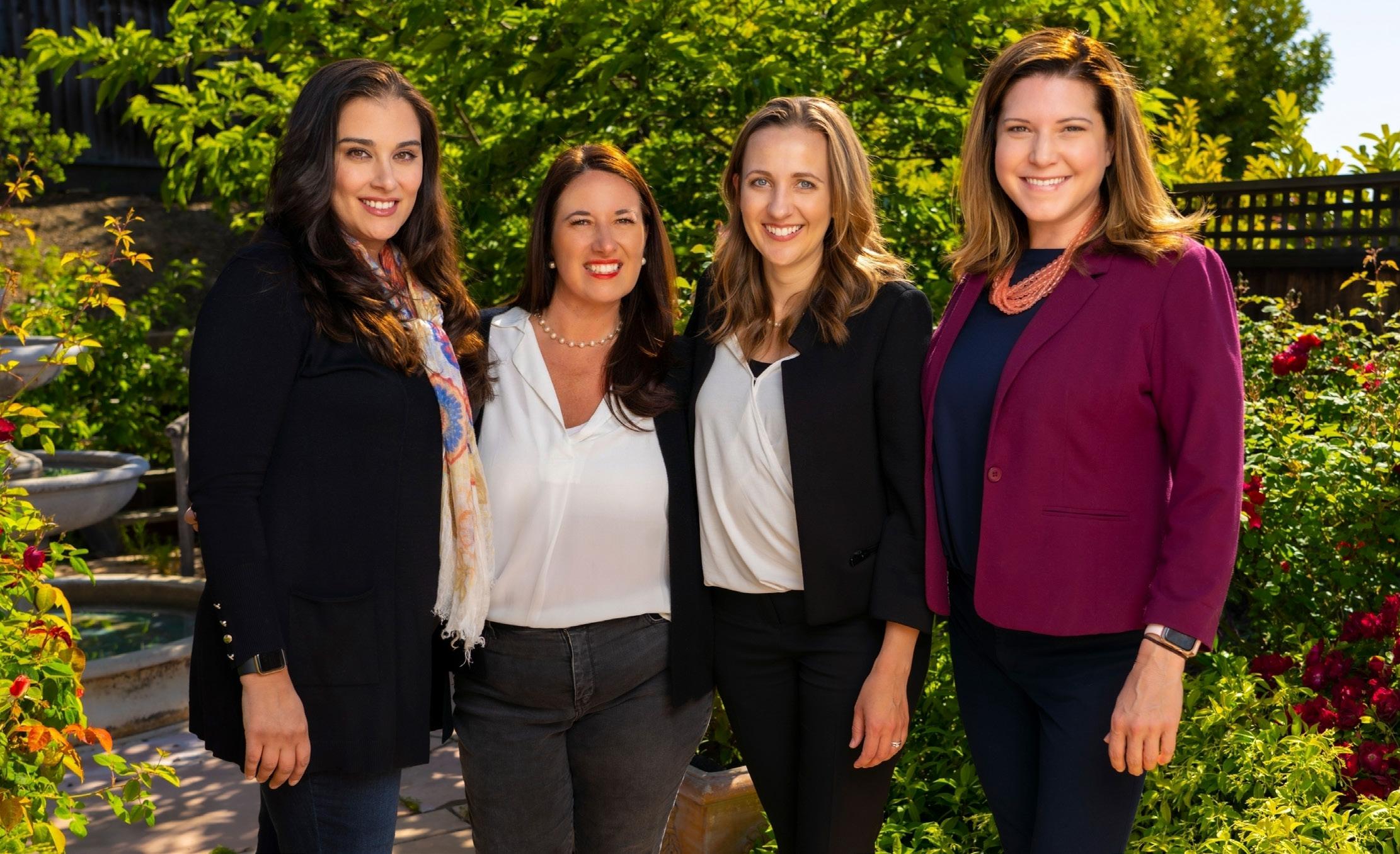
“A corporate environment is a big ship, and a hard one to maneuver,” Hamm adds. “But she’s so nimble. Her risk assessment is based
on true active risks that are ever-evolving, and she changes course on a dime to meet the needs of the business.”
The development and mentorship
Lacerca-Allen provides is also, in its own right, unique. Lacerca-Allen strongly believes in giving back to the community, serving others, and paying it forward. She serves as a board member and an Audit Committee member of Shield Therapeutics, a specialty pharmaceutical company focused on the development and commercialization of products to address unmet needs in the treatment of iron deficiency. She is also a board
member of the Center for Excellence in Life (TCEL), a not-for-profit organization dedicated to empowering youth through life skills development, mentoring, and career counseling.

“I’ve grown and developed with her so much because, as a leader, she will stretch you,” Hamm says. “Both Brenda and I have been volunteered [or] told to do something, and we had to learn how to do it. The difference is that she may push you out of the nest, but she will never, ever let you smash on the concrete.”
“I know she treats her kids exactly like she does us,” Crabtree adds, laughing. “She knows that it’s good for us. She really does things solely for our benefit, and unfortunately that’s incredibly rare in business. She should be the standard.”
Associate Director of Compliance Tatiyana Akers says, “I have also had the pleasure of working with Fabiana
over the past eleven years, and she has earned my loyalty and respect through her outstanding leadership which includes pushing us out of our comfort zones, empowering us and giving us the space to flourish, and showing us that strong women can be not only fierce and effective but kind and empathetic as well. I hope I never get kidnapped, but if I do, I am definitely grabbing onto Fabiana until we figure a way out!”
Lacerca-Allen doesn’t tell me whether we would make it if kidnapped together, but at the end of our conversation, she offers, “I’m pretty intuitive and I tend to make accurate and fast decisions about people and their capabilities. I like you a lot. I think you’re going to make a difference.”
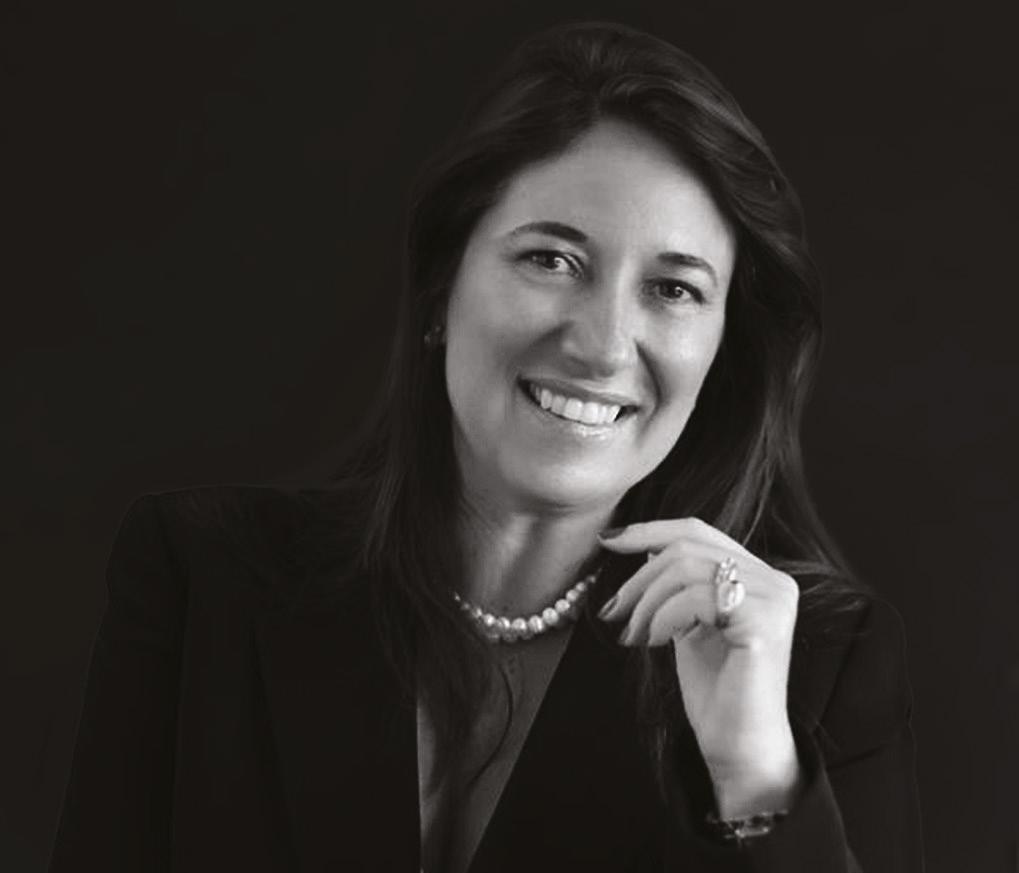

The feeling of relief I experienced is enough to understand why Lacerca-Allen’s people stay with her. You want to do right by her because she is looking out for you, always.

“I feel like my upbringing prepared me to address any crisis, including the current global pandemic, and to rise to the occasion."
 BY WILL GRANT PORTRAITS BY PAUL QUITORIANO
BY WILL GRANT PORTRAITS BY PAUL QUITORIANO
In the “opportunity of a lifetime,” Maria Bartolome Winans helps Kyndryl launch a multibillion-dollar service-centered business with people as its priority
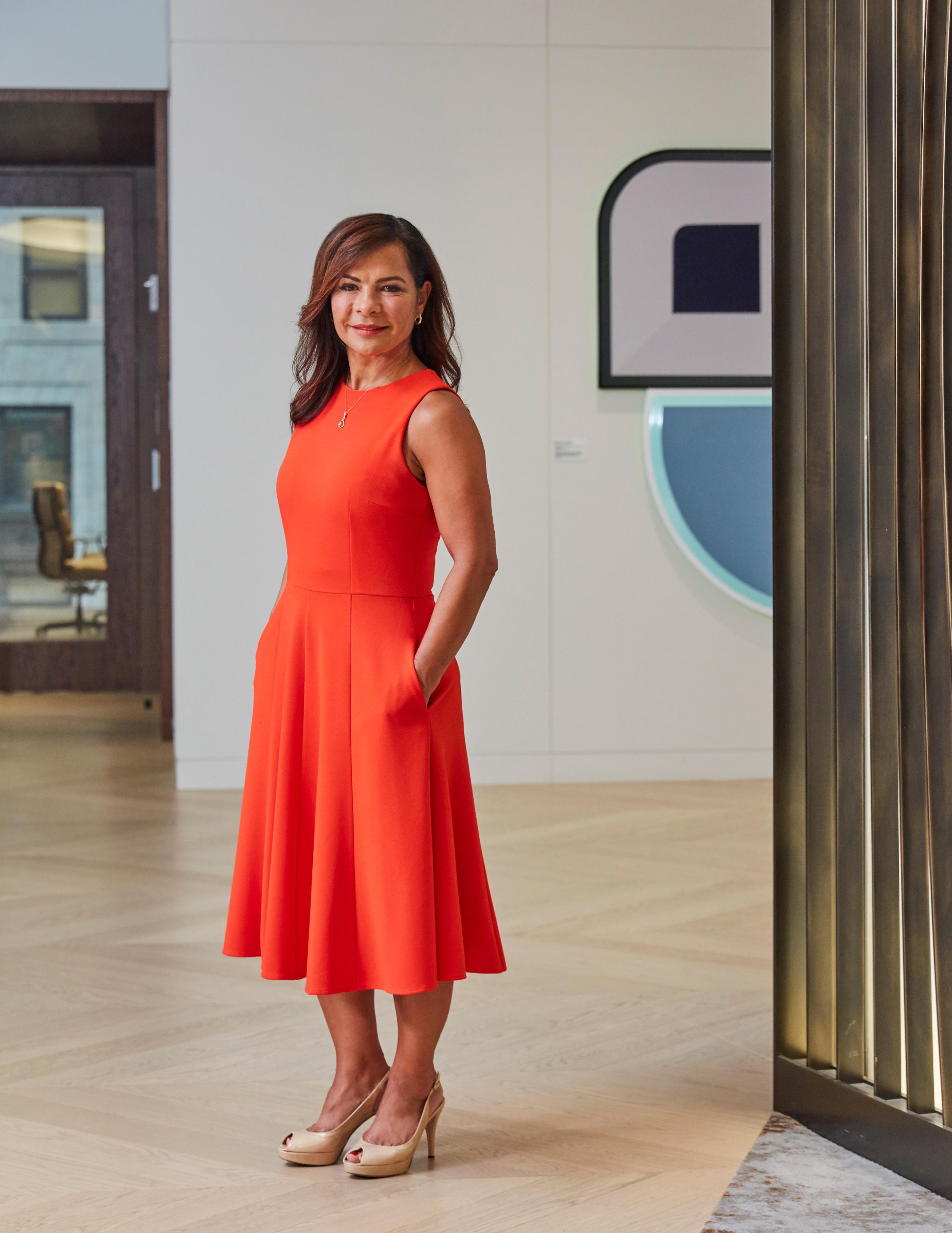
Creating and building a world-class global brand from scratch for a start-up at scale with 88,449-plus employees and a global base of 4,600 clients—including 75 companies in the Fortune 100—is no small challenge, but Bartolome Winans was ready.
“I’ve been a curious person since my childhood, always looking for the next learning opportunity,” she says. “So stepping into this role was an easy decision. It’s a once-in-acareer opportunity as a marketer.”
Kyndryl is a technology services company that designs, builds, manages, and modernizes the mission-critical technology systems that the world depends on every day. With highly skilled practitioners worldwide, deep
expertise in digital environments, and tools to drive continuous innovation at scale, Kyndryl is advancing the vital systems that power human progress.
As a twenty-nine-year veteran of IBM who held numerous global positions during her tenure with the company (most recently, as CMO for the Americas), Bartolome Winans saw the transition to Kyndryl as a chance to reenter the global marketplace at a services company where people are at the heart of business operations.
“At the core, Kyndryl is about the people,” she explains. “Our experts are the ones who show up in front of our customers every single day. They’re helping our customers solve
critical technology issues such as maintaining business continuity and reducing operational risk with increased security, enhancing operational efficiency with IT infrastructure, reducing the barriers of complexity and skills shortages, and driving transformation and agility through Kyndryl’s comprehensive suite of capabilities.”
The focus on services, not software or hardware, is inherent even in the company’s name. “‘Kyndryl’ is all about the spirit of partnership and growth that’s intrinsic to who we are,” Bartolome Winans remarks. “It’s a modern spin on the idea of ‘kinship’— referencing the belief that people are at the center of everything we do and that relationships are built and nurtured over time. New growth is hinted at in the end of the name, which sounds like ‘tendril’—we will build our business on relationships and grow alongside our customers.”
Fostering a culture that prioritizes people isn’t a new mission for Bartolome Winans. In fact, it’s the reason she’s remained in the technology industry for nearly three decades.
When she joined IBM out of college, Bartolome Winans felt valued and empowered to bring her most authentic self to work—as a businesswoman, an artist, and a proud Latina. Later, as she climbed the leadership ranks, that experience inspired her to
advocate for the culture of inclusion that she so appreciated. During her time at IBM, she not only served as cochair of the company’s Hispanic Council but also mentored other Latina leaders and consistently worked to inspire the young professionals all around her.
Kyndryl, Bartolome Winans points out, is a chance to build an industry-leading D&I approach and prioritize inclusion from the very beginning. “I want Kyndryl to be a people-first company,” she explains, “where every employee should feel heard and empowered to show up as their fullest selves.”
Kyndryl’s people-first culture goes hand in hand with its nature as a services company. But identifying Kyndryl’s culture and truly cultivating it from the top down are two different things—at the end of the day, Bartolome Winans knows, company culture is driven by the people who live it.
So while the Kyndryl leadership team has built out cultural platform ideas for Kyndryl, the company ultimately depends upon every employee—senior leaders included—to help foster a culture where people are restless, continuously anticipating, learning, and innovating; empathetic, serving with trust and transparency; and devoted to customers.
“We’re going to be a company that supports employees and customers by operating in a model that empowers accountable,
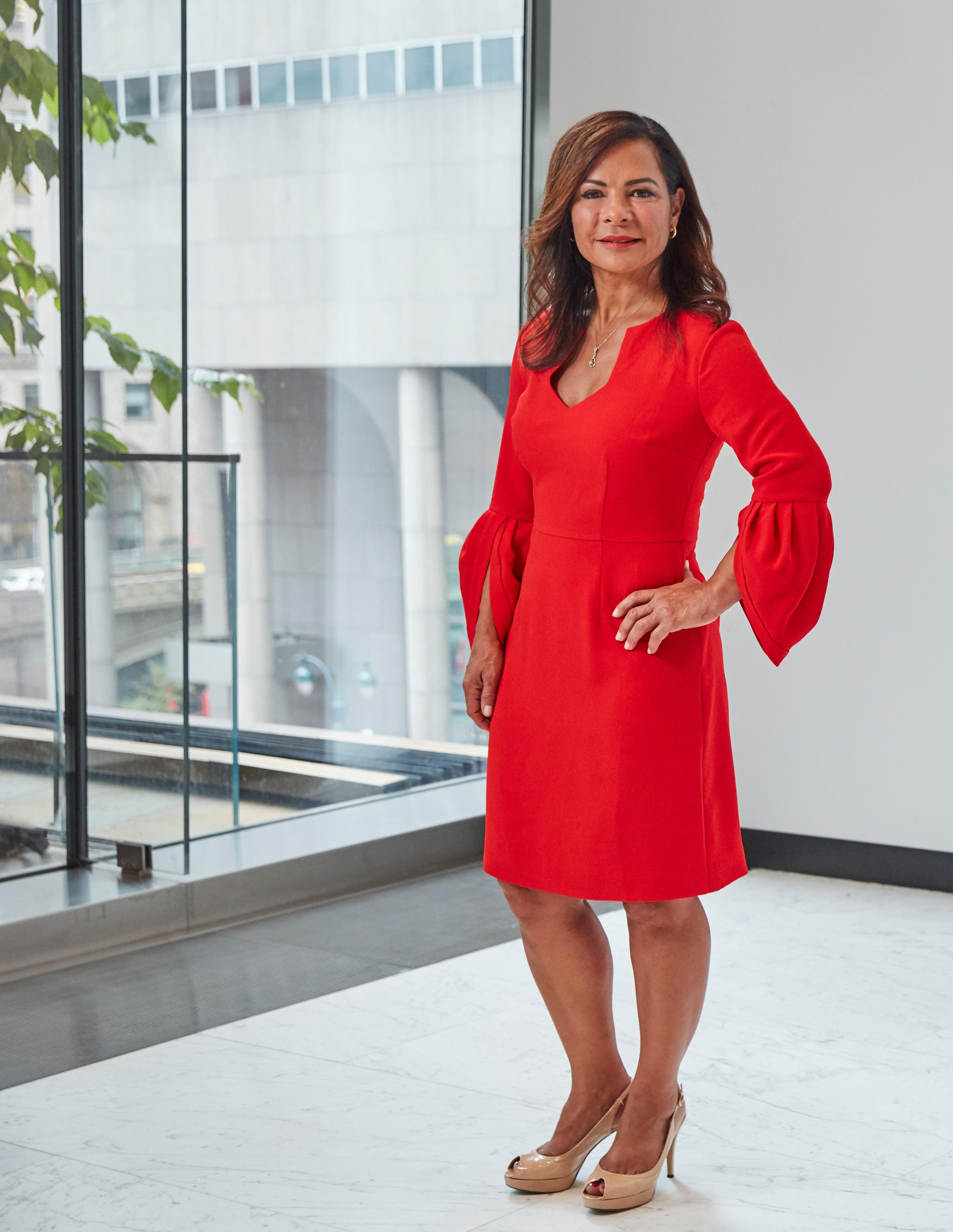
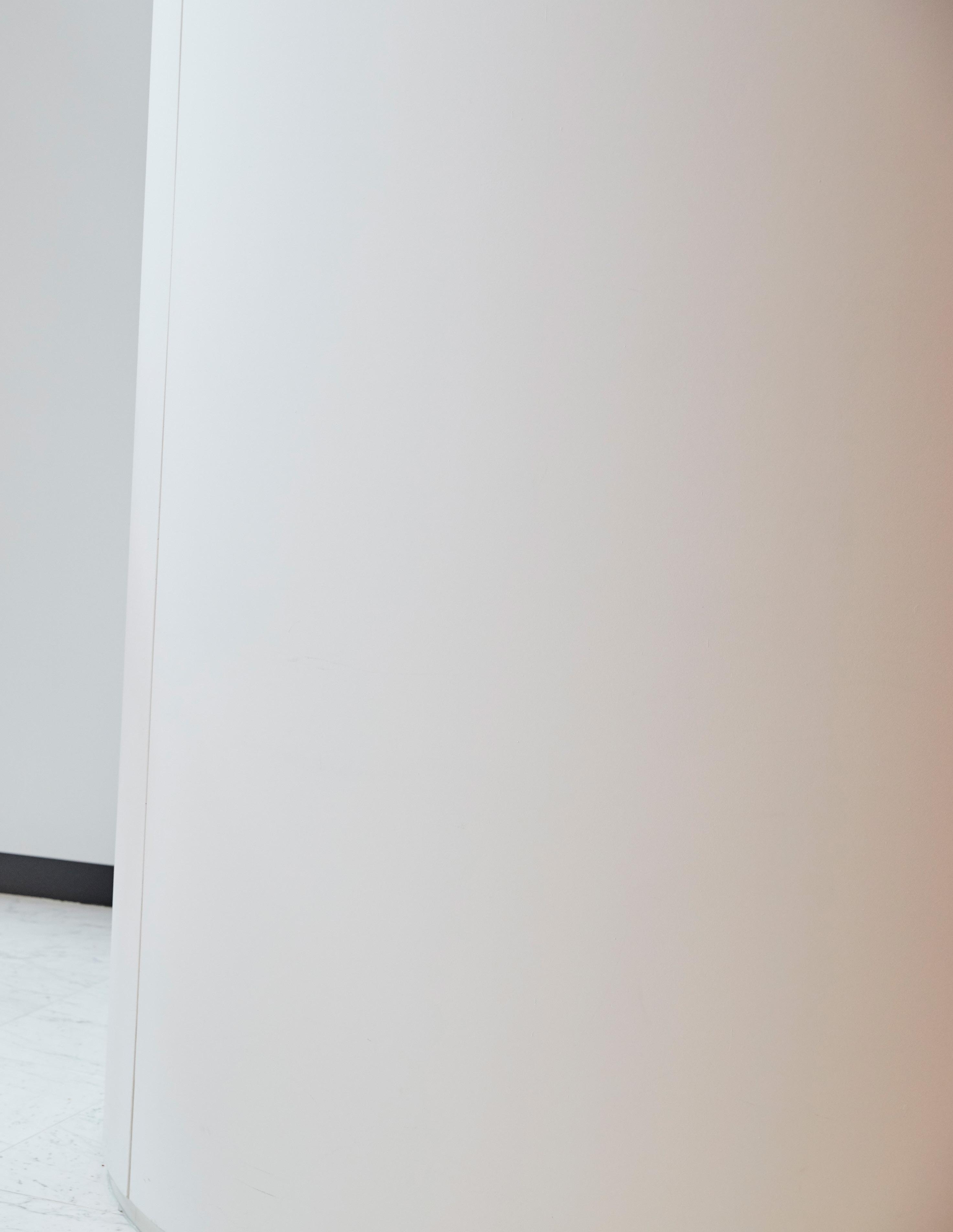
“Trees provide oxygen, and we think of our Kyndryls as the oxygen of the organization. At the heart of this company are our global employees. They are the ones helping us prepare for growth and success."
inclusive teams; cultivates simplicity everywhere; and delivers exceptional services—this is the Kyndryl Way of working.”
To underline Kyndryl’s commitment to its people, the company has partnered with the OneTreePlanted nonprofit to plant ninety thousand trees around the world, with a personal dedication to each and every Kyndryl employee.
“We want our people to know that they are the root, the beginning, of Kyndryl,” Bartolome Winans says. “Trees provide oxygen, and we think of our Kyndryls as the oxygen of the organization. At the heart of this company are our global employees. They are the ones helping us prepare for growth and success.”
So with a spin-off completed and a career-defining moment in the works, what does Bartolome Winans see herself doing next? After nearly thirty years as an “IBM-er,” where does she hope to take the company she’s helping bring to life?

“I want Kyndryl to become the employer of choice,” the CMO says simply. “I want Kyndryl to be known as an employer who places the highest value on its people, recognized for our culture and expertise.”
Bartolome Winans and the leadership team at Kyndryl have gone to incredible lengths to bring heart to a brand-new services company. It’s an exciting time—for them, for the industry—and Bartolome Winans and company are ready to place a premium on people.


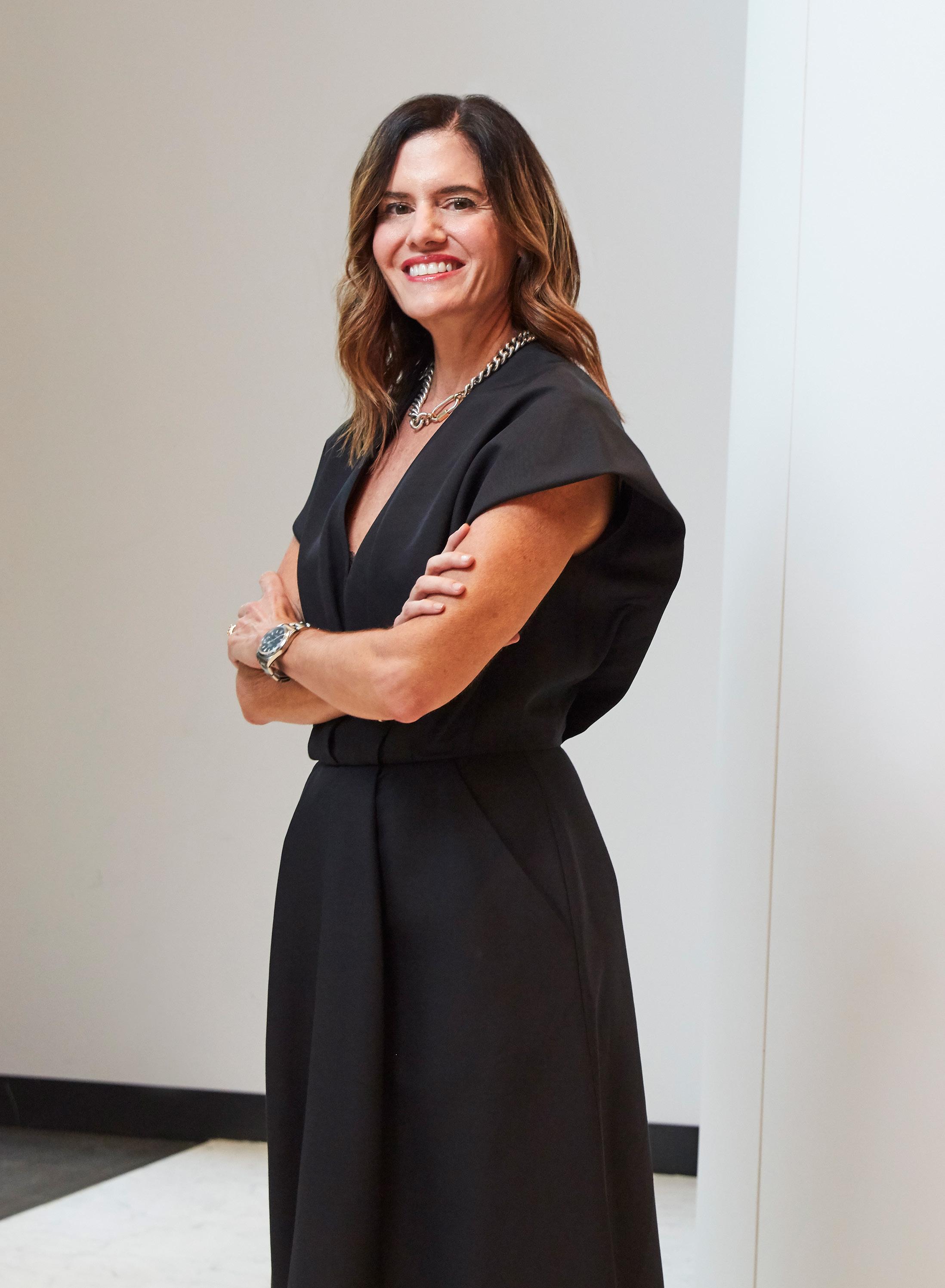
CARLA PIÑEYRO SUBLETT knows the value of transferable skills. She put herself through college by working in restaurants and bars, where she learned about cash flow, P&L statements, and customer service. In fact, one day while she was helping one customer in Spanish, another patron nearby made note of her skills. He told Sublett she should apply for a global team he happened to be leading at Dell. The company had just launched its Latin American division, he said, and Sublett seemed like an ideal fit for the role.
BY BILLY YOSTCarla Piñeyro Sublett is working in her “dream role” at IBM. Her path to that role has had its share of twists and turns, but every single one has helped shape her into the impactful leader she is today.
Sublett decided to take his advice. Over the next fifteen years, she was promoted seven times, building on her skill set and cultivating an expertise that eventually landed her a “dream role” at IBM, one of the most famous tech companies on the planet.
As she leans into her current responsibilities as senior vice president and chief marketing officer, Sublett remains keenly conscious of the significance of the role. “Having the opportunity to helm IBM’s marketing organization is a winning lottery ticket for me,” she says, “and I feel an enormous responsibility—a need—to pay it forward and give back.”


Sublett’s empathetic leadership style is rooted in her understanding of what it means to be an outsider. Born in Uruguay, Sublett and her family moved to Montreal and then Dallas when she was just five years old.
Unfortunately, Sublett did face some discrimination growing up. In Dallas, Sublett and her sister went swimming in a neighborhood pool. When one man heard Sublett and her sister speaking Spanish, he pulled his child out of the water. “It was as if the water was poisoned by us,” the CMO remembers. “It’s a story I still haven’t told my parents about to this day.”
With age and time, Sublett has realized that her “outsider” status is, in a way, a superpower. It has fostered in her a sense of empathy and connection in her—and driven her toward organizations where those qualities are truly valued.
“Part of what attracted me to IBM was that our heritage is centered on diversity, inclusion, and accepting people as they are,” Sublett explains. “I feel the most comfortable I’ve felt in my whole career here.”
Sublett has always been sure about the importance of diversity, inclusion, and empathy, but she hasn’t always been equally certain about other aspects of her professional life. After seventeen years of dedicating the bulk of her energy to work, and after successfully helping Rackspace navigate a company sale in 2017, she found herself feeling adrift: she felt disconnected from her husband, her children, and her concept of who she was outside of her profession.
“I had worked every day since I was thirteen years old,” Sublett says. “That was a large part of my identity, and I felt like I needed to reestablish a connection with others.”
Sublett and her husband took their children out of school and spent a year traveling the world device-free. The CMO calls this
period her “finding Ubuntu” year, referring to a Nguni Bantu term that roughly translates to “humanity towards others.”
In finding Ubuntu, Sublett found herself. Between trips, she went on one hundred “professional dates” with investors, CEOs, CMOs, and “anybody that would take a meeting or a call.” One of those meetings was with IBM CEO Arvind Krishna, who petitioned her to join the company.
Sublett returned to her life more aligned on who she is as a human being, with a deeper
sense of connection. But it is also because of the lessons she learned during that year that she has been able to make such an impact and make such great strides at IBM in a relatively short period of time.
As Sublett sees it, her remit at IBM is to help the organization return to sustained growth while also working within the marketplace to provide a sense of clarity about the brand’s identity as the company moves into the future.
“Having the opportunity to helm IBM’s marketing organization is a winning lottery ticket for me, and I feel an enormous responsibility—and a need—to pay it forward and give back."
To Carla Piñeyro Sublett, being a leader means helping to improve the lives of those around her. That philosophy is clear in both in her commitment to diversity, equity, and inclusion at IBM and in her nonprofit activities. Sublett currently acts as chair of the Texas Conference for Women, is the incoming chair for the Austin Community Foundation, and recently joined the board of the Aspen Institute.
“I feel enormous responsibility for the opportunities I’ve been given, both at IBM and just in my parents coming to this country,” Sublett says. “My role now is to make an impact, not just in the community where I live but from a global perspective.”
“I’ve been given a tremendous amount of agency by my boss, my peers, and my team to drive significant change to help us align our marketing function, which was previously operating like forty different organizations in a company that operates as one around the globe,” Sublett explains.
Sublett’s approach to reestablishing IBM’s presence in the market is grounded in the company’s three areas of expertise: consulting, software, and infrastructure.
“Our strategy is going after the hybrid cloud and AI market; we believe that is what will help enable our clients to truly unleash the power of technology,” she says. “My job is taking that message to the market in 2022 so that clients can understand what that means in terms of problems they’re facing on a day-to-day basis.”
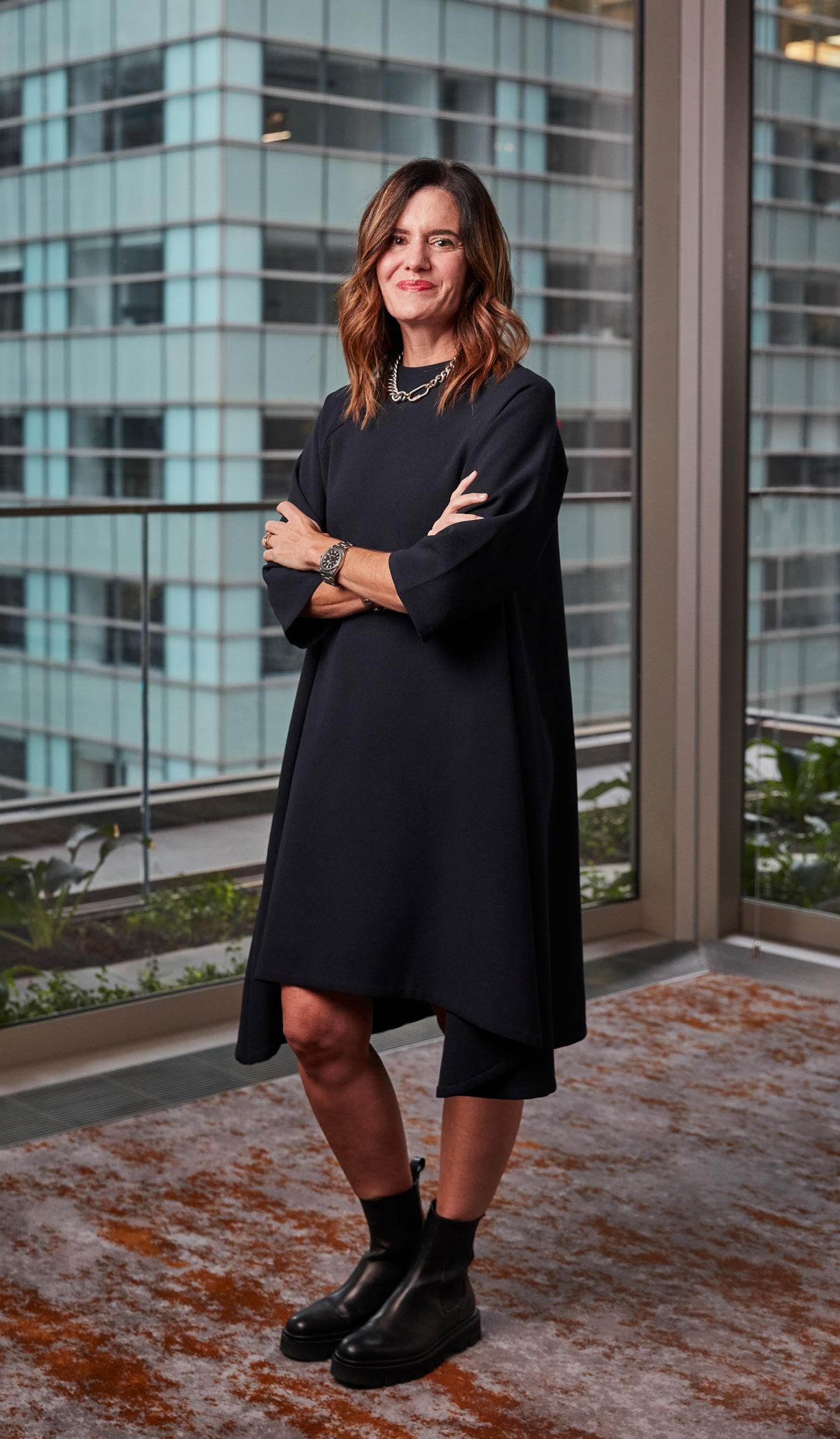
But IBM isn’t waiting until 2022 to make the value of this strategy apparent. The tech giant has been on the forefront of critical solutions this year, including infusing AI and natural language processing into the critical workflow of CVS Health’s telephonic customer care system, leveraging IBM Watson Assistant on the IBM Public Cloud when CVS faced a tenfold spike in call volume during the pandemic. This gave CVS Health the ability to quickly and accurately respond to a range of questions on COVID-19, Sublett explains, including questions about tests, vaccines, symptoms, proof of vaccination, cost, and more, freeing up human agents to handle the most complex requests.
All in all, it’s an exciting time to be a leader at IBM, Sublett says. “We have so many compelling examples of what technology has done for our clients. This is the most innovative company I’ve ever worked for, and our progress continues to blow me away.”


Gilda Perez-Alvarado has spent her life and career traveling the world. Now, as global CEO of JLL Hotels & Hospitality, she relies on her experiences to drive business results and champion inclusivity.
Gilda Perez-Alvarado Global CEO for the Hotels & Hospitality Group JLL

THE WORKPLACE HAS BEEN designed for men. We need the people at the top to redesign the workplace so it works for everyone.” Gilda PerezAlvarado knows the struggles faced by women working in commercial real estate. She’s spent the past nineteen years crafting a global career that mirrors her international upbringing and that has allowed her to create her own personal brand—both as a woman and as a minority. Now, she’s looking to be one of the people at the top who can change the outlook for the women coming up behind her.
Perez-Alvarado is the highest-ranking Latina at JLL, an innovative professional services firm focused on real estate and investment management. As global CEO of the organization’s Hotels and Hospitality Group, she manages a team of 350 hotel professionals in the Americas, Europe, Asia Pacific, and the Middle East. PerezAlvarado also coordinates investment sales, equity placement, asset management, debt, and strategic advisory.
A lifetime of experience has prepared Perez-Alvarado for this global leadership role. The self-described “global citizen” was born in Costa Rica: her father is from El Salvado, and her mother was born in the United States to parents from Costa Rica and Nicaragua. By the time she was twelve, she had lived in North Africa, Europe, and Central America. At age thirteen, Perez-Alvarado came to the United States and settled in Indiana, where her parents pursued PhDs at Purdue University.
Perez-Alvarado wanted to be a scientist or a biochemist and dreamed of finding the cure for AIDS. But when she took organic chemis-
try at Cornell, she found herself staring at the clock instead of reading the textbook. “I realized that I needed to rethink my career path and find my true passion,” she says.
Perez-Alvarado’s mother was a hotelier, and some of Perez-Alvarado’s fondest memories involve her grandmother’s hotel and restaurant and her mother’s work as the manager of the largest hotel in Costa Rica. Inspired by her family, the young college student changed courses and enrolled in Cornell’s School of Hotel Administration.
Upon graduation, Perez-Alvarado started her career as a hotel consultant at PricewaterhouseCoopers, where she spent nearly two and a half years completing feasibility studies in the Caribbean. The job required lots of interviewing and plenty of travel. “I broke in and got a great feel for the regional market and a deep understanding of clients’ needs,” she says. “But I wanted more experience in finance and transactions.” PerezAlvarado called a mentor, who submitted her résumé to JLL.
As Perez-Alvarado has risen through the organization, she’s led teams, perfected her skills, and stacked up impressive accomplishments. She started as an analyst in 2004 in Miami, where she worked in both investment sales and asset management. In 2005, she transferred to New York, where she started working on cross-border assignments, and in 2007, she jumped on the opportunity to participate in the firm’s exchange program and transferred to London.
After a year in London, she was transferred to Madrid, where a new business line was started to adapt to the realities of the market at the onset of the Great Financial
Crisis. In 2010, when the US market was recovering, Perez-Alvarado went back to New York, where the Global Hotel Desk was started and the group’s cross-border investment sales team was formalized. During her time at JLL, she has also coordinated the global marketing campaigns in the sales of the Montage Beverly Hills, Four Seasons Toronto, St. Regis NY, and the Plaza Hotel in New York.
Perez-Alvarado’s global and entrepreneurial career at JLL has not only given her a strong financial acumen in the field of hospitality capital markets, she says, but has also enabled her to build her leadership skills and develop strong connections with both her colleagues and clients. “If you want to stand out and be the best, you need to focus on one true passion,” she advises. “And my passion is global.” Perez-Alvarado has built her own style of brokerage, championing diversity and uniting colleagues from around the world to bring best practices home to the corporate office.
Of course, Perez-Alvarado—like so many other executives around the world—has recently had to rethink how she approaches her work. When she became a mother in February 2020, JLL had just completed a major merger. Perez-Alvarado was starting her second full year as CEO of the Americas for the Hotels and Hospitality Group. Then the COVID-19 pandemic hit.
As JLL transitioned to a remote setup, Perez-Alvarado moved to Nicaragua for a year, where she relied on her family to help her balance her professional and personal duties as a new mother. Her family support, Perez-Alvarado says, made 2020
manageable—and led her to think about better ways to support working parents, caregivers, and new mothers. “I experienced for the first time how difficult professional life is for working mothers,” she says. “Without support from my family and the flexibility to work from home, I would have had to make a difficult choice, and I probably would have quit my job.”
That life-changing event is impacting Perez-Alvarado’s leadership approach as JLL begins to reopen its offices. She’s thinking more about what it means to redefine the workplace and how she can drive change as a leader. “Something needs to change. If we just go back to the office, we’re not going forward,” she says.
JLL has tested what it means to allow more flexible work environments. PerezAlvarado expects some policies to change and is working to influence other leaders at the massive company, which has approximately ninety thousand employees. Now back in the US, she is not only focused on growing the business and maintaining JLL Hotel’s number one market share but is also working with JLL leadership to focus on diversity and inclusion.
Today, Perez-Alvarado does her best to juggle the competing demands of work and parenting. She rises early to care for her daughter before starting international calls with clients and colleagues in the Middle East, Europe, and Asia at 6:00 a.m. For women, minorities, and other working moms, her advice is simple. “Just bring your entire self,” she says. “Be the worker, the woman, the mom, the wife, the daughter. You don’t have to leave it behind.”
“If you want to stand out and be the best, you need to focus on one true passion. And my passion is global."
Latinas continue to make strides in the corporate world, but research from the Latino Corporate Directors Association and Morgan Stanley shows they’re still being left behind when it comes to representation in the boardroom. It’s time to change that.
Latinas represent 18 percent of the female population in the United States but hold just 1 percent of the available board seats in the Fortune 500. That is the lowest level of representation for any ethnic group or gender.
1% Latina
USFemale Population

18% Latina
Between 2010 and 2020, there was only a 0.3 percent increase in the number of Fortune 500 board seats going to Latinas.
The philosophies of innovative leaders have the power to inspire and spark change. Read on for the thought-provoking insights of these successful executives.
154. Maria Rivera, Krispy Kreme 159. Sianna Castillo, BioMarin Pharmaceutical Inc. 162. Mauricio Prado, Wynn Las Vegas 165. Elena Garnica, Netflix Inc. 168. Brenda Velasquez Wagner, Labcorp 172. Italo Intriago, Red Hat 176. Belinda Aguilar Thompson, GEHA Health 181. Reyna Sanchez, Six Flags Entertainment Corporation 186. Benjamin Yrun Ostapuk, Intel CorporationOver the course of her career, Maria Rivera has climbed from a dishwasher role to the C-suite. Now, she’s helping Krispy Kreme aim just as high.
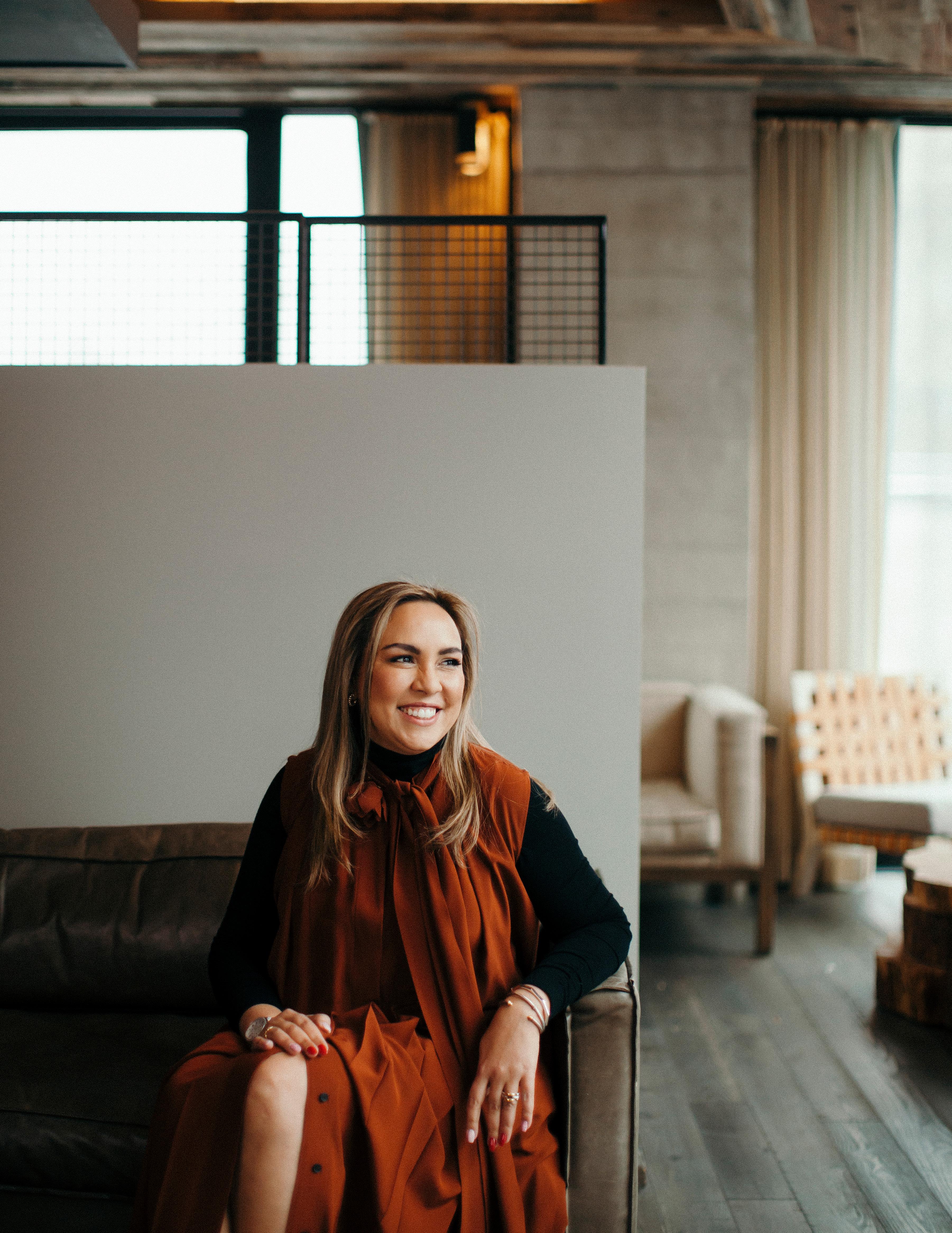
OVER THE PAST TWENTY-FIVE YEARS, MARIA Rivera has held just about every position possible in the food services industry. As a Hispanic woman in a space long dominated by men, she’s had an equally wide range of experiences in her various roles—both good and bad.
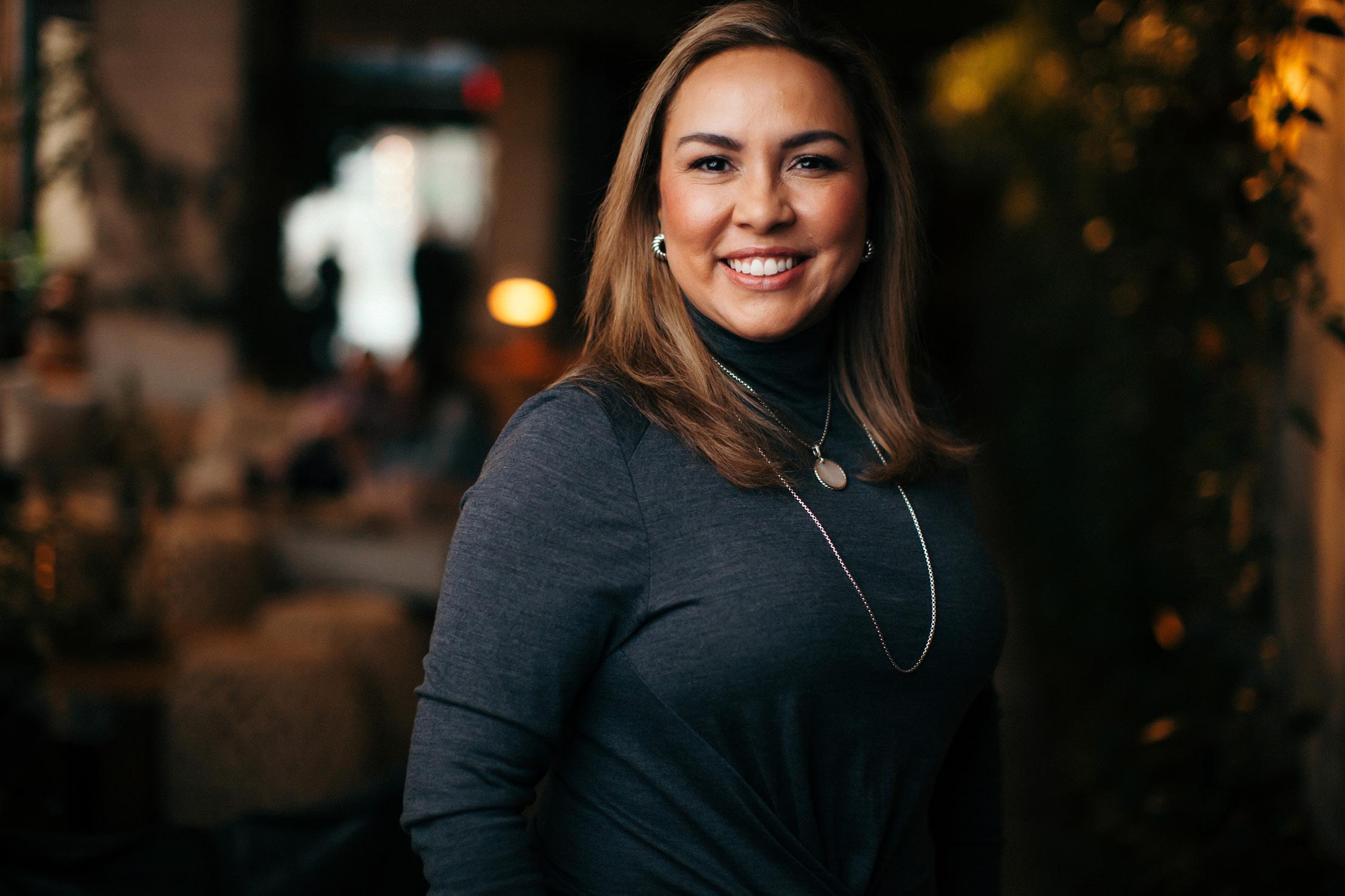
“I have gone through it all, including being harassed, bullied, and made to feel true inequality in the workplace,” Rivera says. “But I have also been incredibly fortunate. I have had so many career mentors and leaders take an active interest in me. They have supported me through the years, believed in my platform, and seen me for me.”
Through hard work and dedication, and with plenty of support from her mentors, Rivera has climbed to the top. She now serves as chief operating officer for the United States and Canada at Krispy Kreme, a historic doughnut brand currently undergoing an equally historic revitalization in which Rivera has a major role to play. She has made it her mission to help the company reach its full potential—by breaking into new markets, expanding operations, and, most recently, going public.
Rivera first entered food service after moving to the mainland US from Puerto Rico as a twenty-four-year-
old single mother. She took a dishwasher job at Walt Disney World, then worked her way up within the resort organization. “To come from an island and plant yourself in diaspora—you choose to leave your country, your relationships, and your parents to pursue the American dream,” she says. “I started at Disney as an hourly team member and left as an area manager, which is the equivalent of a director of food and beverage.”
In 2004, Rivera left Disney to manage hotel food and beverage services at Hilton properties in the Caribbean. She later branched out into the gaming industry through a stint at Caesars Entertainment before landing squarely in the restaurant space as managing director and regional vice president of operations at the Darden family of brands.
While learning the ins and outs of restaurant operations at Darden brands like Olive Garden as well as at other companies like TGI Fridays, Rivera developed a specialization in turnaround, operations restructuring, and transactional activity. “I gravitate toward brands that need to go through both a financial transformation and a people transformation. I like to take things apart and rebuild them,” she says.
Her skills caught the attention of Krispy Kreme in 2016. By that point, Rivera was well aware of the impact her identity had on her professional life. “I did not express publicly that I was Hispanic at the beginning my career. I never talked about my gender, my diversity, or my experiences as a woman of color,” she explains. “You try to compartmentalize, but it certainly shapes you to walk into a room as a vice president and have a colleague turn to you and say, ‘Honey, can you please get me coffee?’”
Rivera adds, however, that she’s not a victim in any way. “As a minority, you have a choice to make,” she says. “I’ve been underestimated a lot. I’ve had to work twice as hard as my male colleagues in order to be taken seriously. That’s a challenge, but it’s also an opportunity.” In Rivera’s case, she took the opportunity to advance her career by being incredibly disciplined, earning a bachelor’s degree and two master’s degrees while also raising a son completely on her own.
Today, Rivera believes in calling out biases when she sees them and bringing her whole self to the table. In that sense, she has found her perfect match in Krispy Kreme. “Krispy Kreme has afforded me the opportunity to lead in a way that’s as true to myself as possible,” she says. “I can be incredibly authentic here, and I have been able to leverage being very entrepreneurial in order to build up this brand, helping it achieve its full potential.”
That potential, and its leadership, is what attracted Rivera to the company in the first place. “I wanted to take this eighty-plus-year-old brand, which is absolutely beloved, and reintroduce it to a new generation of people,” she says. “We’re expanding into markets where we’ve had no presence, or no presence in over a decade. Looking at New York City, we launched an entire market in the middle of a pandemic and opened a global flagship in Times Square. We also opened a doughnut factory that services over 125 points of access in New York alone. To be able to offer over five hundred new jobs at a time where the world had shut down was incredibly rewarding.”
Besides establishing the new flagship location in New York’s Times Square, Rivera has guided Krispy Kreme through a delivery model transformation that revolves around making doughnuts fresh seven days a week. It’s doubled the size of its business, opening
We strive to ensure that our workforce reflects our communities and that it encourages positive social change. We are committed to making sure that all our Krispy Kremers feel safe, heard, valued, and have equal opportunity for growth.
want to join us?
Look for opportunities near you at sweetplacetowork.com
WE TOUCH & ENHANCE LIVES THROUGH THE joy THAT IS KRISPY KREME.
FleishmanHillard celebrates our friend, client
a true
Maria Rivera, who like us, never settles. It’s a joy to work with you, Maria. Congratulations!






twenty-eight new shops last year and expanding its points of access to every Walmart in the US.
That growth paved the way for Krispy Kreme to go public in 2021. But for Rivera, there’s more to the story. “We’re not just a collection of doughnut shops,” she explains. “There’s this interaction between the doughnut maker and the doughnut consumer: we are giving you a little bit of our heart. Part of why we resonate with people is because we do so much good. We gave away over thirty million doughnuts to the community last year. People love our warm spirit, our generosity, and the way we think about giving back.”
The company’s spirit certainly resonates with Rivera, who identifies her impact on other people as her most important contribution at Krispy Kreme. “Inside the four walls of our shops we can learn the most, listen the most, and effect the most change with our people,” she says. “If I can inspire and change someone’s life along the way, that is my best work.”
Rivera, who spends two days a week visiting Krispy Kreme shops around the country, challenges her team members to keep striving for more—just as her own mentors pushed her to do throughout her career. As she looks to the future, Rivera hopes to challenge the industry at large to strive for more as well. “When I think about my own dreams and goals, not only for the organization but also for myself, most of them have to do with giving back and really driving diversity and inclusion efforts across the food services industry,” she says.
Even as she crafts a legacy to leave behind, Rivera can’t imagine stepping away just yet. “I often say that the day I don’t love what I do, I’m going to retire,” she jokes. “But I don’t see that happening any time soon.”
Truth and authenticity are what FleishmanHillard helps clients achieve. We’re experts in reputation management; diversity, equity and inclusion communications; public affairs; marketing; media relations; research, analytics, and intelligence; crisis; social; content; healthcare; technology; and strong, strategic creative. Dedicated to doing what’s right, we’re respectful collaborators committed to never settling.
“It certainly shapes you to walk into a room as a vice president and have a colleague turn to you and say, ‘Honey, can you please get me coffee?’”
and
“original,”
IT’S EASY TO IMAGINE THE FIELD OF “regulatory affairs” as a haven for paper shufflers or for lobbyists striving to eliminate barriers to profitability.
But that’s not the case, says Sianna Castillo, and she should know. Castillo is a director of regulatory affairs for the CMC (chemistry, manufacturing, and control) Group at BioMarin Pharmaceutical Inc. in Novato, California.
“Pharmaceuticals are subject to various regulations during the product development, manufacturing, and distribution phases,” she explains. “My job is to identify any issues or potential challenges that might prevent one of our products from reaching the market, and then to work with various internal business partners to ensure our compliance with all of them.”
Fortunately, health authorities often issue guidance documents that offer flexibility with possible ways to comply with regulations. At such times, Castillo presents the suggestions to her internal partners, then carries their compliance proposals back to the regulators until all parties are satisfied.
But her work continues long past the initial sales date. Regulations develop over time, and Castillo must stay on top of those changes as well. “For example, we have products that have been on the market for almost twenty years—but are still subject to newer standards as they evolve,” she says.
Castillo’s interest in science began when she was about eight years old. “I broke my arm and required arthroscopic surgery to fix it. That was when I started to make the connection between science and medicine,”
she says. “After that, I started learning more about science by reading science books and watching scientific programs on TV, and it just developed from there.
“When I was a young student, no one in my family could help me with my science schoolwork; they just didn’t have the background for that,” Castillo continues. “So I met with teachers after school or took out library books. I had to figure out many things on my own, and that helped instill good study habits. Because of them, I worked hard and received numerous scholarships and awards.”
Castillo adds that, although no one else in her family had worked in or studied the sciences, they wholeheartedly supported her interest. “I decided that I wanted to dissect a dogfish shark for my middle school science fair project—and my mom actually found one
for me!” she recalls. “It was about a foot long, and she had to clear out space in our freezer to store it. My project earned a blue ribbon.”
That passion for science persisted, and Castillo earned three back-to-back degrees: a BS in nutrition and food science from the University of California, Berkeley; an MS in biochemical nutrition from the University of Kentucky; and a PhD in biochemical and molecular nutrition at Purdue University, followed by postdoctoral fellowships at the
National Institutes of Health (NIH) and at the University of California, Davis.
Her graduate school and postdoctoral work focused on a particular class of lipids called sphingolipids. Disorders of sphingolipid metabolism are rare but potentially fatal and include Niemann-Pick disease, Tay-Sachs disease, and Fabry disease.
Castillo joined BioMarin as a research scientist in 2007. “Basically, our research scientists help discover and develop early

“It’s important to stay true to yourself—to follow your passion regardless of what other people think.”
forms or modalities of potential therapies for genetically defined diseases,” she explains. “They help generate the fundamental understanding of the therapy: what the therapy will look like, how it will be made, and what it will do. Their work determines if the therapy will be a small molecule, a replacement protein, a functional copy of an actual gene, or if other approaches are needed.”
Her duties included participating in the application process to run clinical trials, which required the interaction of numerous cross-functional groups to create a coherent narrative. “I realized there were other ways to use my science background,” Castillo says. In 2012, she joined the regulatory affairs group, assuming her current position in 2018.
“I sometimes call CMC ‘the quiet giant;’ we help attain the milestones that can lead to approval for a product—which is what makes the company successful. I work closely with my regulatory colleagues in the UK as well as our process development and testing groups, the manufacturing arm of our business, R&D, health regulators, and other groups to develop strategies based on science and business drivers,” Castillo says. “It lets me see the big picture and keeps things moving in the proper direction.”


Unfortunately, despite her many accomplishments (she’s also named as coinventor on two scientific patents), Castillo isn’t always taken seriously.
“I encounter people who have no idea of how hard I’ve worked to get where I am and simply dismiss me with ‘You got your job just because you’re Latina,’” she reveals. “And when I go to awards shows and scientific conferences, guests often presume I’m there in the ‘dutiful spouse’ role, not as a presenter or recipient. I try to shrug it off, because it’s just someone’s opinion. It’s important to stay true to yourself—to follow your passion regardless of what other people think.
“And my family is very proud of me,” the director adds. “That’s what keeps me grounded.”
Almac Group is proud to partner with Biomarin to support its development and commercialisation of innovative therapies for rare diseases.
We congratulate Sianna on her feature as an exceptional leader and wish her and the Biomarin team continued success.
 BY ZAYVELLE WILLIAMSON
VP Mauricio Prado drives his team to innovate at one of the largest hotels in the world
BY ZAYVELLE WILLIAMSON
VP Mauricio Prado drives his team to innovate at one of the largest hotels in the world
Undoubtedly, you’ll take note of the resort’s five-star spa and Michelin-star restaurant, Wing Lei. As you continue to wander through the property, you’ll also notice an 110,000-square-foot casino, a convention center, a championship golf course, and fortyfive floors of hotel rooms and villas.

You won’t notice Vice President of Digital Technology Mauricio Prado.
Like many tech leaders, Prado works behind the scenes. Along with fifty team members, and various outside consultants, Prado works to optimize digital development at Wynn Las Vegas, provide quality assurance to the property, and analyze the day-to-day operations of the hotel and casino. He also leads the back-office enterprise technology team.
The impact of that work has been felt every day that Prado’s been at the company. Prado joined Wynn Las Vegas full time in 2004, and since the property opened in April 2005, it has racked up a series of impressive firsts: Wynn Las Vegas was the first Vegas casino to integrate radio-frequency identification (RFID) tags into its chip technology, the first resort to place Amazon Echoes into all of its hotel rooms, the first to combine casino frequent-player cards and room keys into one card, and is known for completing the biggest installation of voice over internet protocol (VoIP) technology in hotel phones.
This ability to drive the business forward using digital technologies has made Prado a standout member of the industry. “Mauricio and I have been working together on strategic
When you walk through the doors of Wynn Las Vegas, you’ll see an abundance of lush greenery, sparkling lights, and brightly colored furnishings.
Both Wynn Las Vegas and its parent company Wynn Resorts are active in the communities in which they operate. These numbers highlight just some of those companies’ efforts:
$23 million
donated to charity by Wynn Resorts in 2020
34,000+ hours volunteered by Wynn Resorts employees in 2020
$700,000+ raised in support of the ALL IN Challenge to Help Fight Food Insecurity
50,000+
vaccinations administered by the UMC COVID-19 Vaccination Center, which was opened in collaboration with Wynn Las Vegas and the University Medical Center
imperatives in the IT space for several years,” says Steven Birdsall, executive vice president of global sales at business analytics platform Qlik. “Possessing a firm grasp of his company’s vision and direction, he pushes his organization to deliver significant business value to all its stakeholders. He is a great partner, and I look forward to many more years of mutual success.”
Despite the fact that the VP has now been at Wynn Las Vegas for seventeen years, he remains excited about all the opportunities that are afforded by the sheer size of the business. In fact, the ability to influence the digital future of both the company and the industry was part of what attracted him to Wynn in the first place.
$500,000+ contributed by North American employees to the Wynn Employee Foundation, which helps fund organizations focused on combatting pandemic-related food insecurity and domestic violence
Source: Wynn Las Vegas
As Prado reflects on his career, it’s obvious that that desire to make a large-scale impact has marked his entire professional journey. Before he came to Wynn, Prado consulted for a variety of Fortune 500 companies, including Pfizer, Nike, Boeing, Hilton, and the Bank of New York. Even as a student at California State University, Prado founded a student success center dedicated to helping underrepresented students and communities with tutoring and housing support.
And it’s clear that those kinds of efforts will continue to mark the VP’s career for years to come. Whether he’s supporting Wynn in its efforts to implement crucial energy-reducing technologies or collaborating with his team on yet further innovations and inventions, Prado will be on the front lines of change.
Elena Garnica was in the backyard, soaking up the California sun without a care in the world when something smacked her. It was a copy of the San Jose Mercury News. “Get a job!” her father yelled.
Garnica, who worked three jobs in high school, was anything but a slouch. As a first-generation college student and double major in history and politics, she had also taken pre-law classes during her time at New York University. But she loved to travel and was pondering taking a year off to see the world before enrolling in law school.
However, inspired by her Mexican parents’ strong work ethic, Garnica decided to take her father’s advice. She applied to be a paralegal at a law practice, got the job, and ended up staying for eleven years. Today, she manages litigation and IP enforcement matters at Netflix.
Garnica’s eleven years at Wilson Sonsini prepared her well for her time at the world’s top streaming service. As an entry-level paralegal, she started at the bottom but landed on a team with senior paralegals who recognized her talent and ambition. She became a case

From her perspective, there’s always something new to discover.
As a young child, Elena Garnica watched many people in her community work long hours and perform manual labor at demanding, blue-collar jobs. She wanted something different for her own life: she lost herself in books, poured herself into school, and developed a love for both history and reading. She spent two years begging her parents to take her to Europe. They agreed, and when Garnica was finally able to see historic sites she’d only read about, a lifelong passion for travel was born.
To date, Garnica has visited sixteen national parks in the US. While she hopes to visit all sixty-three, Yellowstone and Bryce Canyon are current favorites.
On the international stage, Garnica has already seen four of the New Seven Wonders of the World and plans to eventually complete the list by visiting Petra, Christ the Redeemer, and the Taj Mahal.
manager for commercial securities and litigation cases. At the same time, Garnica made her love of travel known and volunteered for cases with an international component. Soon, she was traveling the nation and heading to Europe and Asia to interview clients and collect documents.
When not traveling the world for work (and sneaking in some sightseeing when appropriate), Garnica was back in Wilson Sonsini’s headquarters, where she focused on preparing for trials and arbitrations. As a native Spanish speaker, she also translated court documents for several pro bono cases.
In 2011, a former colleague recruited Garnica to join him at Qwikster, which would have been Netflix’s DVD spinoff. Her position at Qwikster was very different from her role at Wilson Sonsini and was not litigation-related. She started out helping register Qwikster to do business in all fifty
states, working on legal IT Ops, trademark searches, and anything that the GC needed. Garnica was to work full time, but within forty-five days, Netflix abruptly announced plans to cancel Qwikster altogether. Leaders asked her to stay and take on another fulltime role at Netflix as its litigation manager.
“I’ve learned the importance of staying nimble and open to change,” she says. “Sometimes the unexpected happens, but those who respond well will find new opportunities to grow and develop important skills for the future.”
And that’s exactly what happened. Garnica moved into litigation support, which in 2011, was a relatively small department and one that didn’t have a dedicated manager of trademarks. Garnica noticed the need, volunteered to help company lawyers in the area, and wound up taking the lead on several trademark matters.
“Sometimes the unexpected happens, but those who respond well will find new opportunities to grow and develop important skills for the future.”
Although she didn’t have much formal training in the area, she was willing to learn. Garnica prepared herself by interviewing lawyers, attending multiple conferences, and getting advice from her counterparts at other companies. She managed brand enforcement for the company for the next five years and also became the anti-piracy manager for several years.
Today, Garnica focuses solely on litigation support both domestically and internationally. Because of the background she developed at Wilson Sonsini and perfected at Netflix, she continues to offer strong support in e-discovery, civil third-party subpoena responses, document retention, and related matters. As Netflix moves deeper into international markets, she’s looking forward to evolving her work accordingly.
The job has required Garnica to stay agile. “The media landscape and the world are changing, and it’s important that we are always learning and challenging ourselves,” she says.
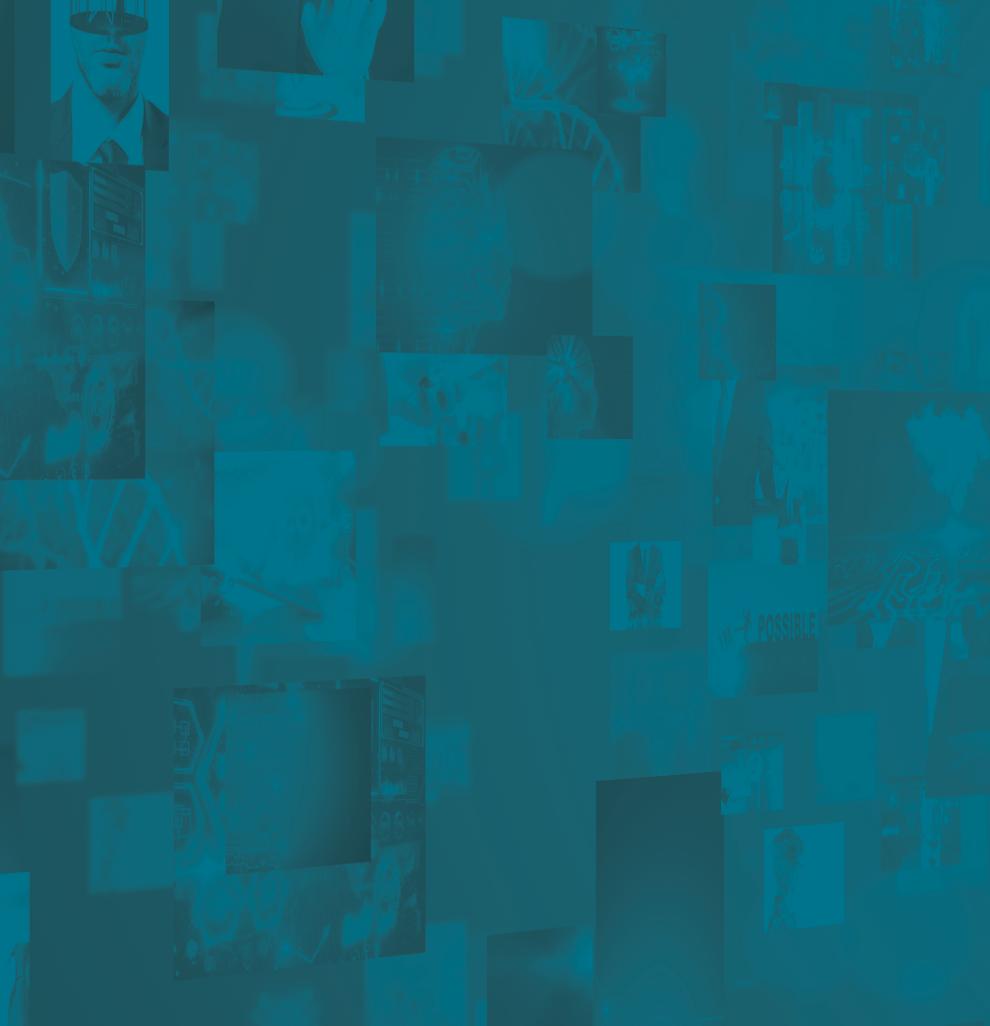

But no matter what changes she sees in her job or the industry as a whole, Garnica remains inspired by her parents. Her mother was a PE teacher, coach, and mentor; her father worked graveyard shifts in a local vineyard. Garnica still remembers riding to the winery late at night just to catch a glimpse of her father working, and at Netflix, she’s striving to live up to the important values her hard-working parents instilled in her from an early age.
Wilson Sonsini Goodrich & Rosati: “The word that comes to mind for Elena is ‘powerhouse’ – as a previous colleague at Wilson Sonsini, and as a client at Netflix with how skillfully she manages a variety of complex matters. Her energy and heart are inspiring. We are so proud of her for this well-deserved recognition.”
–Luke Liss, SeniorCounsel & Pro Bono Counsel

BRENDA VELASQUEZ WAGNER DOESN’T just bring a passion for the HR space to her role as chief diversity and inclusion officer at Labcorp. She brings a breadth of business experience that enables her to bring the best of a multitude of industries to her mission to help her company make its people feel welcome and supported—and to compete in the war for talent by letting applicants know that the company’s D&I focus isn’t just important but critical to the organization, its leadership, and its mission to improve health and improve lives.
Prior to coming to Labcorp, Wagner spent twenty years at IBM in HR leadership roles across the company. As she explains, this experience grounded her career in best HR practices and helped give her a global
perspective. She later moved into the healthcare space at IQVIA, where she served in several global HR positions, as well as the world of accounting and professional services at Grant Thornton, before returning to the healthcare and life sciences field at Labcorp in March 2020.
“It’s been amazing to have the opportunity to work across different industries,” Wagner says. “It gives you a breadth of perspectives of different businesses, including different client needs and talent dynamics. While there are similar components that apply to HR across industries, there are also unique aspects within each company that require an understanding of the business drivers. These experiences expanded my HR strengths and have made me a better business leader.”
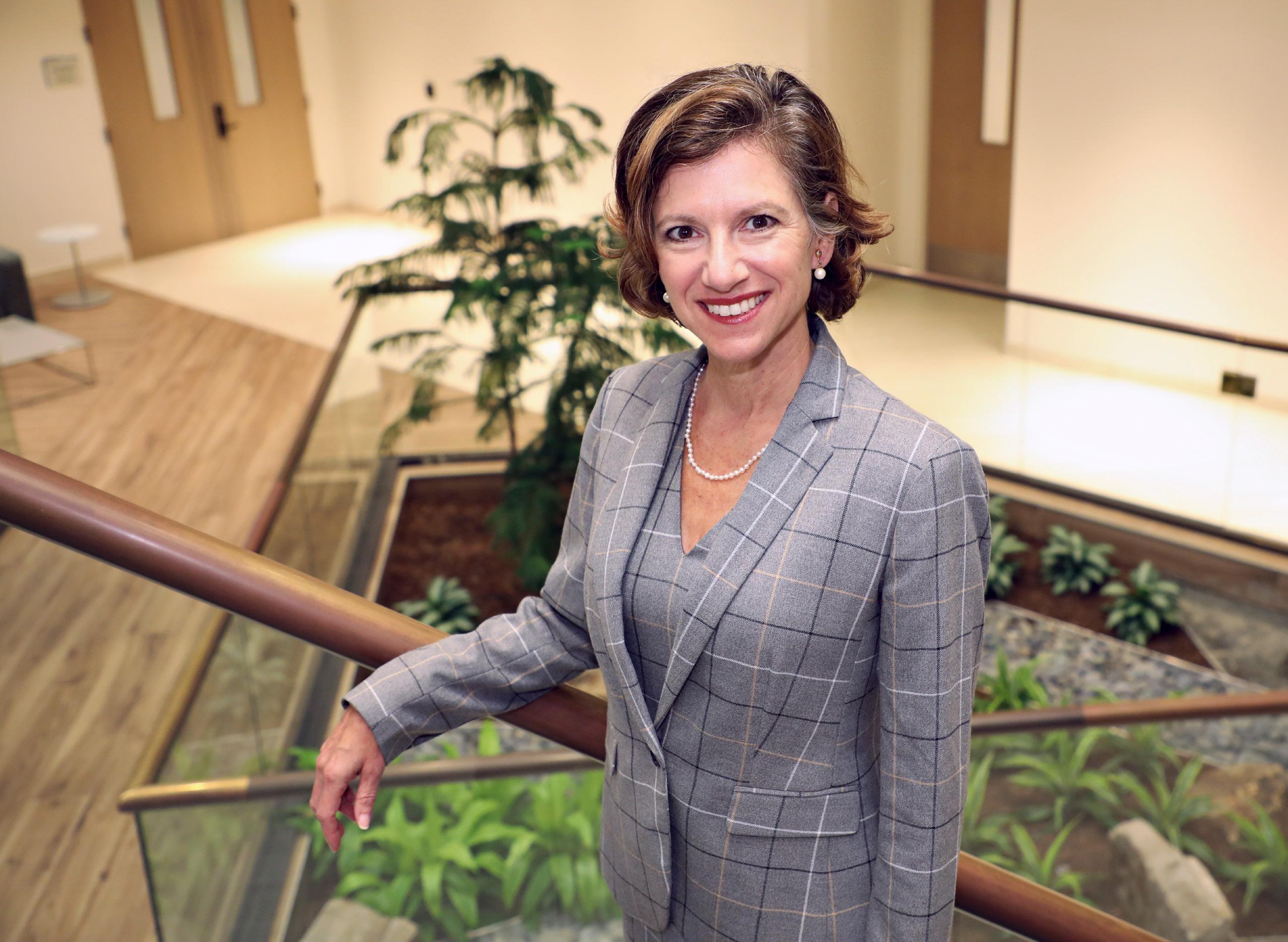
Chief Diversity & Inclusion Officer and VP of HR Labcorp
“While we continue to thrive in our core businesses of diagnostics and drug development, it was so inspiring to see the leadership team come together as one company to focus on helping humanity navigate the pandemic.”
When Wagner came to Labcorp, a global life sciences company that provides vital information to help doctors, hospitals, pharmaceutical companies, researchers, and patients in more than one hundred countries, the organization had a diversity and inclusion team but not a dedicated D&I officer. But Labcorp’s commitment to building out that role, and its diversity initiatives more broadly, was a large part of what attracted Wagner to the role. “D&I is not just an HR initiative here,” she explains. “It’s core to the business and in service to our clients and patients.”
In appointing Wagner as the company’s first chief diversity and inclusion officer, the company has demonstrated its commitment to D&I—a commitment that is also reflected in the fact that Wagner reports to both the CEO and CHRO. The D&I journey, Wagner notes, is sponsored at the highest level of the organization.
According to Wagner, who also serves as vice president of HR, her first year has been spent establishing the organization’s diversity and inclusion strategy along with a wider framework for how that strategy feeds into the culture and talent at Labcorp. The number of projects on her plate to support that mission now amount to an extensive, wide-reaching list.
One of Labcorp’s projects, intended to help empower inclusive leadership, is called “Leadership ID.” It establishes principles and guidelines on how to lead, explaining that leadership is more than simply getting things done. The company also rolled out an unconscious bias learning journey for the 6,500 people managers who are currently working all over the globe, and recently, the company’s Reverse Diverse mentoring program won the Brandon Hall Group Gold award for excellence in diversity, equity and inclusion.
Labcorp is also examining its university pipeline to see how it can provide wider opportunities for more diverse talent and expanding its employee resource groups (ERGs) to represent multiple constituencies across its business. “These groups are another way for people to develop, make an impact in communities, and have a place to connect and belong,” Wagner says of the ERGs. “All of these initiatives are about going deeper into this journey and making sure diversity and inclusion is always a business priority for the company.”
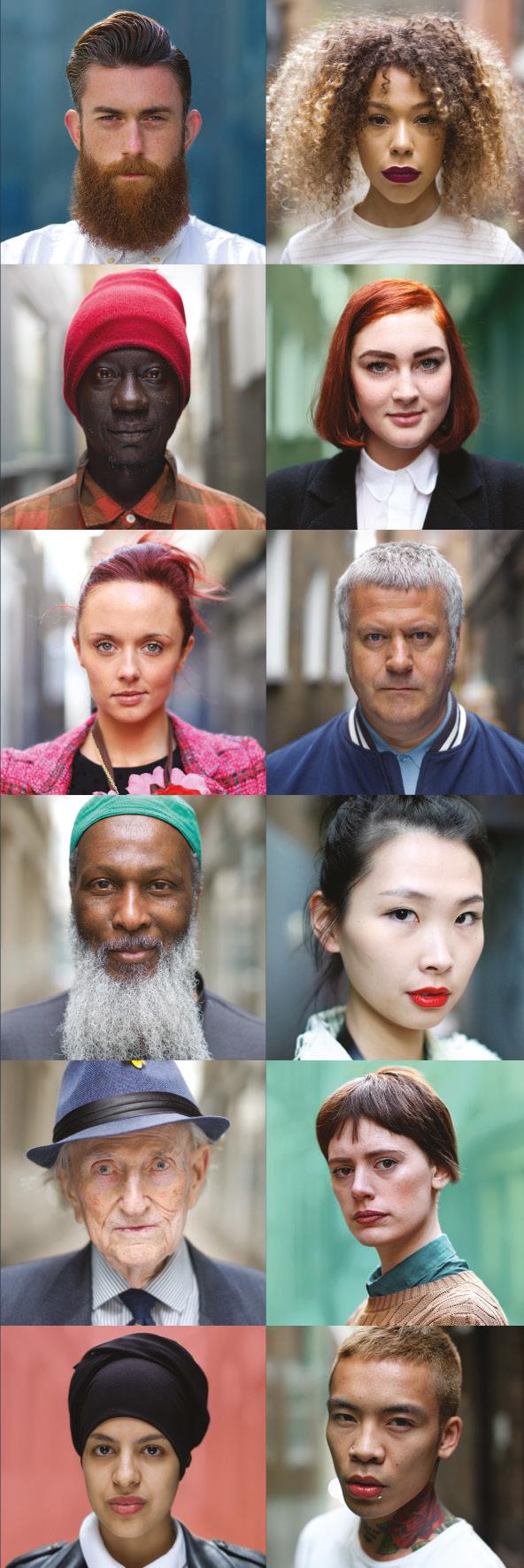
FranklinCovey is proud to partner with you to develop great leaders to drive diversity & inclusion at Labcorp.
The global footprint of Labcorp requires Wagner to utilize all of her previous experience in helping make sure that Labcorp’s D&I efforts make sense within the cultures where the company operates. “How our efforts play out across local geographies and groups is going to be different,” she notes. “We made sure that our pilot programs included teams outside the United States to ensure that ERGs globally meet the business needs specific to that country or region. It’s a tailored approach.”
All of these efforts have coincided with Labcorp’s response to the COVID-19 pandemic. Labcorp, Wagner says, has performed more than fifty million COVID tests in the United States alone since the beginning of the pandemic. The company was also heavily involved in multiple vaccine developments through its labs, clinical and development trials, and testing technology.
“While we continue to thrive in our core businesses of diagnostics and drug development, it was so inspiring to see the leadership team come together as one company to really focus on helping humanity navigate the pandemic,” Wagner says. “I’ve been extremely impressed by our CEO and the way in which we’ve been able to harness our unique blend of diagnostic testing capabilities and drug development to aid the ongoing effort.”
More personally, Wagner says hearing the stories of those working across Labcorp’s global organization is what continues to motivate her efforts as chief D&I officer. As she puts it, a “see it, feel it” momentum is starting to take hold at Labcorp in regard to its D&I journey.
“I think people see the company investing more in the space, and they’re also starting to realize the benefit of those changes,” Wagner explains. “I think about our phlebotomists, who work with patients each and every day, and colleagues in our labs, who are processing hundreds of thousands of test each day. I also think about our teams in drug development, who are passionate about helping sponsors find potential treatments for diseases such as cancer, autoimmune disorders, and neurodegenerative diseases. We’re working with all of these amazing people—our diverse talent who are central to our ability to meet customer and patient needs— and that gives me great energy every day.”
Italo Intriago leads a new enterprise hardware services team at Red Hat. As he steps into management, he’s making sure to unlock key growth opportunities for others.
BY ZACH BALIVAITALO INTRIAGO CAN’T REMEMBER A TIME IN HIS CAREER WHEN he didn’t use Red Hat. In the late nineties, as an electrical engineering student and aspiring IT security pro, he loaded Red Hat technologies onto desktop computers via CD-ROMs. As Red Hat grew, Intriago kept pace, developing his professional skills alongside the enterprise open-source solutions company. In 2011, Red Hat’s HR team posted a job opening that caught Intriago’s attention. He landed an interview, got the job, and went to work for the company he admired most.
More than ten years later, Intriago is thriving as a team lead in Red Hat’s IT Enterprise Hardware Services Team. For the hardworking professional, who came to the United States from Ecuador at just three years of age, it’s a dream come true. “It wasn’t so long ago that I was just starting out in IT by supporting small businesses and perfecting my skills at workshops and other events, and I’ve always been taught to keep improving and to seize every opportunity,” he says. “Coming to Red Hat opened new possibilities in my career.”
And for Intriago, the move came at just the right time. In 2008, a couple of years after moving from Miami to Raleigh, he took his first leadership position as a principal network engineer with Blue Cross Blue Shield of North Carolina. The career experiences at Blue Cross Blue Shield were essential for Intriago’s career growth, but after a few years, a job opportunity as principal network engineer at Red Hat
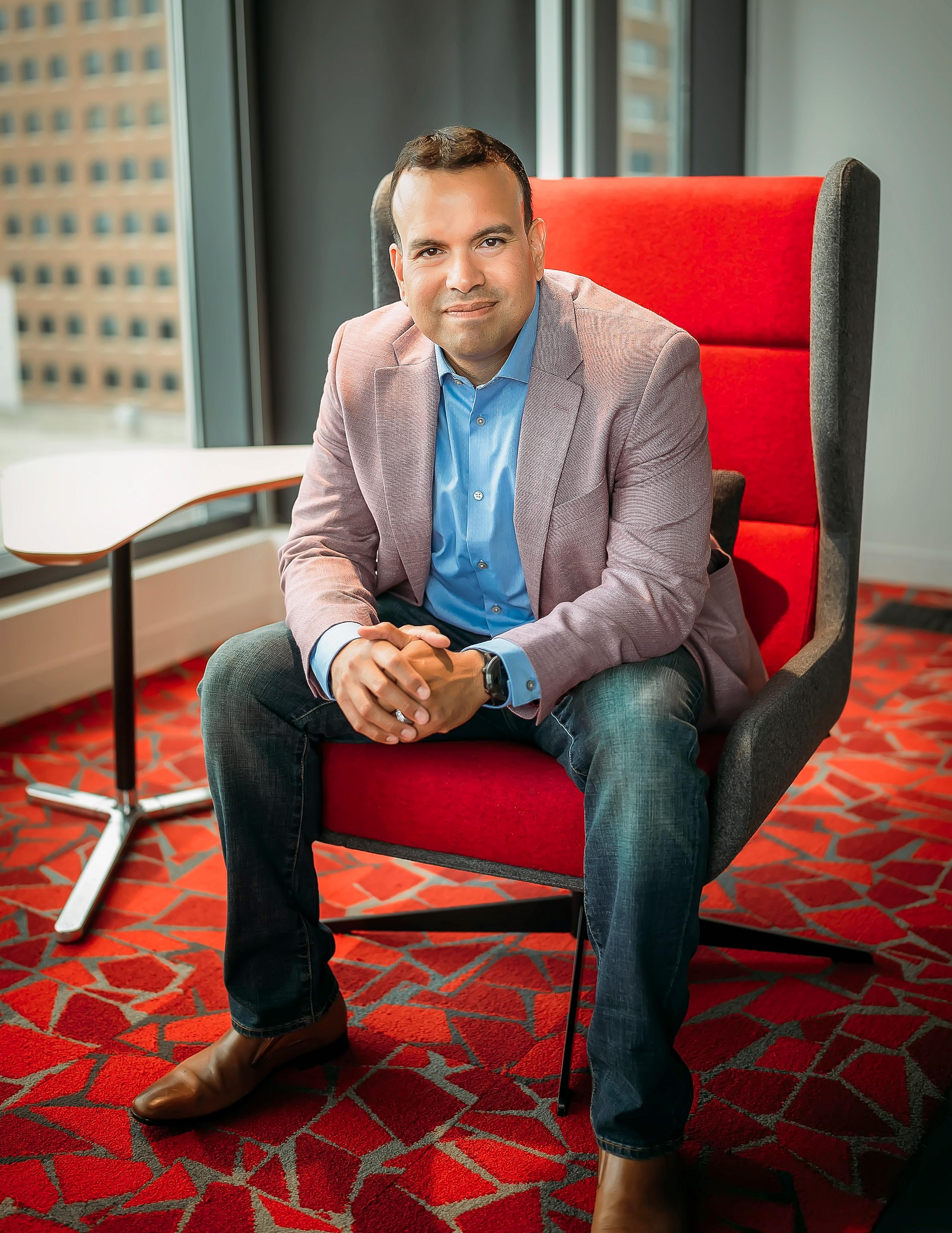
presented itself. Intriago was ready to move on to this dream job at Red Hat.
Intriago immediately found himself doing innovative work in a global environment. Compared to previous employers, whose risk-averse nature and layers of corporate bureaucracy seemed to stifle creativity, Red Hat felt dynamic and freeing. “Anyone here can approach a VP and express their ideas,” Intriago says. “Being open and transparent and encouraging collaboration is part of the Red Hat way.”
Unlike most of his colleagues, Intriago hadn’t previously worked at a tech company. But he had used Red Hat and other tech products to support a healthcare and insurance company. Leaders valued Intriago’s outside experience and encouraged him to offer a fresh perspective.
In his early years with Red Hat, Intriago was both learning and contributing. By 2012, Red Hat was ready to move from its office on the Centennial campus of North Carolina State University into a thirteen-floor high-rise. As part of the IT Network team, Intriago helped provide wired and wireless systems, digital signage, and other critical elements toward the new Red Hat Tower’s network infrastructure.
The successful initiative became a template for future projects, and Intriago became more interested in pursuing leadership roles. He started asking his manager for more leadership opportunities and enrolled in Red Hat’s internal leadership training program.
In 2019, Intriago got his shot—he collaborated with his managers to create a new team within Red Hat’s IT department. The team, known as enterprise hardware services, supports internal IT infrastructure teams by providing hardware life cycle and asset management, computer hardware services, storage services, and data center services. To get the new team off the ground, Intriago and his manager collaborated to make a business case and presented it to leadership.
“I demonstrated how an enterprise hardware services team would take responsibility for our hardware and asset management, thus allowing our IT infrastructure teams to dedicate their time to the mission-critical tasks that really matter for the company,” he says. Intriago got the green light, and has been leading this new team—which has grown from six to twelve people—for a year and half as of August 2021. To date, this is Intriago’s proudest achievement at Red Hat.
Today, Intriago continues to progress as both a leader and an IT professional. “Stepping into leadership and evolving in a career requires a mix of patience and ambition,” he reflects. Relationships are key too. Intriago takes time to cultivate a good rapport with internal and external stakeholders alike. “Business partnerships shouldn’t be purely transactional,” he emphasizes. “We can take the time to understand the value each side can offer.”
That philosophy is demonstrated through Red Hat’s collaboration with Juniper Networks. Although Red Hat once used a different, more well-known vendor for networking products in corporate facilities,
Red Hat IT decided to give the scrappier Juniper a chance.
“Red Hat and Juniper are both innovative. Going with them was a bit of a risk,” he says, “but they offered a strong relationship and a chance to collaborate more closely.” The risk paid off. Red Hat works with Juniper to provide connectivity for its data centers and global office infrastructures. As part of Red Hat IT’s next-gen wireless project, Red Hat’s global office wireless network will be moving to Juniper enterprise class wireless solution Mist AI.
“Italo Intriago was instrumental in helping to grow and expand our relationship by embracing Juniper’s wireless and AI technology, together improving their overall user experience,” says Bill Hicks, senior account manager at Juniper Networks.
As Intriago continues to advance in his career, he’s making sure to find ways he can help others along the way. “People have mentored me, and I am looking to provide the same opportunities others helped me find,” he says. “We have to be the best we can and let talented people be talented people.” At the same time, Intriago is eager and excited to continue to grow his own career at Red Hat.
“Anyone here can approach a VP and express their ideas. Being open and transparent and encouraging collaboration is part of the Red Hat way.”



Juniper Networks congratulates Italo Intriago, Team Lead of Enterprise Services at Red Hat, on his Hispanic Executive Spotlight.







































We’re proud to be part of your journey. Thanks for showing every one how it’s done.

Belinda Aguilar Thompson finds a way, no matter what. At GEHA, that talent enables her to support the organization and help federal employees get the healthcare they deserve.
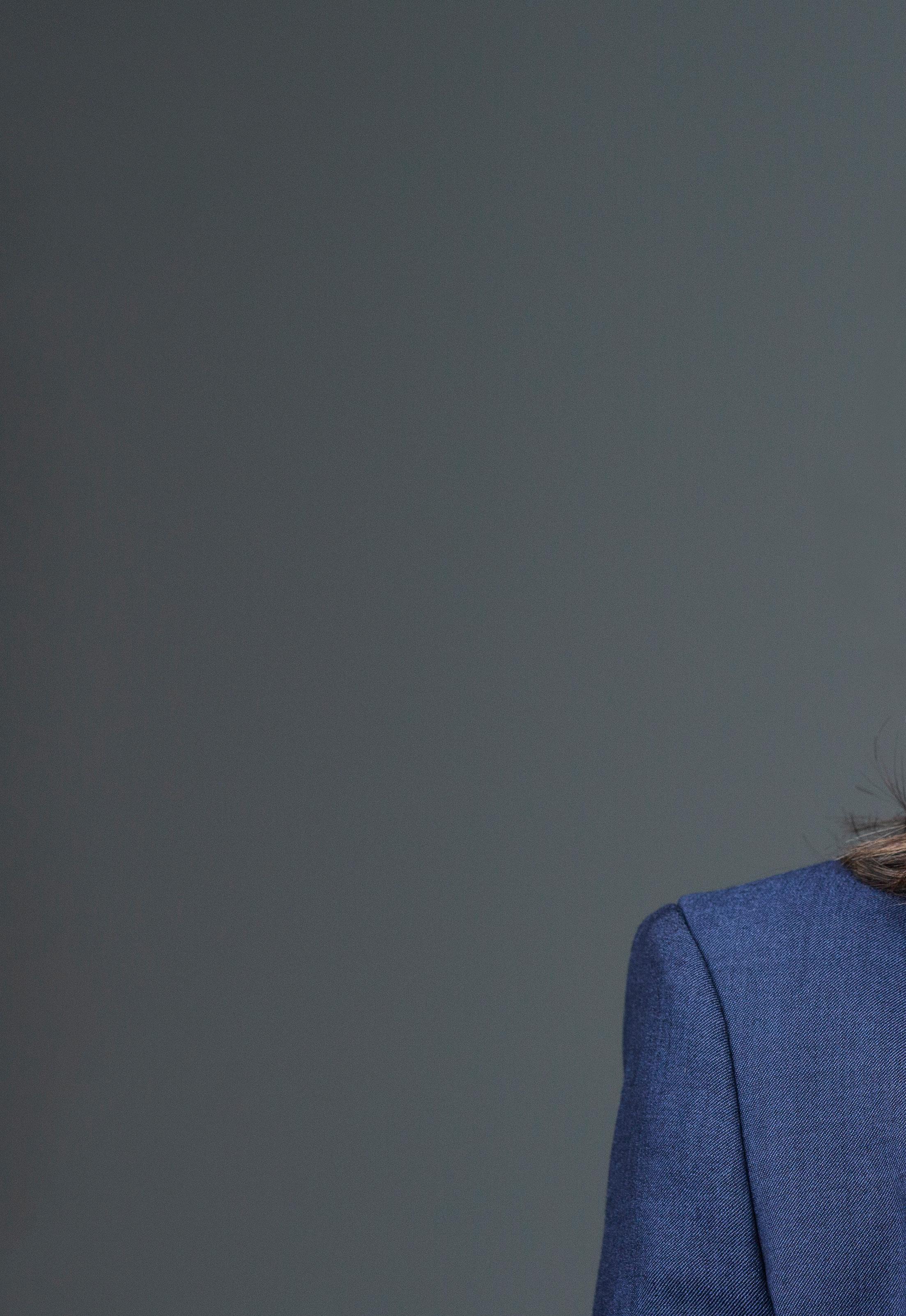 BY PAMELA BLOOM
Belinda Aguilar Thompson VP and Deputy General Counsel GEHA Health
BY PAMELA BLOOM
Belinda Aguilar Thompson VP and Deputy General Counsel GEHA Health
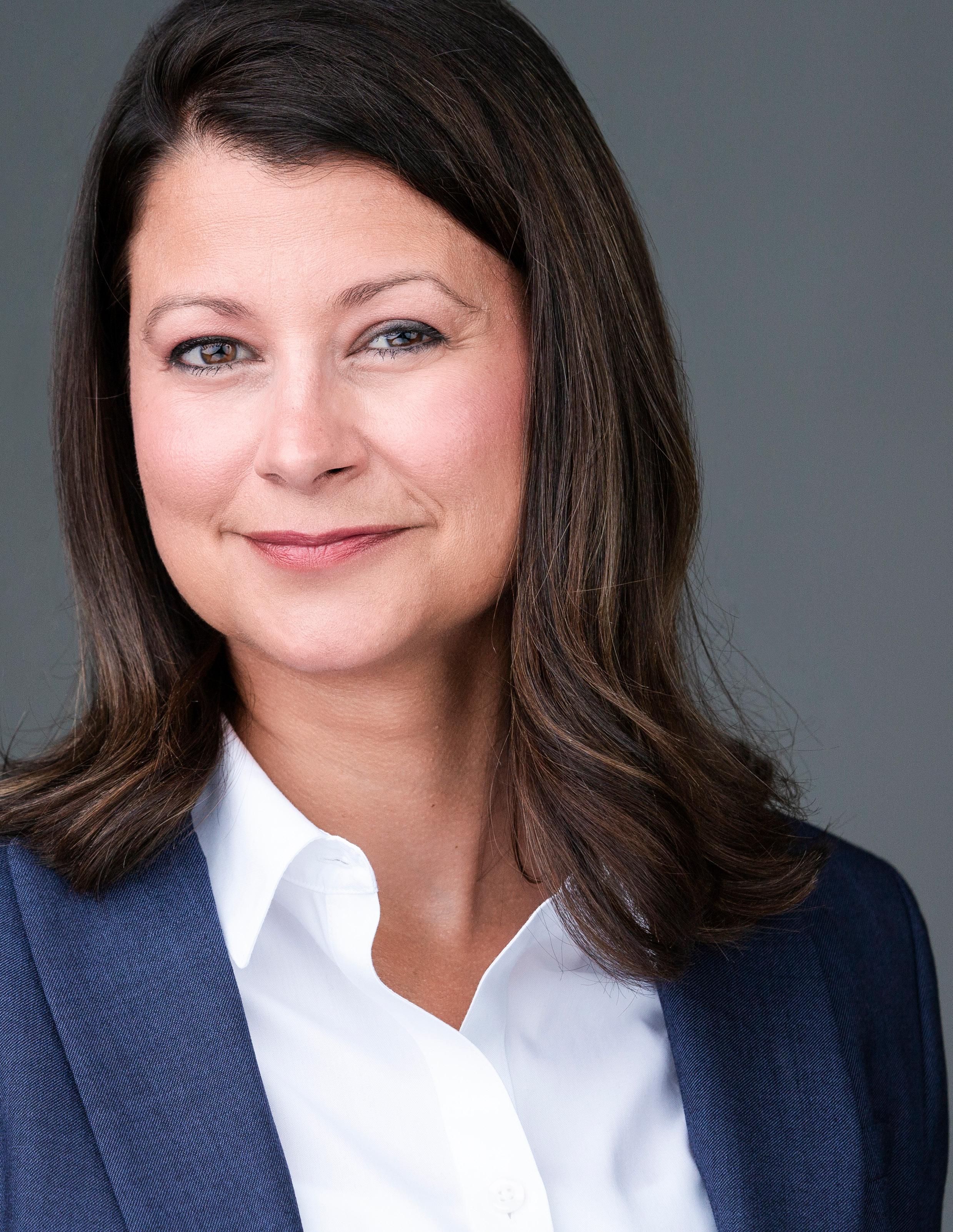
Today, GEHA is one of the largest medical and dental benefit providers, exclusively serving federal employees, annuitants, military retirees, and their families. In 2016, the organization recruited Belinda Aguilar Thompson, and she currently serves as vice president and deputy general counsel. Thompson is a perfect fit for the role— for much more than just her legal expertise.
The granddaughter of a Mexico native who immigrated to Texas, Thompson grew up in a suburb of New Orleans, an environment she describes as “working class and multiculturally rich.” Her father worked a variety of blue-collar jobs to make ends meet, eventually becoming a certified welder and joining a union. Her mother, who had had no indoor plumbing, phone, or electricity as a young child, worked for the US Postal Service.
“We didn’t have much growing up, but we had a lot more than they had,” Thompson remembers. “What my parents did have was this drive to make a better life for themselves and their family. And their drive impacted me. I got in the habit of figuring things out for myself. And I knew I wanted more.”
A passionate student from an early age, Thompson got an idea of what “more” could look like when
her tenth-grade biology teacher noticed her debating skills and encouraged her to become a lawyer. Years later, Thompson took a leap of faith and enrolled at Louisiana State University. There, she did not find many mentors, but she did meet people from a huge variety of backgrounds—an “enlightening” experience, Thompson says.
The subsequent years saw Thompson take an unconventional route to law when she supported herself while taking part-time classes at Loyola Law School, Los Angeles. She then transferred and graduated from the University of Tulsa Law School. Before too long, she had found a position at Tulsa law firm Franden Farris Quillin Goodnight & Roberts.
One of the firm’s partners, Joe Farris, became a great mentor to Thompson. “As a new lawyer in the courtroom, I tended to be timid, but Joe knew my legal arguments, and he pushed me to speak up,” she says. “I am grateful for the support he provided me, and for the opportunity to learn from one of the best litigators in the business.”
Another partner and mentor, Paula Quillin, often called Thompson “scrappy” because she wouldn’t give
The roots of the Government
Association (GEHA) hark back more than eighty years to when railway workers in Kansas City, Missouri, passed a hat to help their injured colleagues pay for medical expenses.
Lewis Rice celebrates and supports the outstanding, diverse business leaders who are making an impact in business and the community. We congratulate Belinda Aguilar Thompson on her inspiring achievements with Government Employees Health Association, and we look forward to the innovative enhancements she will bring to our healthcare system.
lewisrice.com







 Lewis Rice is a full-service law firm providing sophisticated counsel to a broad range of local, regional, and national businesses as well as individuals.
Lewis Rice is a full-service law firm providing sophisticated counsel to a broad range of local, regional, and national businesses as well as individuals.
up until she got results. As Thompson explains, “If we had a weak legal argument, I’d research the issue until I found the legal authority to boost my client’s position.”
Even as she built out her legal skill set, however, Thompson dreamed of finding a way to be of greater service to her community. She transitioned to Haynes Benefits PC, an employee benefits law firm. As the firm worked to untangle the complexities of the recently passed Affordable Care Act legislation, Thompson perfected her skills in advising employers, plan administrators, and insurers on issues affecting health benefit plans.
One of those clients, GEHA, was so impressed with Thompson that the company recruited her to come in-house and work for its team. “What intrigued me about GEHA is that it is not the typical health insurance company,” Thompson says. “As a nonprofit VEBA [Voluntary Employees’ Beneficiary Association], GEHA is different because it exists solely to provide health benefits to its members who are federal employees.”
But going from working for a law firm to working in-house for a corporation demanded a change of perspective.
Indeed, when Thompson arrived at GEHA in 2016, the legal division was much smaller and less developed than it is today. Step by step, she impressed upon leadership the importance of managing vendors through enhanced contracting processes and ongoing oversight. She was able to successfully develop enterprise-wide contract and vendor management programs, and now she also oversees the Vendor Management Office, a department within the legal division. “I’m proud that we’ve transformed the legal division from a service function to a collaborative partner that helps solve problems and achieve business objectives,” Thompson says.
Thompson’s achievements have caught the attention of her colleagues beyond GEHA. “Belinda is an
excellent attorney who has really grown and elevated the legal department at GEHA, collaborating with departments throughout the company,” says Lynn A. Hinrichs, a member of Lewis Rice. “Belinda has an incredible ability to connect with people, and I admire her passion and her commitment to mentorship of the next generation of legal professionals.”
According to Thompson, who also serves as a sponsor of GEHA’s Unidos LatinX employee resource group, the secret of successful business change is communication, collaboration, and flexibility. “I am a natural mediator,” she explains. “When business units disagree on an issue, I say, ‘OK, how can we come together to find a reasonable solution that is best for GEHA?’”
Of course, traditional approaches to communication and collaboration were turned on their head during the COVID-19 pandemic. But according to Thompson, GEHA has quickly adapted to a remote setup and is in the process of designing more collaborative workspaces for when employees begin returning to the office soon.
Throughout all these changes, Thompson has maintained an open-door policy for mentoring. “The newer generation brings a wealth of technology skills,” she says. “What I can offer them is emotional intelligence.” She herself often turns to her father, her ultimate role model. His practical advice, she says, “keeps me humble.” So does her own ongoing drive to dig into complex problems and discover innovative solutions.
“I guess I am a little scrappy, a little rough around the edges,” she says, laughing, “but I also think people like that about me. I have a passion for enhancing our healthcare system, and I was so fortunate to grow up in the melting pot I did, where the dollar mattered and the quality of healthcare was so important. My diverse background enhances my vision for creative healthcare solutions and ensures that I stay flexible and adaptable in my legal advice.”
“I’m proud that we’ve transformed the legal division from a service function to a collaborative partner that helps solve problems and achieve business objectives.”
VP Reyna Sanchez ensures that Six Flags employees have the resources and support they need to provide visitors with a world-class entertainment experience
But it takes more than physical rides and imaginative settings to foster an unforgettable entertainment experience—it takes thousands of employees, from performers and makeup artists to analysts, security personnel, maintenance staff, and retail coordinators. Vice President of Compensation and Benefits Reyna Sanchez makes it her goal to ensure that each one of those employees is supported and empowered to provide the best visitor experience possible.
Sanchez joined Six Flags in September 2010 as a corporate manager of employee benefits. After a promotion to corporate director of employee benefits in 2017, Sanchez decided to go back to school to earn an executive MBA from Texas Christian University.
While Sanchez had always been passionate about supporting Six Flags employees, she explains, she wanted to be better positioned to be an effective partner to the business.
This move paid off in December 2020, when Sanchez was promoted to her current role as VP. Broadly speaking, Sanchez is responsible for managing health and welfare benefits for Six Flag’s 52,000 employees, 2,100 of whom work full time. She and her team have developed and refined medical plans, life and disability plans, vision and dental plans, and additional voluntary insurance plans.
But Sanchez knows that supporting employees, and providing them the resources they need to do their jobs effectively, is
Since its founding in 1961, Six Flags Entertainment Corporation has dedicated itself to providing a rich entertainment experience for its customers. Rollercoasters, water attractions, parades, games, concerts, and special themed sections with cowboys and pirates were all created with that one goal in mind.

At Lockton Dunning, our focus is always to be the best place to do business and the best place to build a career. We are committed to promoting and advancing diversity and inclusion within the Insurance Industry.
fostering an inclusive environment is priority


about more than traditional health benefits. Even before she became VP, she focused on supporting Six Flags employees as they navigated the COVID-19 pandemic: in addition to transitioning a significant portion of the company’s administrative work from the park field to the corporate office, she made sure that Six Flags had a variety of wellness and mental health resources in place.
In 2021, one of the VP’s biggest areas of focus was pay equity. Whether an employee is full time or seasonal, Sanchez explains, that employee’s total rewards package (including base compensation and benefits) must be highly competitive. Six Flags has always strived to offer competitive packages, but as the VP points out, such packages are more important than ever given the entertainment industry’s continued efforts to recover from the pandemic.




Of course, that’s not all that Sanchez is working on. Even as the VP and her team work to support Six Flags employees, Sanchez makes it a priority to empower her team members and foster their development as leaders.
Sanchez herself is a product of talent development: as she puts it, she knew where she wanted to go, but the leaders and mentors she’s encountered throughout her career have shown her what she needed to do to get there. As VP, she’s determined to do no less for those around her—and as is fitting, make sure that everyone is able to have a little fun along the way.
As your employee bene ts solution provider, MetLife is thrilled to continue working with you on building a bright future for your Six Flags employees by o ering them the following bene ts:


BENJAMIN YRUN OSTAPUK HAS WORKED FOR semiconductor manufacturing company Intel Corporation for just over a decade and has been promoted twice. Along the way, he’s learned a few lessons. “As you continue in your leadership journey, you have to get better at leveraging yourself to make your team better,” Ostapuk says. “It’s about trusting and empowering your team in order to accomplish results, together.”
Ostapuk is well-versed in leveraging his skills to successfully lead a team. He first joined the company as senior litigation counsel in 2010; in 2014, he was named associate general counsel and director of patent litigation.
“This position was an important growth stop on the way to my current role,” Ostapuk says. “It involved learning how to be an effective leader and people manager. It also involved learning how to manage the overall portfolio of risk patent litigation poses to the company, and then how to present all of that directly to the leaders above me.”
Over the last decade, Benjamin Yrun Ostapuk’s role at Intel has changed significantly— which means he’s had to adapt as well
Today, as a vice president and director of Intel’s intellectual property legal group, Ostapuk is still learning and growing professionally. For instance, when he was promoted to his current role in 2018, he went from managing an organization of twenty people to managing an organization of one hundred people, including those located internationally.

The transition to a new role also meant acquiring expertise in new areas. Ostapuk’s prior experience had
been primarily with patent litigation, so the promotion came with a certain learning curve. In addition to litigation, he’s now also responsible for Intel’s worldwide intellectual property rights (IPR) development, IPR transactions, trademarks and brands, legal support for standards, and since 2021, an expanded organization including a new IP policy team.
“There is a lot to learn—from how to be a leader of a large organization to also leading an international organization, as well as assuming leadership responsibility
for subject matter that I’m not an expert in,” Ostapuk says. “It’s been an incredible educational experience and I’m grateful for it.”
To keep up with his constantly changing role as a leader, Ostapuk says he too must continuously evolve. “With each new role comes a new set of skills to learn and master,” he says. “To do so, it’s critical for me to always be evolving. Over the years, I’ve evolved to be more communicative, transparent, and intentional.”
Ostapuk also had to adjust his leadership style to meet the needs of a remote workforce. “Like most companies, the COVID-19 pandemic took away our ability to meet face-to-face,” he says. “We had to redouble our efforts to ensure we were staying connected and focused.” For his department, staying connected and focused meant video water cooler chats, coffee talks, and more. In a way, he says, navigating this new era of remote work brought them closer together.
One of Ostapuk’s responsibilities is supporting the new corporate strategy under Intel CEO Pat Gelsinger. Since Gelsinger rejoined the company in February 2021, he has announced a bold “IDM 2.0” vision for Intel’s semiconductor fabrication that includes significant manufacturing expansion plans as well as plans to become a major provider of foundry capacity in the US and Europe to serve customers globally.
“The IP department’s involvement in realizing Pat’s vision includes figuring out how Intel will license semiconductor IP and ensuring we’re obtaining the intellectual property rights that protect our continued innovation,” Ostapuk explains.
While Ostapuk’s days as a leader and IP strategist are quite busy, he makes it a priority to support and mentor others—at Intel and beyond.
Intel’s law and policy organization, called the Growth Acceleration Team (GAT), is committed to diversity and inclusion, and some of its initiatives include a diverse summer associate internship program, an internal senior employee sponsorship program, and a newly announced partnership with the North Carolina Central University School of Law, a historically Black college. “The partnership involves a $5 million donation
from Intel over the next five years for the development of a technology, law, and policy center on the college’s campus,” Ostapuk says.
He currently serves as cochair of Intel’s Latinx Leadership Council, a seventy-plus member group of Intel’s most senior Latinx employees supporting the company-wide employee resource group and the broader Latinx community at Intel.
In addition, Ostapuk is an executive member of the Latino Corporate Directors Association (LCDA), with whom Intel recently started a new partnership to support its senior Latino employees in adding to their impact in the boardroom. He participated in the LCDA’s 2020 BoardReady Institute, a comprehensive program designed to prepare and position highly credentialed Latino executives and national leaders for corporate board service—a career aspiration Ostapuk says he’s had since participating in the Hispanic Association on Corporate Responsibility’s Young Hispanic Corporate Achievers program in 2011.
Ostapuk’s determination to be a successful leader and mentor is deeply rooted. As a third-generation Mexican American, he’s appreciative of the opportunities he’s received and also seeks to increase Latino representation in positions of power. “My career trajectory has helped me realize the power of Latino representation in the boardroom,” he says. “It impacts the way companies, like Intel, are run, as well as impacts the people in the communities they serve.”
“My career journey has helped me realize the power of Latin representation in the boardroom.”
Perhaps the ultimate form of leadership is business ownership, and the Latino community is rich with entrepreneurs. The men and women featured here tell stories of risk, reward, and the lessons learned along the way.
190. Patricia Arboleda, Patricia Arboleda Coaching 194. Jason Madiedo, Panorama Mortgage Group 198. Robert Bard and Lupita Colmenero, LATINA StyleExecutive coach Patricia Arboleda helps women develop the confidence and the habits necessary to accelerate their success
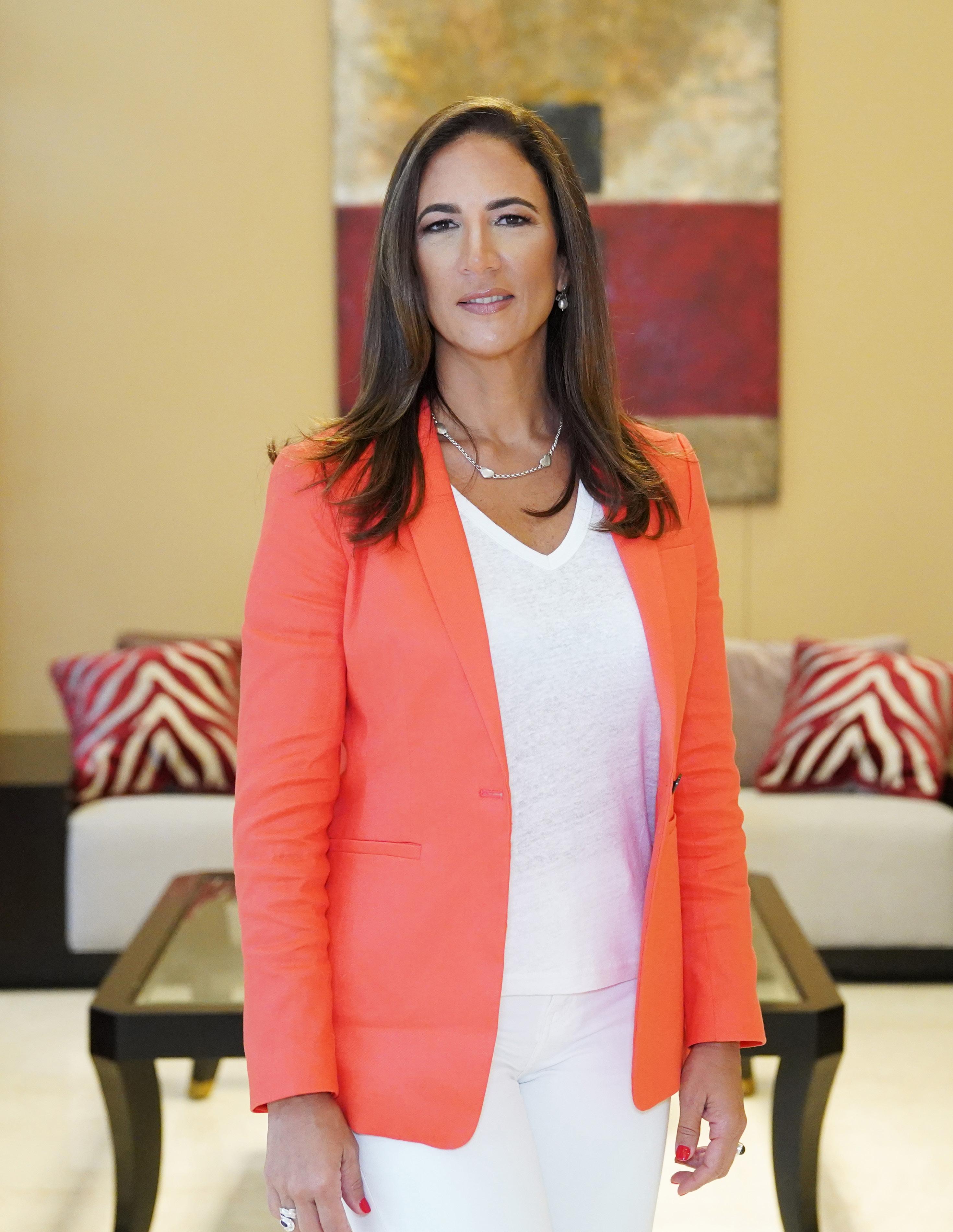
PATRICIA ARBOLEDA HAS ALWAYS enjoyed helping others grow and develop. Throughout her more than twenty-five years in the corporate world, she strove to support her multicultural team members, at times making conscious decisions to reorient and learn how she could be a better leader. All the while, Arboleda herself was working her way up the executive ladder at a Fortune 500 corporation, well aware of all the barriers facing Latinas and often sacrificing her work/ life balance in an effort to prove her worth. But a couple of years ago, Arboleda made a radical choice: she would leave behind the corporate world and fully embrace her passion for helping women and Latinx grow and be successful.
“I decided that it was time for me to make a shift in my career and do something that allowed me to do what I loved, which is supporting people [in achieving] real transformation,” she explains. “My purpose is to give driven women the tools that I wish I had had and help them be successful while having a balanced life.
“I have walked in their shoes,” she continues. “I know what they are going through because I have experienced it myself, and that’s part of my value proposition.”
In recognition of her purpose, Arboleda launched her own executive coaching firm, Patricia Arboleda Coaching. As CEO and founder, she supports companies in their efforts to close the gender gap at the executive level, and she empowers women to set and achieve their goals—whatever they are. “A woman empowered is intentional about her career,” Arboleda explains. “She is able to define success on her own terms and take the steps that will get her there.
“To do that,” she continues, “she has developed confidence and awareness. She understands what her unintelligent beliefs about herself and her environment are, and she doesn’t let those beliefs or fear take control over her life.”

That confidence and awareness, that “unshakable mindset,” is the foundation for everything, Arboleda says. And it relies on a person “having an understanding of the power of our beliefs and how changing even the simplest of them can have an impact on nearly every aspect of our lives,” she explains. “When we become aware that by reframing our unintelligent beliefs, we can completely change our results, that’s when we ignite our internal flame and accelerate our success.”
Everybody, Arboleda explains, grows up with some of these unintelligent beliefs. They are created based on “experiences we have as a child, things we are told, or things we listen [to].” We are often unaware that we have these beliefs, but they still affect the way we perceive and react to our surroundings.
For example, Arboleda pointedly remarks, if a young girl grows up believing that she “need[s] to be perfect to be accepted,” she will be more reluctant to take risks as an adult. She will also find it difficult to delegate, accept vulnerability within herself, and believe that she can be authentic in her leadership style.
It all starts with that self-awareness. Then it’s about developing the habits that will take people to their desired state. Through her coaching practice, Arboleda helps women intentionally define their career path and develop the skills that will help them rise and thrive. From creating their personal brand, building their power base, and claiming their achievements to setting strategic goals aligned with their values, Arboleda takes
No matter where a woman is in her career path, Patricia Arboleda provides the same advice:
1. Be intentional about your career and know that you define what success means to you. Do what you love, and if you want something different, don’t be afraid to go for it.
2. It’s never too late to reinvent yourself. If you decide to shift careers, make sure you align with your “why” and values.
3. Focus on developing the habits that will make a difference—don’t overwork yourself until burnout. And most importantly, maintain a balanced life.
4. Build a good foundation, develop self-awareness, and manage your inner voice so that it becomes your best champion.
women on a development journey that sets them apart from the crowd, all while having a balanced life leading from the inside out.
And that development journey isn’t aimed toward perfection. Latinas, the CEO says, often grow up feeling they need to be perfect to be successful. Born and raised in Colombia, Arboleda has worked and lived in Latin America, Europe, and the US. She has led global teams, developed an international reputation for success, and blazed a trail for many others. But despite all her achievements, she felt a sense of anxious pressure, a constant worry that it wasn’t enough.
“When we are immigrants in this country, we have a lot of pressure to prove our selfworth. We usually sacrifice our personal time and get burned out because of the extra work that we think we need to do,” she notes. “We are often guilty of undervaluing ourselves and our value proposition. Most of us do not feel that we can bring our whole selves to the office, which creates considerable frustration. Recognizing the beliefs that stop us from moving forward, taking action to reframe them, and developing the skills that will empower us to be comfortably authentic in our leadership style is the foundation to create real transformation in our lives.”
Arboleda herself worked with an executive coach to combat these and other pressures. Today, as a coach, CEO, career strategist, trainer, and keynote speaker, she supports women in building the “habits and skills that will help them grow and succeed.”
And those skills translate, Arboleda notes, to whatever a woman wants to do— whether that’s making her way up in the corporate world, starting or scaling her own business, or transitioning to doing something else entirely different than what she is doing. Whatever it is, all that matters is that it brings her fulfillment.
So take action. Go after that dream. And don’t allow doubt to be in control. “Don’t be perfect,” Arboleda advises. “Be courageous.”
“A woman empowered is intentional about her career. She is able to define success on her own terms and take the steps that will get her there.”
business like a coach. As CEO of Panorama Mortgage Group, he has created a leadership space fueled by curiosity and a desire to learn. This model not only drives company-wide growth but also advances the professional mission he’s had from the start: to serve underserved populations.
His main inspiration is his parents, who moved to the US from Colombia in search of a better life. “My mom came here with less than $100 in her pocket,” he says. “From nothing, she built a career in mortgage and was able to provide us a good life. It’s my duty

to her to keep that legacy going forward. I owe it to her.”
In fact, Madiedo began his career in mortgages with his mother in Los Angeles when he was eighteen. “We started this journey to help underserved families, especially Hispanic families, build wealth through home ownership,” Madiedo says.
He’s now head of a multibillion-dollar organization, but his objective hasn’t changed.
In the wake of the 2007 market crash, Madiedo relocated to Las Vegas and founded Alterra Home Loans, which focused on underserved home buyers by offering
affordable lending products. Their client base expanded, revenue grew, and Alterra eventually evolved into a holding company, which became Panorama Mortgage Group.
“We decided to take the core, if you will, of Alterra Home Loans and centralize it to be shared among other purpose-driven, mission-driven leaders,” Madiedo explains. “We created this model that has a coreservice platform with [six] different brands.”
These brands—Alterra Home Loans, Legacy Home Loans, Inspiro Financial, Americana Home Loans, New Vision Lending, and PMA—share the core services
required of any mortgage bank, but each brand has its own mission and purpose. That’s why they are called “brands,” Madiedo notes—the word encompasses mission, purpose, and, more important, culture.
While traditional mortgage companies don’t focus on a specific market segment or demographic until they reach the right level of growth, each of Panorama’s brands specializes in strategically serving a specific segment and is thus able to better serve the needs of that community.
“Usually what happens with minority lending is that people are left by the wayside
Jason Madiedo CEO Panorama Mortgage Group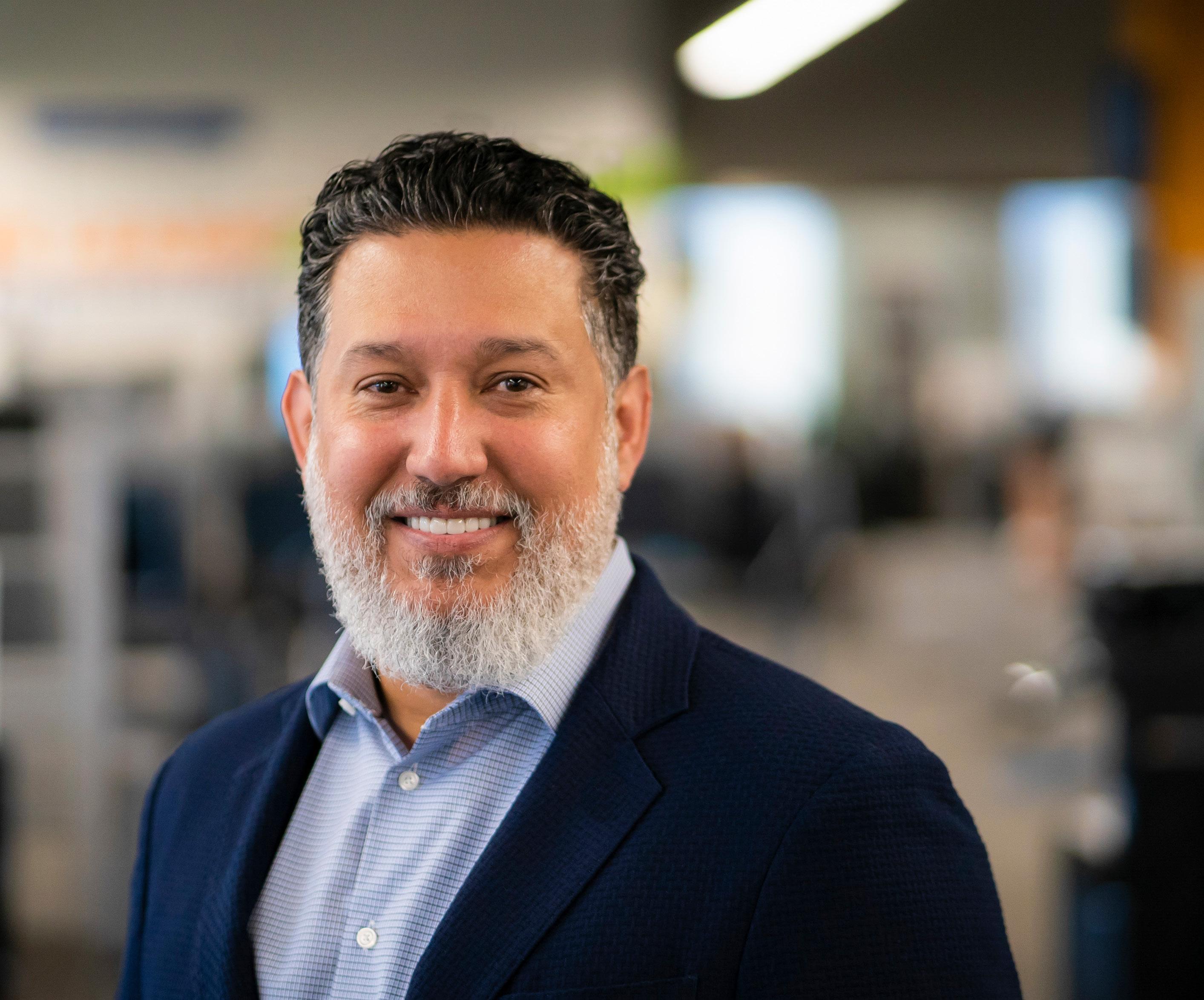
because it’s more difficult to do,” the CEO says. “But we started that way, so [as we] evolve into other brands and missions, [we apply] the same level of care.”
Madiedo found a way to make inclusivity profitable—and as CEO, his job is to educate others on how to do the same. “The C-team we are building are more collaborators and coaches of future leaders of this industry than executive managers.”
His coaching style focuses on identifying the weaknesses of team members and building strategies to overcome them. Entrepreneurs often believe they can master everything instead of homing in on their strengths. “We look to coach through building those muscles that need to be stronger,” Madiedo says, “and sometimes [it] takes coaching to show someone they don’t need to be the best at everything.”
A seasoned entrepreneur himself, Madiedo understands the importance of openness and transparency as well as how much time it takes to build trust. It doesn’t happen overnight.
“Times are different. It’s a different mindset,” Madiedo says. “People want to grow and
be part of something special, something with purpose. However, they also need the ability to be vulnerable through the learning process and to be held accountable to perform at their full potential. It’s a balance.”
And investing time into the next generation of leaders has paid off. Revenue growth in the last few years can be directly attributed to the coach-based model Madiedo has adopted.
Panorama doesn’t just invest in its workers—it aims to educate clients as well. “There is no secret to it,” Madiedo says, “It’s all about serving people the way they need to be served, [which] means having service options and understanding customer financial profiles.” Considering a client’s life, philosophy, cultural background, or financial literacy is important in manufacturing a mortgage. Taking time to explain the process, sit down face-to-face, or start conversations in their language makes all the difference.
Oftentimes, companies get stuck in the credit underwriting phase. “Maybe [clients] have had different jobs. Maybe sourcing down payments is difficult,” Madiedo explains.
From his view, credit behaviors of certain demographics can look different. Instead of halting the process due to that difference, each brand aims to understand why there’s a difference and use that information to create a specialized approach. From start to finish, this method aligns credit behavior with certain operational groups.
Panorama’s culture has a lot to do with supporting diversity from within. In a growth-based business, Madiedo does his best to find people with unlimited potential and unchecked curiosity. Coaching them through challenges, he says, increases discipline and encourages people to frequently ask themselves where they can improve.
Looking to the future, Madiedo will stay dynamic and flexible to accommodate a rapidly changing market—he already has plans to keep improving user experience. Armed with a powerful team and guided by a mission to serve, Madiedo believes
Panorama can develop and evolve the next generation of leaders in the mortgage industry.
“We started this journey to help underserved families, especially Hispanic families, build wealth through home ownership.”
Our Mission is to be the industry’s leading mortgage platform, empowering top purpose driven leaders and their teams to achieve their personal and professional goals.

We are a truly unwavering, entrepreneurial partner, committed to driving success for all of our stakeholders over the long-term.
www.panoramamortgagegroup.com
FOR MORE THAN TWENTY YEARS, Robert Bard has been looking for the right person to lead LATINA Style. In October 2001, Bard’s first spouse Anna Maria Arias (who launched the magazine in 1994) passed away suddenly after years of spotlighting professional Latinas.
“I asked our supporters if I could run the magazine until we found the right person. That was in 2001. I became the de facto Latina-in-chief,” Bard says, laughing.
LATINA Style boasts a readership of close to 600,000: a copy of the magazine is sent to every company in the Fortune 1000, every member of Congress, and every Hispanic leader in the White House and federal government. LATINA Style also has a partnership with all major Hispanic and women’s professional organizations in the country. As a result, the publication has helped Latina leaders across the country network, connect, and come together in an environment in which they have felt isolated for far too long.

In the twenty years that Bard has been looking for the perfect woman to take up Arias’s vision, he and his wife of the last eleven years, Chief Operating Officer Lupita Colmenero, have forwarded the vision of the magazine’s founder, finding new and innovative ways to bring the Latino community together to celebrate the accomplishments of amazing professionals, young and old.
LATINA Style is more than a magazine. LATINA Style ’s Top 50 Report has become a mainstay for those working to document progress in diversity and inclusion: every year, it recognizes fifty companies “whose mission of diversity and inclusion has been reflected in the way they recruit, promote, provide benefits, and create programs for the betterment of their employees, but most specifically Latina professionals.”
“When The 50 was launched, it was announced on Capitol Hill,” Bard says. “The
reception to unveil the first LATINA Style 50 Special Report was held at the vice president’s residence and was hosted by Ms. Tipper Gore. It created a validation that you couldn’t possibly buy.”
The magazine as a whole has received support from Washington, DC, including from former Congresswomen Ileana RosLehtinen and Lucille Roybal-Allard and current Congresswoman Nydia Velázquez, since its inception. Congresswoman Grace Napolitano is the current congressional liaison. “The day that Supreme Court Justice Sonia Sotomayor finally got confirmed, the only publication that she spoke to was us,” Bard remembers. “And we had known Justice Sotomayor because of the work we had done in the community for a number of years.”
Of course, The 50 is not the only initiative launched by the publication to have made an impact in the industry. The LATINA Style Business Series is one of the (if not the) most
“The day that Supreme Court Justice Sonia Sotomayor finally got confirmed, the only publication that she spoke to was us.”
—ROBERT BARD
successful business development programs for Latina business owners in the US. The program has been recognized by NBC, ABC, Telemundo, CNN, the New York Times, and many other media outlets.
LATINA Style also created the National LATINA Symposium to recognize outstanding Latinas in the military as well as veterans joining the civilian workforce. “Whenever you walk into a Latino house, you will know if they have a family member serving because their picture will be the first thing that you see,” Bard says. “We decided we needed to do something to bring those amazing people the recognition they deserve.”
Colmenero’s contributions to the Latino communitry can’t be captured just by looking at her work as COO. She founded El Hispano News and was its publisher for thirtyfive years. She also established Parents Step Ahead—a nonprofit organization that empowers and educates parents to take a proactive role in their children’s school organizations—before coming on board with LATINA Style more than a decade ago.
While running for board president of the National Hispanic Publisher’s Association, Colmenero made it clear that bringing non-Latino-owned organizations into the fold was the best way to develop relationships and raise awareness about Latino-owned publications. She faced fierce opposition, but after giving a fiery and impassioned speech, she converted one person instantly: her future husband. (She later won the election, becoming the first Latina president of the organization.)
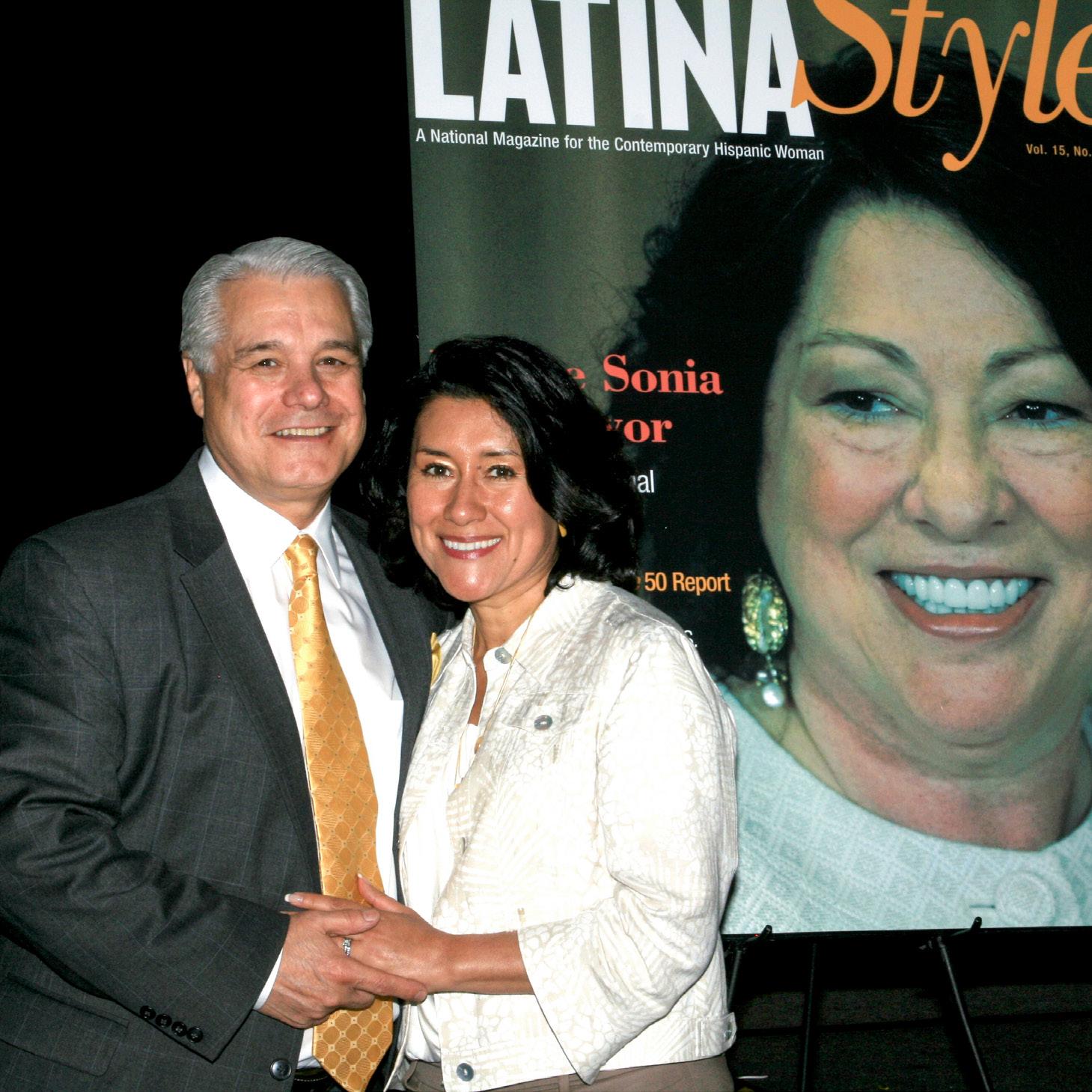
“Before that meeting, I had sent a long letter to everyone involved stating my position, and I think Robert thought it was a love letter,” Colmenero says, laughing. “It had been some time after Anna Maria’s death, and I think I helped inspire him to get back involved. I started seeing him at every convention and meeting I traveled to.”
Looking back on everything she and Bard have been through, the COO doesn’t have any regrets. “Robert and I are both big believers in everything happening for a reason,” she says. “My two kids think of Robert as a father figure, and my daughter became an officer in the navy, and I’m not sure that would have happened without Robert and all the work we’ve done together with the military and their families.”
This years-long partnership has bonded Bard and Colmenero for life, resulting in a sentence-finishing synergy that is as encouraging as it is sweet. It is because of that bond, and their shared passion, that they have made Anna Maria Arias’s vision a reality.
“Lupita is the visionary and my inspiration,” Bard says. “I’ve been so lucky that God put these two incredible women in my path.”












International businesses present unique challenges— and opportunities—for corporate citizenship in multiple countries. The executives featured here thrive in navigating cultural shifts worldwide.
202. Ana Maria Rodriguez, Yum! Brands/Pizza Hut International 207. Luis Sanches, Reynolds American Inc. 210. Mariana Prado Cogan, PTCYum! Brands/Pizza Hut International’s Chief Food Innovation and Quality Officer
Ana Maria Rodriguez combines a passion for food and a thirst for learning into a winning recipe
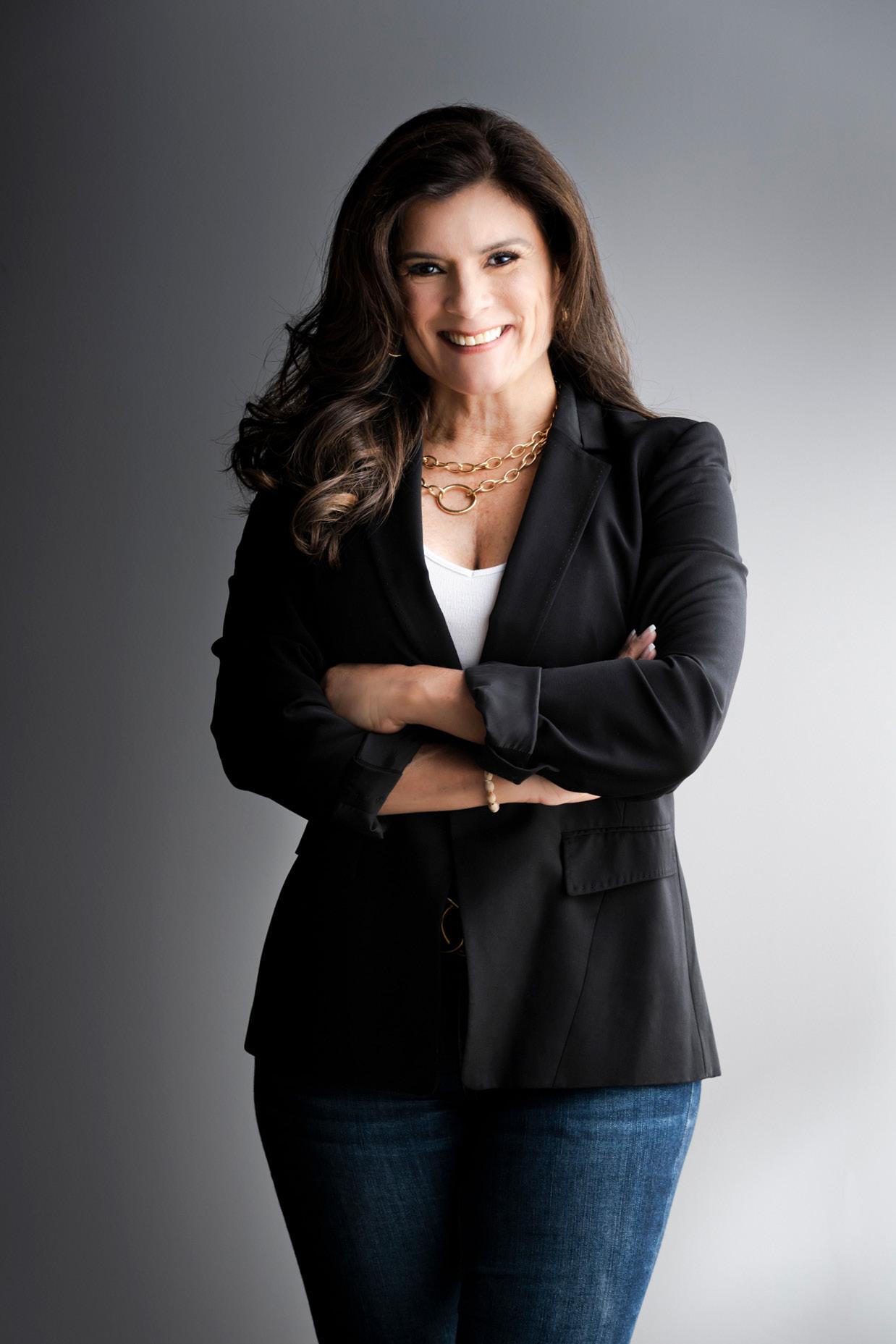 Ana Maria Rodriguez Chief Food Innovation & Quality Officer
Ana Maria Rodriguez Chief Food Innovation & Quality Officer
A young scholar who was anything but typical, Rodriguez had been accepted in an extremely competitive food engineering program. But she wasn’t entirely certain of her path at the time, as she had also applied to a traditional engineering school and to medical school.
“There are three things that are never going to die in the future,” Rodriguez reflects, citing a conversation she had with her father. “One of them is going to be medicine. The second is going to be infrastructure. And finally, food is going to be needed regardless of whether we’re on earth or outside of it.”
Rodriguez ultimately decided to enroll in the food engineering program and went on to earn a master’s degree in food engineering from Valencia Polytechnic University in Spain. Today, she serves as the chief food innovation and quality officer at Yum! Brands/Pizza Hut International.
Rodriguez had always had a passion for teaching, and soon after she completed her
master’s, she returned to the University of Costa Rica as a professor.
At the time, Yum! Brands was known as PepsiCo Restaurants International: the company’s representatives had come to Costa Rica looking for someone to take charge of quality, suppliers, and new product development. Knowing of Rodriguez’s background, the company called her and asked if she wanted to join their team.
“I told them, ‘I’ll send you my students,’” Rodriguez says. “I was very happy as a professor.” Eventually, though, close friends who owned a Pizza Hut franchise in Costa Rica invited Rodriguez to a dinner at their house. Not thinking of it as an interview, Rodriguez chatted with Pizza Hut executives and talked about her students. By the end of the night, she had an offer.
In 1997, Rodriguez was placed in charge of research and development and quality assurance (R&D/QA) for the Pizza Hut, KFC, and Taco Bell brands for the Latin American market. She moved to Miami, where the Latin America headquarters was located, and
We Are All Human’s Hispanic Promise is a national commitment to increase retention and promotion of Hispanics in the workplace. Ana Maria Rodriguez met with the nonprofit’s founder, Claudia Romo Edelman, and immediately brought the idea back to Yum! Brands/Pizza Hut International (PH). In 2019, the company signed onto the promise.
“We are a very diverse company, and we have a large team of people who are Latin,” Rodriguez explains. “We have the PH Latin American division based in Dallas. There are tons of Latinos like me—passionate, happy, enthusiastic, and energetic—and it was a critical opportunity for us to join the Hispanic Promise.”
saw more and more territory come under her purview. Before long, she was managing all R&D/QA and innovation for the company’s Central American markets as well as those in the Caribbean Islands and South America.
In 2011, Rodriguez moved to Dallas to focus on the Pizza Hut brand. “I had a blast!” Rodriguez enthuses. “It’s been eleven years now fully dedicated to Pizza Hut, and I’ve been enjoying every single minute of this journey.”
As Rodriguez explains, her twenty-fouryear career with Yum! Brands has been so rewarding in part because she’s never had to abandon her appetite for learning. “With Yum!, the choices I have made and the opportunities that have arisen have always allowed me to keep growing, learning, adding value, and having fun,” she says. “This huge company will encourage you to explore, take more risks, and allow you to grow in any direction you want.”
As chief food innovation and quality officer, Rodriguez eats pizza every day. She has to.
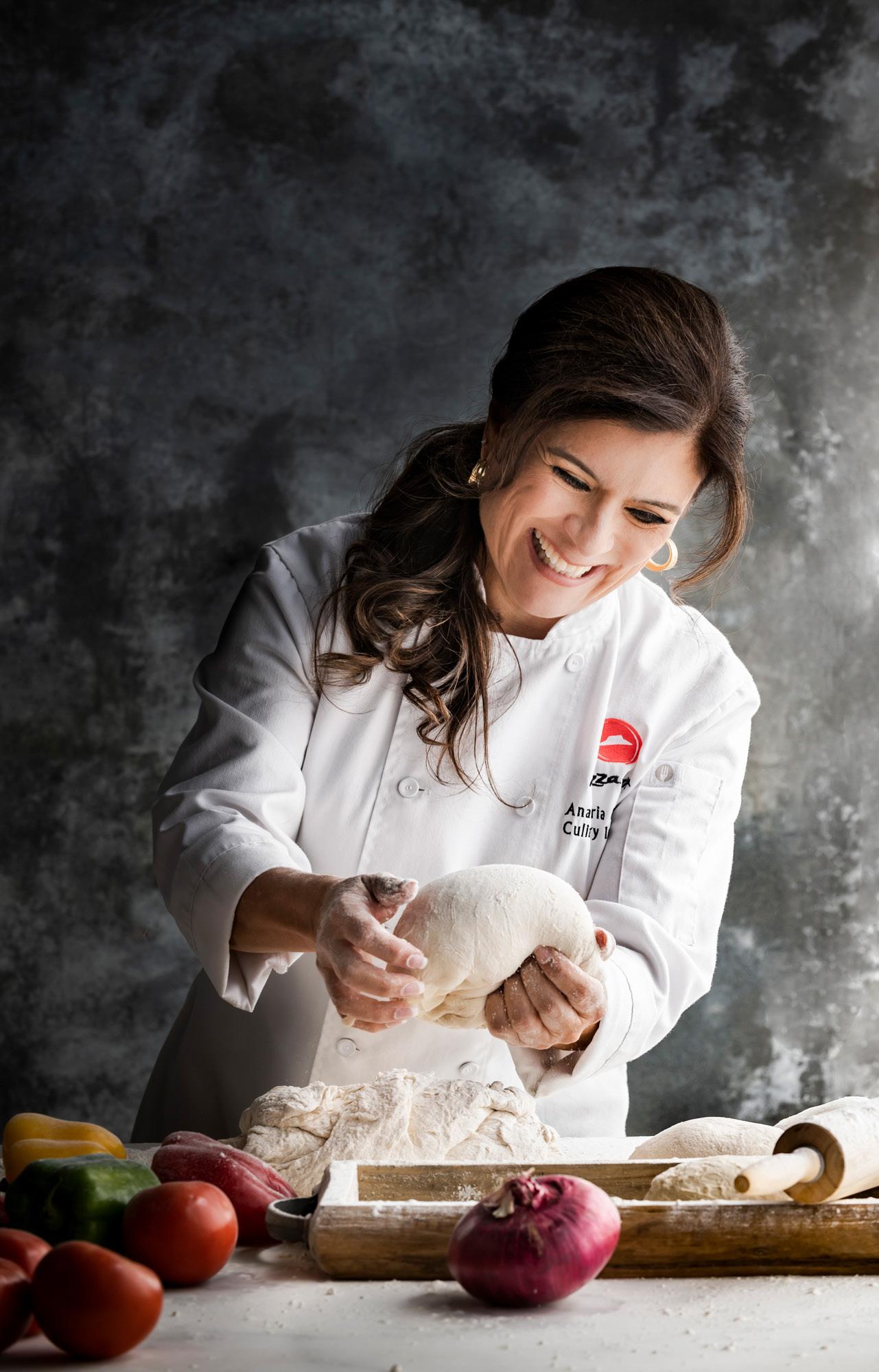
“I will not rest until we have the very best tasting pizzas around the world.”





































“And not just one, but probably ten to twenty,” she says, laughing. “I cannot help it . . . even on the weekends and family vacations, I continue to eat pizzas to check what’s out there to keep the inspiration and innovation flowing. All the Pizza Hut pizzas around the world—all the ingredients, sauces, shapes, and forms, everything—at one point in time or another go through my kitchen.” Her role includes performing quality evaluations, ideation sessions, following consumer trends, and conducting constant tastings and safety checks.






“That’s all so we have the best tasting pizza around the world,” Rodriguez explains. “That’s what we stand for. I will not rest until we have the very best pizzas around the world.”




















Of course, achieving “the best pizza in the world” is a challenge, particularly when different regions have different pizza preferences. In the United States, Rodriguez says, the preferred pizzas are pepperoni and supreme. But in Asia, the most popular pizzas are seafood and Hawaiian. In Korea, the top pizza flavor is bulgogi beef, and in India it’s more about vegetarian pizzas.

“For me, the biggest opportunity is to keep innovating and become locally relevant to the customers we serve in each country without losing the standards that are our guardrails,” Rodriguez says. “There are critical control points for ingredients, suppliers, and food safety temperatures that we need to meet. Keeping those standards intact, but allowing for locally relevant toppings, is a blessing. It represents the biggest challenge as well.”
And while these challenges keep Rodriguez engaged in her work, she still takes the time to appreciate how far she’s come and how much more she has ahead. “I’m proud of who I’ve become in this corporation,” she says. “I’m most proud of what the company has done to allow me to grow. I’m proud of the decisions that I have made and grateful for the people around me that have helped me make those choices. Now my role and responsibility is to help others on their own growth journey.”





























“With Yum!, the choices I have made and the opportunities that have arisen have always allowed me to keep growing, learning, adding value, and having fun.”
Brazil native Luis Sanches has traveled to Mexico, Russia, Australia, the UK, and the US. His global career brought many challenges, but the rewards were countless.
“I’VE BEEN FORTUNATE TO HAVE A LIFE and career that has led me to be exposed to many nationalities, languages, and cultures. I grew up only speaking Portuguese, but now my pool of friends is made of people from all parts of the globe,” Luis Sanches says. “It has taught me that if we are able to understand our similarities, we can get the most out of all of our qualities.”
Sanches grew up in Brazil in a small town outside of Sao Paulo. A natural athlete, he showed great promise as a soccer player—he even played semipro before college. Because Brazilian universities are not as compatible with athletics as American schools, Sanches ultimately decided to prioritize his studies. However, he attributes both his work ethic and leadership foundation to his years of swimming and playing basketball and soccer. Soon, though, Sanches found a passion to rival his love of the game. In fact, his
passion for math and science is what drove him to pursue a degree in engineering at the Federal University of Uberlandia. From there, he entered into a training program at British American Tobacco (BAT) and ended up staying with the company for more than thirty years.
During his three decades with BAT, Sanches had the opportunity to live in many different countries, and he eagerly absorbed everything they had to offer. Early on in his travels, he discovered the power that languages have to open doors, both personally and professionally.
“I realized that, if I didn’t learn another language, I would have a very tough time. We worked with manufacturers from multiple countries so English was a must,” Sanches explains. “You can generally speak English with most senior managers in big organizations, but if you are able to speak the local
 Reynolds American Inc.
Reynolds American Inc.
Luis Sanches
Former
“The best way that you can expand your ability to see how people actually are is to live close to them—to eat the same food as they eat, go to places they go, and go through the same challenges that they see during their day-to-day lives.”
language, it breaks lots of barriers in communication and builds a long-lasting relationship and trust.”
In 2002, Sanches had the chance to put this lesson into action when he was offered an opportunity to move to Australia. “Professionally, it was quite exciting,” he says. “There was a plan to consolidate the Australasia footprint in one location, and it was for me a fantastic opportunity to practice my English, further develop my leadership skills, and to apply everything I had learned in the first twelve years of my career.
“Of course,” he adds, “leaving my extended family behind with a twelve-hour time zone difference was not easy for my wife and my kids.”
After three years in Australia, Sanches and his family moved back to Brazil. Not a week later, he was asked to move again, this time to the UK. His family took the plunge with him, got their affairs in order, and moved to London, which Sanches used as a base for additional business traveling.
“Sometimes when you are asked to move to another country, it could be because that is the most strategic time zone,” he notes, “allowing you to effectively and efficiently work with the countries under your accountability and responsibility. Or the new location will host the knowledge and expertise you need for your future development, or it is where you could drive the biggest business impact—or a combination of all.
“The better you understand the scope of your job and the professional and personal implications of it, the better you’ll be prepared for the next role and how it will fit into your overall career plan,” he continues. “Be wise in your choices, as they will have a short- and longterm impact in your life. Welcome the challenges and embrace change.”
After England, Sanches returned to Brazil for three years working in research & development (R&D) and manufacturing; then he moved to Mexico, Canada, UK, Russia, the UK again, and finally to the USA. Throughout his travels and international assignments, Sanches gained a global business, economical, and social perspective
that he wishes more executives had access to—a perspective that can only be obtained by truly immersing oneself in the depths of the culture of another country and not merely visiting or reading about it.
“The best way that you can expand your ability to see how people actually are is to live close to them—to eat the same food as they eat, go to places they go, and go through the same challenges that they see during their day-to-day lives,” Sanches says. “Fortunately, we are seeing that diversity and inclusion is becoming a core priority in so many enterprises. But the truth is, a sustainable diverse and inclusive culture that transforms the workplace and the society around us can be mostly and foremostly built if we understand and personally experience that we are better, smarter, and stronger together.”
In 2019, Sanches moved to the US to work as senior vice president of R&D for Reynolds American Inc., which had recently been acquired by BAT. It became the final stop on his incredible journey: Sanches decided to retire in the US to stay near family members who had settled there.
Looking back at his long and varied career, Sanches emphasizes the gratitude and admiration he has for his wife and three daughters, who not only supported him through all the moves around the globe but also embraced those experiences and became “ambassadors of inclusion” in their own right.
“As a Latino, family is front and center in our priorities. My wife was a key pillar in my career— without her support, I would never have succeeded,” Sanches says. “She gave me the inspiration, the motivation, and the means to progress throughout my international [career].”
Touch is an innovation agency with global reach. We creatively build on consumer and business insight to deliver sustainable and future-proofed brand and business growth. We’re specialists in structural pack design, product delivery, and strategy. Sustainability is at the heart of our offer, and it’s continuing to grow. Today, 90 percent of the work we do is focused on helping brands become more sustainable.
Website: touchdesign.com
Email: intouch@touchdesign.com
Mariana Prado Cogan has never shied away from doing things a little differently. At PTC, she applies both her Mexican background and knowledge of Japanese culture to the digital transformation space.
BY MAGGIE LYNCH“I HAVE ALWAYS REALLY LIKED TO DO different, bold, unique things since I was of a very young age,” Mariana Prado Cogan says. She’s not exaggerating: she was born in Mexico City and at age eight, asked her mother if she could attend a Japanese school there. The answer was yes, and she studied there until she was eighteen, when she moved to Japan to study economics.
Today Prado Cogan is senior vice president of marketing at PTC, a software company focused on digital transformation. Her background in technology helped lead her to where she is now—but her unique academic background, roots in Mexico City, and

lessons learned during her time in Japan have also played a role in her success.
Prado Cogan would end up spending many years in Japan; she says her years in Japanese school taught her to be comfortable with Japanese culture. When she moved to Japan, that skill “allowed me to easily adapt to do some things very Japanese and some things very Mexican,” she says.
To this day, several Japanese principles influence the way that Prado Cogan conducts business. One is Nemawashi, or root massaging. “If you’re going to transplant a tree, you first massage the roots so then it is a smooth transition for the tree and it grows in an even
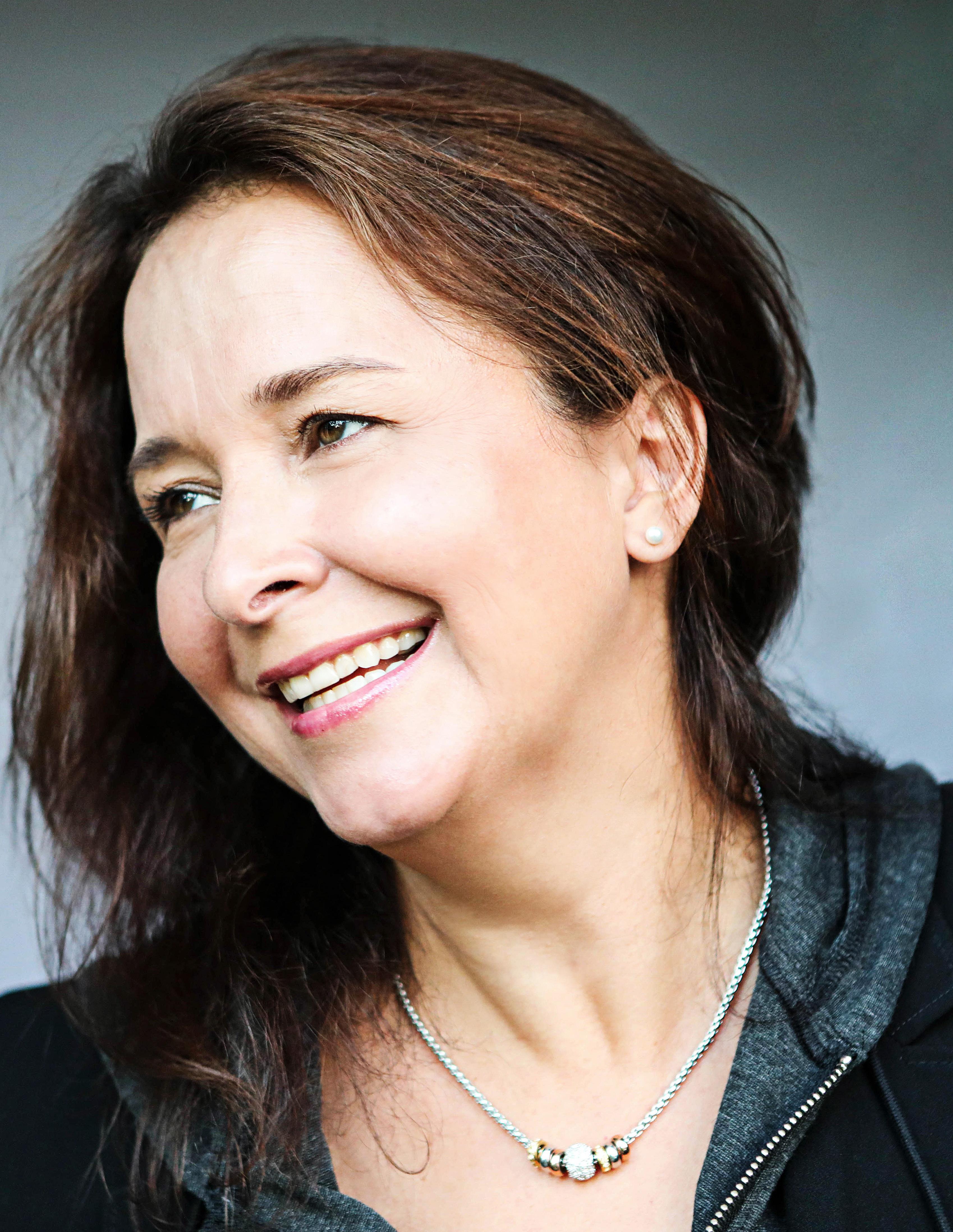
richer way,” she explains. “It sounds small, but it allows a big transformation. You take care of the alignment.”
She points out that both Japanese and Mexican cultures value the alignment gained through building relationships, which is emphasized in this principle. “I also learned about continued improvement, or Kaizen,” Prado Cogan says. “Kaizen is always being on the lookout for ways of improving. It requires you to be much humbler, never conformist, and open to rapidly adapting to change.”
One of the most important principles she mastered in Japan was to prioritize relationship-building—something she also learned while growing up in Mexico. “Latinos have a genuine interest in both delivering results and emotionally connecting,” she explains. “With empathy you can connect your vision to the business and personal needs of stakeholders to gain alignment. That’s when the magic starts happening.”
Prado Cogan explains that Latinos are good at emotional connection because it’s a very warm culture. “We’re a warm, family-oriented, and hard-working culture. That makes it easier to connect with people,” she says.
Her diverse background enabled her to move into her next venture when it came time to look into expanding her career. She entered the tech field helping companies to break into the Japanese markets. She took a job with American Financial Systems, and the CEO’s visionary approach to problem-solving through technology led her to the digital transformation space.
The CEO was looking for someone to focus on the company’s Latin and Japanese business. In this position, Prado Cogan says, she started working with digital business, web personalization, and leveraging technology to solve people’s problems. She explains that after taking time off from the corporate world following the birth of her son, she wanted to come back in a space to catch the next business wave.
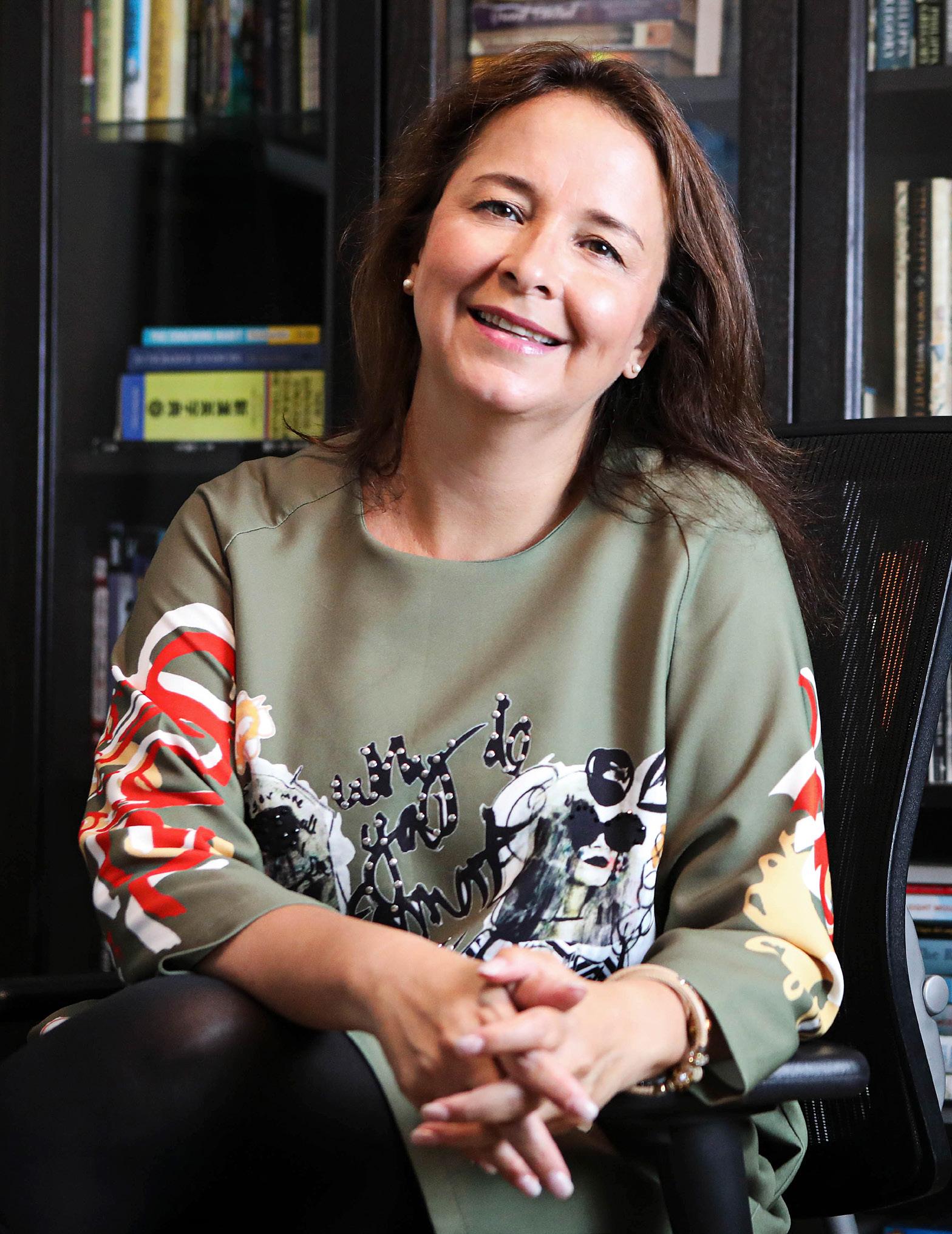
“We’re naturally inclined to work with people like us, and when you come from a minority there aren’t going to be as many people who identify with you.”
“I did spend some time thinking about where the world was going, what would be the way to doing business, and that was where digital marketing seemed to be a perfect match,” Prado Cogan says. “I like solving problems, and I have a very visionary strategic approach that’s complemented by an operational mind, so everything came together.”
In recent years, she says, she’s been able to establish herself as a thought leader in the
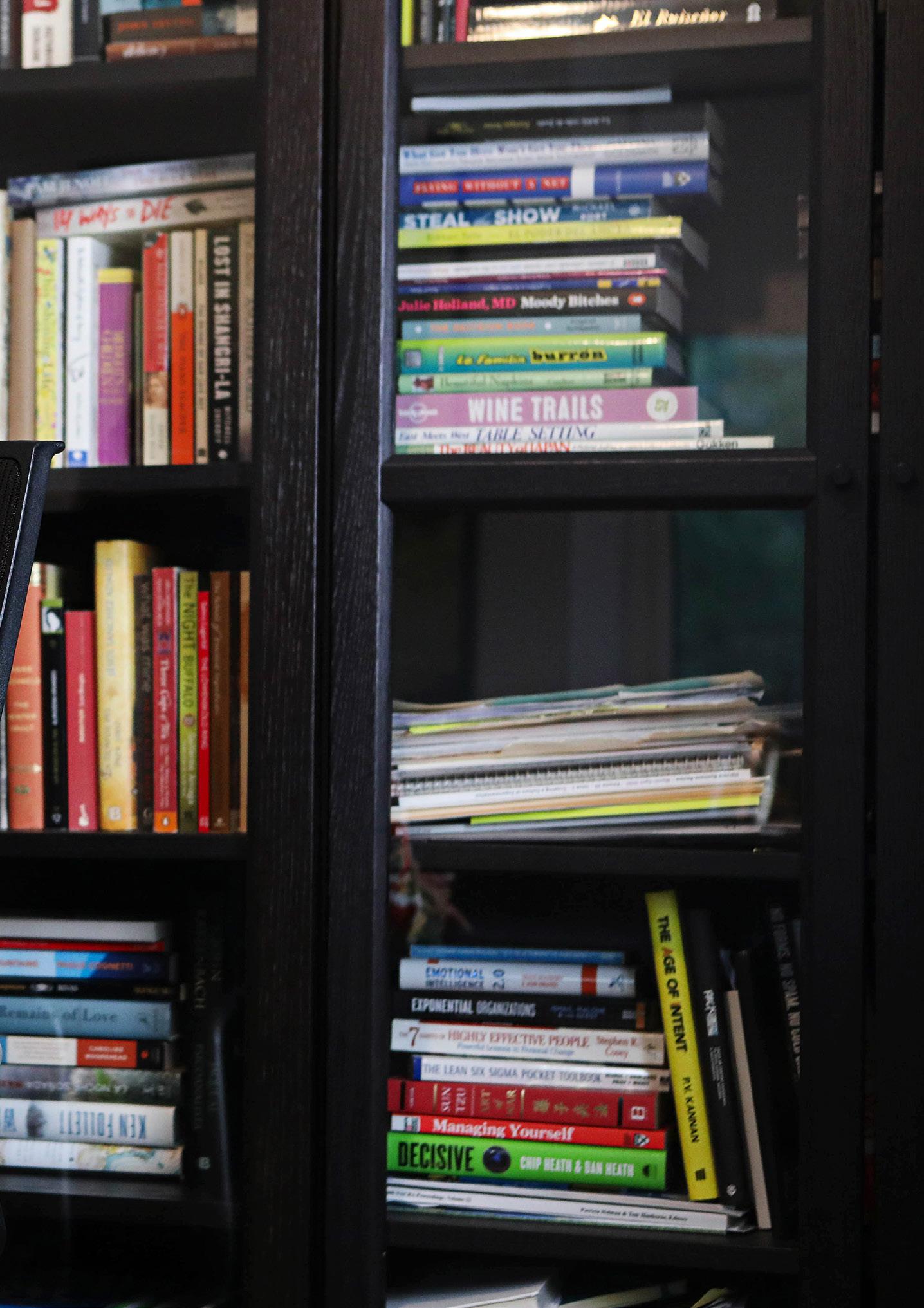 Mariana Prado Cogan SVP of Marketing PTC
Mariana Prado Cogan SVP of Marketing PTC
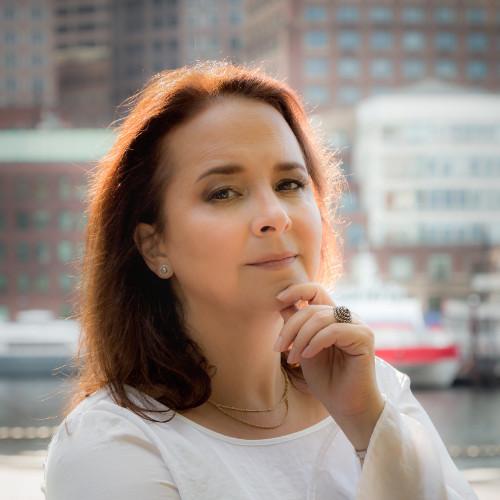
AI-driven digital transformation of sales and marketing. “It is the way to deliver customer-centric experiences and increase sales productivity,” she says. She has won multiple awards in the space.
One of her primary responsibilities at PTC is to deliver “the right content to the right person at the right time to help customers solve their business challenges,” she says. To do so, she leverages her experience in tech to deliver digital transformation, which contributes to PTC having a customer-centric business proposition.
“These days close to 70 percent of a buyer’s journey is done in the digital space,” she says. “Marketing has to deliver much more than before, including representing the customer throughout corporate decisions—which really means that we have to deliver revenue. It’s less about working harder and more about working smarter.”
Prado Cogan also believes deeply in the value of diversity, for a number of reasons. She points out that statistics show that diverse companies are more innovative, and companies that are more diverse from a gender and ethnicity perspective financially outperform those that are less diverse. Diversity is especially imperative in tech, she says, since technology companies are driven by innovation—and innovation comes from having new people at the table.
“It’s really, really important because at the end of the day we’re naturally inclined to work with people like us. When you come from a minority, there aren’t going to be as many people who identify with you. We do that naturally,” she says.
These days, Prado Cogan is committed to sponsoring others to help them reach the top. She defines a sponsor as someone who brings up your name when you are not in the room and conversations about promotions or high-visibility projects are happening.
While she personally sponsors high-potential individuals, Prado Cogan says her goal is to build a framework for a systematic set-up that delivers scalability for a sponsorship program. “That’s what really triggers career development,” she says. “I was lucky enough to have sponsors pulling me up, so it’s a huge priority for me to help other Latin people make it to the top. It’s an obligation to pay forward.”
6sense: “Mariana, you continue to demonstrate what it looks like to be a passionate leader who pushes the boundaries of what’s possible when marketing, sales, and customer success teams unite and rally around the customer. Your vision for a better B2B buying experience is inspiring.” –Latane Conant, Chief Market Officer
At Drift, we’re part of the just 2 percent of VC-backed start-ups that are led by Latinx founders. We’ve had our sights set on the future since day one and are laser-focused on digital transformation. Our leading AI-backed Conversational Sales and Marketing solutions can help you reimagine your customer experience and grow revenue, faster.
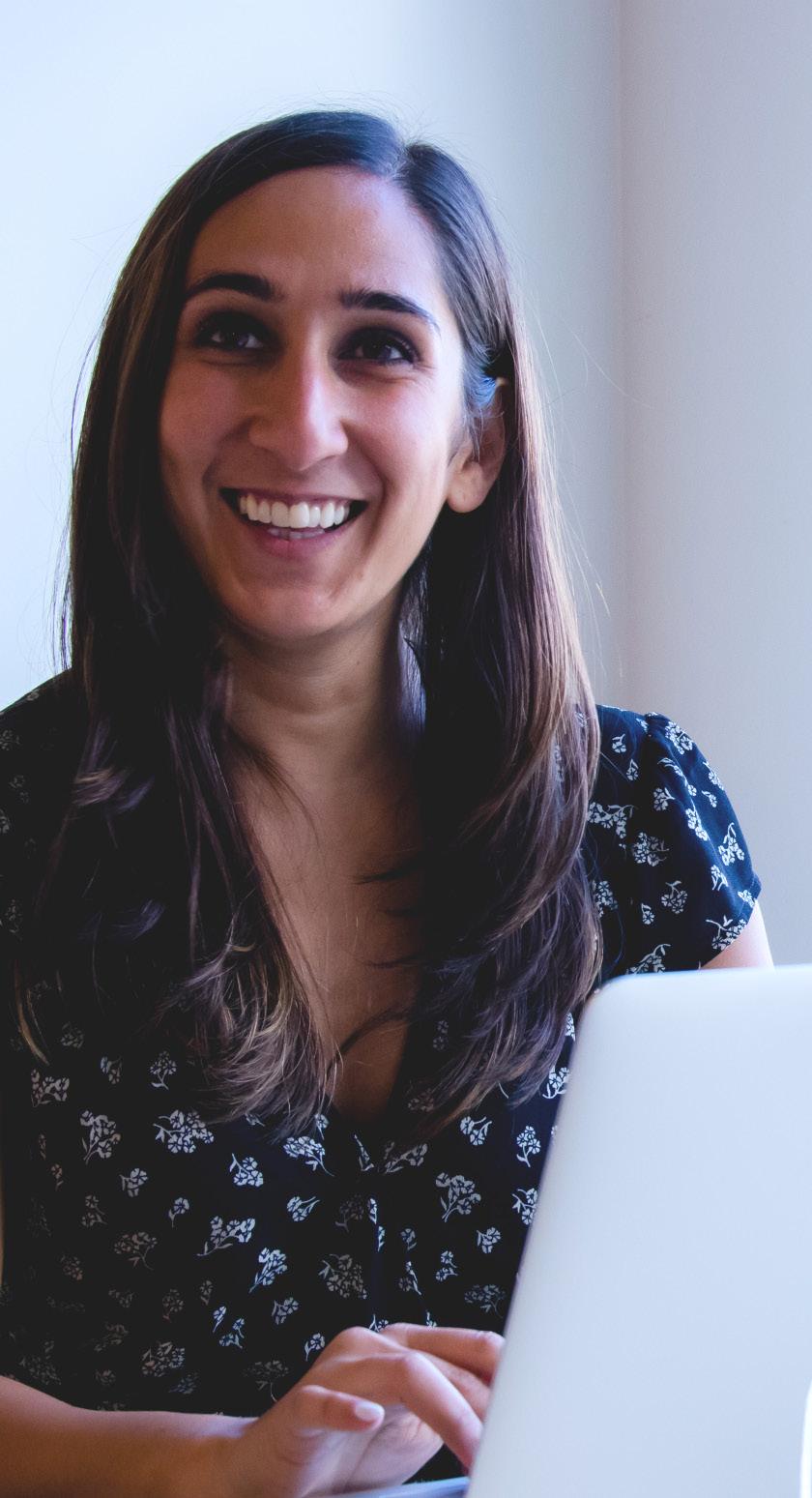
Nobody ever got anywhere thinking small.
We asked the Hispanic Executive community what advice they would give to Latino entrepreneurs looking to take their businesses to the next level. Here are just a few of the responses we received:

“Thinking small is a self-fulfilling prophecy. Leaders create and communicate a bold direction that inspires results. If you want to take things to the next level, you have to have a vision that will inspire those around you—you are going to need help. Anchoring around your customer is also always a good idea. Look around corners and solve problems for them no one else is.”
“Focus on a niche. It took me a good eighteen months to fully embrace my natural niche, and that was the most painful period of my business. Things have been more fun ever since.”
—ERIK CARDENAS OF ZÓCALO HEALTH
PLANNING LLC
“Network, network, and network. One can find insightful resources and information by just meeting the right people. The more people we meet outside of our comfort zone, the closer we get to achieving our goals.”
—JORGE H. PANTOJA OF MARK K. ASHMAN, CPA PC
Know your worth and be stubborn about it.”
Pay for information you don’t know. No need to suffer or waste your time on things you don’t know.”
—ISAI BISMARK CORTEZ OF SYNKBOOKS
BRUNO GROUP INC.









































Liquid engineered for vehicles with 75,000+ miles







